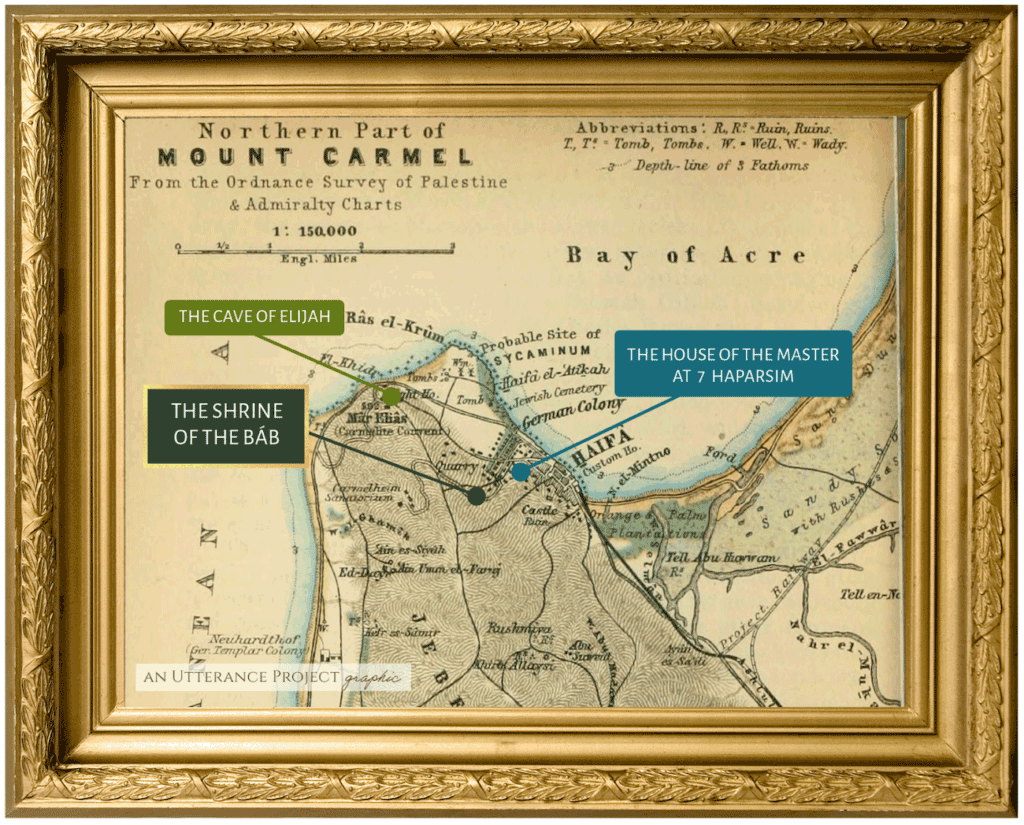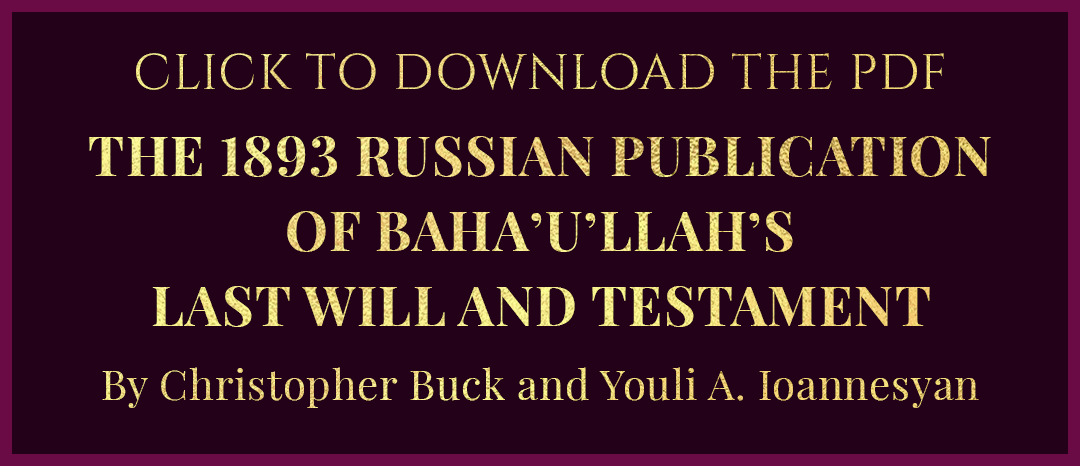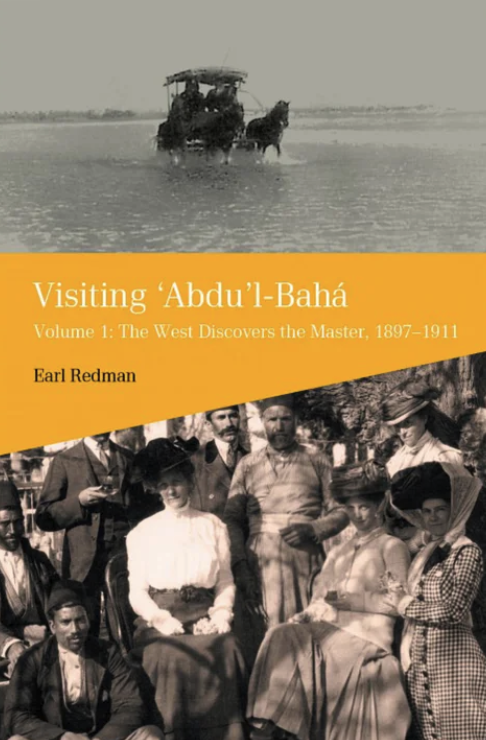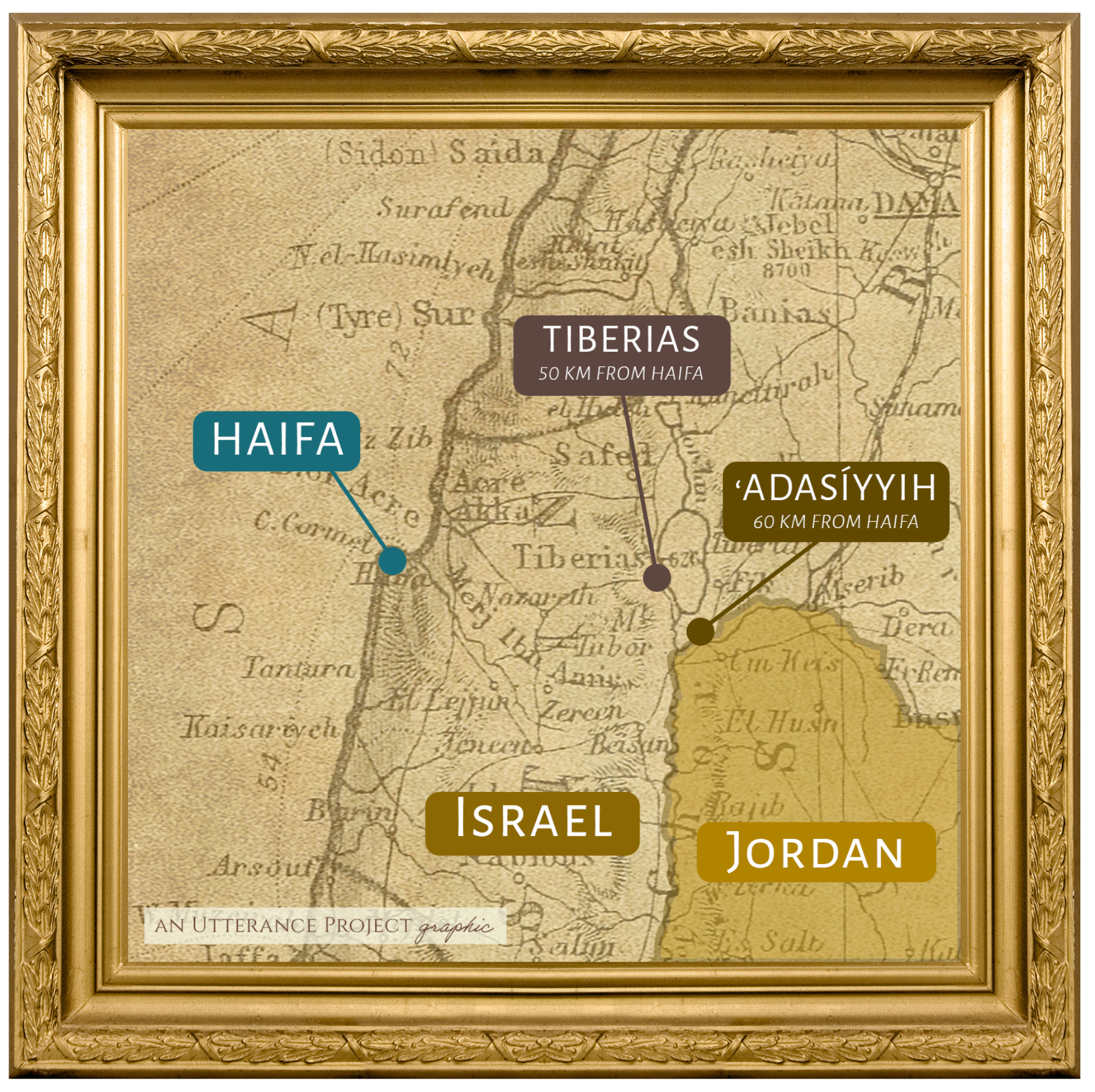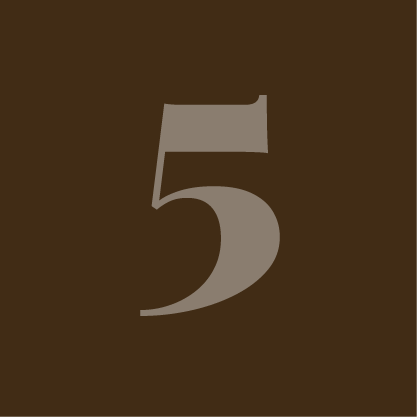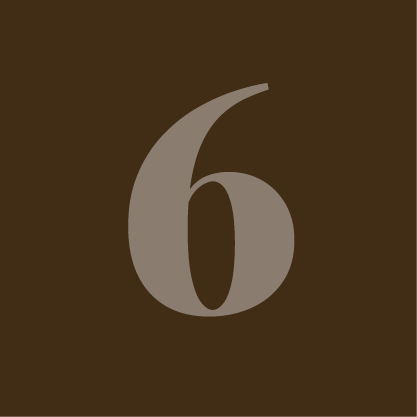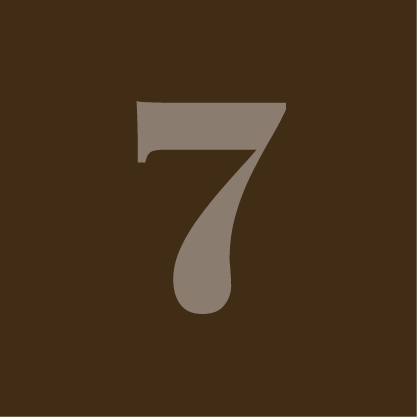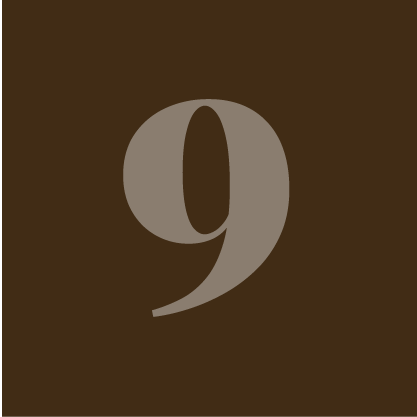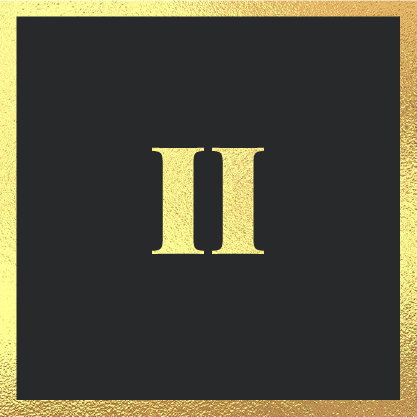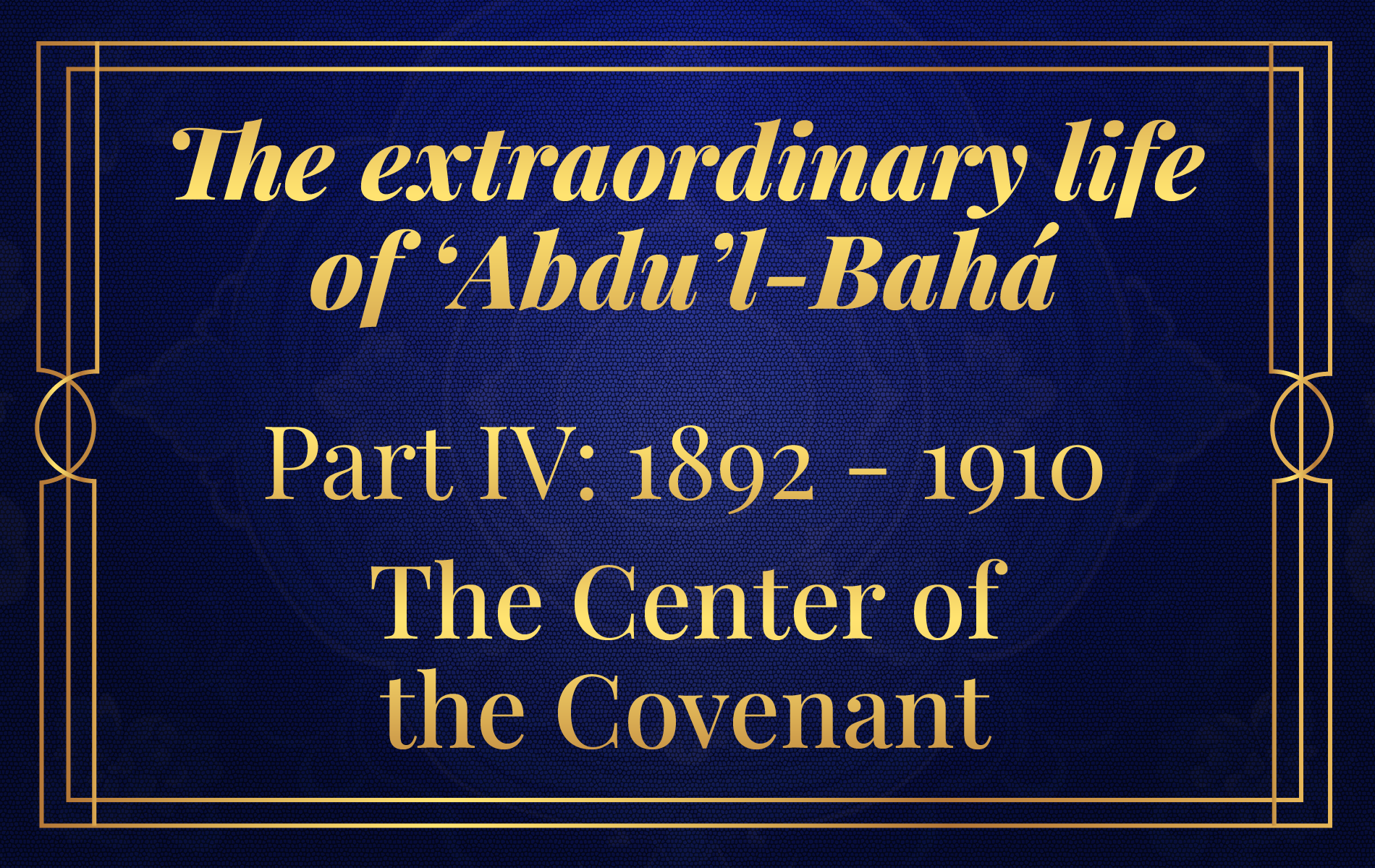
Written and illustrated by Violetta Zein
This part covers the life of ‘Abdu’l-Bahá from the age of 48 in 1892 to the age of 66 in 1910.
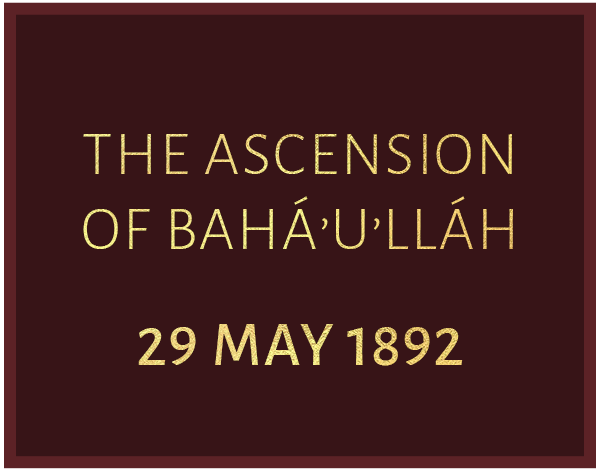
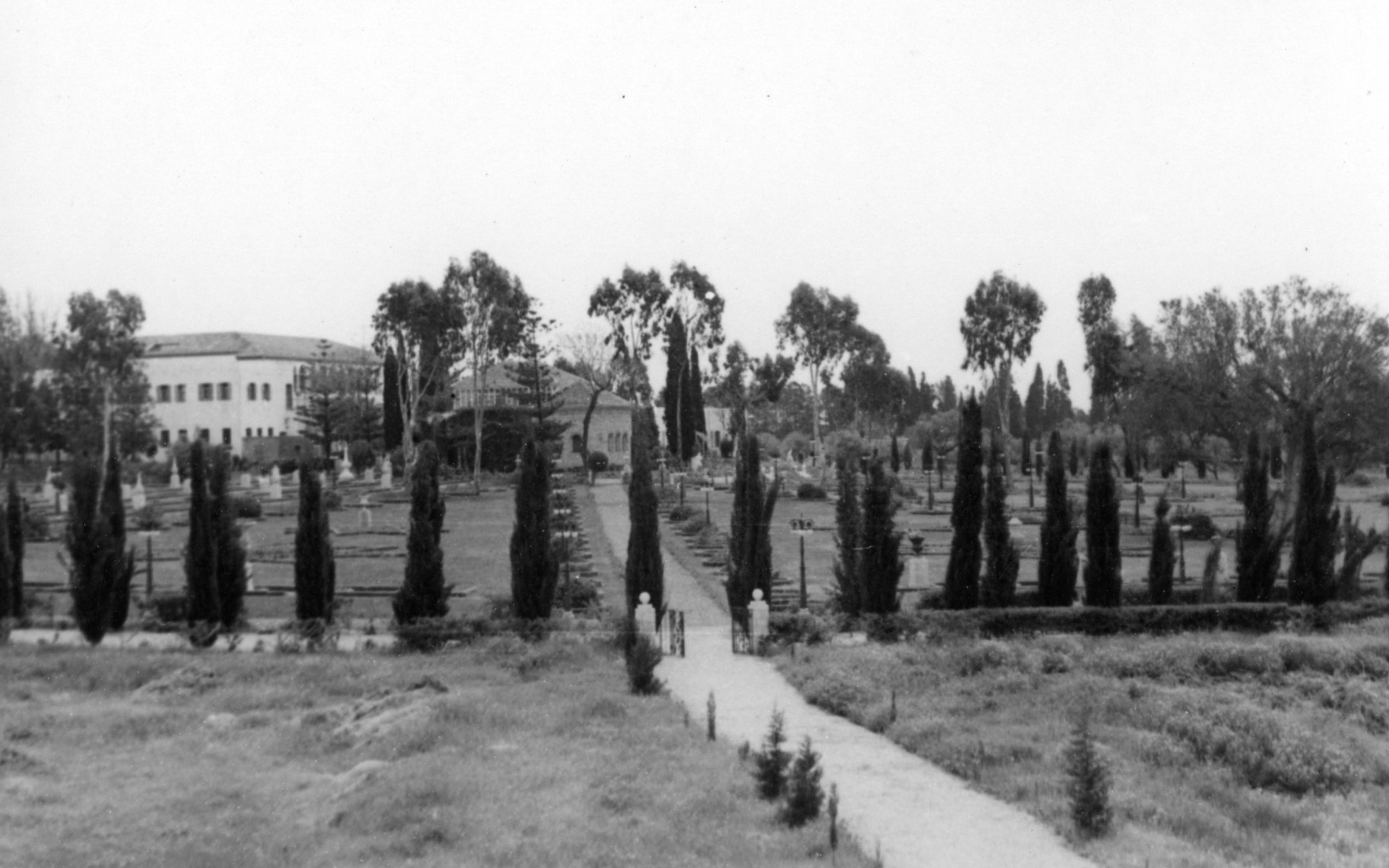
View of the Mansion of Bahjí Ttaken between 1956 – 1958 as indicated by the size of the Cypress trees (planted in 1952) and by the fact that the Covenant-breakers' house next to the Mansion has yet to be demolished (which occurred in December 1958). Detailed caption provided by Andrew Blake. Bahá'í Media Bank.
In the evening of Sunday May 8, 1892, fifty days after Naw-Rúz, Bahá'u'lláh contracts a fever but does not mention it to anyone. Late in the afternoon of Monday May 9, the fever intensifies. At some point, Bahá'u'lláh sends a servant from Bahjí to the house of 'Abbúd, in 'Akká with a message for 'Abdu'l-Bahá:
I am not well, come to Me and bring Khánum.
The servant brings horses and 'Abdu'l-Bahá and Bahíyyih Khánum immediately go to Bahjí, while Munírih Khánum, filled with anxiety, stays home with the children.
Monday 16 May 1892 - 'Abdu'l-Bahá delivers a message from Bahá'u'lláh: "I shall always be with them"
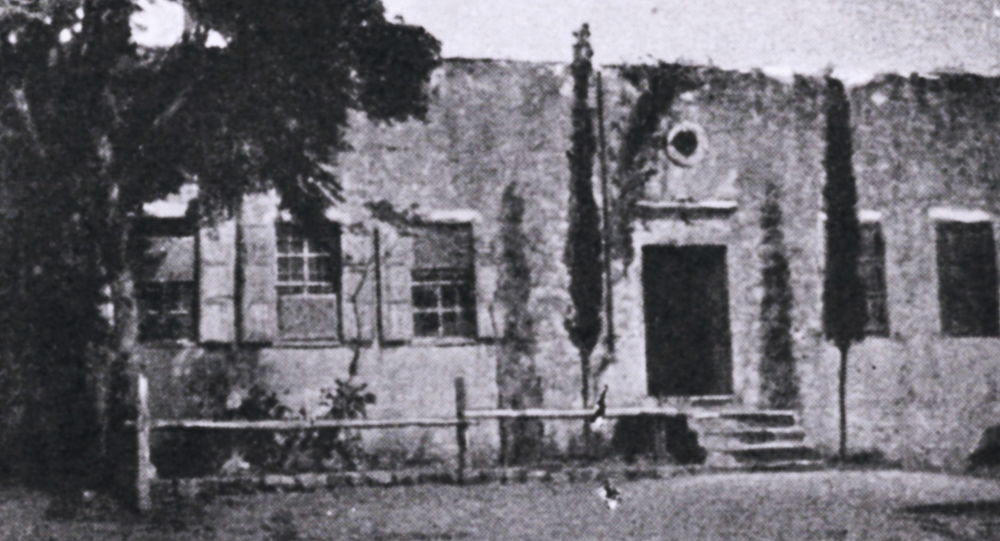
The Pilgrim House at Bahjí in 1926, photograph from (Star of the West [The Baha'i Magazine], vol. 17, no. 8, November 1926). Source: Baha'i Historical Facts.
On Monday, May 16, 'Abdu'l-Bahá leaves the presence of Bahá'u'lláh in the Mansion of Bahjí and walks over to the Pilgrim House. He conveys the greetings of Bahá'u'lláh's to all, and conveys His message:
All the friends must remain patient and steadfast, and arise for the promotion of the Cause of God. They should not become perturbed, because I shall always be with them, and will remember and care for them.
Taherzadeh, Adib. The Revelation of Bahá'u'lláh Volume IV: Mazra'ih and Bahjí (1877 - 1892),
When they hear these words, the believers cry out with grief. 'Abdu'l-Bahá's tone is unmistakable: the end of Bahá'u'lláh's life is near.
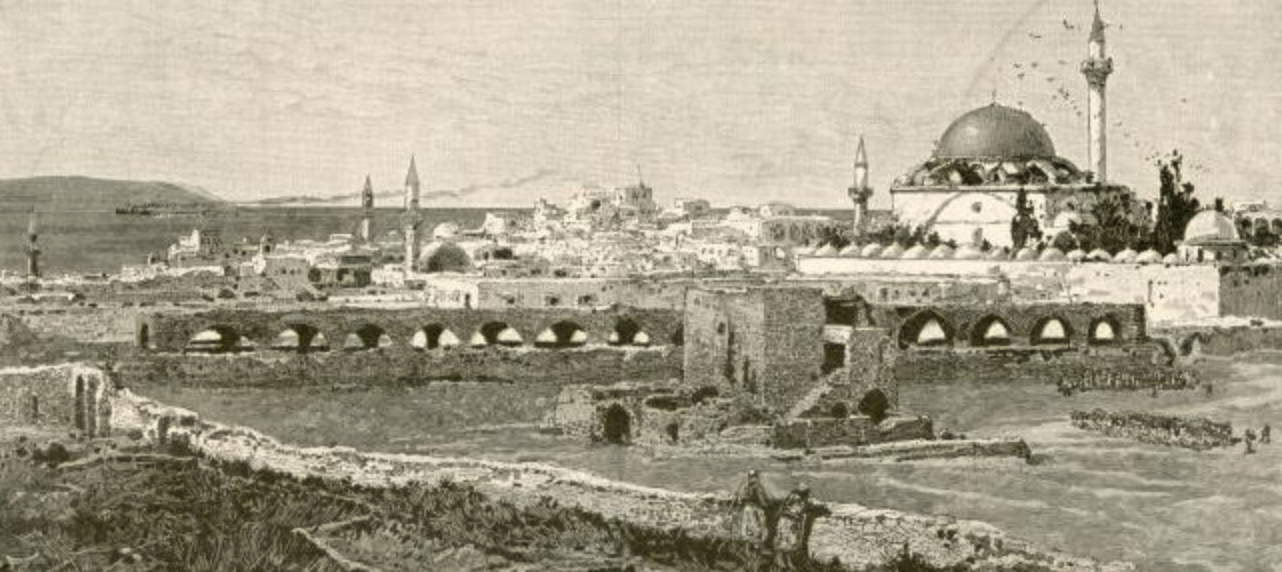
1881-1884 View of 'Akka with the Mosque of Al-Jazzár in the foreground. A steamer in the background is approaching Haifa. Photographer: Harry Fenn. Dorot Jewish Division, The New York Public Library Digital Collections.
On Tuesday, May 17, 1892, the tenth day of Bahá'u'lláh's illness, Bahá'u'lláh awakes at dawn, seemingly in perfect health. 'Abdu'l-Bahá arrives at the Bahjí Pilgrim House at dawn, happy and smiling and awakens the believers one by one, giving them the good news, and enjoining them to drink their morning tea with joy and offer thanksgiving to God.
The believers are joyful and happy, congratulating each other as if it were a festival. That day, 'Abdu'l-Bahá distributes food to soldiers, the poor, the inmates of the prison and orphans. The people of 'Akká will later say they cannot remember a happier day. They whole-heartedly offer their thanks to Bahá'u'lláh for His generosity and gifts. 'Abdu'l-Bahá also visits every Bahá'í household in 'Akká and conveys to each believer, man and woman alike, the loving greetings of Bahá'u'lláh.
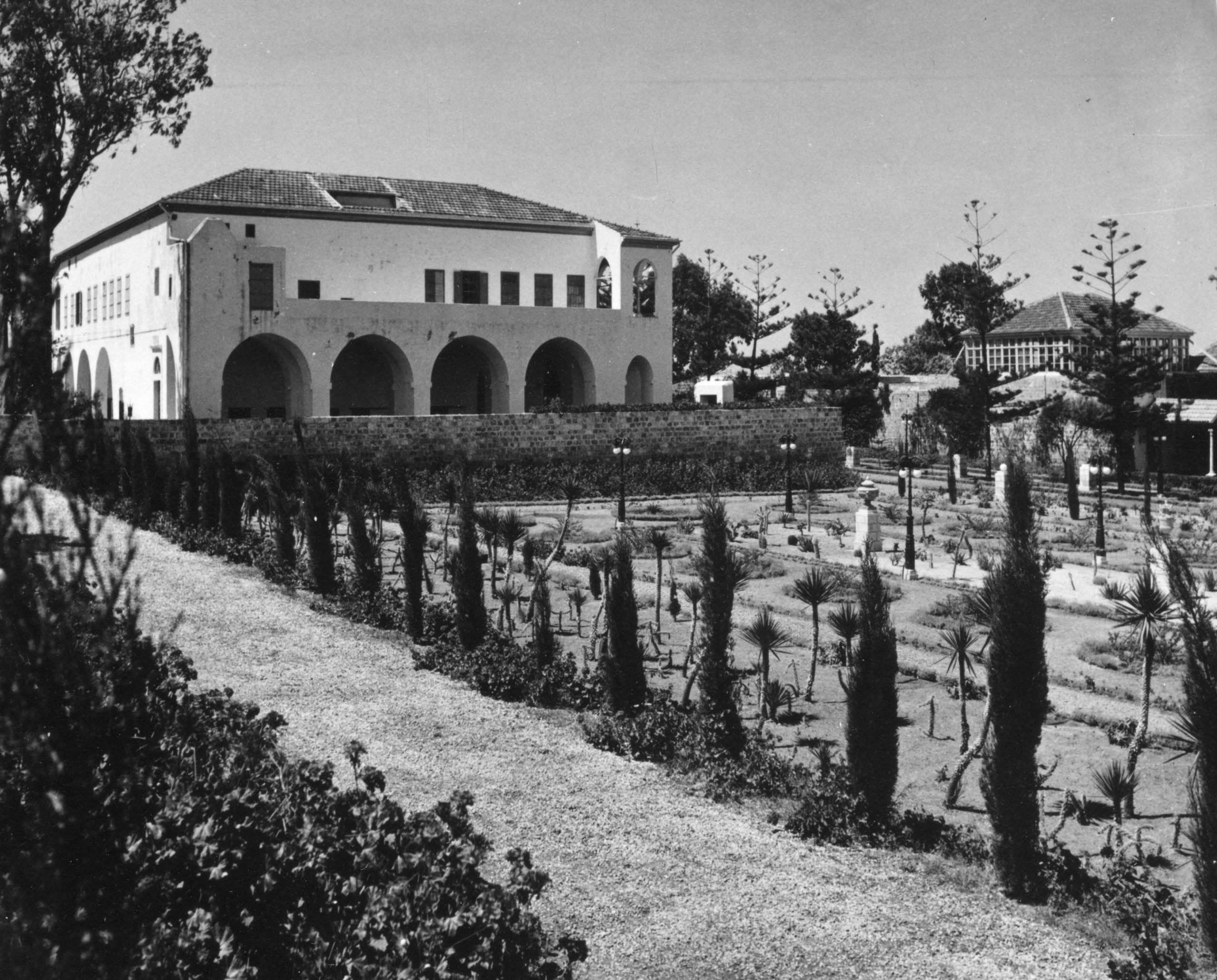
Mansion of Bahjí and surrounding gardens, 1958. The photo above was taken to show for the first time what the Mansion of Bahjí looked like from the North side. The Covenant Breaker’s house has been demolished and Shoghi Effendi’s succulent garden has been extended up to the Mansion’ s garden wall. Detailed caption provided by Andrew Blake. Bahá'í Media Bank.
On Sunday, May 22, 1892, the fifteenth day of Bahá'u'lláh's illness, the fifteenth day) afternoon, all the believers present at the Mansion Bahjí, pilgrims and resident Bahá'ís, are summoned to the presence of Bahá'u'lláh. This is to be their last audience with Him. The entire body of the believers, weeping and grief-stricken, enter Bahá'u'lláh's presence as He lays in bed leaning against one of his other sons. Bahá'u'lláh then gently and affectionately addresses them:
I am well pleased with you all, you have rendered many services, and been very assiduous in your labours. You have come here every morning and evening. May God assist you to remain united. May He aid you to exalt the Cause of the Lord of being.
Taherzadeh, Adib. The Revelation of Bahá'u'lláh Volume IV: Mazra'ih and Bahjí (1877 - 1892)
Ṭúbá Khánum, speaking of the same afternoon, remembers that Bahá'u'lláh speaks loving words of peace and calm to the believers, and exhorts them to be faithful and steadfast to the Cause of God, and to let their characters speak to the world:
I am very pleased with you all. My hope is that your deeds will be examples worthy of the Bahá'í Faith - that you may ever be true followers of the Light of God's Law.
Lady Blomfield, The Chosen Highway
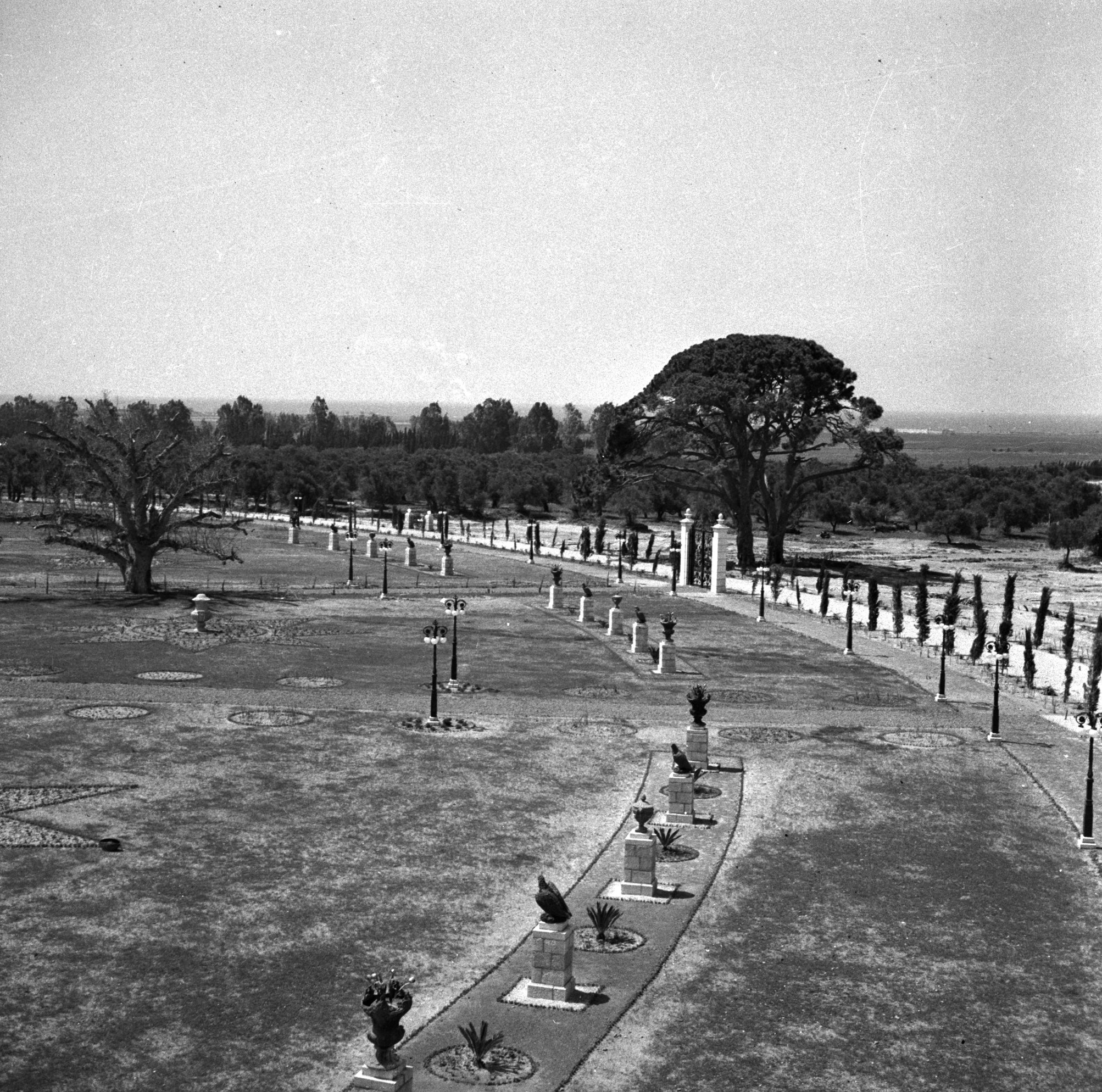
This photo shows the newly created Ḥaram-i-Aqdas garden in 1953. Shoghi Effendi converted 12,000 m2 of land (importing around 20,000m3 of soil) adjacent to the Shrine of Bahá’u’lláh into the beautiful gardens of the Ḥaram-i-Aqdas in just 2½ months. Detailed caption provided by Andrew Blake. Bahá'í Media Bank.
Bahá'u'lláh asks for for the women and the children of the Holy Family, who gather at His bedside. Bahá'u'lláh comforts and reassures them: He has provided for them in His Will, entrusted to 'Abdu'l-Bahá, and has entrusted them into the care of 'Abdu'l-Bahá who will provide and protect for the family, the friends and the Cause.
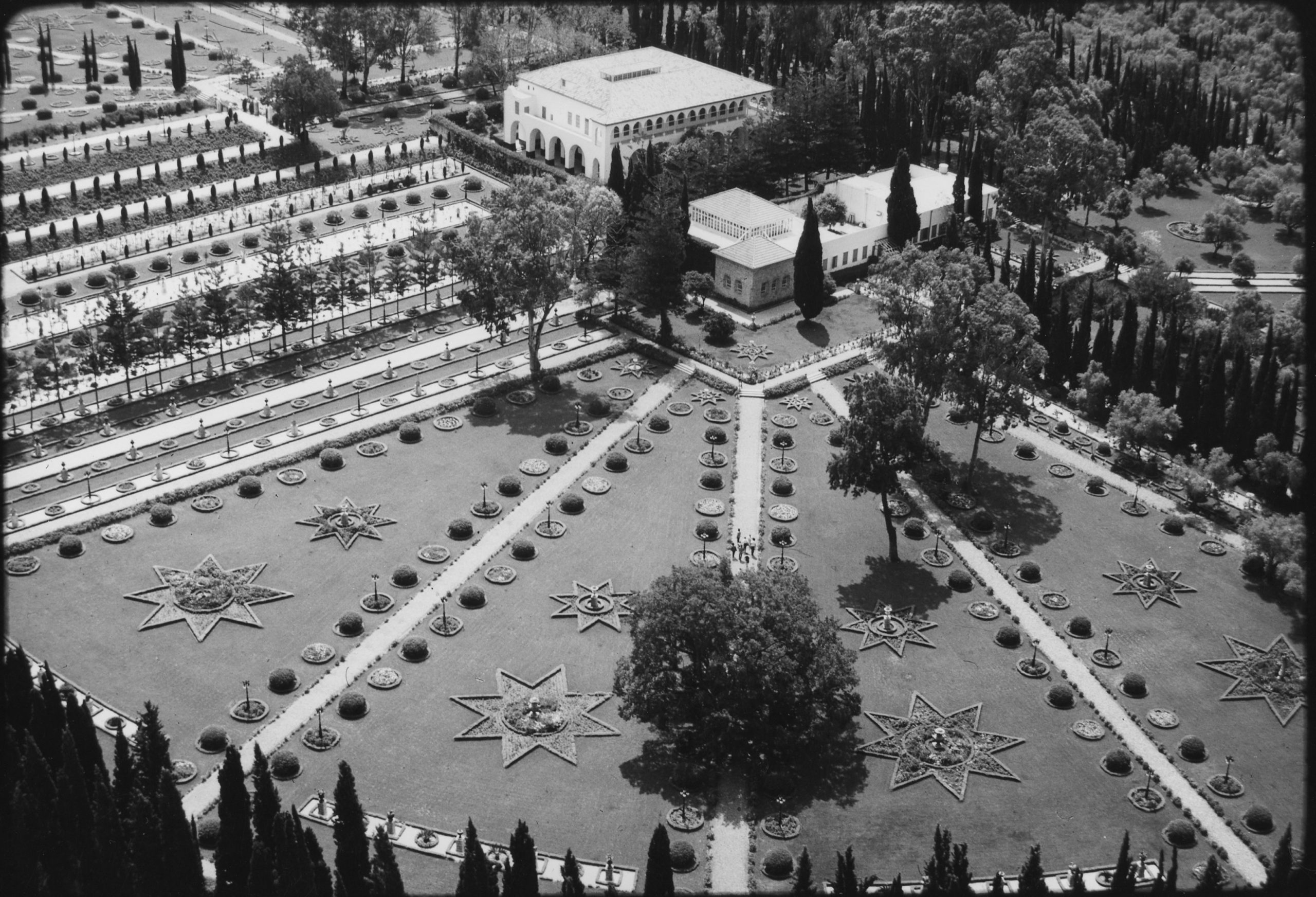
Aerial view of the Shrine of Bahá’u’lláh, Mansion of Bahjí and surrounding gardens, 1976. Bahá'í Media Bank.
Bahá'u'lláh shows no sign of fever, but passes away in the Mansion of Bahjí at three in the morning on Sunday, May 29, 1892, on the twenty-first day of His illness. Immediately, a horseman gallops into `Akka to carry the news to the Muftí. The seven minarets of the Mosque of Al-Jazzár call out a customary proclamation in the event of greatly honored, highly learned and holy men:
God is Great.
He Giveth Life! He Taketh it Again!
He Dieth No, but Liveth for Evermore!
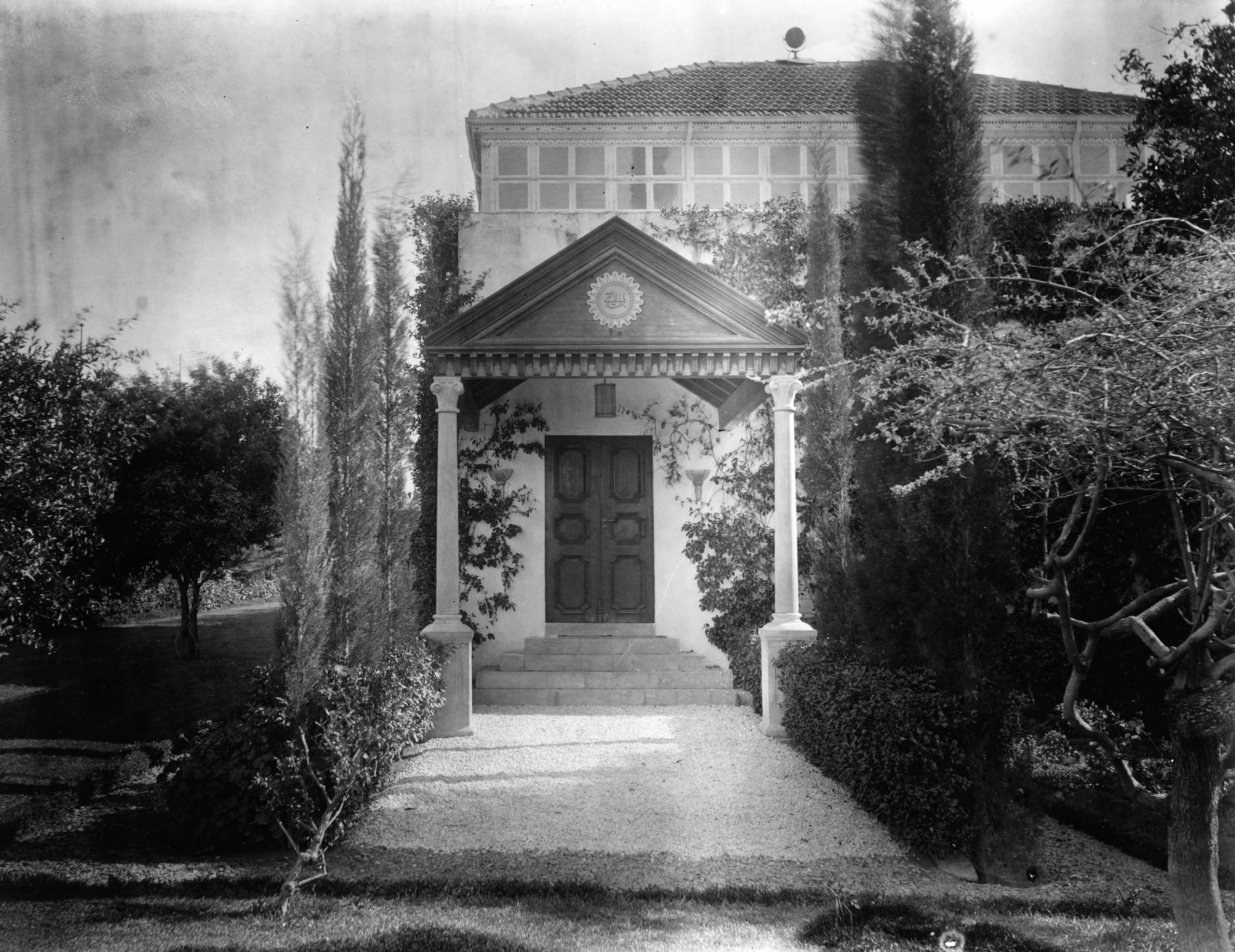
Entrance to the Shrine of Bahá’u’lláh, 1940. Bahá'í Media Bank.
On the day of the Ascension of Bahá'u'lláh, 'Abdu'l-Bahá sends a telegram to Sulṭán ‘Abdu’l-Ḥamíd which begins with the words:
“the Sun of Bahá has set”
In the cable, 'Abdu'l-Bahá informs the Sulṭán of His intention to inter Bahá'u'lláh's sacred remains within the precincts of the Mansion. The Sulṭán assents.
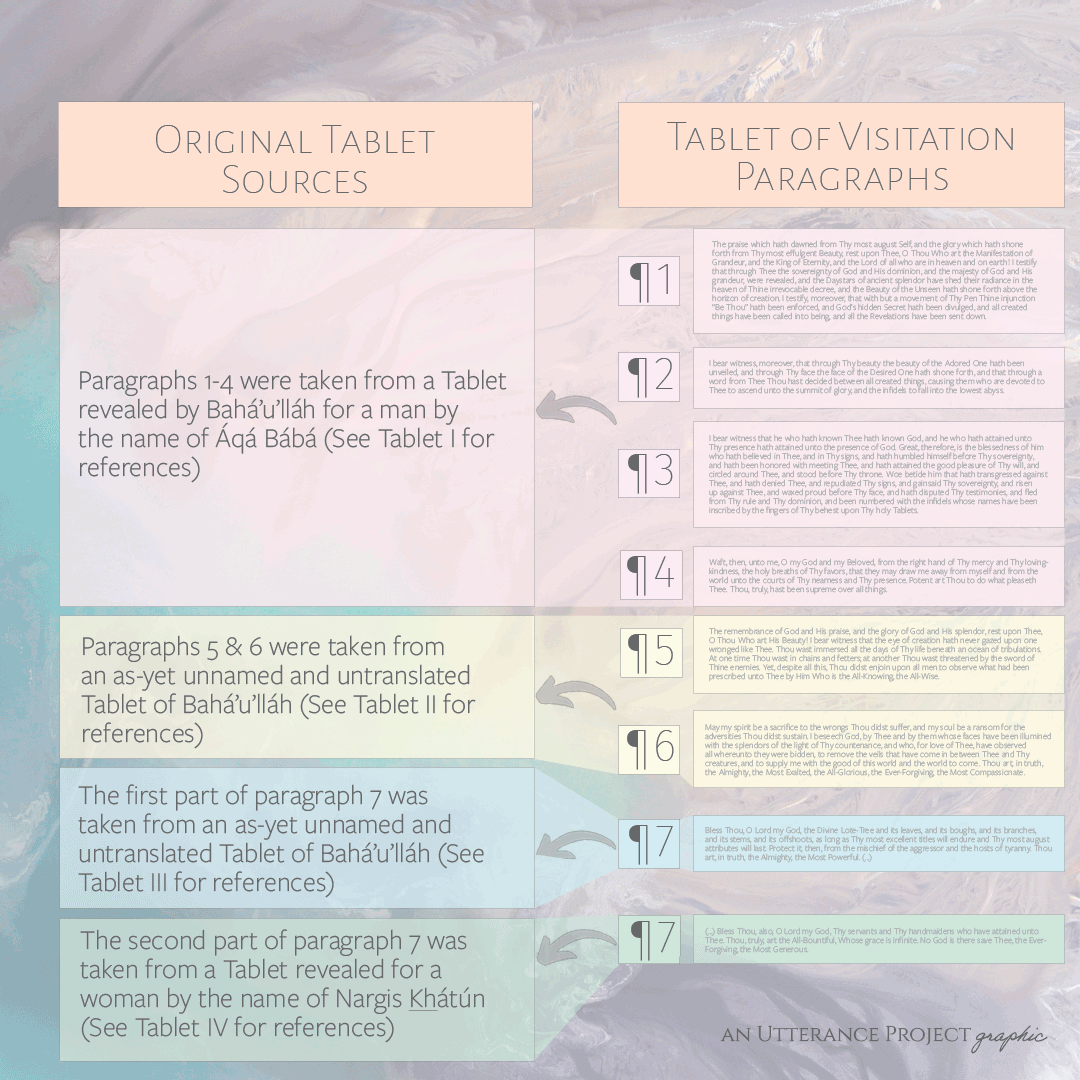
This is a breakdown of the 7 paragraphs of the Tablet of Visitation for Bahá'u'lláh and the Báb, compiled by Nabíl at the request of 'Abdu'l-Bahá. The first four paragraphs, the next two, the first half and the second half of paragraph 7 are taken from four different Tablets. To learn more about the original Tablets, visit this page.
On Tuesday, May 10, 1892 at noon, Bahá'u'lláh summons Nabíl (the eminent Bahá'í historian and author of the Dawn Breakers) and speaks to him for half an hour. After the passing of Bahá'u'lláh, 'Abdu'l-Bahá chooses Nabíl to select and compile the passages which constitute the Tablet of Visitation which is now recited in the Shrines of Bahá'u'lláh and the Báb.
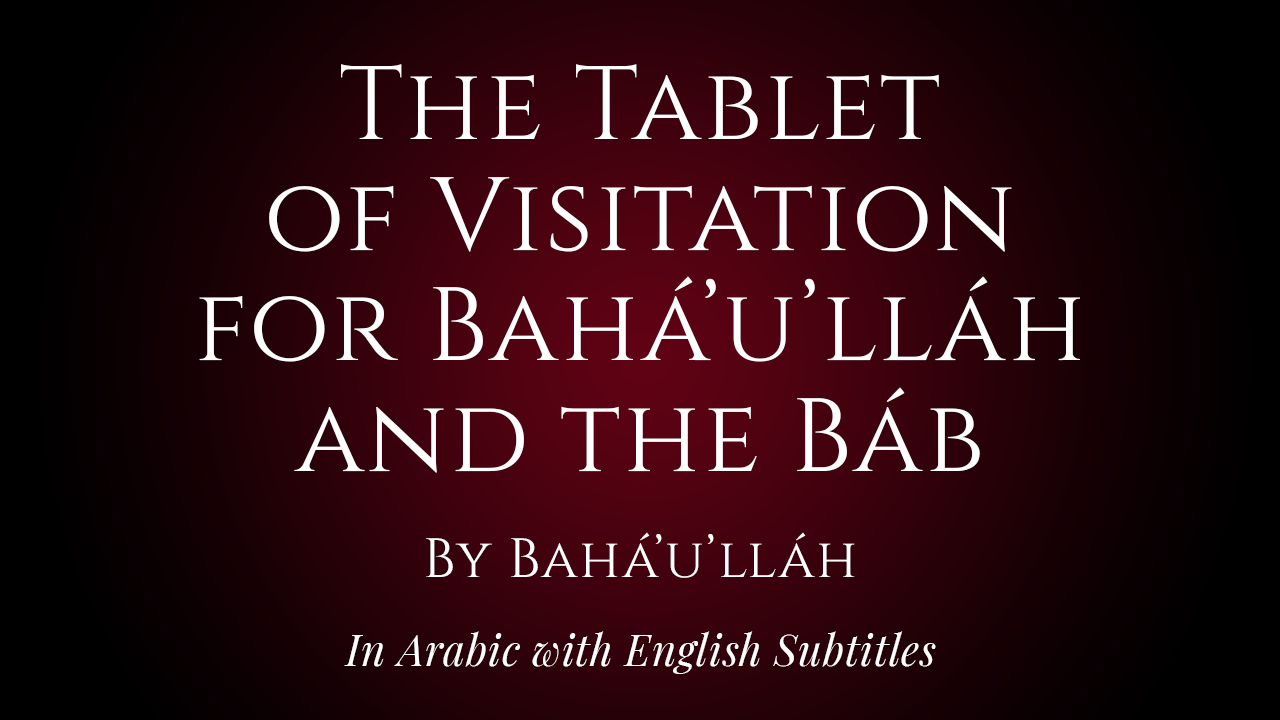
To listen to the entire Tablet of Visitation for Bahá'u'lláh recited in Arabic with English subtitles and transliteration, please click here or on the image above.
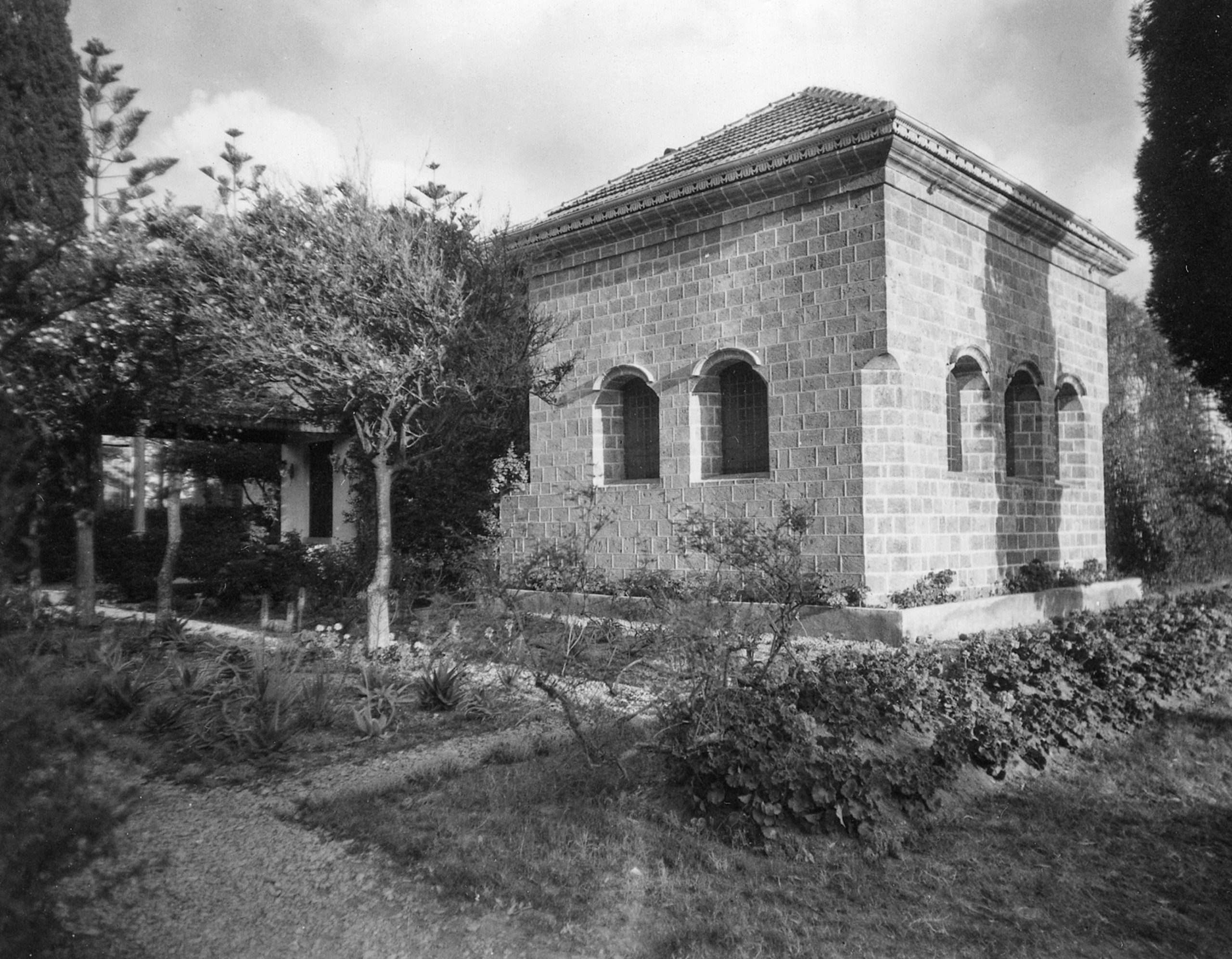
The Shrine of Bahá’u’lláh, 1952. Bahá'í Media Bank.
Two hours after sunset on the day of His Ascension May 29, 1892, Bahá'u'lláh is interred in a small house, right next to the mansion of Bahjí. 'Abdu'l-Bahá chants the funeral prayer and the Tablet of Visitation.
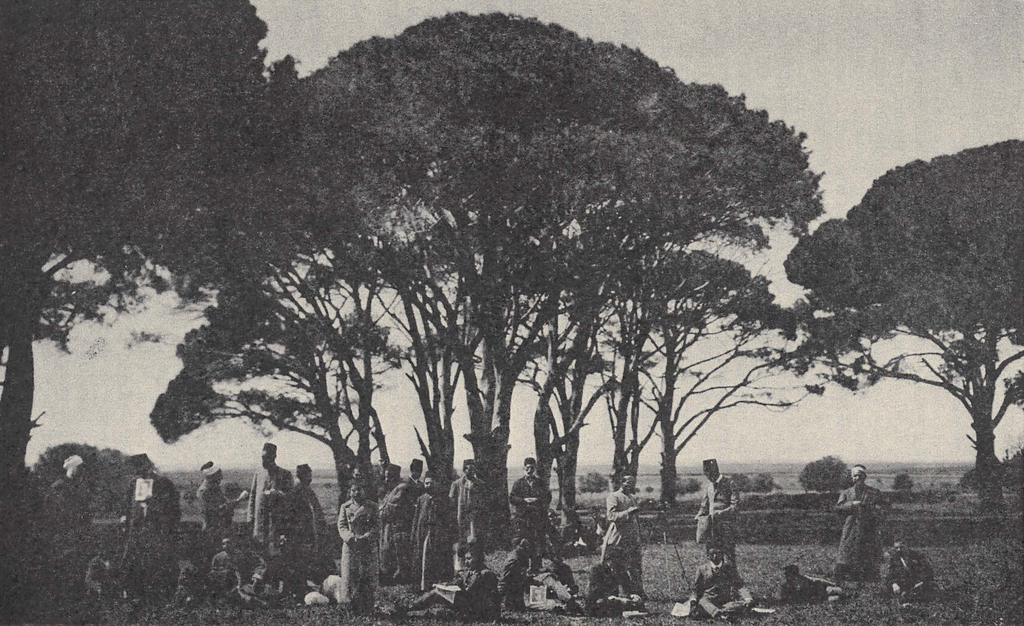
Pilgrims at Bahji in 1914, under the pines where the week of mourning for Bahá'u'lláh takes place in May-June 1892.
The news of Bahá'u'lláh's passing, proclaimed from the minarets of every mosque, spreads throughout the region. People from the surrounding villages in the countryside convert to Bahjí to pay their respects and join in the mourning. Following Arab custom, many Shaykhs bring lambs, rice, sugar and salt as gifts to be distributed to the poor, who, in return for this bounty, pray for the soul of the departed.
Five hundred mourners, rich and poor, Muslim, Christian and Druze, Muftís, mullás, the Governor and officials, Christian priests, arrive during the week to grieve for Bahá'u'lláh with the bereaved family. Most of the guests camp beneath the pine trees at Bahjí. Each dawn, the call to prayer and prayers by Bahá'u'lláh are chanted from the balcony at Bahjí. During this time, poets sing marthíyih, songs in praise of the departed, Shaykhs chant laments and prayers, funeral orations describe Bahá'u'lláh's life of self-sacrifice. 'Abdu'l-Bahá and the Holy Family prepare food for their guests to partake of, day and night. 'Abdu'l-Bahá oversees every detail of the hospitality extended to the community of mourners and donates money to the poor on each of the nine days of this period of mourning.
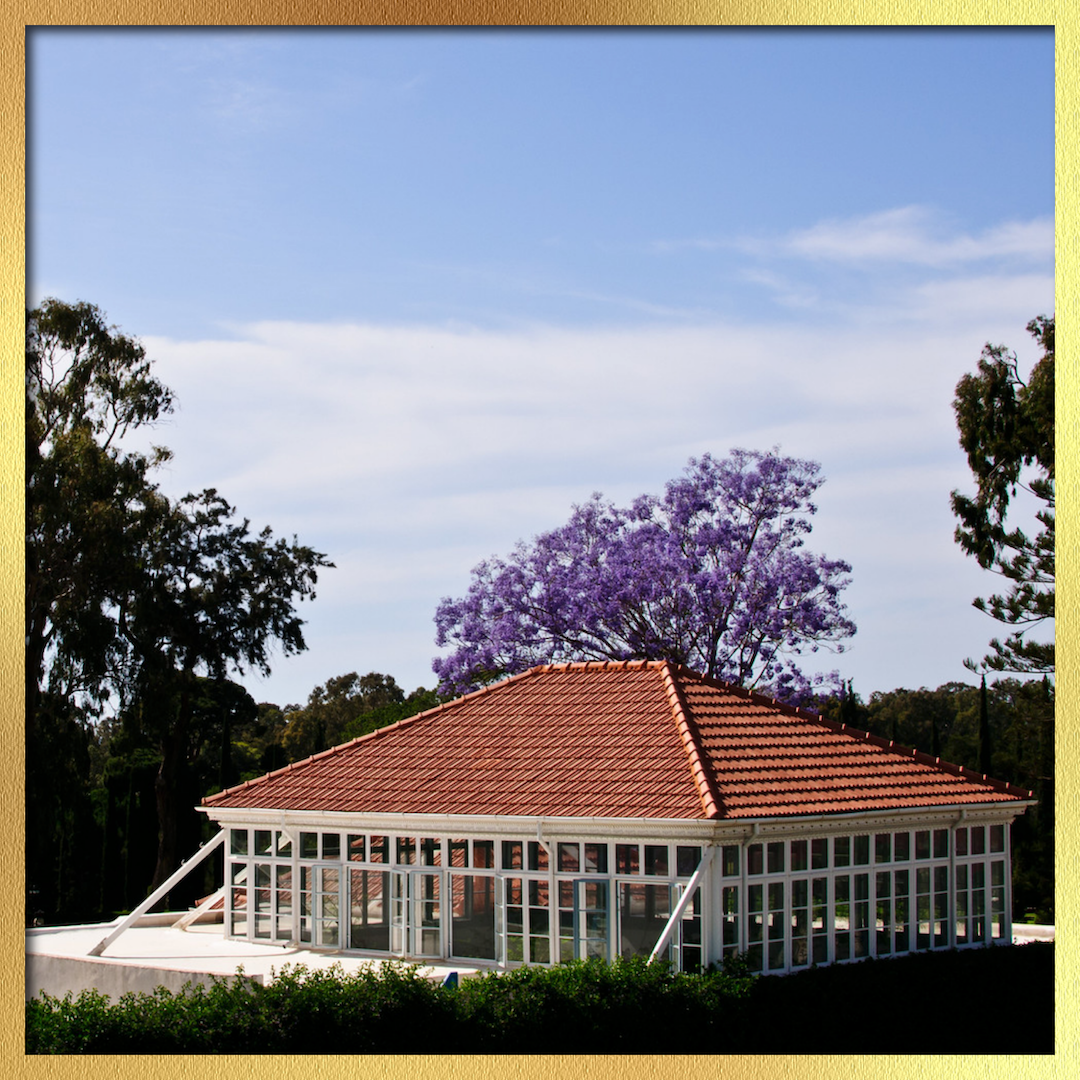
As an illustration of the heavenly praises and tributes, eulogies and cablegrams, letters and poems received by 'Abdu'l-Bahá in the days following the Ascension of Bahá'u'lláh, a celestial view of the Shrine of Bahá'u'lláh by © Chad Mauger, all rights reserved, used with permission. Source: Flickr.
From the second day of the Ascension of Bahá'u'lláh, notables and learned men, Shí‘ahs, Sunnís, Christians, Jews and Druzes, ‘ulamás and government officials, send messages and telegrams of condolences to 'Abdu'l-Bahá. They mourn the loss and magnify the virtues and greatness of Bahá'u'lláh. 'Abdu'l-Bahá also receives tributes in verse and prose from poets. All of these forms of eulogies, in Arabic and Turkish, from as far away as Damascus, Aleppo, Beirut and Cairo, and in which the Master is often praised, are submitted, without exception to 'Abdu'l-Bahá, Who now represents the Cause of Bahá'u'lláh.
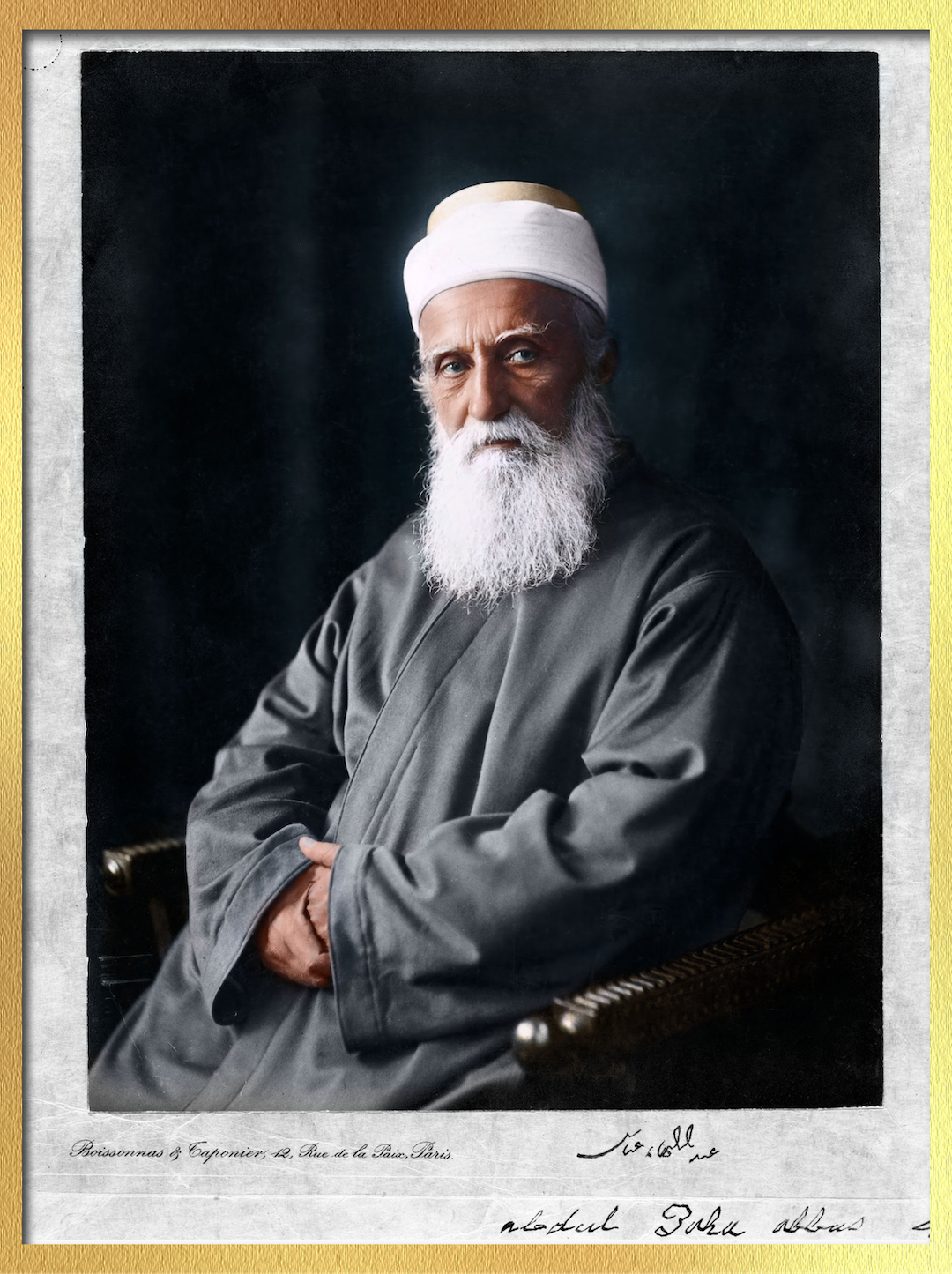
'Abdu'l-Bahá, Center of the Covenant of Bahá'u'lláh. This colorized portrait of Him in Paris in October 1911, was the first He allowed since 1868 in Adrianople, and was taken exactly 19 years after the Ascension of Bahá'u'lláh. 'Abdu'l-Bahá’s signature in Persian and in English can be seen in the bottom right. Source: Bahá'í Media Bank © Bahá'í International Community.
Bahá'u'lláh's forty-year ministry and the most momentous phase of the Heroic Age have ended. The institutions of the Hands of the Cause of God and Ḥuqúqu'lláh, established by Bahá'u'lláh are the beginnings of a New World Order. Bahá'u'lláh's Faith has been proclaimed to the world's leaders and, with the Faith arriving as far away as Burma at the end of Bahá'u'lláh's life, the first banners of a worldwide spiritual conquest are planted. By the end of 'Abdu'l-Bahá's ministry, the Faith of Bahá'u'lláh will have been implanted in sixty countries.
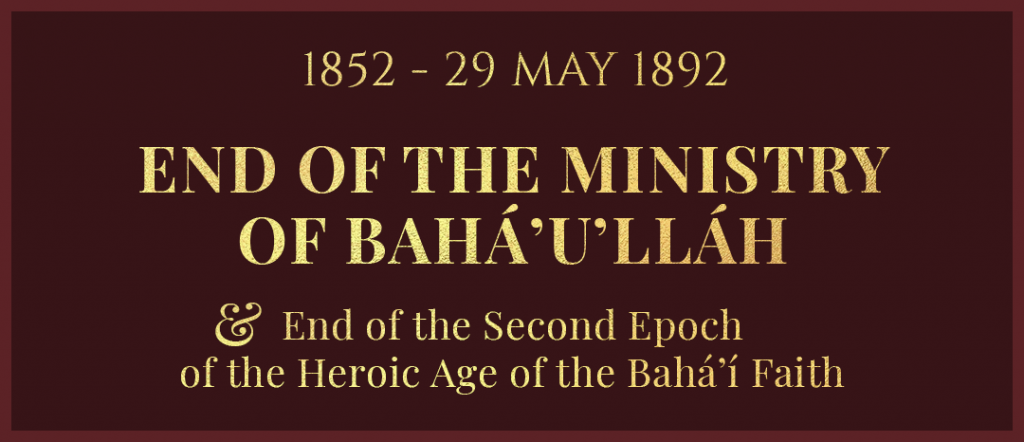
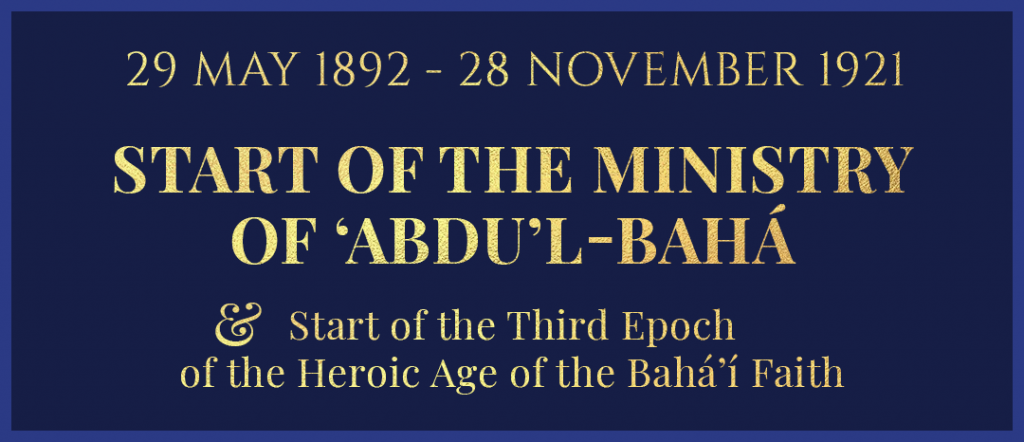
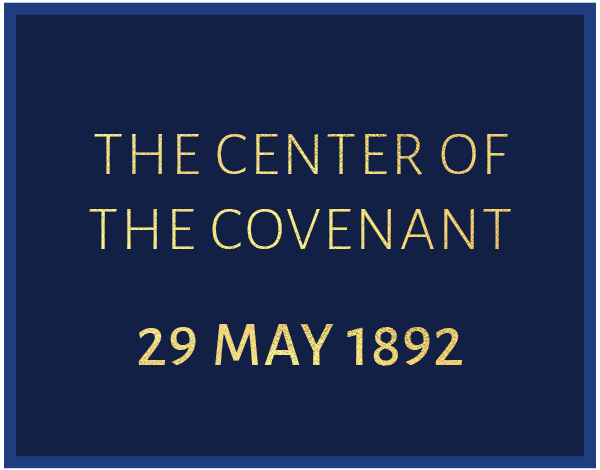
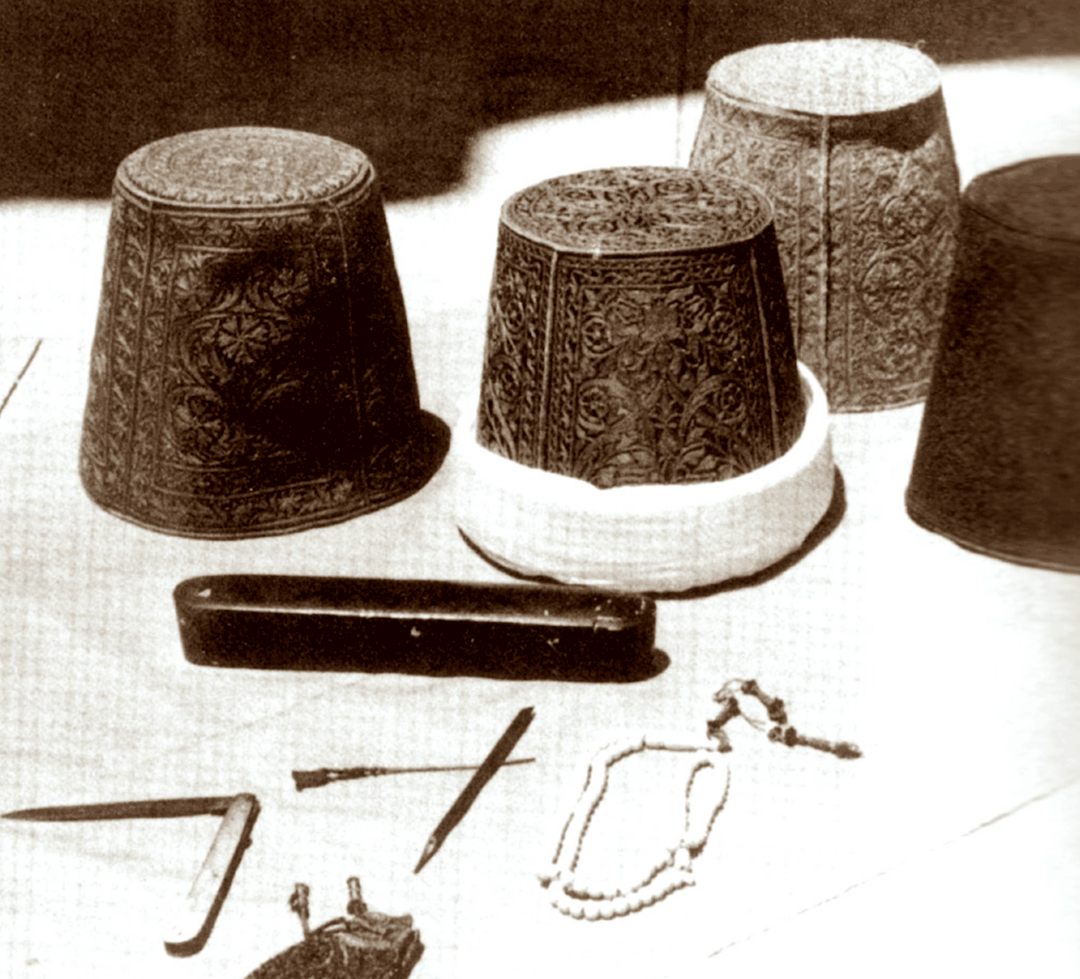
Some relics of Bahá'u'lláh, to illustrate a story relating to His belongings, later stolen by the Covenant-breakers. Source: Bahá'í Sacred Relics.
In the Lawḥ-i-Hizár Baytí (the "Tablet of One Thousand Verses"), 'Abdu'l-Bahá testifies that while He is in attendance by day and night and in a state of deep sorrow and depression. Bahá'u'lláh, as He lays in His bed, orders 'Abdu'l-Bahá to gather all His papers and place them in His two special cases. It had been Bahá'u'lláh's practice, whenever He left Bahjí, to gather His papers in these cases. That He should ask this now of 'Abdu'l-Bahá shakes the Master to the core of His being and He hesitates to comply. Bahá'u'lláh reiterates His orders. It is when 'Abdu'l-Bahá starts to gather the papers, with trembling hands and tearful eyes that Mírzá Maju'd Dín (the evil son of Mírzá Músá and a vicious Covenant-breaker) enters the room and 'Abdu'l-Bahá requests his assistance to finish this painful task. When all the papers, seals and other items are locked into place, Bahá'u'lláh tells 'Abdu'l-Bahá:
These two now belong to you.
The words of Bahá'u'lláh, implying He is not long for this world, pierce 'Abdu'l-Bahá's heart like an arrow.
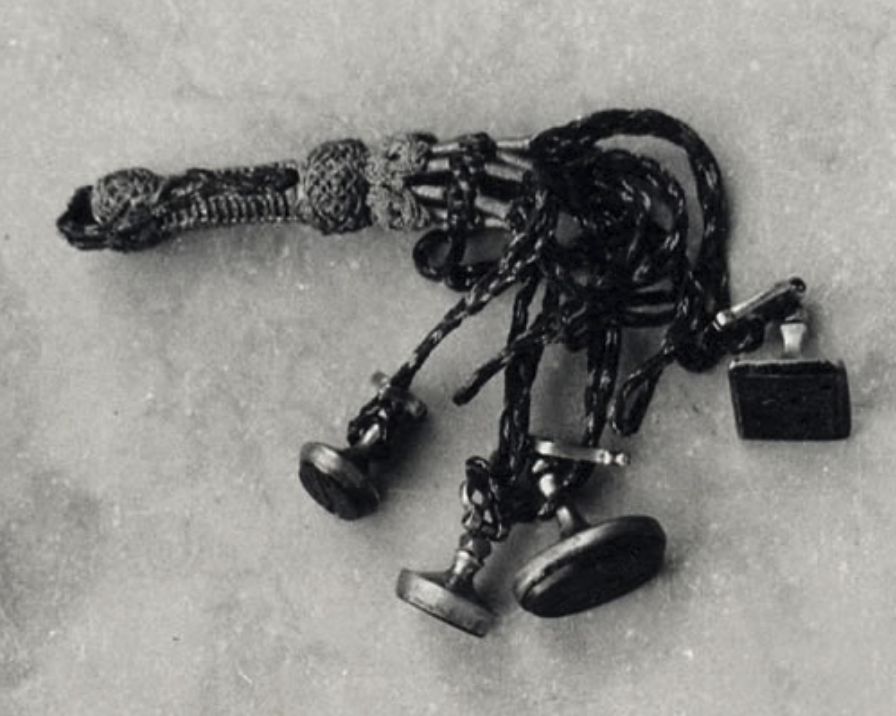
Several of the carved seals of Bahá’u’lláh (not stolen by Mírzá Muḥammad-‘Alí, as those were never recovered) used to stamp letters or tablets to verify the author. Ted Cardell, 1952. The Life of Bahá'u'lláh: A Photographic Narrative.
On the very dawn of the Ascension of Bahá'u'lláh, 'Abdu'l-Bahá is in a state of intense shock. His grief knows no bounds. While in this state, He is making preparations to wash the body of Bahá'u'lláh and befittingly prepare it for interment. Mírzá Muḥammad-‘Alí deceptively suggests that two cases containing Bahá'u'lláh's writing materials, seals, and papers, which are placed near Bahá'u'lláh's bed, risk being damaged by water splashing onto the floor, and he offers to remove them for their safeguard.
‘Abdu'l-Bahá in His current state of grief and shock is almost unconscious of His surroundings, and far from imagining a treacherous plot behind the suggestion. 'Abdu'l-Bahá agrees, and the two cases are removed. This is the last 'Abdu'l-Bahá will ever see of the precious cases and their even more precious contents.
A few days later, a believer requests from 'Abdu'l-Bahá the honor of having a seal affixed to a Tablet he has received from Bahá'u'lláh. When 'Abdu'l-Bahá asks Mírzá Muḥammad-‘Alí to bring the seals, His treacherous half-brother not only claims he does not know where they are but denies ever having received them.
But Mírzá Muḥammad-‘Alí did not take the two cases for the seals and writing materials. He had been after the Kitáb-i-'Ahd. 'Abdu'l-Bahá, in a heartbreaking Tablet to a Bahá'í of Shíraz, speaks about this first act of Covenant-breaking:
The centre of violation purloined, in its entirety, the Divine trust which specifically appertained to this servant. He took everything and returned nothing. To this day the usurper unjustly remains in possession. Although each single item is more precious for 'Abdu'l-Bahá than the dominion of earth and heaven, till now I have kept silent and have not breathed a word, lest it bring us into disrepute amongst strangers. This was a severe blow to me. I suffered, I sorrowed, I wept, but I spoke not.
‘Abdu’l-Bahá: The Centre of the Covenant of Bahá’u’lláh page 54.
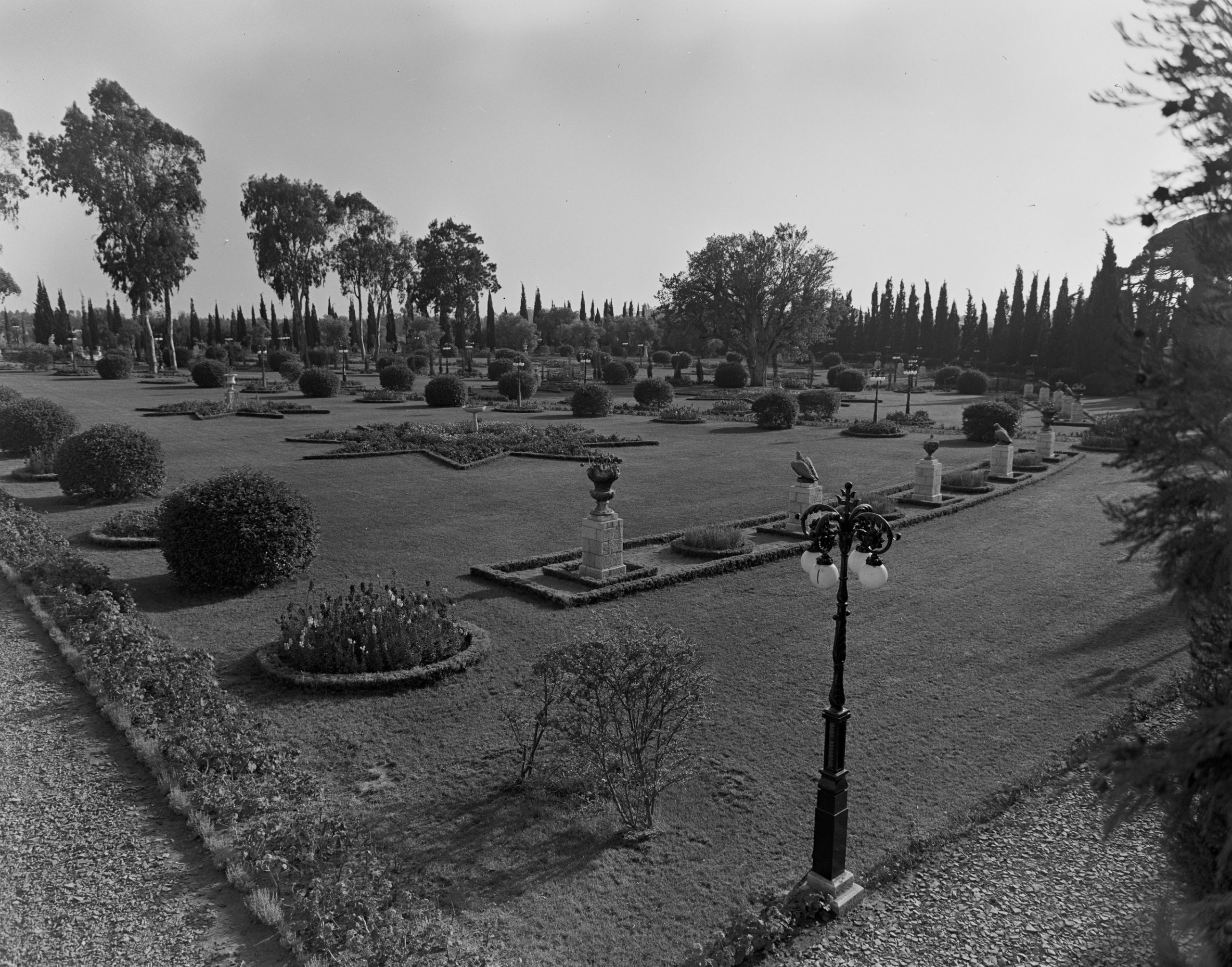
The gardens at Bahjí in the 1960s. Although the gardens did not have this appearance in 1892, this is in the general vicinity of where the story you are about to read takes place. Bahá'í Media Bank.
'Abdu'l-Bahá, inconsolable and heartbroken after the Ascension and interment of Bahá'u'lláh does not rest or sleep for three consecutive days or nights. He weeps for hours in a permanent state of unbearable grief. On the fourth night after the Ascension, around midnight, He rises from His bed and paces, hoping it might bring his agonizing heart some peace.
As He paces, 'Abdu'l-Bahá sees, through the window a nightmarish scene: His Covenant-breaking brothers have opened Bahá'u'lláh's cases and are rifling through the papers which Bahá'u'lláh had entrusted to Him as one of His last earthly wishes. Betrayed in the most poisonous manner imaginable, 'Abdu'l-Bahá still does not want His brothers to know He has seen them breaking the Covenant, and returns to bed, unbeknownst to them.
In the Kitáb-i-Ahd, Bahá'u'lláh specifically denies His sons “any right to the property of others." A law Mírzá Muḥammad-‘Alí violates only a few hours after Bahá'u'lláh has passed away.
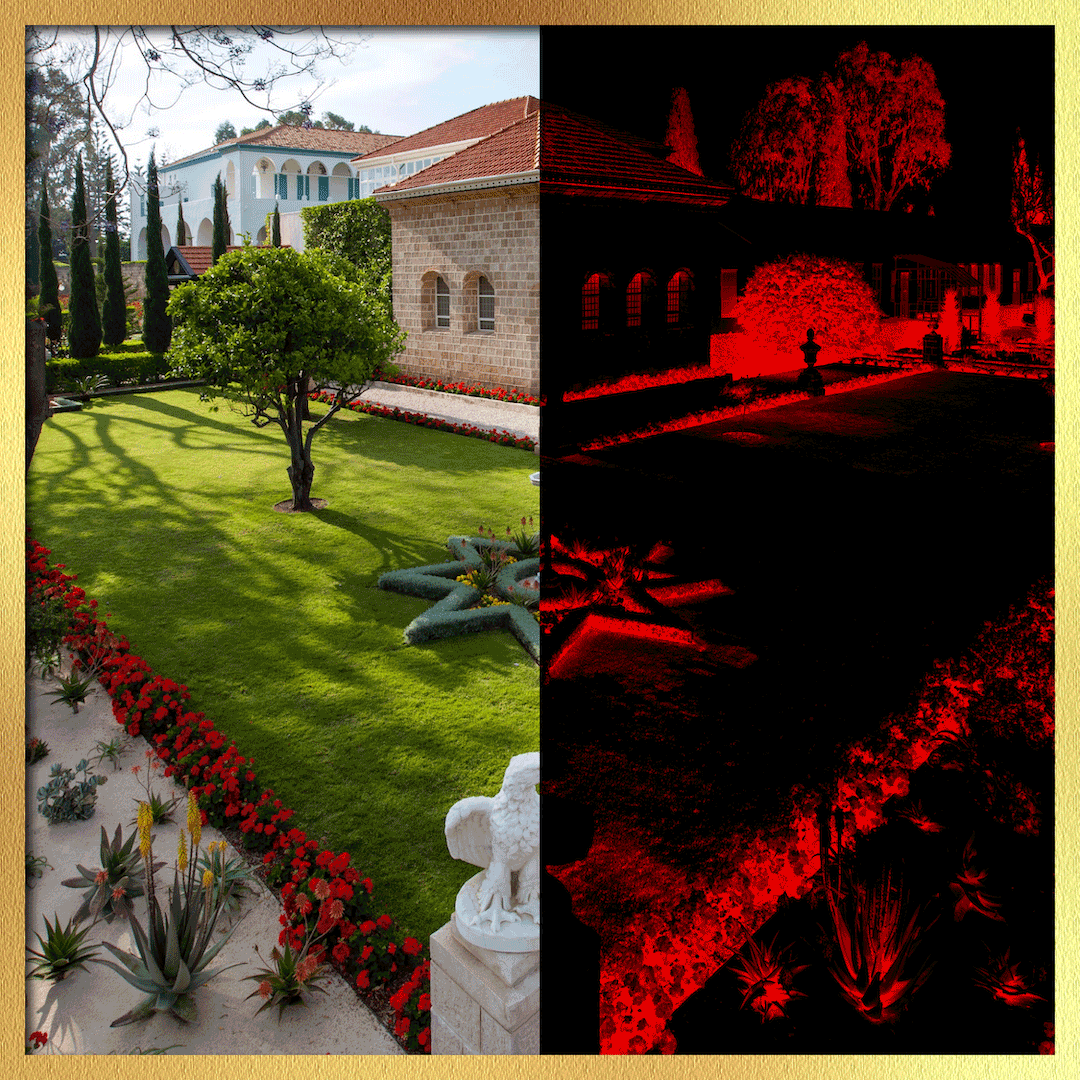
An illustration of those who turned towards and against the Covenant after the Kitáb-i-‘Ahd was made public, afforded by the perfect symmetry of the gardens around the Shrine of Bahá'u'lláh, the Ḥaram-i-Aqdas (Most Holy Precincts) designed by Shoghi Effendi. Source: Bahá'í Media Bank © Bahá'í International Community.
Sometime after the Ascension of Bahá'u'lláh, 'Abdu'l-Bahá sends to `Akka for the box in which the Will of Bahá'u'lláh, the Kitáb-i-'Ahd had been locked up for safekeeping. On the ninth day after the passing of Bahá'u'lláh, nine believers, including members of the Holy Family chosen by 'Abdu'l-Bahá, gather to witness the breaking of the seal and the first reading of the Will and Testament of Bahá'u'lláh.
The Kitáb-i-'Ahd is read once again, in the afternoon by Mírzá Mají'd Dín in the Shrine of Bahá'u'lláh in front of a large group of believers which include the descendants of Bahá'u'lláh, the Aghsán, the descendants of the Báb, the Afnán, pilgrims and resident believers. 'Abdu'l-Bahá had hoped that the reading of the Kitáb-i-'Ahd would allow the unfaithful to put their trust back in Him, but the Master bears witness that once the contents of the Kitáb-i-'Ahd have been read, the faces of the faithful beam with joy and those of the falsehearted are darkened with gloom. 'Abdu'l-Bahá states that the fire of the Covenant-breaking was lit on this day, that the flame would grow fierce with the passage of time, turning into a fire that would consume the hearts and souls of the faithful in its wake. The Kitáb-i-'Ahd's contents, in effect, divide the Bahá'í community in two: those faithful to the Covenant of Bahá'u'lláh, and loyal to 'Abdu'l-Bahá, and the Covenant-breakers.
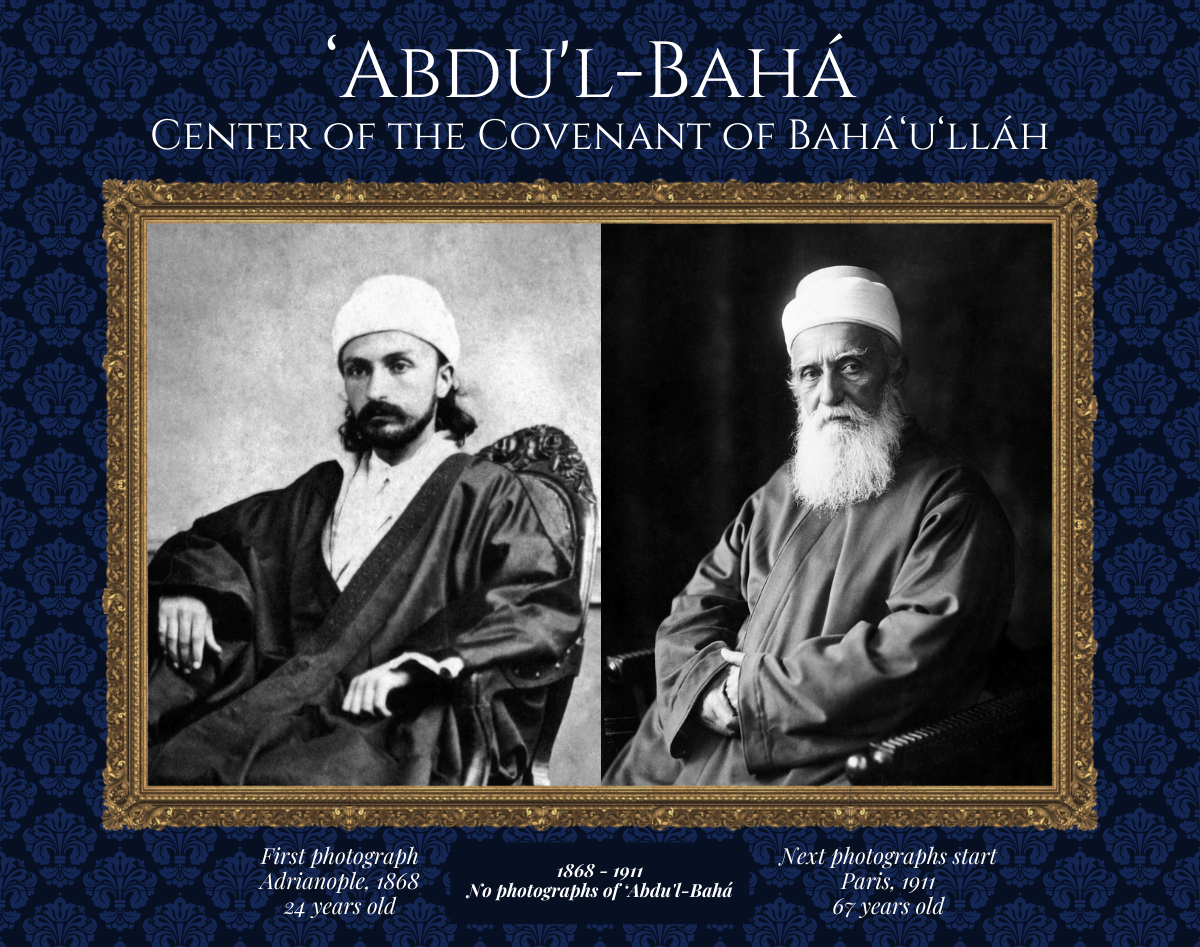
The Kitáb-i-'Ahd is described by Shoghi Effendi as a "unique and epoch-making document." Bahá'u'lláh Himself designates the Kitáb-i-'Ahd as His “Most Great Tablet,” further refers to it as the “Crimson Book” in His Epistle to the Son of the Wolf. Shoghi Effendi further states that no equivalent or parallel to the Kitáb-i-'Ahd can be found in any of the previous Dispensations of the past, and includes the Báb's Dispensation. There is no single document in the history of religion that so clearly establishes a Covenant of such inviolable authority, as that which Bahá'u'lláh institutes with the Kitáb-i-'Ahd. In the ninth paragraph of the Book of the Covenant, Bahá'u'lláh clearly and unequivocally designates 'Abdu'l-Bahá, known to all as "The Most Mighty Branch," as His successor:
The Will of the divine Testator is this: It is incumbent upon the Aghsán, the Afnán and My Kindred to turn, one and all, their faces towards the Most Mighty Branch. Consider that which We have revealed in Our Most Holy Book: “When the ocean of My presence hath ebbed and the Book of My Revelation is ended, turn your faces towards Him Whom God hath purposed, Who hath branched from this Ancient Root.
Bahá'u'lláh, The Kitáb-i-‘Ahd
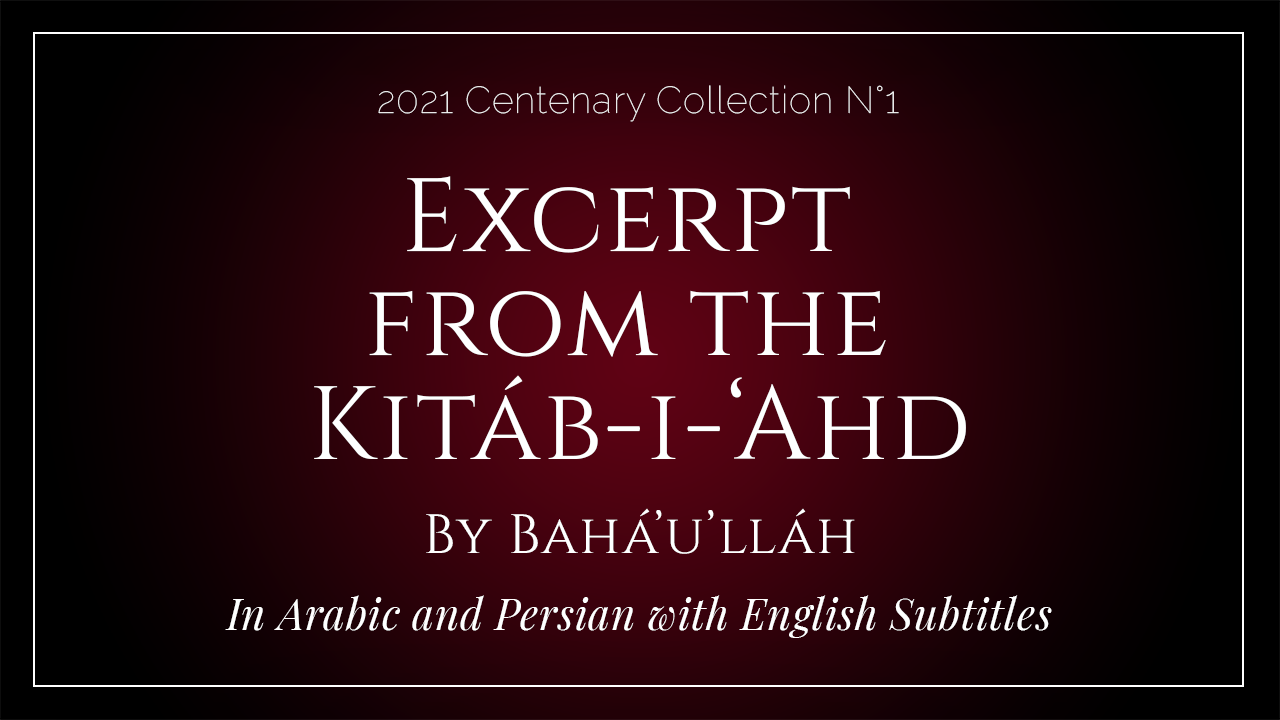
Click on the image above to listen to paragraph 9 of the Kitáb-i-'Ahd, recited in Persian and Arabic and subtitled in English with transliteration. Paragraph 9 is where Bahá'u'lláh names 'Abdu'l-Bahá as His unequivocal successor.
As 'Abdu'l-Bahá takes on the mantle of Center of the Covenant and begins His Ministry, he is 48 years old, imbued with all the spiritual qualities and strength of character needed to carry out this sacred mission. For almost thirty years He has been the chief administrator of the Bahá’í community. These three decades, He has also faithfully represented Bahá’u’lláh and interacted on His behalf with bureaucrats, Ottoman officials, Governors, military officers and unfaithful family members. It is now abundantly clear to friend and foe alike that 'Abdu'l-Bahá cannot be dominated or intimidated. 'Abdu'l-Bahá is endowed with extraordinary combination of characteristics: He possesses immense knowledge coupled to an unmatched intellect, absolute integrity, powerful spiritual charisma, and a wonderful sense of humour. 'Abdu'l-Bahá's qualities are not merely spiritual or intellectual, but also physical. Since His early youth in Baghdád, he has been a superb horse rider, and we saw in Part II that He is also a strong swimmer. 'Abdu'l-Bahá's bearing is majestic, and He is always dressed impeccably, with a simple cloak or ‘abá and a white turban.
There are no photographs of 'Abdu'l-Bahá in middle age, between 1868 and 1911. So here are two photographs of 'Abdu'l-Bahá, 24 years before and 19 years after ‘Abdu'l-Bahá became the Center of the Covenant in 1892:
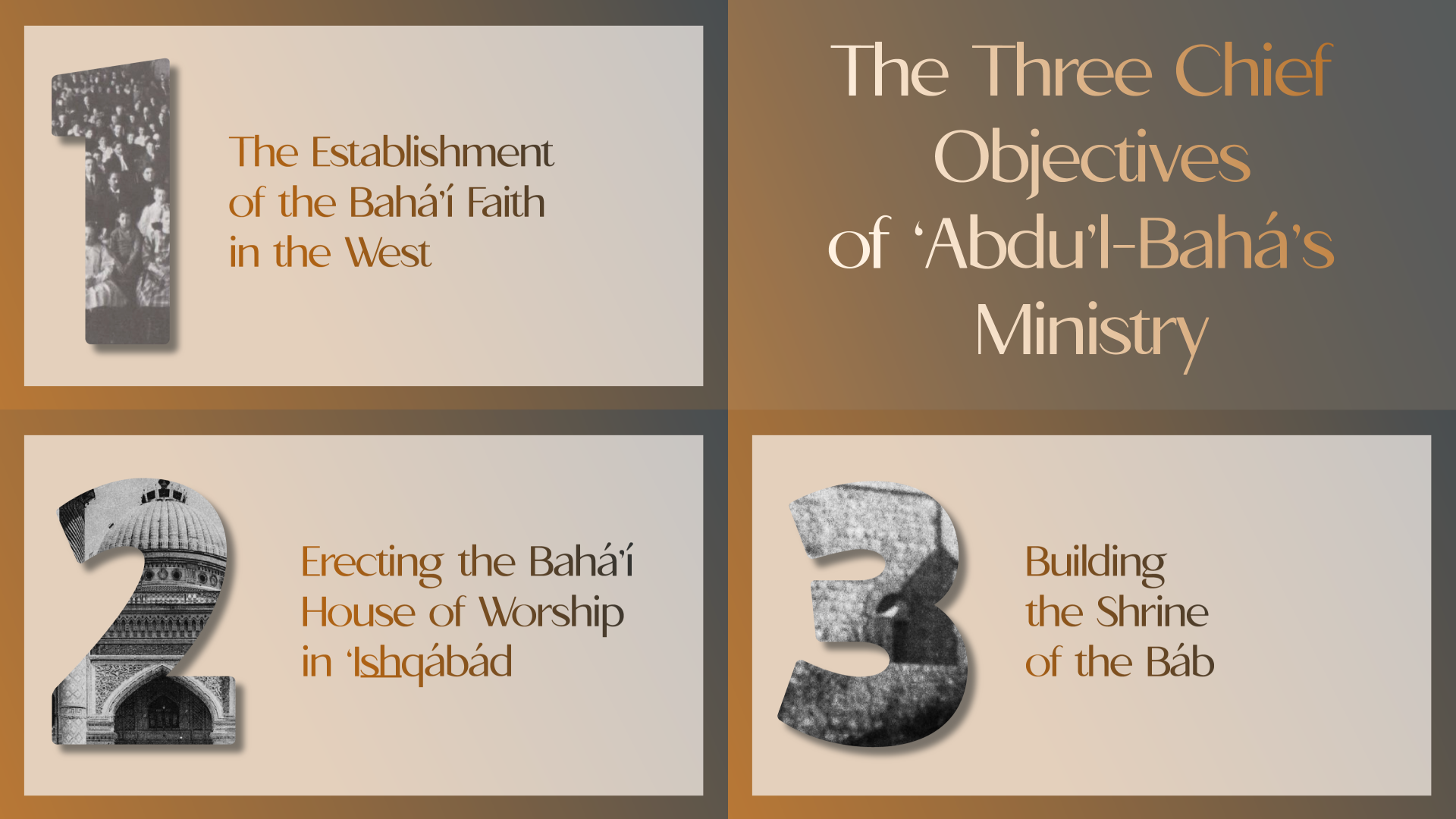
Graphic © Violetta Zein.
On April 21, 1933, Shoghi Effendi writes a letter to the Bahá'ís of the United States and Canada called "America and the Most Great Peace." In this letter, Shoghi Effendi recalls ‘Abdu’l-Bahá Himself, mentioning on more than one occasion, that the establishment of the Bahá'í Faith in the North American continent ranks as one of the important of the three chief objectives of His ministry. In response to a believer who writes in shortly after enquiring as to what the other two objectives are, Shoghi Effendi clearly lists all three objectives of the Ministry of 'Abdu'l-Bahá as stated by the Master Himself:
The first objective is the establishment of the Bahá'í Faith in America.
The second is the building of the Bahá'í House of Worship in 'Ishqábád.
The third is the building of the Shrine of the Báb.
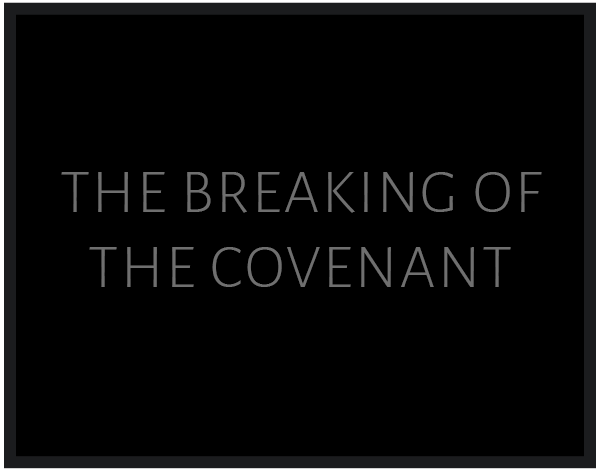
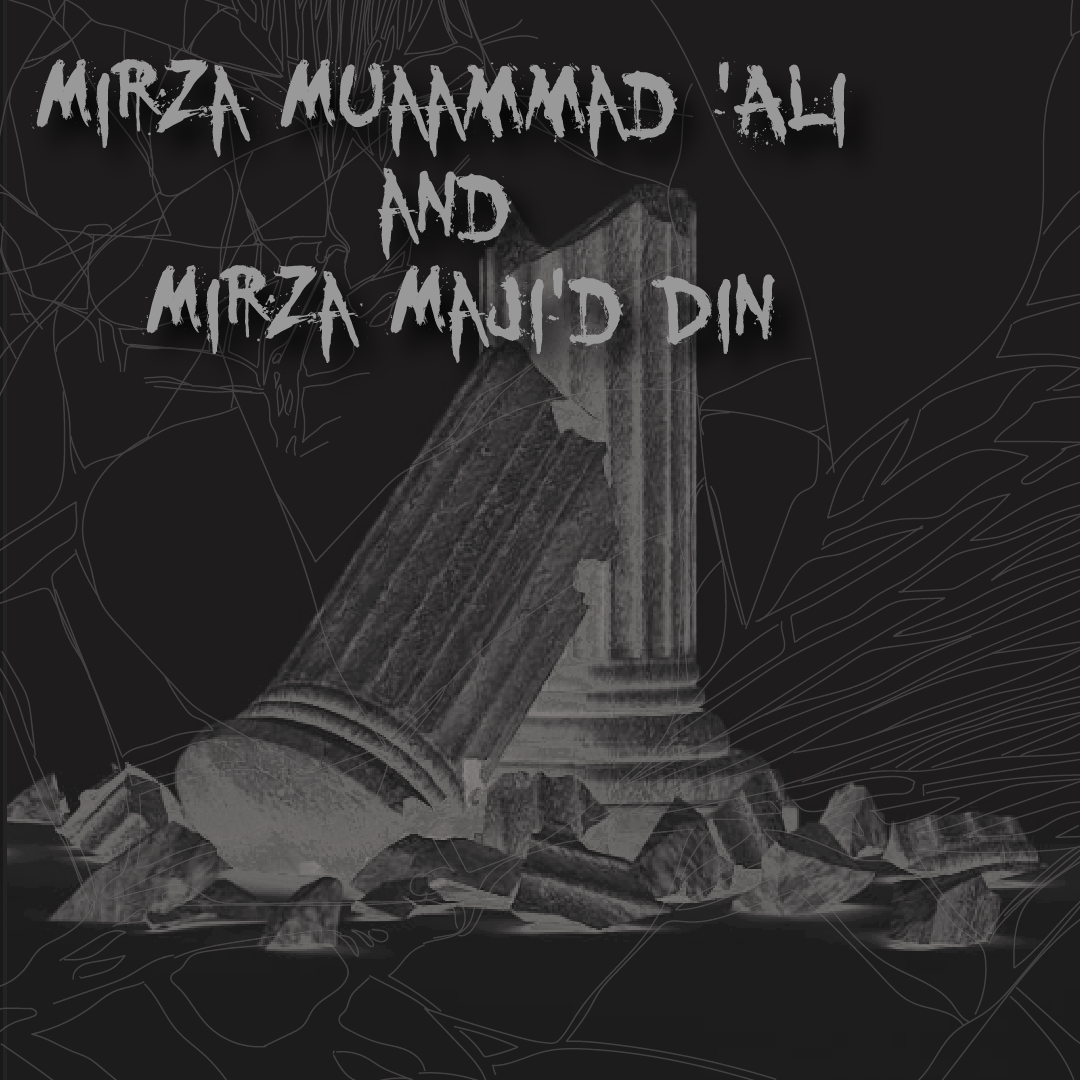
© 2023 Violetta Zein.
The main agitators in the crisis of Covenant-breaking that will roil for four years from the Ascension of Bahá'u'lláh, then continue on as attacks are Mírzá Muḥammad ‘Alí and Mírzá Mají'd Dín, the dangerous and devious son of Mírzá Músá, Bahá'u'lláh's faithful younger brother who passed away five years prior.
He is the most treacherous of all the members of the Holy Family, and 'Abdu'l-Bahá's most formidable enemy by far. Mají'd Dín is the backbone and principal instigator ofthe scheming Mírzá Muḥammad ‘Alí, 'Abdu'l-Bahá's half-brother and the arch-breaker of the Covenant of Bahá'u'lláh. Mají'd Dín is the one who reads Bahá'u'lláh's Will and Testament the second time on May 29, 1892 in the Holy Tomb, in the presence of the believers.
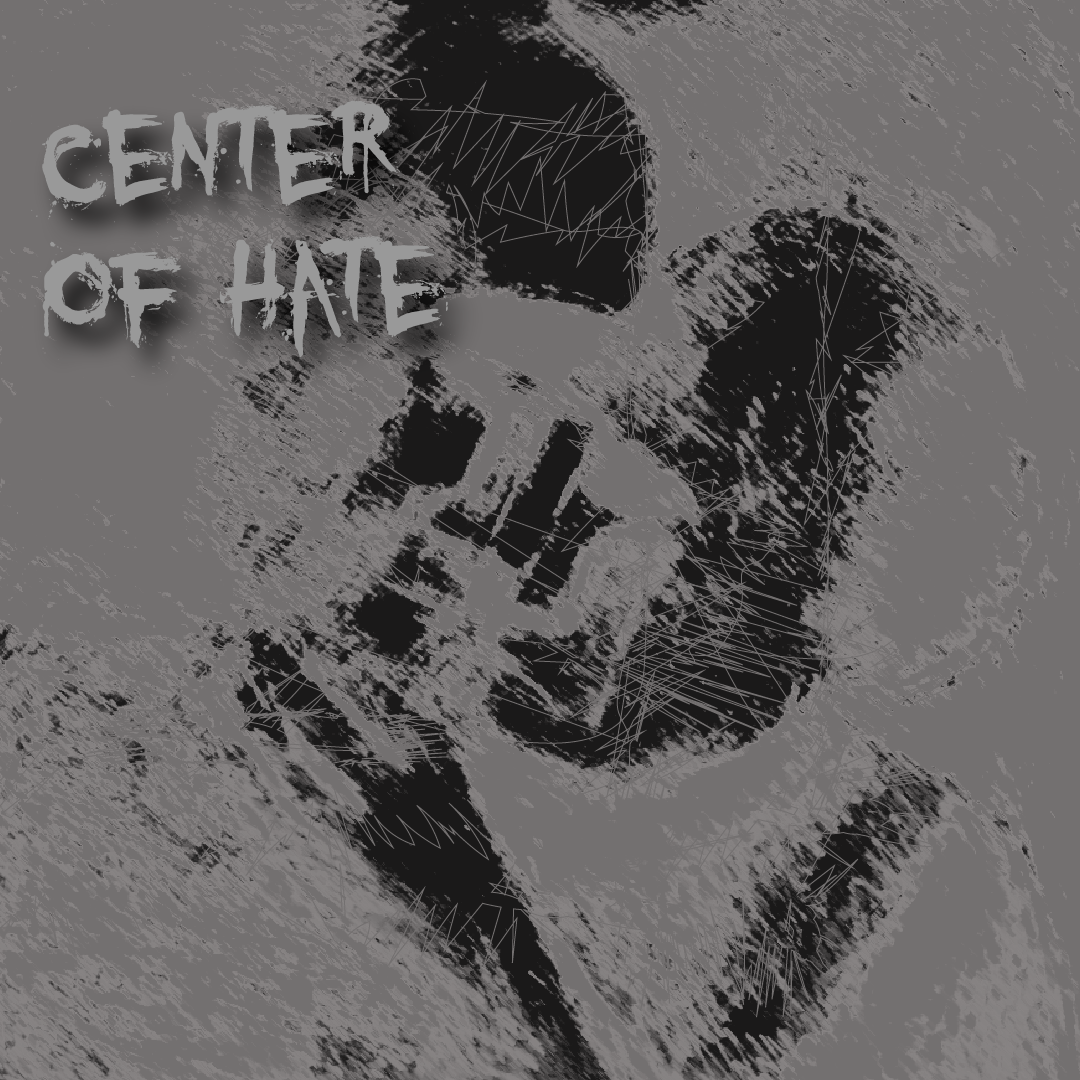
© 2023 Violetta Zein.
'Abdu'l-Bahá sometimes refers to Mírzá Muḥammad ‘Alí as "the Center of Hate." At the very deepest heart of this crisis is the raging, uncontrollable, soul-devouring jealousy Mírzá Muḥammad ‘Alí and some of his closest relatives, including Mírzá Mají'd Dín, feel towards 'Abdu'l-Bahá. 'Abdu'l-Bahá's unattainable superiority and preeminence in rank, in spiritual power, in intellectual abilities, in the immensity of His knowledge, in His saintly character and virtues, in all His incalculable perfections, which should be the cause of joy, love and devotion in any sane and healthy heart, turn to ash in the Covenant-breakers hearts who feel only blind envy, the same kind of blind envy that had caused Mírzá Yaḥyá to break the Covenant of the Báb.
This jealousy had been festering and smouldering in the recesses of Mírzá Muḥammad-‘Alí’s heart for some years, and the flame had slowly been fed by the numerous marks of respect, favor, distinction and admiration accorded to 'Abdu'l-Bahá not only by Bahá'u'lláh, but also by the pilgrims, believers, notables and citizens of 'Akká, and places beyond such as Nazareth or Beirut.
Covenant-breaking, in the end, is a disastrously simple story of jealousy and hatred proportional with the infinite perfections and innate greatness which 'Abdu'l-Bahá has never ceased to manifest from His earliest childhood. At the beginning of His Ministry, 'Abdu'l-Bahá is forsaken, betrayed, and assaulted by nearly His entire family, all congregated in the Mansion of Bahjí, next to the Shrine of Bahá'u'lláh. In the last decades, 'Abdu'l-Bahá has lost His four sons, His beloved mother and faithful uncle, His father and can now count on the support of only a handful of loyal allies: His sister, His wife, His four unmarried daughters and one of His uncles.
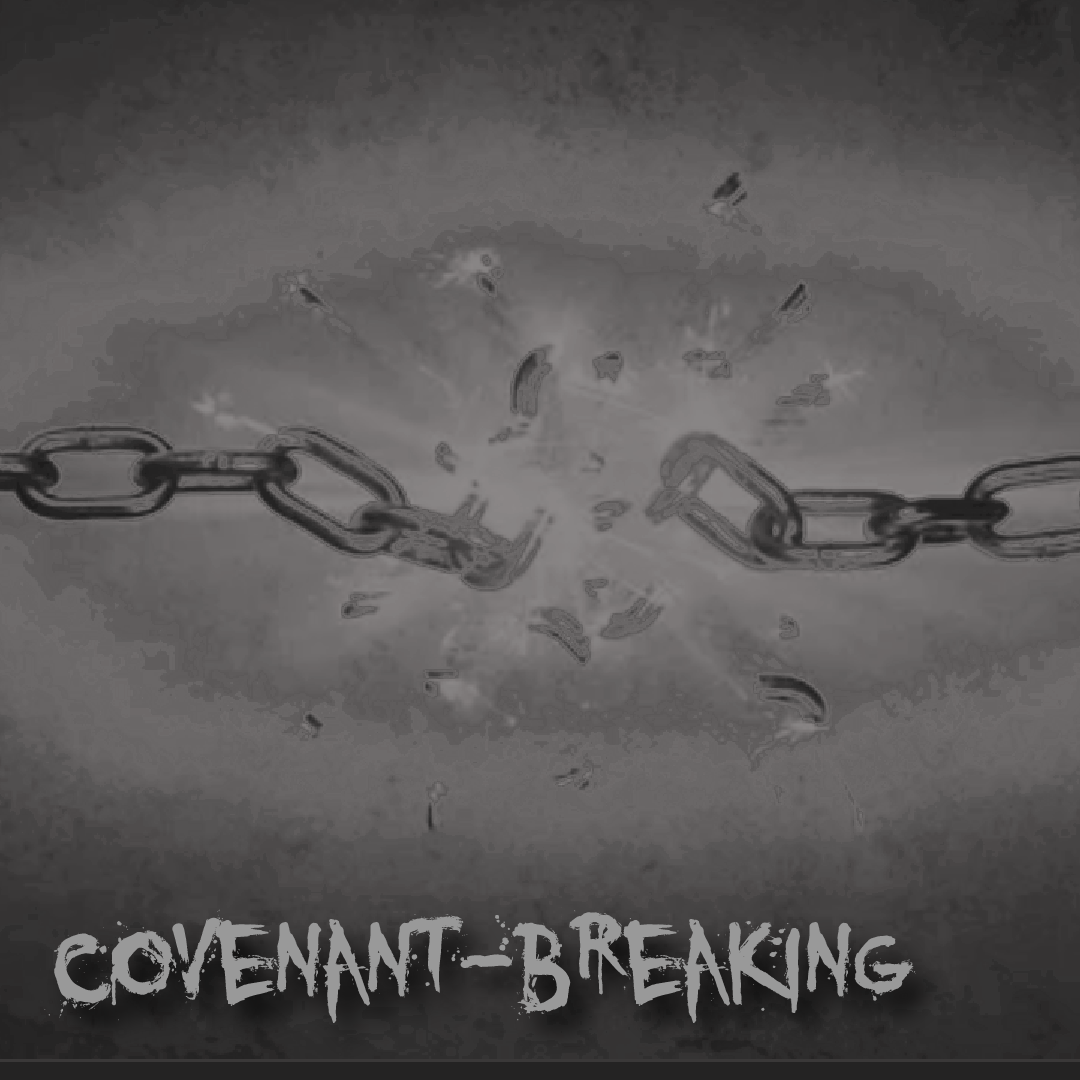
© 2023 Violetta Zein.
The crisis caused by these two individuals will profoundly agitate the hearts and minds of a large number of believers in the East. They will cast a dark shadow on the Covenant so clearly established by Bahá'u'lláh and cause an irreparable rift in the ranks of the Holy Family, ominously sealing the spiritual fate of many of them in its wake. Although they will never succeed in causing any permanent damage to its institutions, the Covenant-breakers, for a time, do gravely damage the prestige of the Faith.
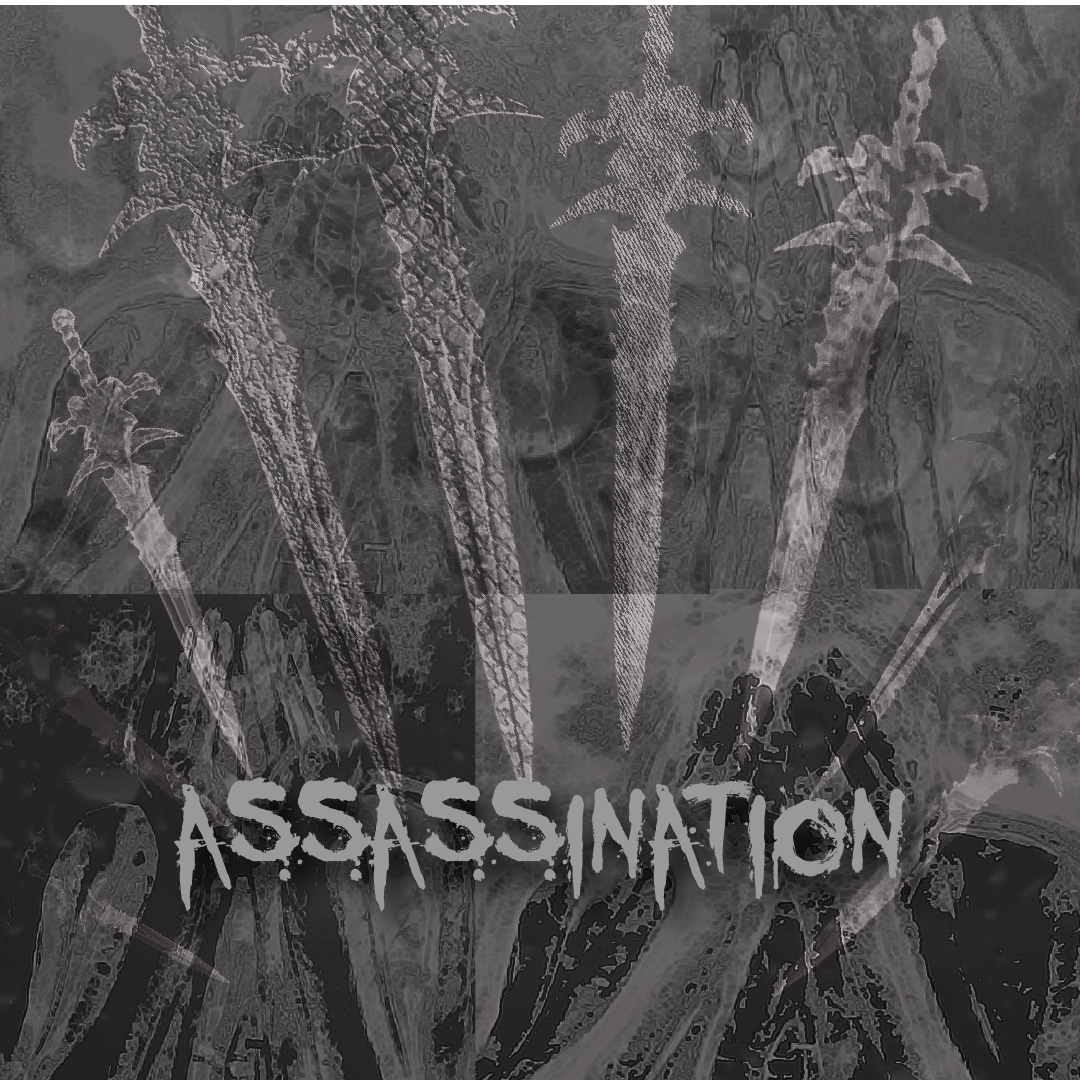
© 2023 Violetta Zein.
One of the most disgraceful and horrific episodes of the Covenant-breaking of this period is a plan to assassinate 'Abdu'l-Bahá during the dark years around 1901-1902, concocted by Mírzá Muḥammad ‘Alí, on the absurd pretense that 'Abdu'l-Bahá was claiming to be a new Manifestation of God.

© 2023 Violetta Zein.
These years are so perilous, that in a Tablet to Ḥájí Mírzá Muḥammad-Taqí, the cousin of the Báb, 'Abdu'l-Bahá gives him instructions, should anything happen to Him, to make arrangements, if and when it becomes necessary, for the election of the Universal House of Justice. He directs him to gather then Afnán (the relatives of the Báb) and the Hands of the Cause in one place and elect the Universal House of Justice in accordance with provisions He has stipulated in His Will and Testament.
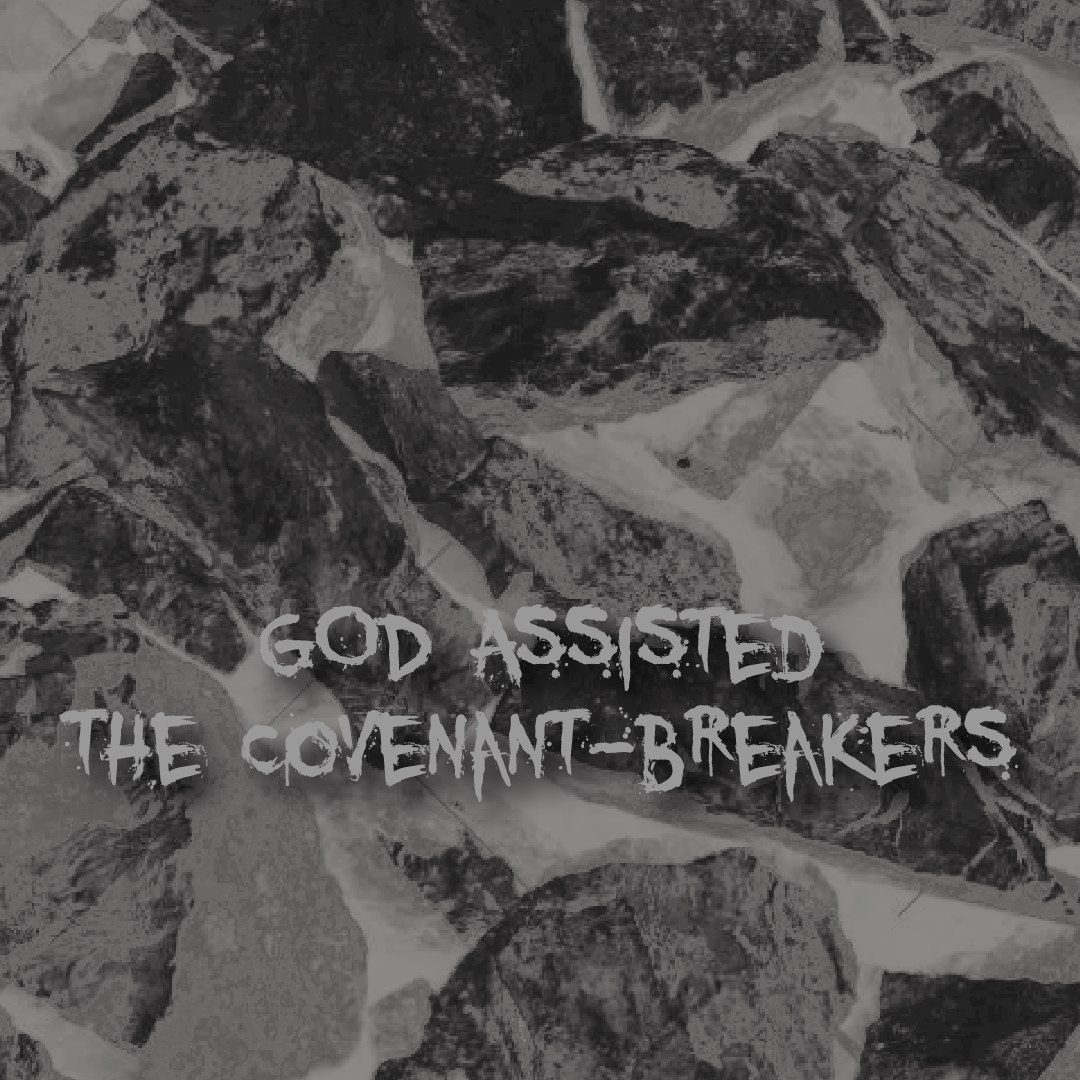
© 2023 Violetta Zein.
Adib Taherzadeh relates to us an incredible story in his book The Covenant of Bahá’u’lláh on page 233: 'Abdu'l-Bahá, in one of His talks, provides an extraordinary perspective on Covenant-breaking and the attacks on Him during the entirety of His ministry. 'Abdu'l-Bahá says that God always assisted the Covenant-breakers in their plots during His ministry. God enabled them to make every possible breach in the stronghold of the Cause of God in order that 'Abdu'l-Bahá might stop each and every breach, fill and strengthen them, so that no one, in the future would ever be able to repeat those attacks against the Faith.
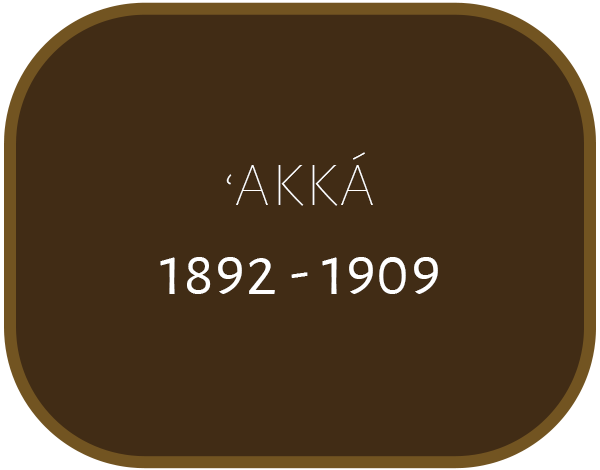
In this part of the "Extraordinary Life of 'Abdu'l-Bahá," from 1892 to 1909, covering the years when 'Abdu'l-Bahá is between 48 and 65, there are two main sections: His life in 'Akká from the Ascension of Bahá'u'lláh in 1892 to His freedom from the Ottoman regime in 1908 and the transfer of His residence in Haifa in 1909, one month before He departs for His Journeys to the West.
The two parts are, necessarily, out of balance, but the chronology could not be divided in any other way. The 'Akká years are incredibly intense, though 'Abdu'l-Bahá does not always stay in 'Akká. He travels to Haifa, Tiberias, even 'Adasíyyih, in the Jordan valley.
The Covenant-breakers scheme and plot, 'Abdu'l-Bahá gets reincarcerated within 'Akka and His life is threatened multiple times, the first Western pilgrims come to see Him, and from the walls of the prison city, 'Abdu'l-Bahá directs the construction of the Shrine of the Báb in Haifa, the building of the first House of Worship in 'Ishqábád, the restoration of the House of the Báb in Shíráz, the beginnings of a large agricultural enterprise 60 kilometers away, the growth and incorporation of the Persian and American Bahá'í Community, who both officialize their administrative orders in this time.
Accordingly, there is a system of color-coding within the chronology, which is not accessible by links, but will clearly indicate which theme is being dealt with in that section:
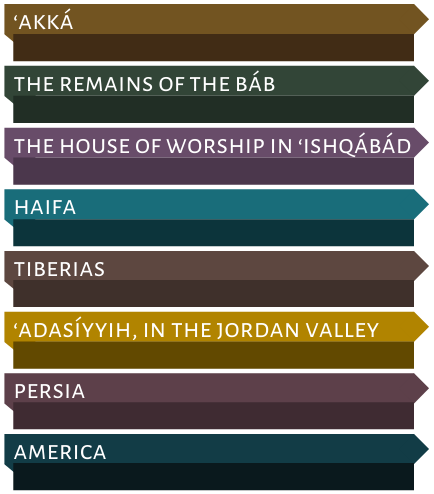
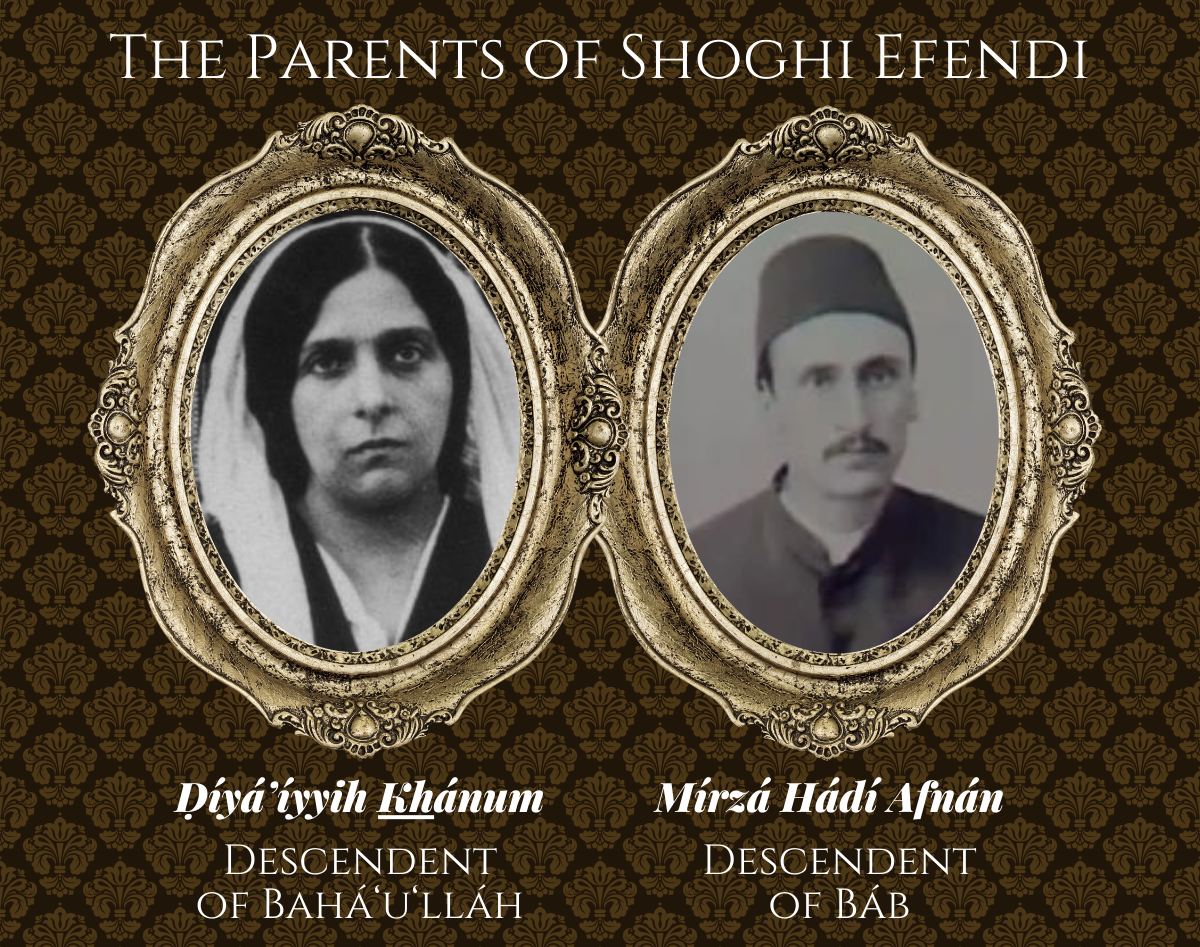
Left: Ḍíyá’íyyih Khánum, 'Abdu'l-Bahá's eldest daughter, mother of Shoghi Effendi. Bahaipedia. Right: Mírzá Hádí Afnán, the father of Shoghi Effendi. Bahá'í Culture.
Mírzá Hádí Afnán, a descendent of the Báb and the future father of Shoghi Effendi ends his pilgrimage with his family. He and his mother will write letters to 'Abdu'l-Bahá between 1892 and 1896 seeking 'Abdu'l-Bahá's eldest daughter Ḍíyá’íyyih Khánum's hand in marriage.
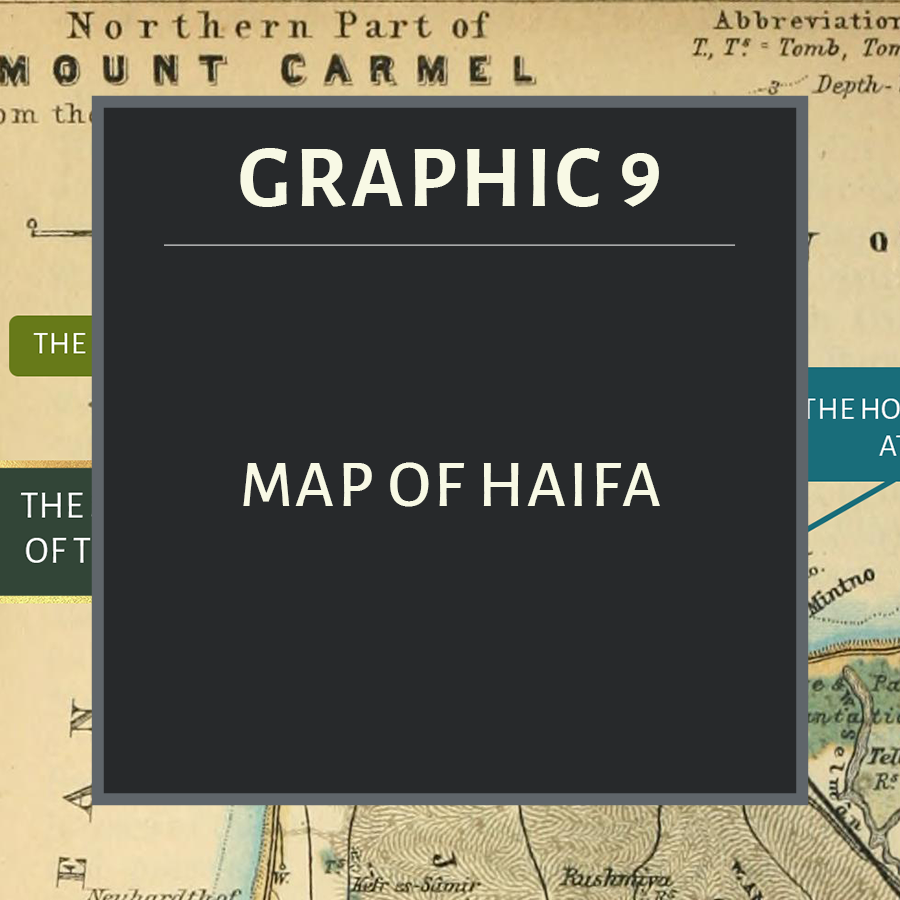
Map of the locations in Haifa associated with ‘Abdu’l-Bahá mentioned in this part of the chronology. Original graphic by Violetta Zein. Base map: 1906 map of Palestine and Syria with the chief routes through Mesopotamia and Babylonia by Karl Baedeker and others. Wikimedia Commons.
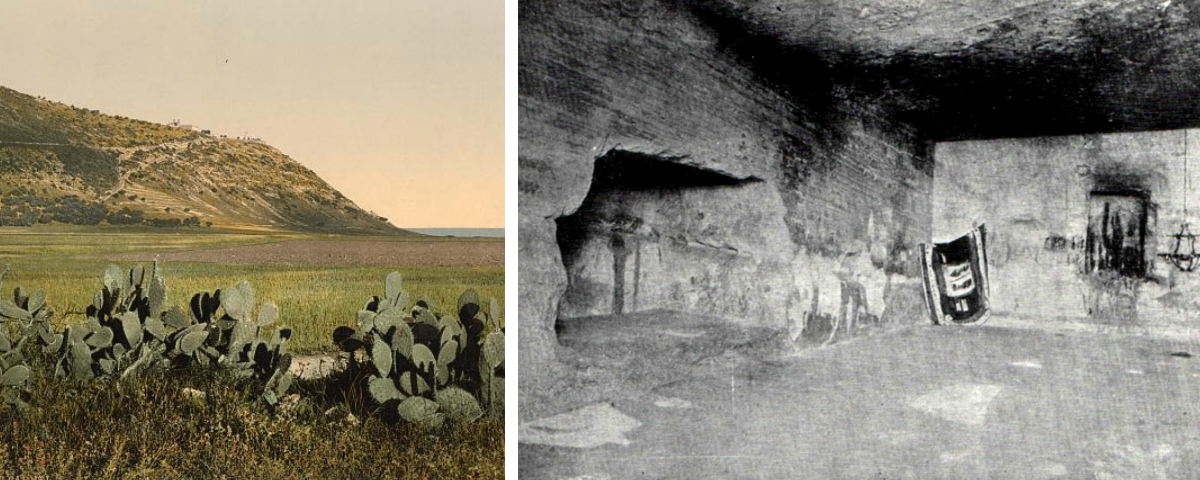
Left: A view of Mount Carmel, where the Cave of Elijah is located, photograph taken between ca. 1890 and 1900. Library of Congress. Right: The Cave of Elijah in 1893, at the time 'Abdu'l-Bahá visited it. Ventura Daniel Wiki.
'Abdu'l-Bahá, in sorrow and despair over the actions of his treacherous family members, isolates Himself for one month in a small apartment, in the stone building west of the lower mouth of the Cave of Elijah.
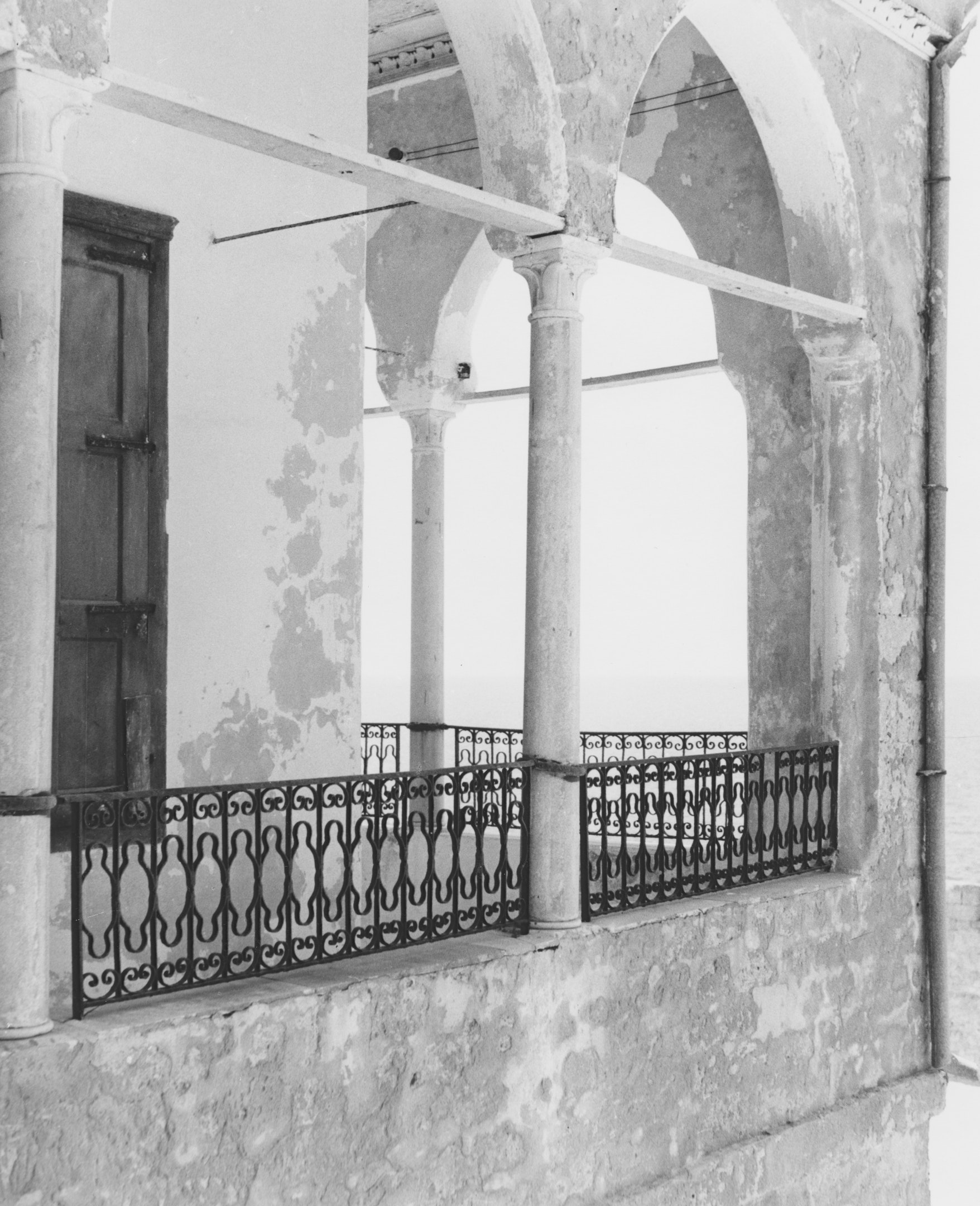
Balcony of the House of 'Abbúd, adjoining the room Bahá'u'lláh occupied. The balcony looks over the Mediterranean Sea. Photograph taken in 1952. Bahá'í Media Bank.
'Abdu'l-Bahá returns to the house of 'Abbúd in 'Akká and moves into the room across the hallway from the room of Bahá'u'lláh. Here, 'Abdu'l-Bahá is able to obtain some rest from the Covenant-breakers' endless plottings.
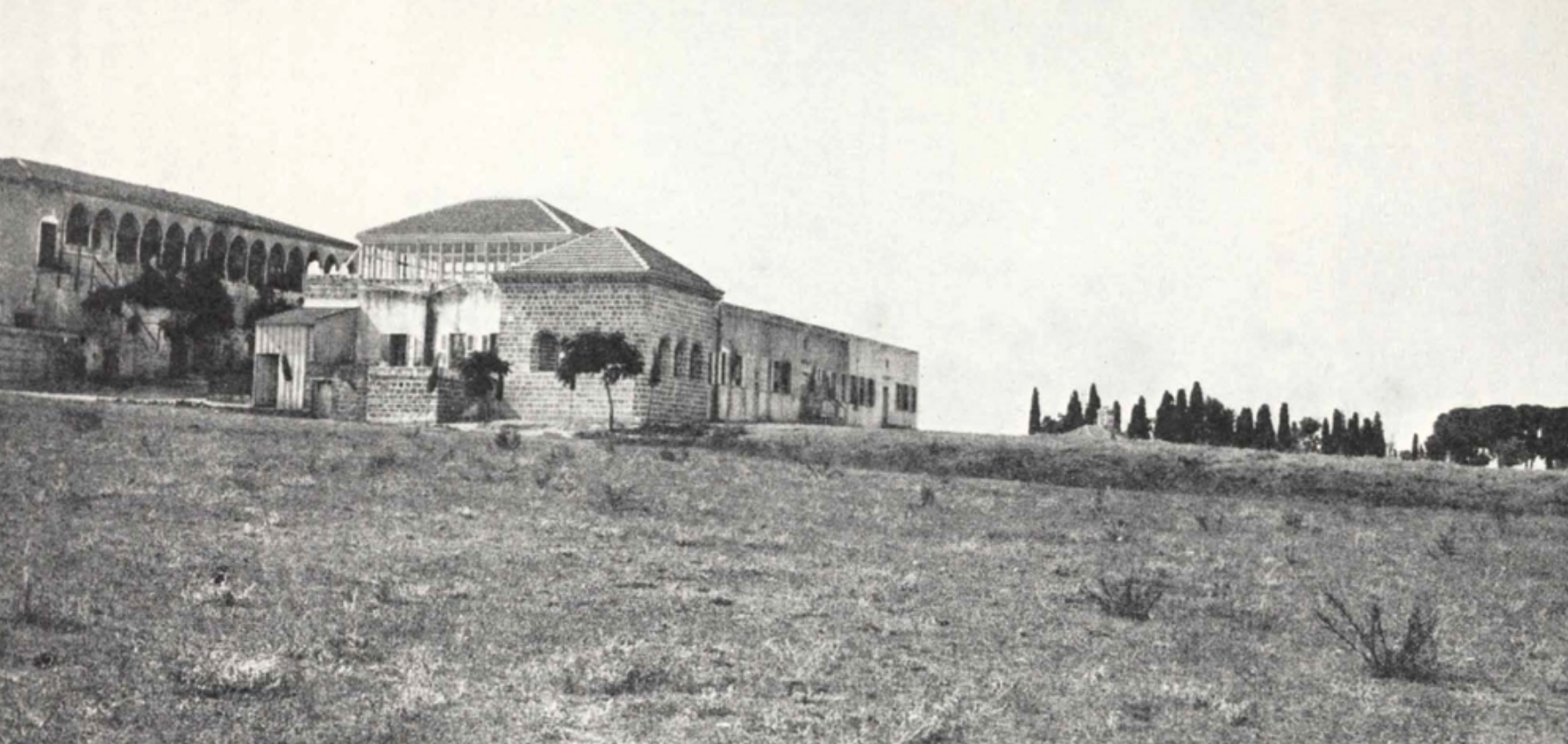
The Shrine of Bahá'u'lláh, shortly after His Ascension. The Bahá'í World, volume 5, page 75.
Starting in 1893, 'Abdu'l-Bahá instructs that visiting the Shrine of Bahá'u'lláh is not only a duty but a sign of devotion and Faith. Accordingly, on Fridays and Sundays, pilgrims and residents depart from 'Akká in a state of humility and lowliness and chant prayers as they approach the Shrine. They pause at a spot near the Shrine to rest and refresh themselves before continuing their approach to the Shrine and performing the visitation rites. Before 'Abdu'l-Bahá is reincarcerated in 1901, He accompanies the friends on these visits to the Shrine, chanting the Tablet of Visitation Himself.
These regular, ritualized visits to the Shrine of Bahá'u'lláh take place on two occasions: as a weekly occurrence on Fridays and Sundays, and on Bahá'í Holy Days. Starting in 1894 or 1895, 'Abdu'l-Bahá adds certain ceremonial details which make the overall experience a profound spiritual event. The pilgrimage to the Shrine of Bahá'u'lláh in Bahjí gains so much renown that friends, foes, government officials, military officers, civil servants, judges and even muftís, observing the grandness of the scene, and overcome by the spiritual intensity and humble devotion of the participating Bahá'ís, express desire to participate in this solemn act of pilgrimage.
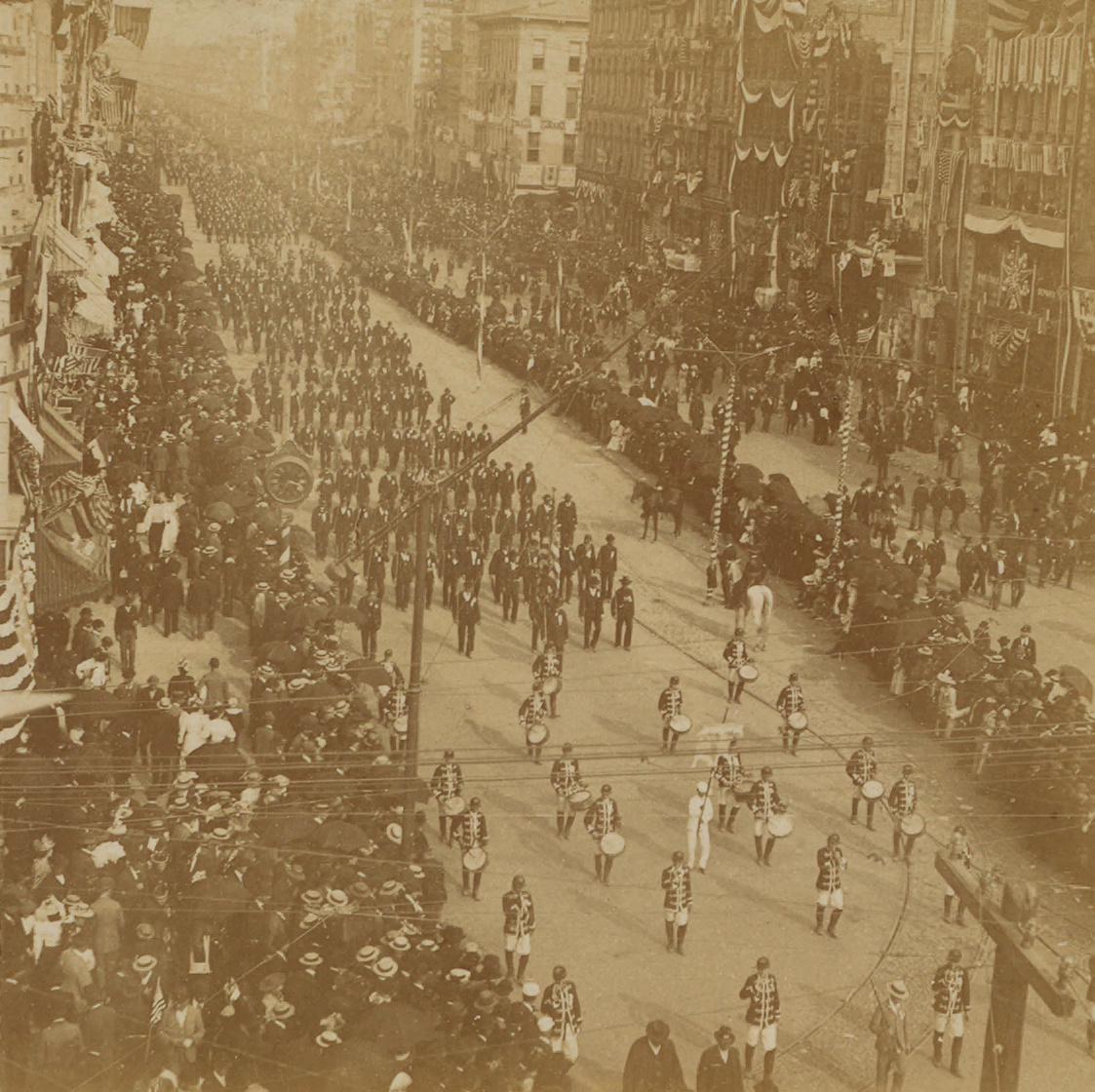
A slice of life in America in 1893: Grand Army of the Republic veteran's review (parade), 5 September 1893 in Indianapolis, Indiana. Source: Wikimedia Commons.
Shoghi Effendi states in God Passes By that one year after the ascension of Bahá’u’lláh, ‘Abdu’l‑Bahá reveals a verse which foreshadows the victory of the Faith in the West and incurs the mockery of the Covenant-breakers.
The promulgation of the Cause of Bahá'u'lláh in the West, the first among 'Abdu'l-Bahá's self-stated three aims, is to be one of the greatest triumphs of His ministry.
The United States is to be preeminent among all the countries of the west, both in bounties conferred upon it by God and in its extraordinary heroic efforts to spread the Faith to the rest of the countries of the world. It is important to remember that the rulers of America have the bounty of being addressed directly in the Kitáb-i-Aqdas by Bahá'u'lláh Himself and the members of the American Bahá'í community have the honor of being titled by Shoghi Effendi the "the spiritual descendants of the dawn-breakers of the Heroic Age of the Bahá’í Dispensation."
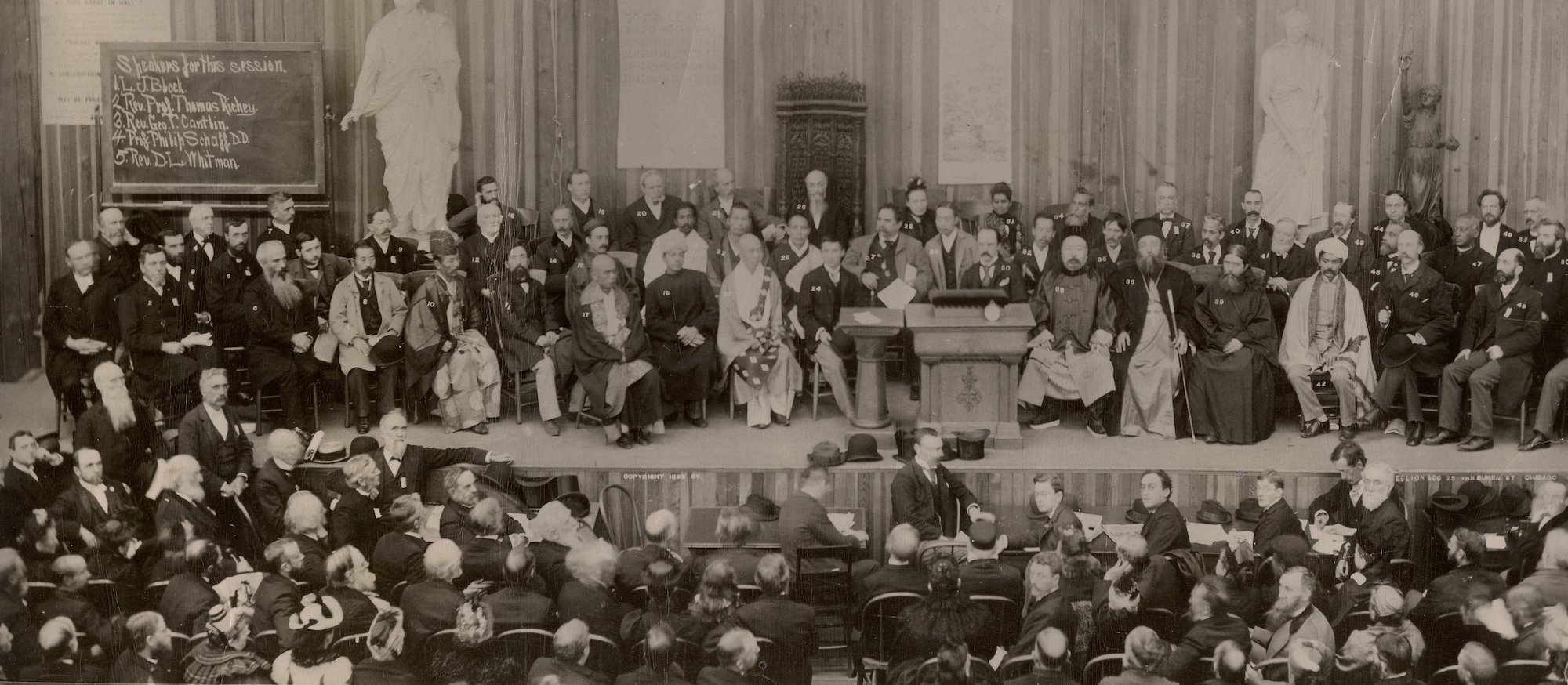
The World's First Religious Parliament in Chicago in 1893, where Bahá'u'lláh's name is first mentioned publicly in the West. Wikipedia Commons.
The Reverend Henry H. Jessup, D.D., Director of Presbyterian Missionary Operations in North Syria, read a paper at the World Parliament of Religions, held in Chicago. In his paper, Rev. Jessup announces that “a famous Persian Sage,” “the Bábí Saint,” has recently died in ‘Akká and closes by saying he feels moved to share Edward Granville Browne's recounting of his visit to Bahá'u'lláh a year before His Ascension, because of the “sentiments so noble, so Christ-like” expressed by Bahá'u'lláh in the interview.
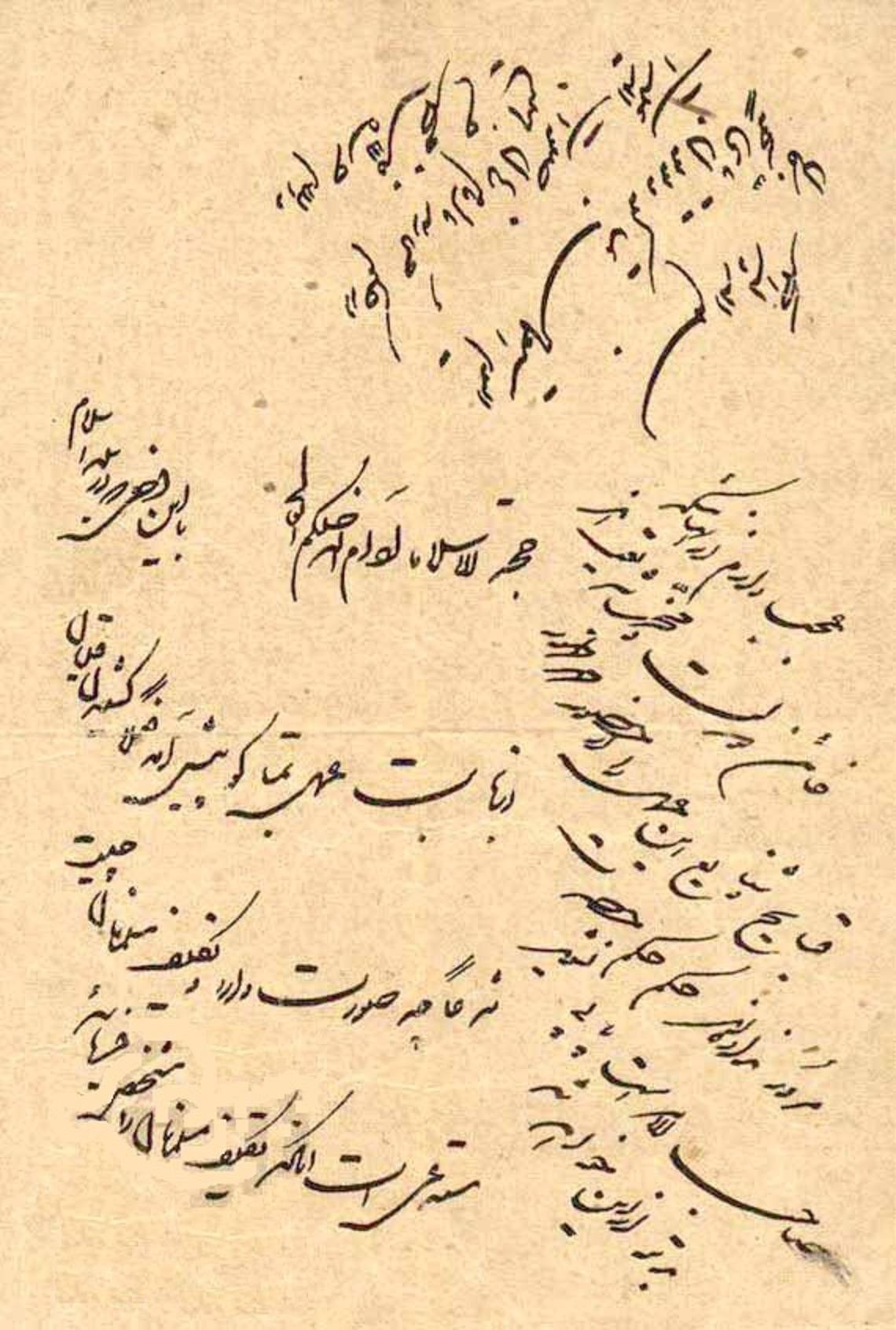
The widely-obeyed December 1891 Fatwa against tobacco use issued by Grand Ayatollah Mirza Hassan Shirazi in protest against the British monopoly on Tobacco granted by the Sháh. The revolt and ensuing political movement about which 'Abdu'l-Bahá writes in His treatise happen soon after this Fatwa. Wikipedia Commons.
'Abdu'l-Bahá writes His second major treatise after the Secret of Divine Civilization in 1875, and His first major work as Center of the Covenant. It is called Risáliy-i-Síyásíyyih and deals with societal and leadership questions in the aftermath of the Tobacco Revolt in Persia in 1892, widely considered the first political movement in Iran's history. 'Abdu'l-Bahá asks the Persian Bahá'ís to widely disseminate the work and summarizes the contents Himself in this way:
In that epistle, the sacred rights of the state and the protected rights of the nation, the relationship between rulers and their subjects, and the ties between those who govern and those who are governed, and the obligations of those who lead and those who are led have been set forth.
Quoted in Mina Yazdani's article "‘Abdu’l-Bahá and the Iranian Constitutional Revolution:
Embracing Principles while Disapproving Methodologies," page 59
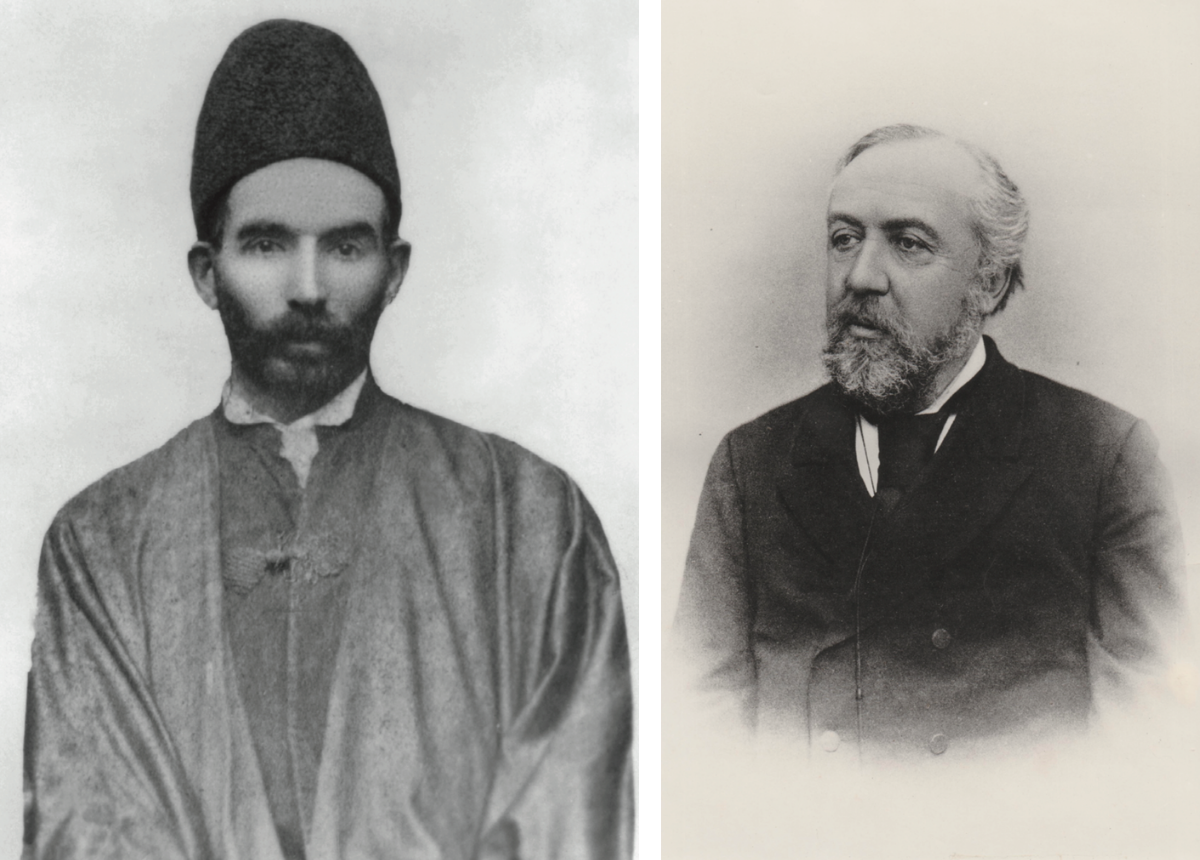
Left: 'Andalíb, the celebrated Persian poet, and protagonist in our story: he is the one who composes the eulogy for Bahá'u'lláh which Tumanski hears in the company of Bahá'ís and subsequently publishes. Bahá'í Media Bank. Right: Baron Viktor Romanovich von Rosen, Russian Orientalist and editor and publisher of the 1893 Russian publication of the Kitáb-i-'Ahd. Rosensches Familienarchiv, Hamburg. Courtesy of Prof. Dr. Claus Freiherr von Rosen, Hamburg.
In their paper "The 1893 Russian Publication of Baha’u’llah’s Last Will and Testament: An Academic Attestation of ‘Abdu’l-Baha’s Successorship" published in 2017 in Baha’i Studies Review, Volume 19, Dr. Christopher Buck and Youli Ioannesyan study in minute detail an incredible event: about one year after the Ascension of Bahá'u'lláh, His Will and Testament, the Kitáb-i-'Ahd, which Bahá'u'lláh had Himself named His "Most Great Tablet," is published in a Russian academic journal. This is an historic event, as it is the first publication of the Kitáb-i-'Ahd. What is even more fascinating is how it happened, and how it was published in a Russian journal.
Aleksandr Grigor’evich Tumanski (1861–1920) is a Russian orientalist and Major-General of the Russian Imperial Army. Tumanski hails from an ancient aristocratic family, he speaks eleven languages including Turkish, Arabic and Persian, and, in the words of the famous Russian Orientalist Krachkovski, "Tumanski was one of the rare—in Russia—Orientalists by vocation and not by profession.” Tumanski first hears of the Bahá'í Faith during his Orientalist studies but meets Bahá'ís for the first time in the winter of 1889-1890 in 'Ishqábád, Turkmenistan and becomes close friends with the Bahá'í community there, where he eventually meets and befriends the greatest of all Bahá'í scholars, Mírzá Abu’l-Faḍl.
Tumanski remains close to the Ishqábád until the end of his life, and evidently, the Ishqábád Bahá'ís feel the same towards him, because on June 24, 1892, when news finally reaches of the Ascension of Bahá'u'lláh, they invite Tumanski to an exclusively Bahá'í gathering where they say prayers and where, more importantly, they read the Kitáb-i-'Ahd aloud. After the reading of Bahá'u'lláh's Will and Testament, one of the Bahá'ís reads a eulogy by the celebrated Bahá'í poet, ‘Andalíb, a long poem of 31 couplets (the form is called "marthíyih." ‘Andalíb, whose real name is Mírzá ‘Alí-Ashraf of Láhíján, was present in 'Akká at the time of Bahá'u'lláh's Ascension and was therefore an eyewitness to the events surrounding His passing, and his eulogy is both a lament of great loss and a praise of Bahá'u'lláh's greatness.
Shortly after this memorial gathering, on July 3, 1892, Tumanksi writes a letter to Baron Viktor Romanovich von Rosen (1849–1908), another Russian Orientalist and his mentor. In his letter, Tumanski encloses a copy of both the Kitáb-i-'Ahd and ‘Andalíb's marthíyih for Bahá'u'lláh. Baron von Rosen publishes both, accompanied by a Russian translation, in 1893 in the Russian Orientalist journal Записки Восточного отделения Императорского Русского археологического общества (ZVORAO) (Memoirs of the Oriental Branch of the Russian Archeological Society). Because this is such a historic publication, it merits to be cited in full as follows:
Туманский, А. [Tumanski, A.] “Последнее слово Беха-Уллы,” [Bahá'u'lláh's Last Word] Записки Восточного отделения Императорского Русского археологического общества [Zapiski Vostochnogo otdeleniia Imperatorskogo Russkogo arkheologicheskogo obshchestva] (ZVORAO) [Memoirs of the Oriental Branch of the Russian Archeological Society], Vol. 7 (1892–1893), pp. 193–203.
Below are two scans of the front page of the journal (image on the left) and of the first page on which the Kitáb-i-'Ahd appears (image on the right), courtesy of Steve Cooney:
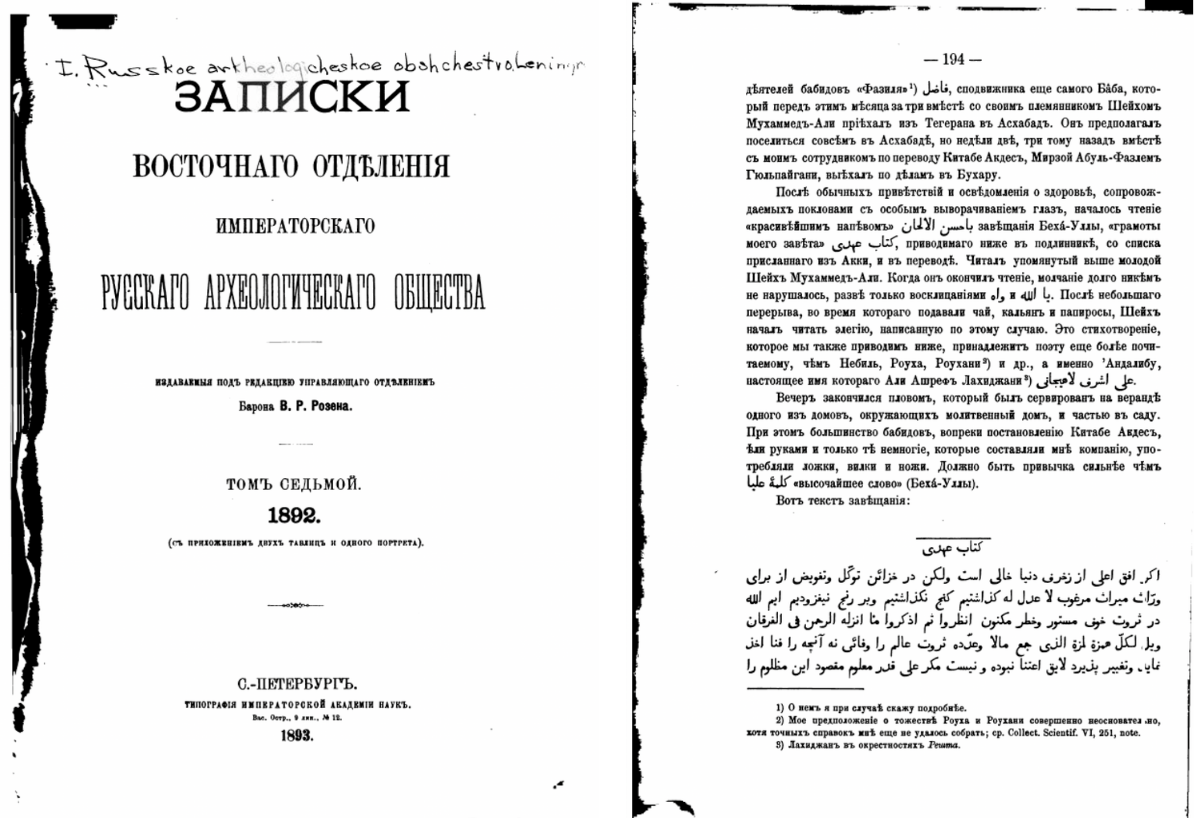
To read the full story with many more details, please download Dr. Christopher Buck and Dr. Youli Ioannesyan's PDF article below. The contents of the article are divided into nine parts: (1) Introduction; (2) Aleksandr Grigor’evich Tumanski; (3) Contents of the Kitáb-i-'Ahdí and Brief Commentary; (4) ‘Andalíb’s Eyewitness Account of the Reading of the Kitáb-i-'Ahdí, 1892; (5) The St. Petersburg Edition of the Kitáb-i-'Ahdí; (6) The Original Manuscript of the Kitáb-i-'Ahdí and the Textus Receptus; (7) Textual Variants Between the St. Petersburg Edition of the Kitáb-i-'Ahdí and the Textus Receptus; (8) The Cambridge Manuscript of the Kitáb-i-'Ahdí in the E. G. Browne Collection; and (9) Conclusion: Contemporary-Historical Attestation of ‘Abdu’l-Baha’s Successorship by Tumanski and other Russian Notables.
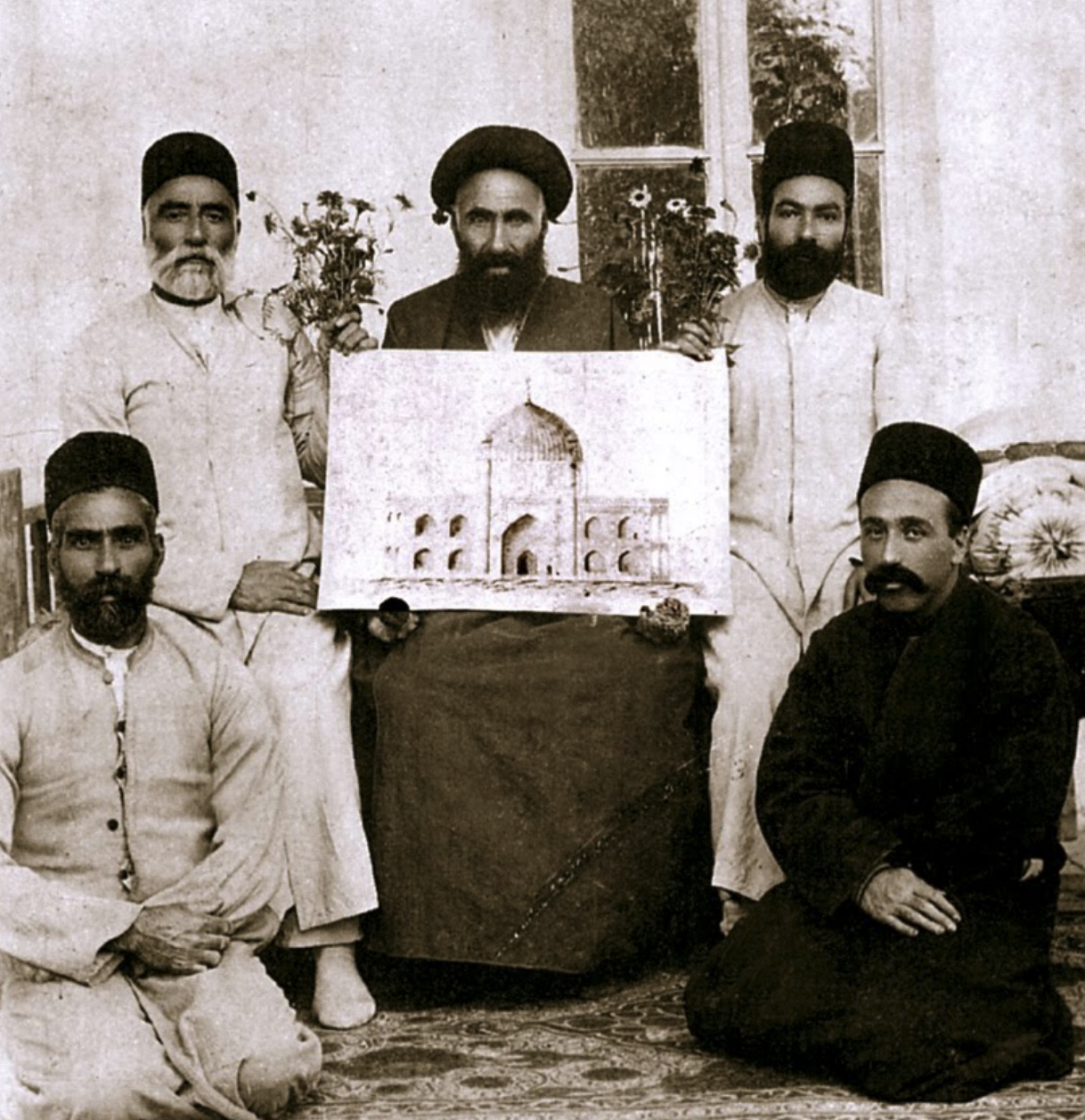
Hají Mírzá Muḥammad Taqi Afnán, Vakilu’d-Dawlih, center, maternal cousin of the Bab, who largely paid for and supervised the building of the House of Worship, holding what look to be like the drawings for the House of Worship. Baha'i Blog.
While Ustád 'Alí-Akbar is on pilgrimage he designs the main features of the House of Worship in 'Ishqábád, under the direction of 'Abdu'l-Bahá, who conceives the plan for a nine-sided building.
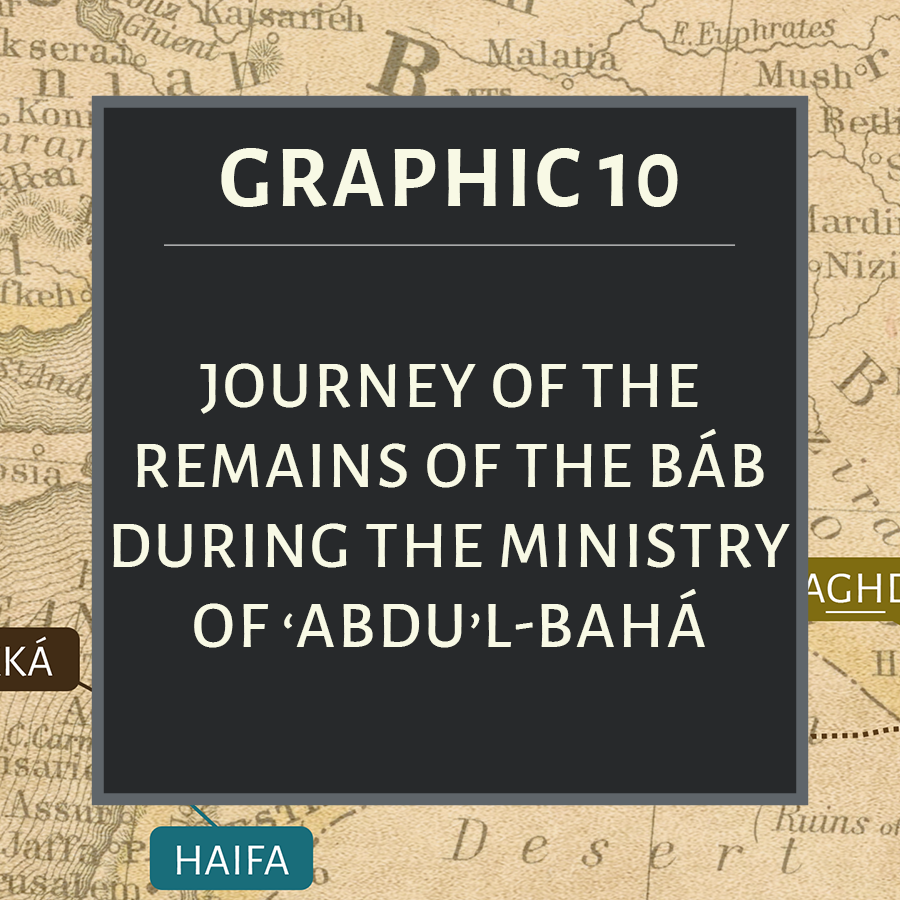

Map of the Journey of the remains of the Báb based on the eight locations mentioned by Shoghi Effendi in God Passes By. To see a full map of the 19 locations identified by Michael V. Day, please see Journey to a Mountain entitled “The Mission of the Master 1892−1921.” Base Map: 1860 map of Persia, Turkey in Asia, Afghanistan, and Beloochistan by Samuel Augustus Mitchell. Wikimedia Commons.
A new wave of persecution against the Bahá'ís in Persia in 1891-92 threatens the safety of the casket, and 'Abdu'l-Bahá orders the remains of the Báb be moved to another location until 1898.
The few dates excerpted for the purposes of this chronology do not give a full picture of the extraordinary adventure that spanned sixty years between the Martyrdom of the Báb and the interment of His remains on Mount Carmel. For the entire story, filled with breathtaking details, please read Michael V. Day's book Journey to a Mountain - The Story of the Shrine of the Bab Vol. I: 1850-1921. published by George Ronald, which was the reference work for the stories about the remains of the Báb in this chronology.
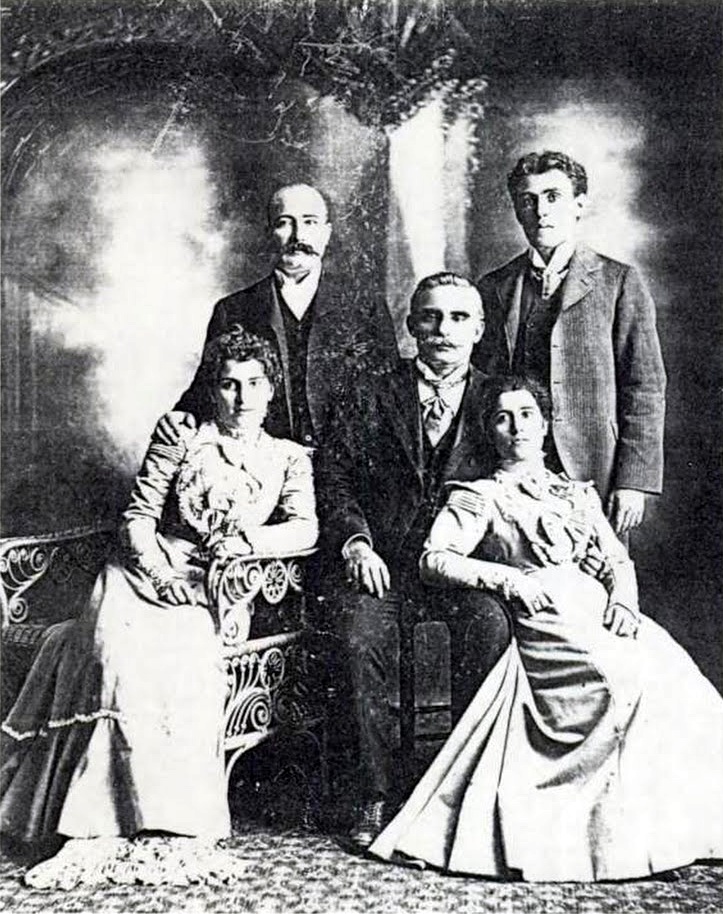
Ibrahim George Kheiralla with his family. Source: Wikimedia Commons.
Ibráhím George Khayru’lláh, a Syrian doctor, becomes a Bahá'í in 1892 after receiving a Tablet from Bahá'u'lláh and communicates with ‘Abdu’l‑Bahá before moving to New York in December 1892. In February 1894, he relocates to Chicago, and begins actively and systematically teaching the Faith.
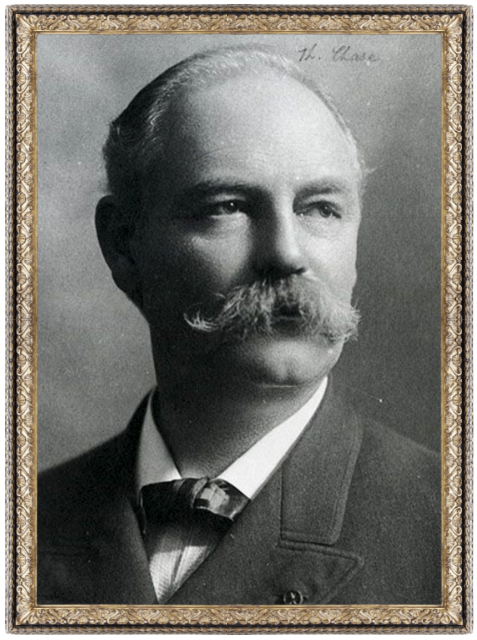
Thornton Chase, the first American Bahá'í, circa 1900. Brilliant Star Magazine.
Thornton Chase, surnamed Thábit (Steadfast) by ‘Abdu’l‑Bahá becomes a Bahá'í. 'Abdu'l-Bahá designates him “the first American believer.”
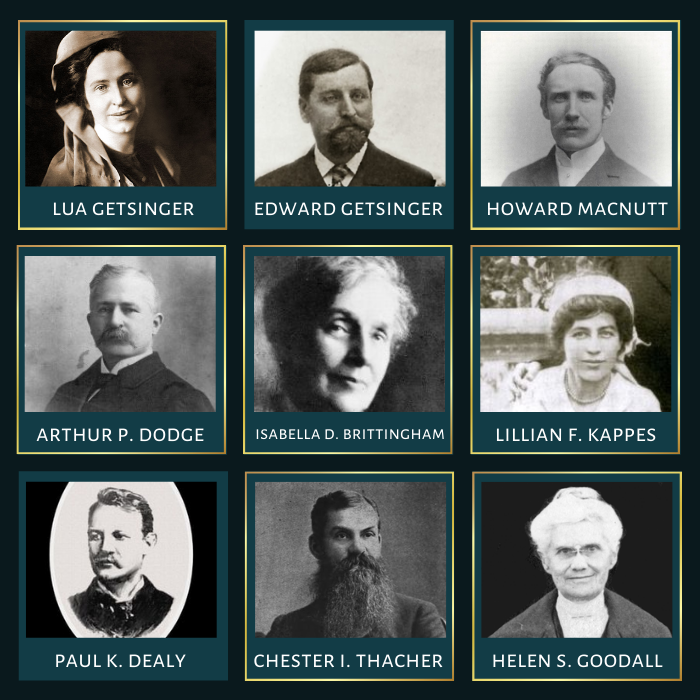
Early American Bahá'ís listed above, those who have a gold border around their photograph were later named Disciples of 'Abdu'l-Bahá by Shoghi Effendi. Original graphic by Violetta Zein.
Between 1894 and 1896, Ibráhím Khayru’lláh shares his impressions and reports on the remarkable success of his teaching efforts with 'Abdu'l-Bahá. In 1895, Kenosha, Wisconsin proved receptive and Khayru’lláh visits the city once a week. By 1896, the number of Bahá'ís in Kenosha and Chicago number in the hundreds. In 1897 Khayru’lláh publishes a book, The Bábu’d-Dín, and converts a considerable number of people to the Bahá'í Faith in Kansas City, Among the prominent early Bahá'ís in the United States are Thornton Chase, Louisa A. Moore (later Lua Getsinger), the mother teacher of the West, surnamed Livá (Banner) by ‘Abdu’l‑Bahá and Dr. Edward Getsinger (whom she later marries), Howard MacNutt, Arthur P. Dodge, Isabella D. Brittingham surnamed by 'Abdu'l-Bahá "our Bahá'í-maker", Lillian F. Kappes, Paul K. Dealy, Chester I. Thacher and Helen S. Goodall.
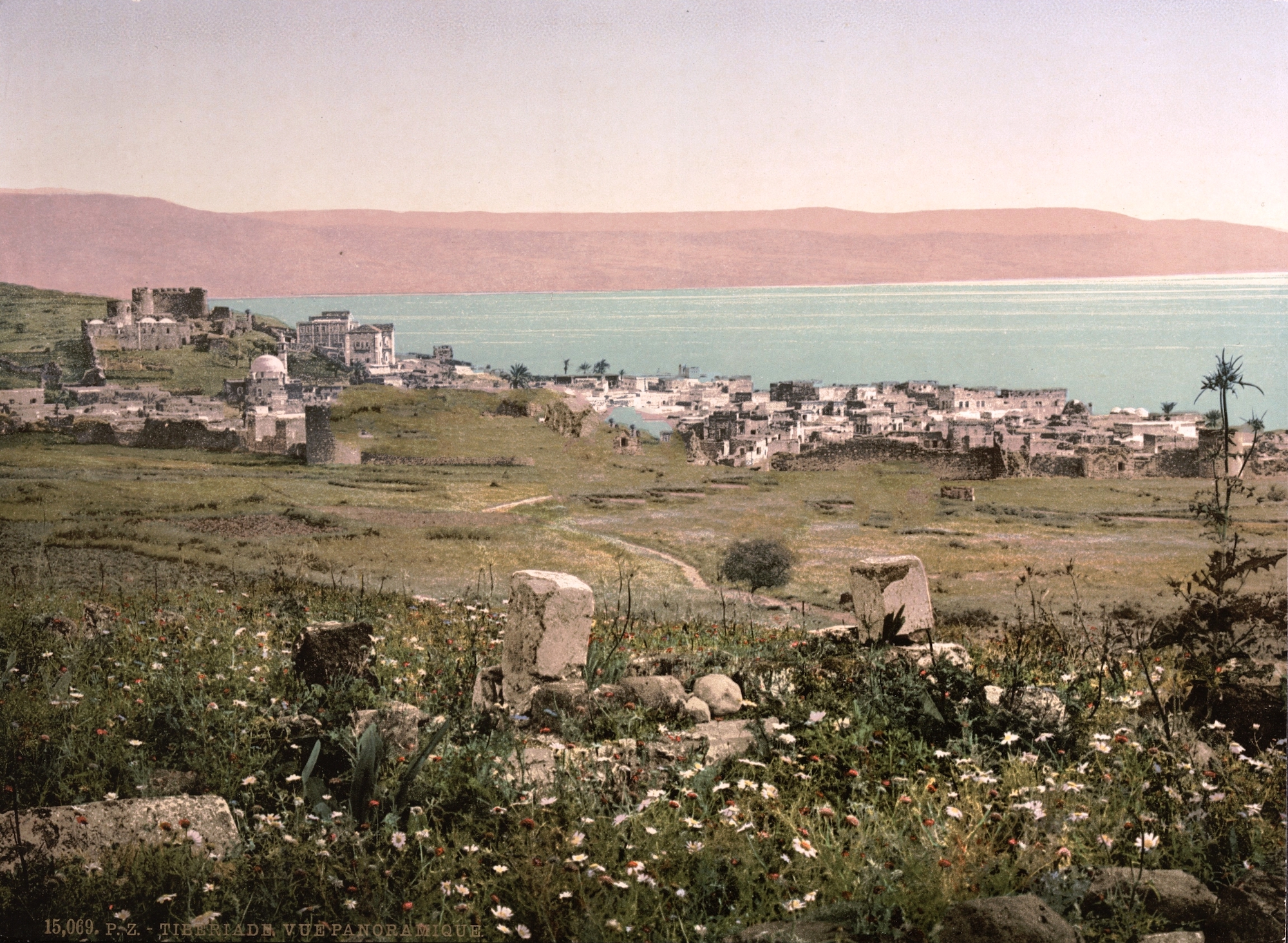
Panoramic view, Tiberias, Holy Land, between 1890 and 1900. Wikimedia Commons.
Bent under the heavy weight of grief occasioned by Bahá'u'lláh's ascension and dismayed by the evil schemings of His own family, now Covenant-breakers, 'Abdu'l-Bahá retreats to Tiberias, about 50 kilometers from 'Akká, with only one servant as a companion. Fifty kilometers is a very long way in those times of travel by mule. He stays there a "considerable amount of time" according to Baharieh Maani, but no exact duration is provided. There, 'Abdu'l-Bahá prays and communes with God, surrounded by the desert which has seen the footsteps and heard the lamentations of many of the Prophets and Manifestations of the past. As He says in a Tablet to Munírih Khánum, written during His retreat:
Although this Servant is outwardly alone, the breezes of the Kingdom of Abhá are wafting and the bounties of the Blessed Beauty descending. The remembrance of His Countenance is My companion and from all else I have severed My hope. In this desert, for many years, His Holiness Christ uttered: "Here am I, O My God, here am I," and in this wilderness for several centuries the Prophets and the chosen ones associated together. The fragrance of their remembrance hath perfumed the mountains and the field, and their quickening breezes have imbued the desert and the sea with new life. Should the sense of hearing be refined, it would at this very moment hear those lamentations and supplications, and would perceive those melodies with the inner ear.
Tablet by 'Abdu'l-Bahá provisionally translated for inclusion in
Leaves of the Twin Divine Trees by Baharieh Rouhani Maani.
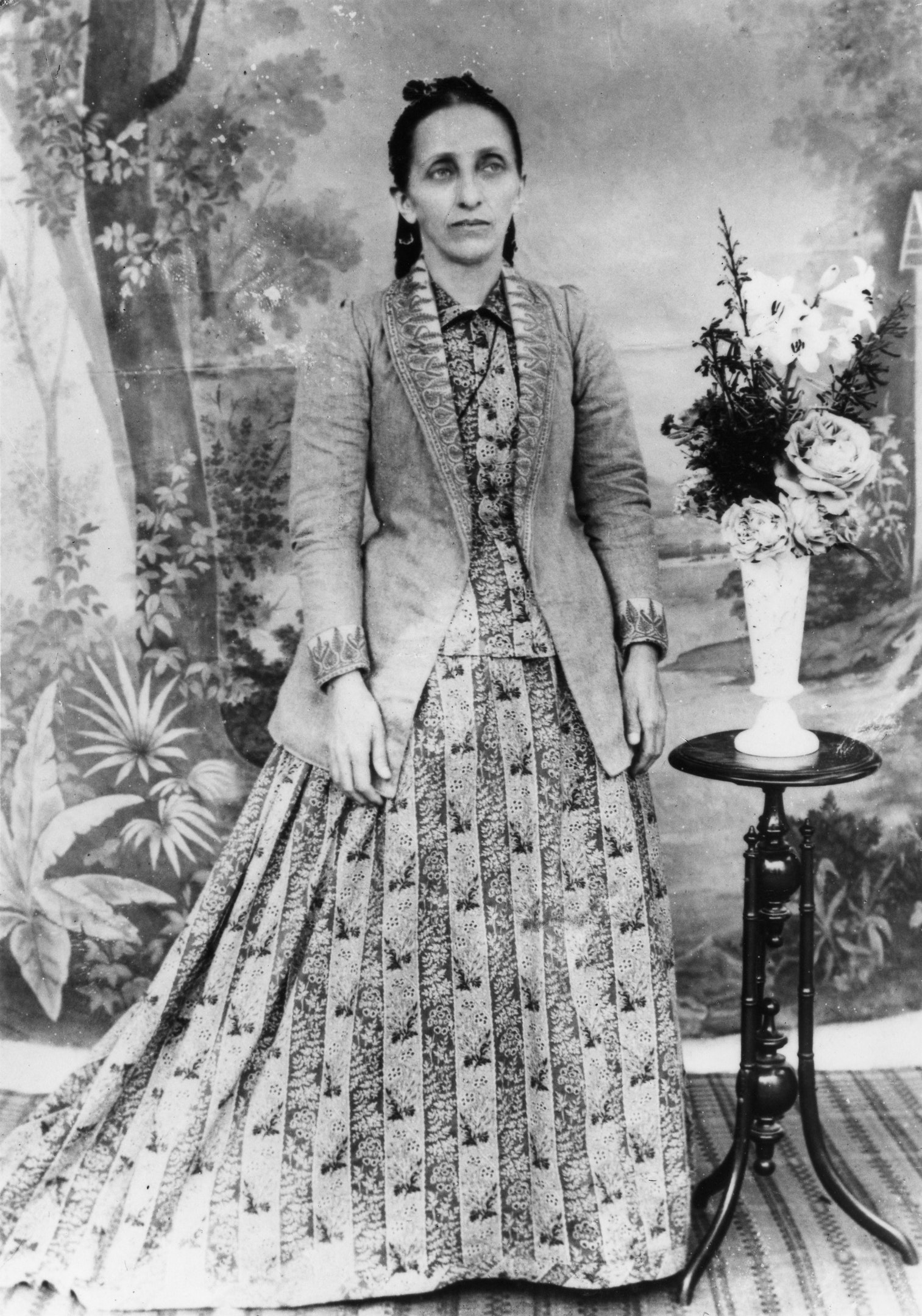
Portrait of Bahiyyih Khanum, The Greatest Holy Leaf, around 1895, exactly around the time she oversees Shoghi Effendi's parents' marriage. Bahá'í Media Bank.
Mírzá Hádí Afnán, (Shoghi Effendi's soon-to-be father) returns to 'Akká. In the four years since his return in 1892 to Shíráz, he and his mother have written constant letters to 'Abdu'l-Bahá, Munírih Khánum and Bahíyyih Khánum about the hand of 'Abdu'l-Bahá's eldest daughter Ḍíyá’íyyih Khánum. As he arrives while 'Abdu'l-Bahá is in retreat in Tiberias, the Family write to the Master who consents to the marriage but states the wedding must be very simple. 'Abdu'l-Bahá also reveals a special untranslated Tablet in Arabic for the occasion. Mírzá Hádí Afnán and Ḍíyá’íyyih Khánum are wed in a simple ceremony which takes place under Bahíyyih Khánum's supervision, bringing joy to the hearts of the Holy Family. In a gesture of kindness, Mírzá Muḥammad ‘Alí's family is invited to the simple wedding. They come and mock the simplicity of the wedding with so much ridicule that none of the friends of the Holy Family are aware this is a day of celebration.
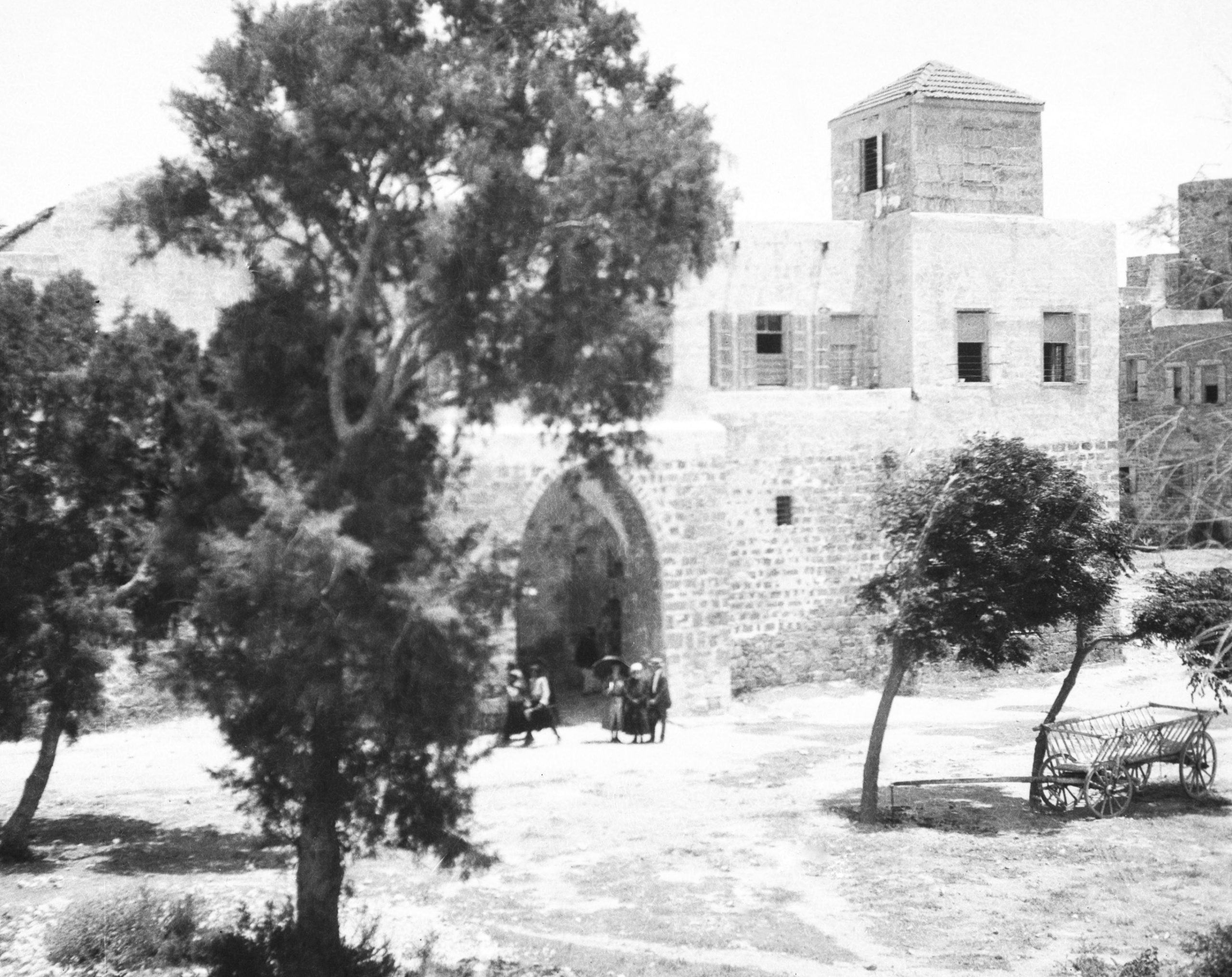
House of ‘Abdu’lláh Páshá, 1920s. Bahá'í Media Bank.
Four years after Bahá'u'lláh's ascension, it becomes obvious that the house of 'Abbúd is too small to accommodate the needs of 'Abdu'l-Bahá's growing family. The Master arranges to rent the main building of the former Governorate of 'Abdu'lláh Páshá in the northwestern Mujádalih neighborhood of 'Akká. We know this building as the house of 'Abdu'lláh Páshá.
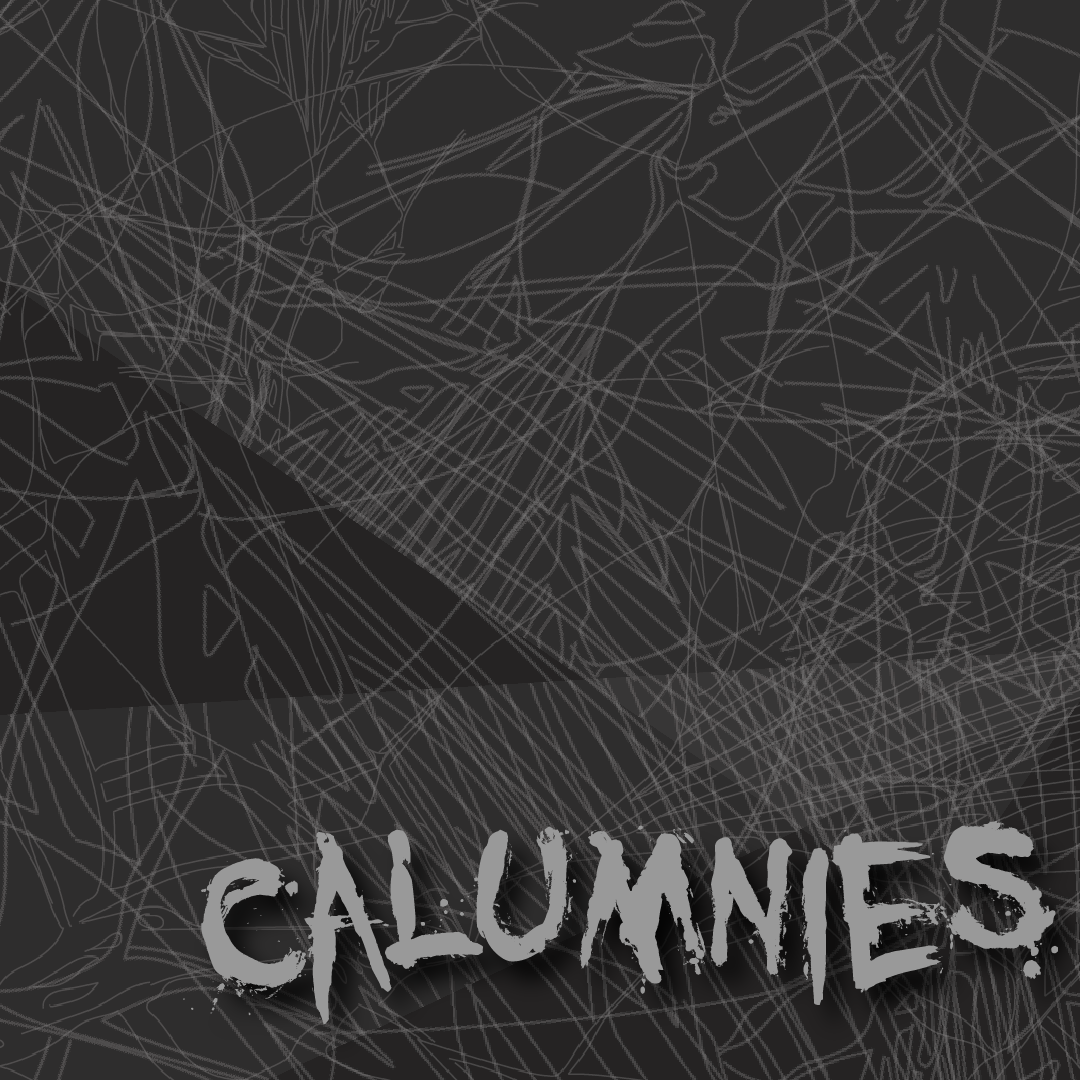
© 2023 Violetta Zein.
Mírzá Muḥammad-‘Alí sends letters with misleading statements and calumnies against ‘Abdu’l-Bahá, widely publicizing his Covenant-breaking activities. ‘Abdu’l-Bahá can no longer conceal his unfaithfulness.
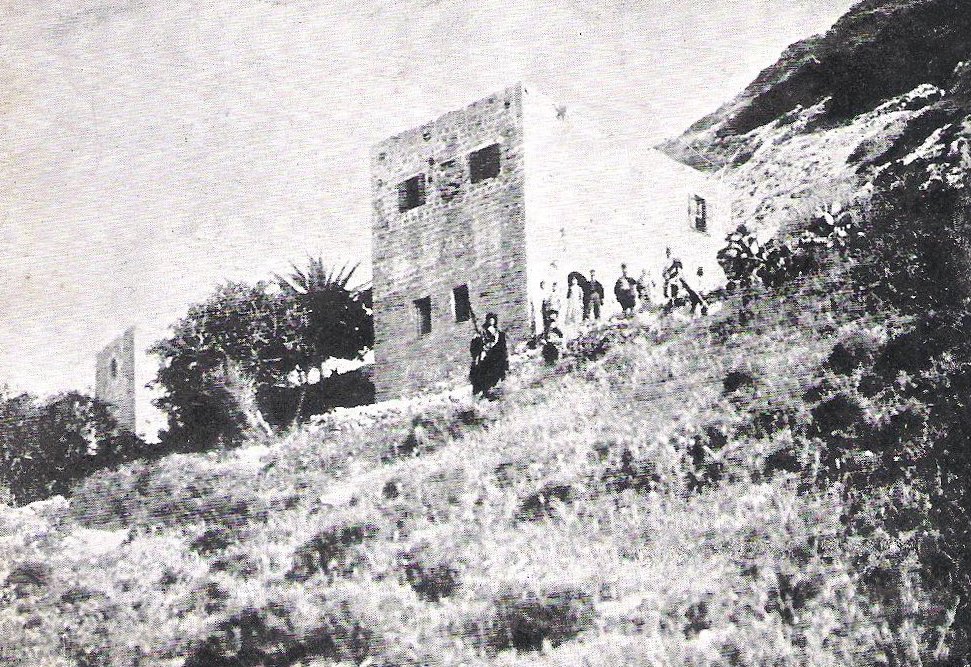
The Cave of Elijah on Mount Carmel, before 1899, at the time when 'Abdu'l-Bahá retreated there. Wikipedia Commons.
Finding the situation in ‘Akká intolerable, ‘Abdu’l- Bahá moves to Haifa’s Retreat of Elijah on Mount Carmel.
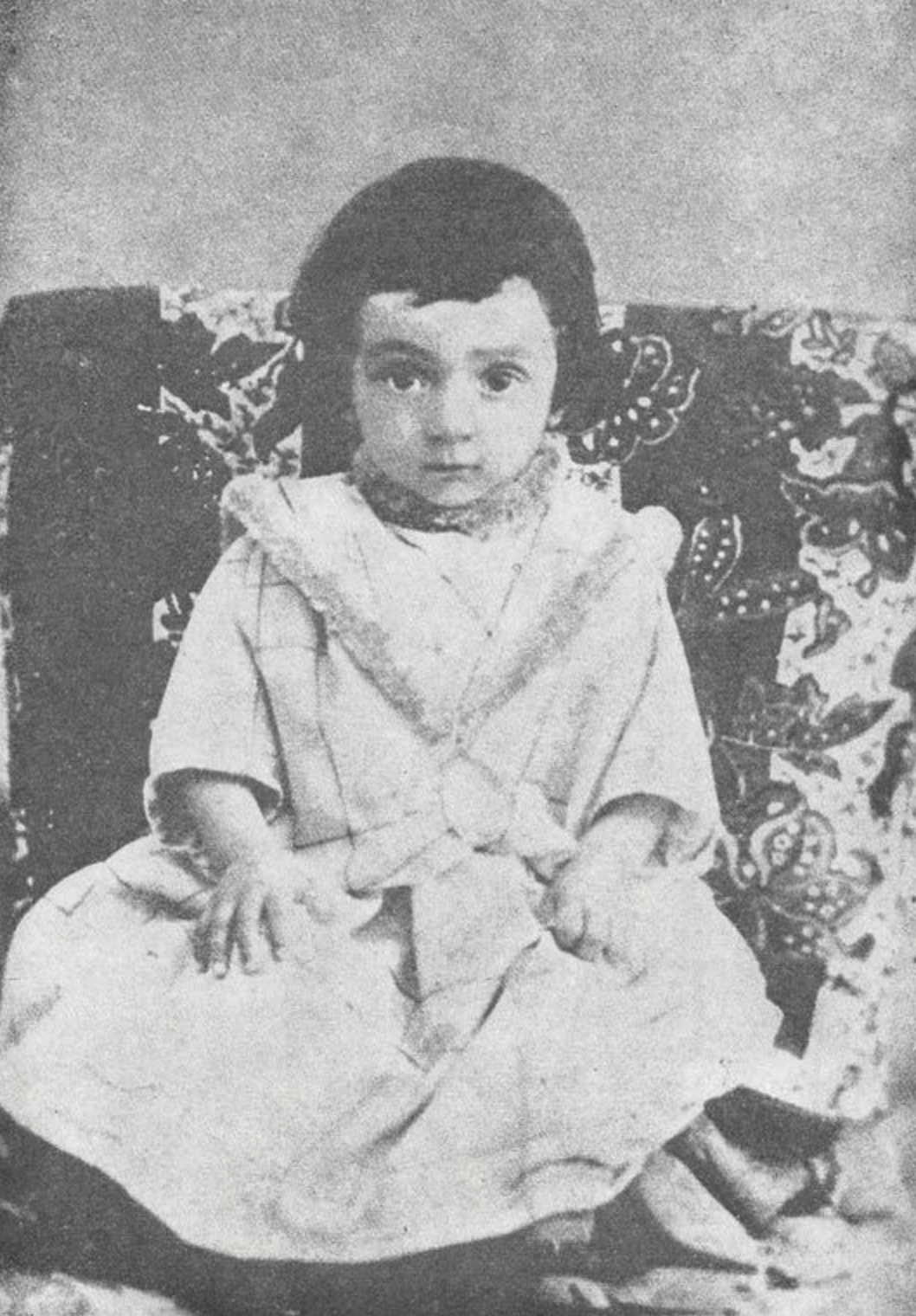
A very young Shoghi Effendi. Baha'i Media.
On the first day of the month of fasting in 1897, Shoghi Effendi is born in an upper room of the south wing of the house of 'Abdu'lláh Pashá. Shoghi Effendi is descended from Bahá'u'lláh, on his mother's side, and from the Báb on his father's side. In His Will and Testament, which 'Abdu'l-Bahá will shortly start to reveal, He refers to Shoghi Effendi's dual sanctified lineage:
Salutation and praise, blessing and glory rest upon that primal branch of the Divine and Sacred Lote-Tree, grown out, blest, tender, verdant and flourishing from the Twin Holy Trees; the most wondrous, unique and priceless pearl that doth gleam from out the Twin surging seas.
Shoghi Effendi's childhood is a happy one, at all times focused on His beloved grandfather. He is the ringleader of the other children, possesses an irrepressible exuberance and boundless energy. One day in his early childhood, 'Abdu'l-Bahá gives in to Shoghi Effendi and writes on a used envelope a short sentence to please him:
Shoghi Effendi is a wise man – but he runs about very much!
During Shoghi Effendi's childhood, it is the family's custom to rise at dawn and spend the first hour of the day in 'Abdu'l-Bahá's room, for prayers. After the prayers, the family has a simple breakfast: very hot and very sweet tea, brewed on the Russian brass samovar, served in little crystal glasses, pure wheat bread and goat's cheese.
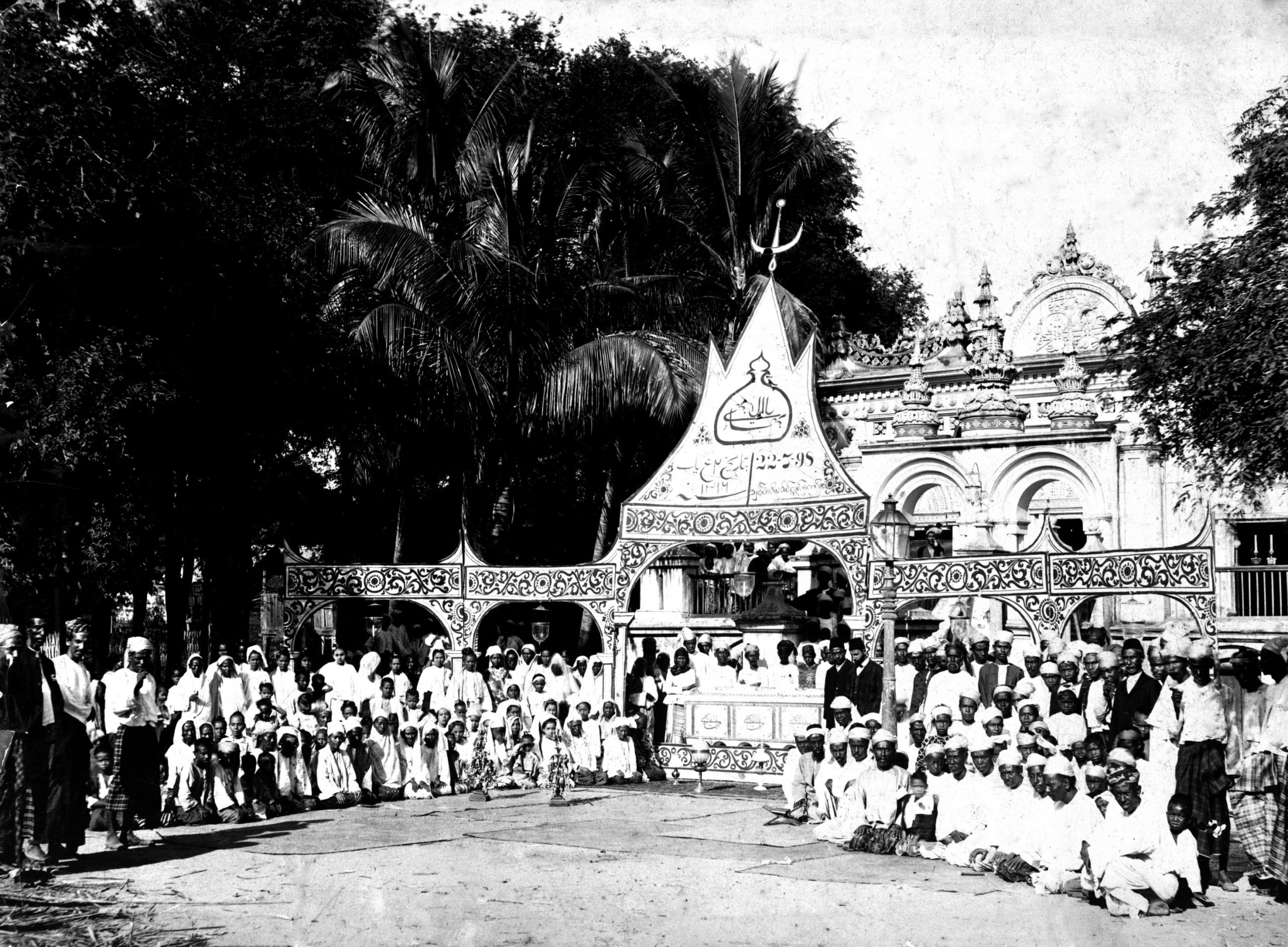
The Bahá'ís of Burma with the completed sarcophagus before it is shipped to 'Abdu'l-Bahá. You can see the inscriptions by Mishkín-Qalam on the sides. Bahá'í Media Bank.
Such a sacred trust as the remains of the Báb require a befitting vessel for their interment. 'Abdu'l-Bahá begins an extensive correspondence with the Bahá'ís of Burma, giving them a plan and very specific instructions for the construction of a marble sarcophagus. The one-piece sarcophagus should be of the finest marble, and 'Abdu'l-Bahá instructs Mishkín-Qalam, on a visit to Burma, to inscribe ‘Yá Bahá’u’l-Abhá’ (‘O Glory of the All-Glorious’) and ‘Yá ‘Alí’u’l-A‘lá’ (‘O Exalted of the Most Exalted Ones’) on the sides of the sarcophagus. 'Abdu'l-Bahá also orders a hardwood coffin of the best Indian wood. For many more details on the sarcophagus, see Journey to a Mountain .
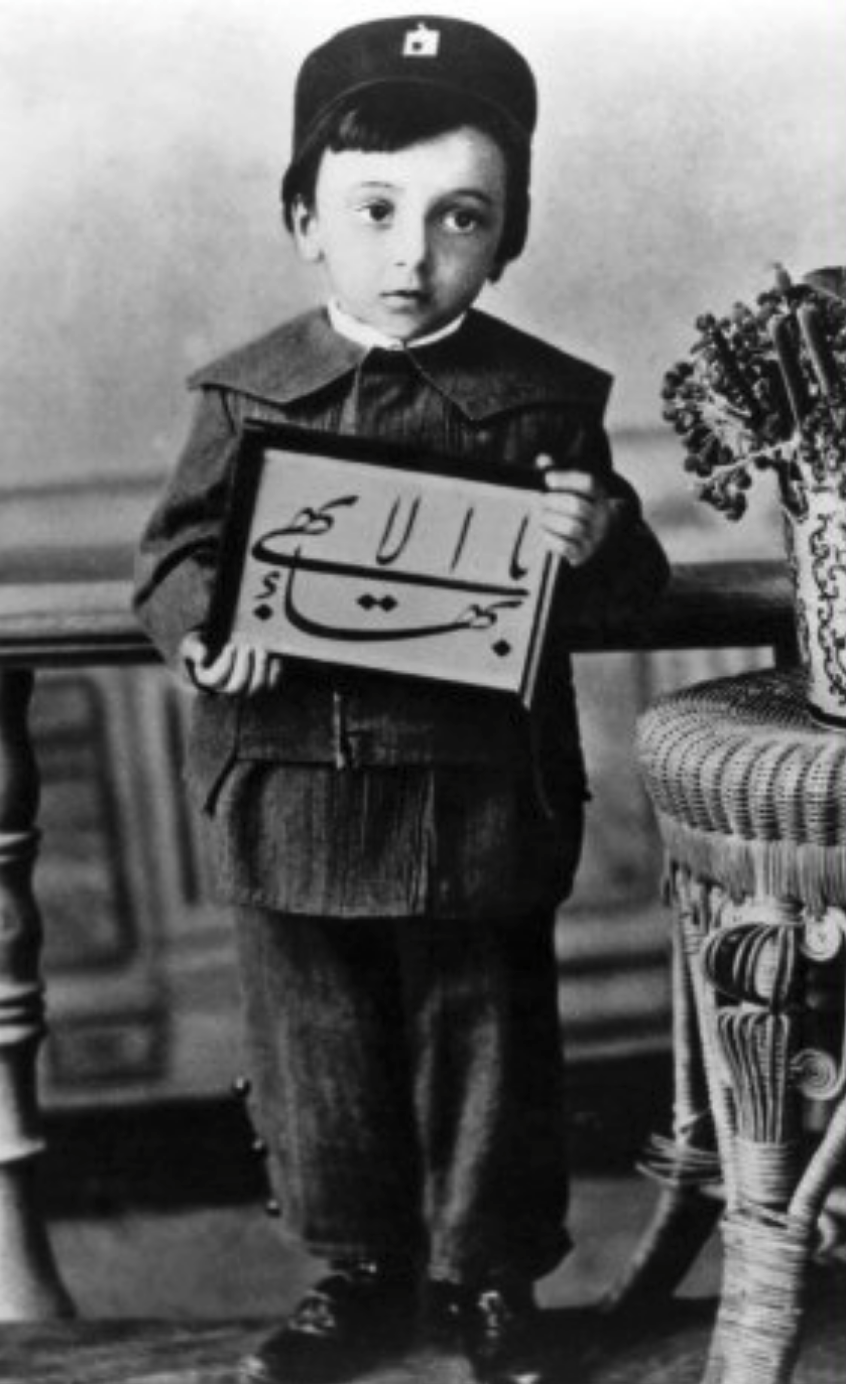
Shoghi Effendi as a child. Baha'i Stories
A believer in the United States writes to 'Abdu'l-Bahá upon hearing that His first grandson is born. She writes asking about the Biblical prophecy in Isaiah 11:6 stating:
The wolf will live with the lamb,
the leopard will lie down with the goat,
the calf and the lion and the yearling together;
and a little child will lead them.
'Abdu'l-Bahá reveals a deeply significant Tablet in response:
O Maidservant of God! Verily, that child is born and is alive and from him will appear wondrous things that thou wilt hear of in the future. Thou shalt behold him endowed with the most perfect appearance, supreme capacity, absolute perfection, consummate power and unsurpassed might. His face will shine with a radiance that illumines all the horizons of the world; therefore forget this not as long as thou dost live inasmuch as ages and centuries will bear traces of him.
'Abdu'l-Bahá, quoted in The Priceless Pearl
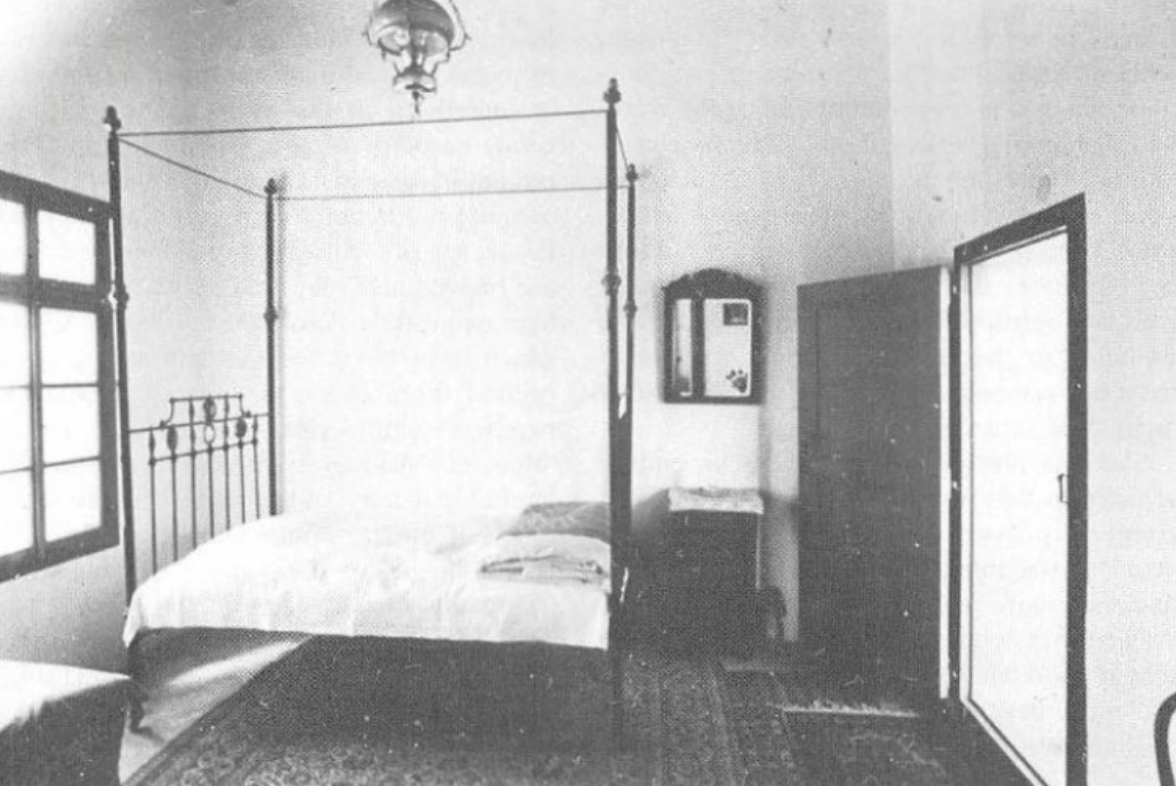
'Abdu'l-Bahá's room in 'Abdu'lláh Páshá. Bahá'í World Volume 18, page 95.
A four month-old Shoghi Effendi is brought to the reception room of 'Abdu'lláh Pashá. Dr. Yunis Khán, who has promised himself to only look at the baby as a "Bahá'í child" is compelled to bow low before him. He kisses the hair on his head and senses such power within him that he is speechless. The face of Shoghi Effendi will remain with him for a few days after this encounter, and Dr. Khan will have the same experience in Shoghi Effendi's presence twice, when the child is nine and eleven years old.
While Shoghi Effendi is still a baby, 'Abdu'l-Bahá calls one of the Muslims who chants in the mosque to come, once a week, and chant the sublime verses of the Qurán in his melodious voice to Shoghi Effendi.
One night, while still an infant, Shoghi Effendi wakes up crying one night. 'Abdu'l-Bahá asks his nurse to bring Shoghi Effendi to Him so that He can comfort him, and tells His sister, the Greatest Holy Leaf:
See, already he has dreams!
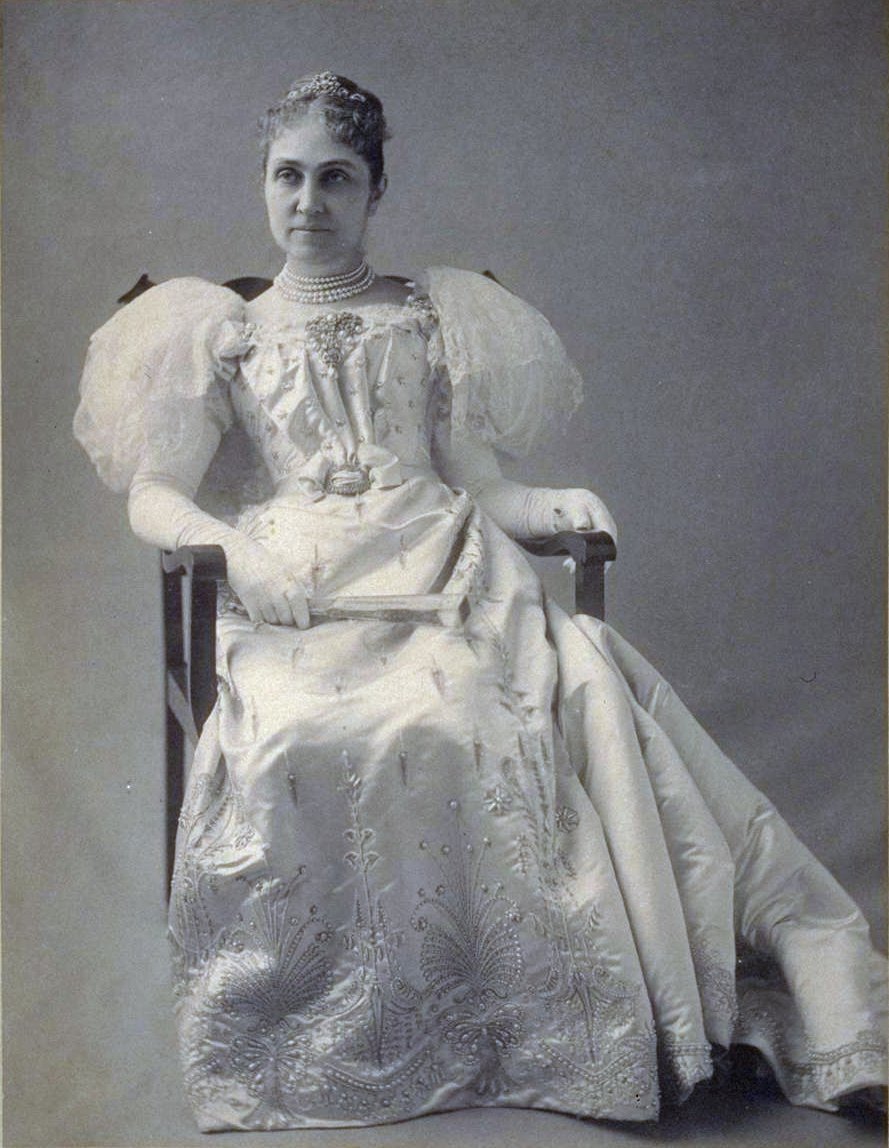
Phoebe Apperson Hearst (1842-1919), first woman Regent of the University of California. Wife of George Hearst and mother of William Randolph Hearst, and the organizer of the very first Western pilgrimage to the presence of 'Abdu'l-Bahá in 'Akká in 1898. Photo taken prior to 1919. Source: Wikimedia Commons.
Mrs. Phoebe Hearst, the well-known philanthropist (wife of Senator George F. Hearst), who becomes a Bahá'i through Lua Getsinger, makes plans to visit ‘Abdu’l‑Bahá in the Holy Land. She invites Bahá'ís, including Dr. Edward Getsinger and his wife, Lua Getsinger, Dr. Khayru’lláh and his wife, to join her. They leave America and are joined in Paris by May Ellis Bolles (later Maxwell), also taught by Lua Getsinger, Miss Pearson, and Ann Apperson, nieces of Phoebe Hearst, and Mrs. Thornburgh and her daughter. In Egypt, Dr. Khayru’lláh’s daughters and their grandmother, recently declared join the party.
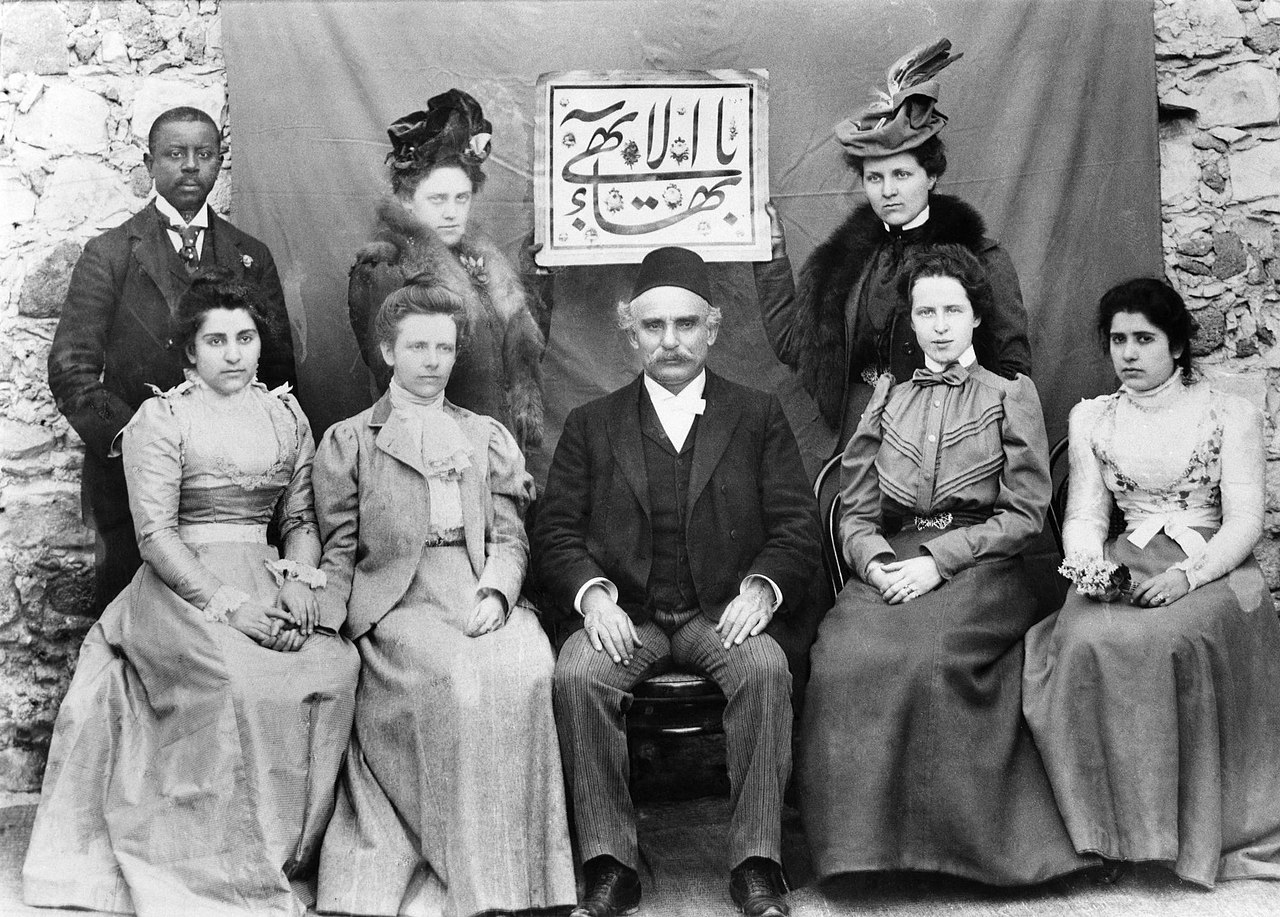
This historical photo of members of the group that made the first Western Pilgrimage in 1898. Wikimedia Commons.
Back row, left to right:
Robert Turner (first African-American Bahá'í
Anne Apperson (a niece of Phoebe Apperson Hearst)
Julia Pearson (Mrs. Hearst’s assistant and tutor for Agnes Lane, Mrs. Hearst's young cousin, not shown)
Front row, left to right:
One daughter of Ibrahim Khayru’lláh from his first marriage
Mrs. Marion Khayru’lláh, his second wife
Dr. Ibrahim Khayru’lláh
Lua Getsinger, one of the 19 Disciples of 'Abdu'l-Bahá and named by 'Abdu'l-Bahá, “Herald of the Covenant” and "Mother of the believers;" ʻAbdu'l-Bahá also gave Lua a Persian name, 'Livá' which means 'Banner' in English
The second daughter of Ibrahim Khayru’lláh from his first marriage
The arrival of fifteen pilgrims, in successive parties, in the prison-city of 'Akká, first on December 8, 1898, then a week later, and finally on February 13 and 20, 1899, marks the opening of a new epoch in the development of the Faith in the West. The pilgrims arrive in different groups, as a precaution, and the intimate personal contact between them and 'Abdu'l-Bahá, the Center of Bahá’u’lláh’s Covenant transforms them all, except for the ambitious and combative Khayru’lláh, who will break the Covenant upon his return to New York.
The pilgrims include Mrs. Hearst's butler, Robert Turner, who is the first African-American Bahá'í and remains a staunch Bahá'í, whereas Phoebe Hearst eventually becomes estranged from the Faith. 'Abdu'l-Bahá leads the pilgrims Himself into the innermost Shrine of Bahá'u'lláh, His loving and generous hospitality, His passionate appeals, His inspiring instructions and the many expressions of love kindle their hearts and spirits with zeal, and they return to the West to win extraordinary victories for the Faith.
For incredible details and wonderful stories on the pilgrims arriving in 'Akká during the years 1897 - 1911, please read Earl Redman's book, Visiting 'Abdu'l-Baha: Volume 1: The West Discovers the Master, 1897-1911, published by George Ronald.
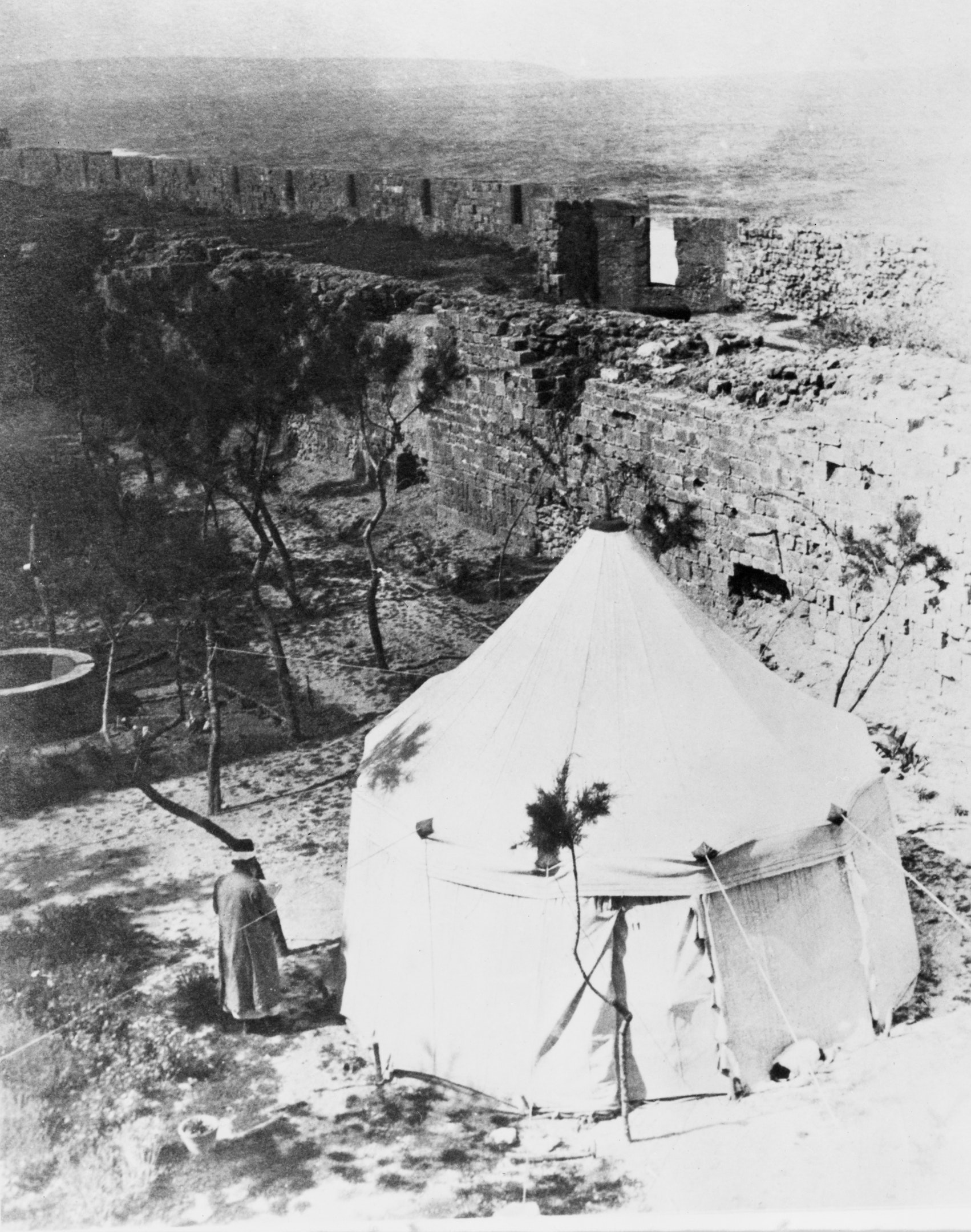
The tent of ‘Abdu’l-Bahá pitched in the courtyard of the House of ‘Abdu’lláh Páshá, which Thornton Chase speaks about, c. 1907, just a few years after he visited 'Akká. Bahá'í Media Bank.
When Thornton Chase arrives in 'Akká, the men are led to the house of 'Abdu'lláh Pashá, up the long flight of broken, ancient, stone steps, to their room, adjoining the one of 'Abdu'l-Bahá. From their room, they can see the sea, the inner garden and 'Abdu'l-Bahá's tent. This tent is where 'Abdu'l-Bahá meets daily visitors and officials who call on Him. 'Abdu'l-Bahá's tent, in the courtyard, is in plain view of the Governor of 'Akká, who can watch Him tirelessly minister, counsel and help the citizens of 'Akká.
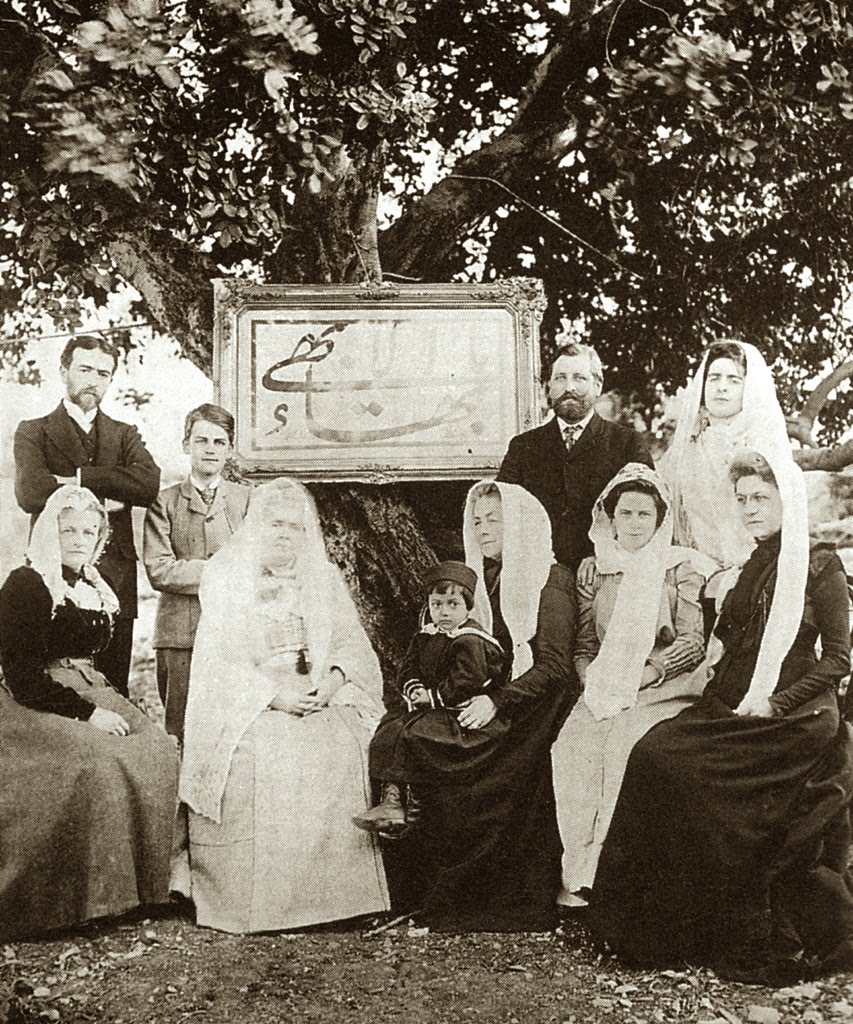
Western Bahá'í pilgrims in Akka in early 1901. Seated: Ethel Jenner Rosenberg, Madam Jackson, Shoghi Effendi, Helen Ellis Cole, Lua Getsinger, Emogene Hoagg; standing: Charles Mason Remey, Sigurd Russell, Edward Getsinger and Laura Clifford Barney. Source: Wikimedia Commons.
These first impressions of 'Abdu'l-Bahá by Westerners are powerful testimonies to His greatness and the power of the Covenant:
Of that first meeting, I can remember neither joy nor pain, nor anything that I can name. I had been carried suddenly to too great a height, my soul had come in contact with the Divine Spirit, and this force, so pure, so holy, so mighty, had overwhelmed me … We could not remove our eyes from His glorious face; we heard all that He said; we drank tea with Him at His bidding; but existence seemed suspended; and when He arose and suddenly left us, we came back with a start to life; but never again, oh! never again, thank God, the same life on this earth.
One pilgrim, quoted by Shoghi Effendi in God Passes By
In the might and majesty of His presence, our fear was turned to perfect faith, our weakness into strength, our sorrow into hope, and ourselves forgotten in our love for Him. As we all sat before Him, waiting to hear His words, some of the believers wept bitterly. He bade them dry their tears, but they could not for a moment. So again He asked them for His sake not to weep, nor would He talk to us and teach us until all tears were banished…
One pilgrim, quoted by Shoghi Effendi in God Passes By
Those three days were the most memorable days of my life … The Master I will not attempt to describe: I will only state that I believe with all my heart that He is the Master, and my greatest blessing in this world is that I have been privileged to be in His presence, and look upon His sanctified face … Without a doubt ‘Abbás Effendi is the Messiah of this day and generation, and we need not look for another.” “I must say,” she, moreover, has in another letter written, “He is the most wonderful Being I have ever met or ever expect to meet in this world … The spiritual atmosphere which surrounds Him and most powerfully affects all those who are blest by being near Him, is indescribable … I believe in Him with all my heart and soul, and I hope all who call themselves believers will concede to Him all the greatness, all the glory, and all the praise, for surely He is the Son of God—and ‘the spirit of the Father abideth in Him.
Mrs. Phoebe Hearst, quoted by Shoghi Effendi in God Passes By
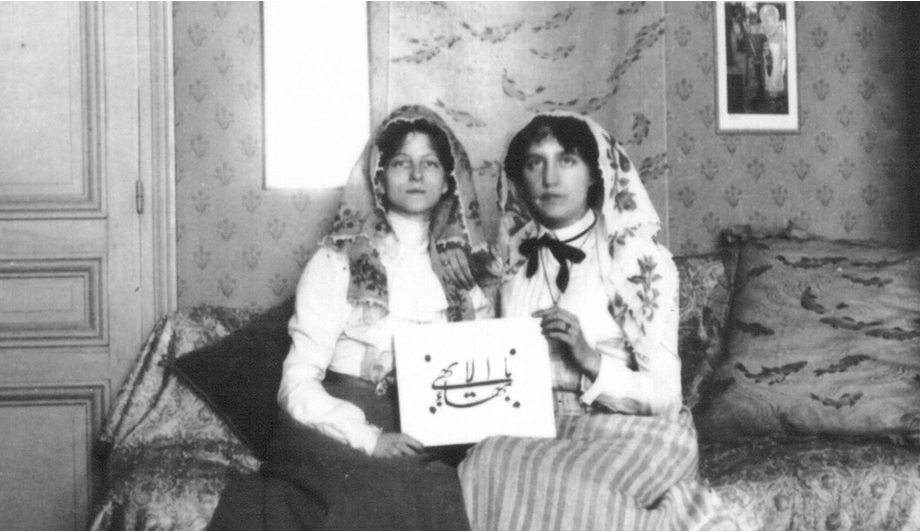
May Maxwell (left) in Paris with Edith MacKay. May established Europe’s first Bahá’í group in Paris. Source: Brilliant Star Magazine.
The return of the "God-intoxicated pilgrims" to France and the United States gives rise to an outburst of systematic and sustained teaching activity, which gathers momentum and spreads over Western Europe and all of North America. ‘Abdu’l‑Bahá decides that, as soon as He is released from incarceration by the Ottoman government, He will, Himself, undertake a personal mission to the West.
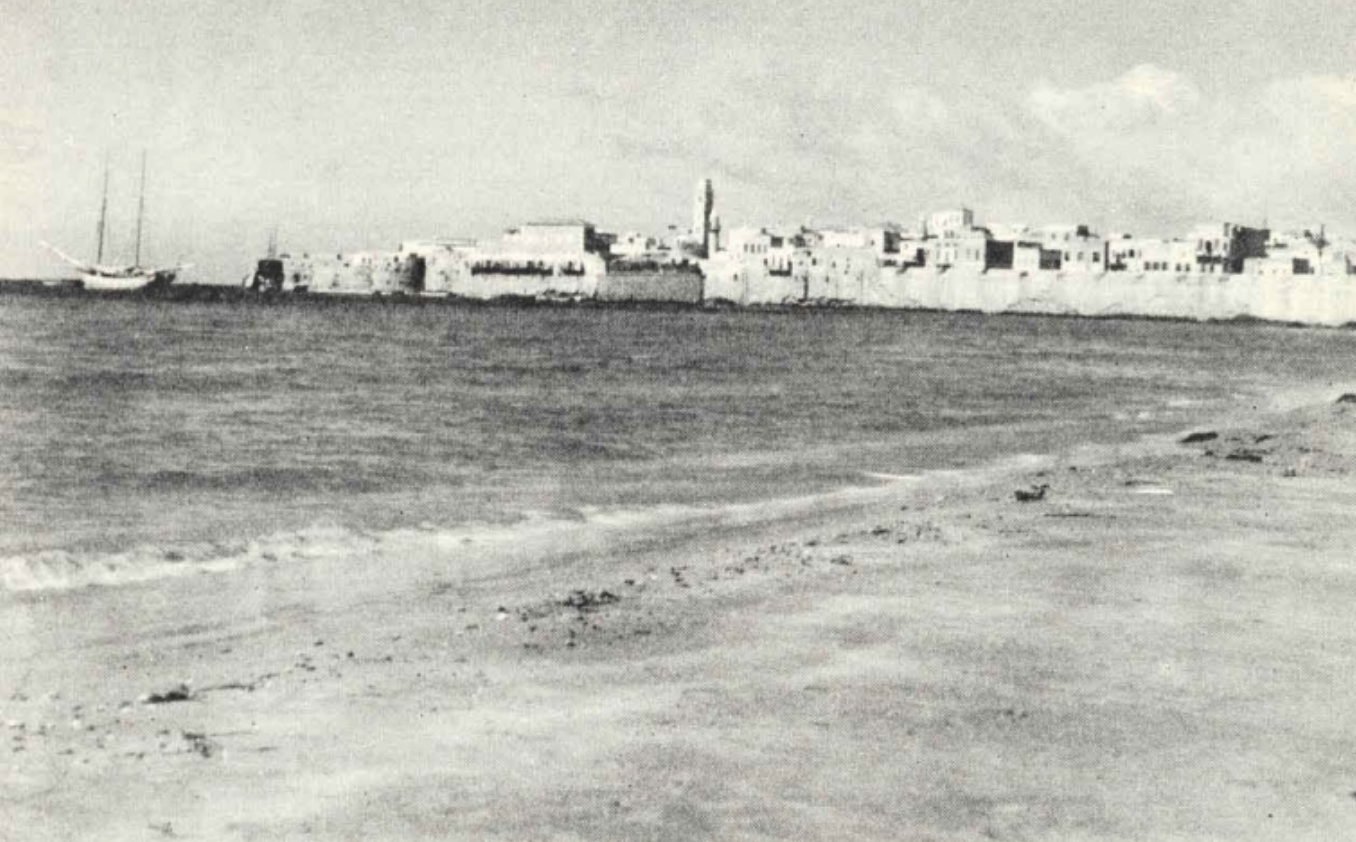
'Akká, viewed from the beach, in the 1930s. The Bahá'í World volume 5 (April 1932-1934) page 82.
The remains of the Báb arrive in 'Akká by boat from Beirut.
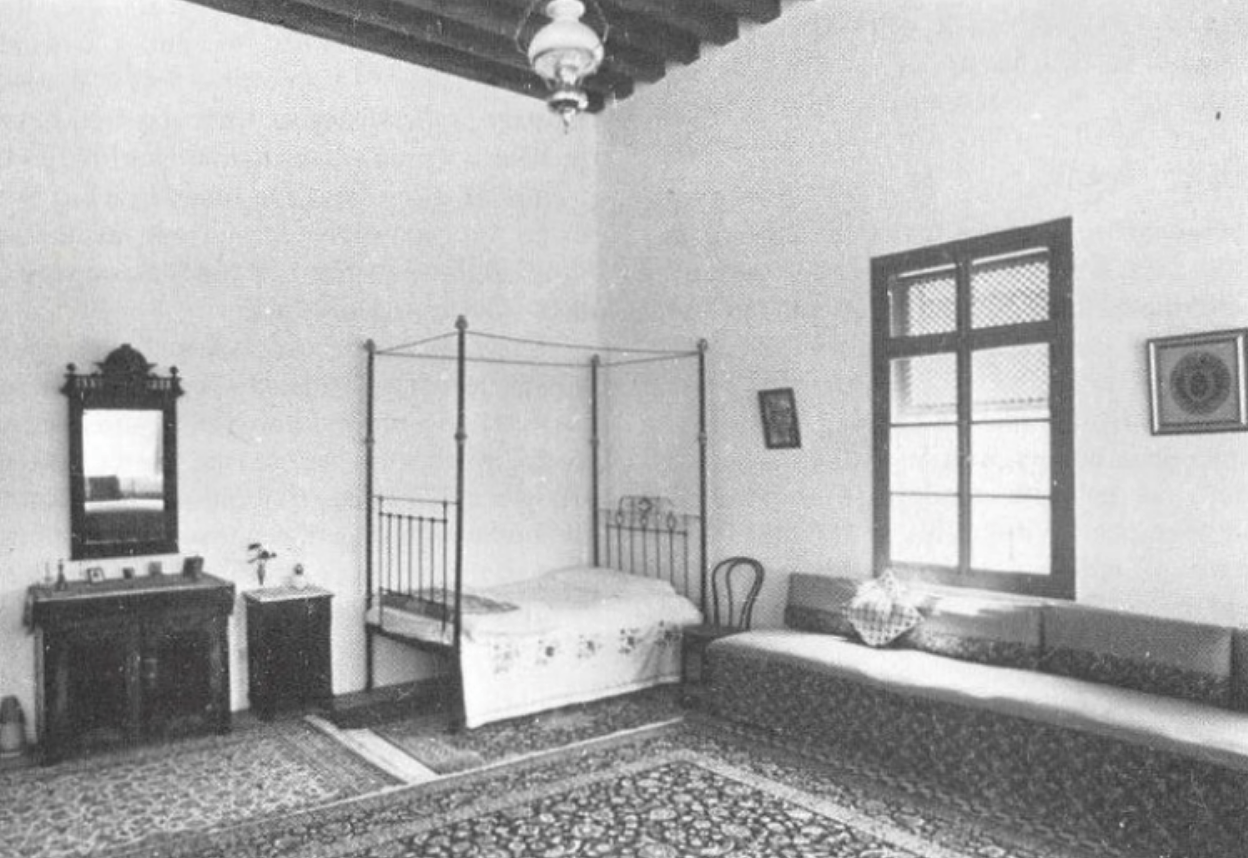
The Greatest Holy Leaf's room in the house of 'Abdu'lláh Páshá, where the remains of the Báb were stored for about a year. The Bahá'í World Volume 18, page 95.
Once the casket is safely in the house of 'Abdu'lláh Pashá, 'Abdu'l-Bahá stores it in the room of His beloved sister, Bahíyyih Khánum.
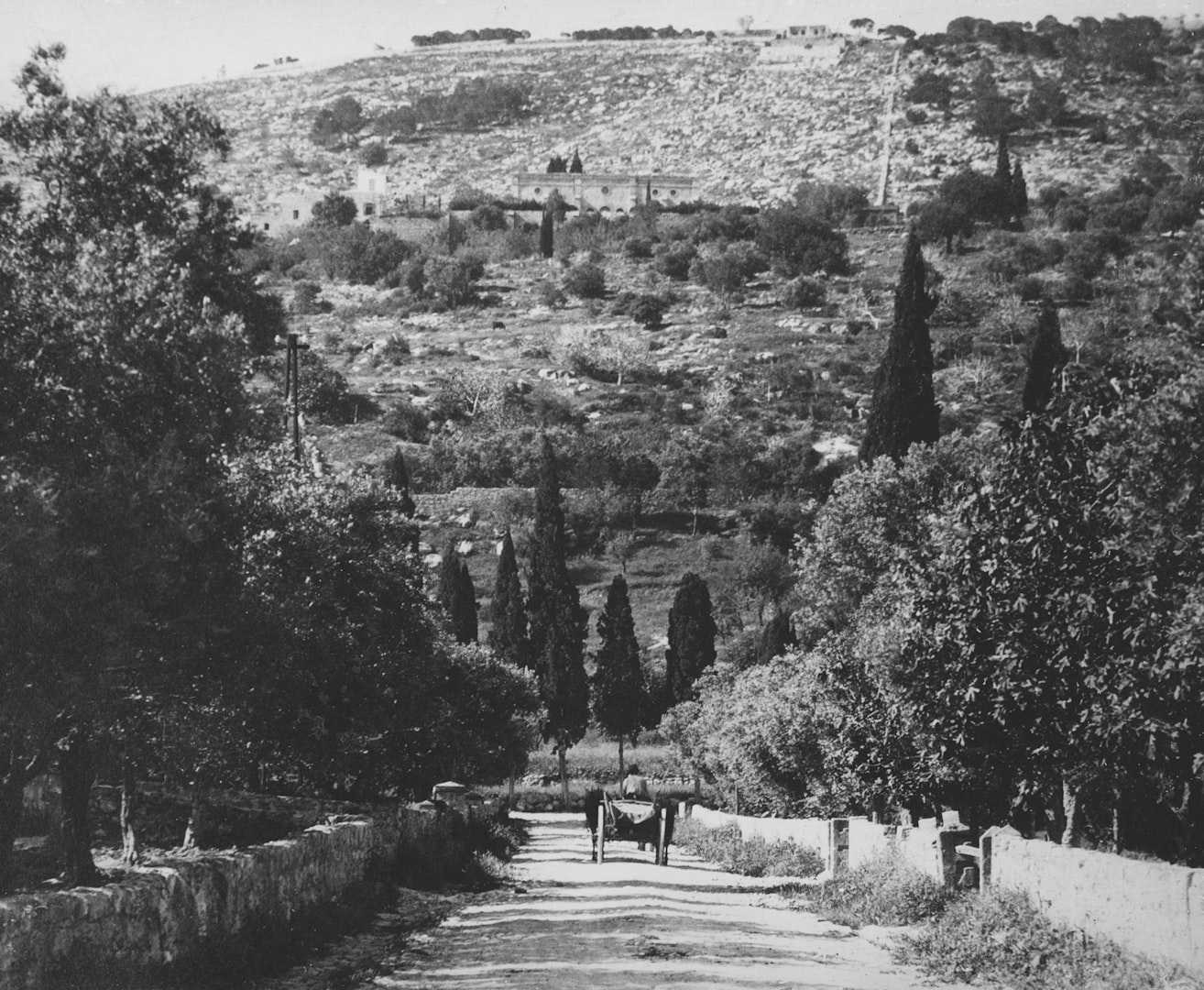
View of the Shrine of the Báb from the road which later became Ben Gurion Avenue (1905-1910). Source: Bahá'í Media Bank, © 2023 Bahá'í International Community.
The same year that the remains of the Báb arrive in the Holy Land, 'Abdu'l-Bahá drives to the recently-purchased land lays the foundation stone for the Shrine of the Báb.
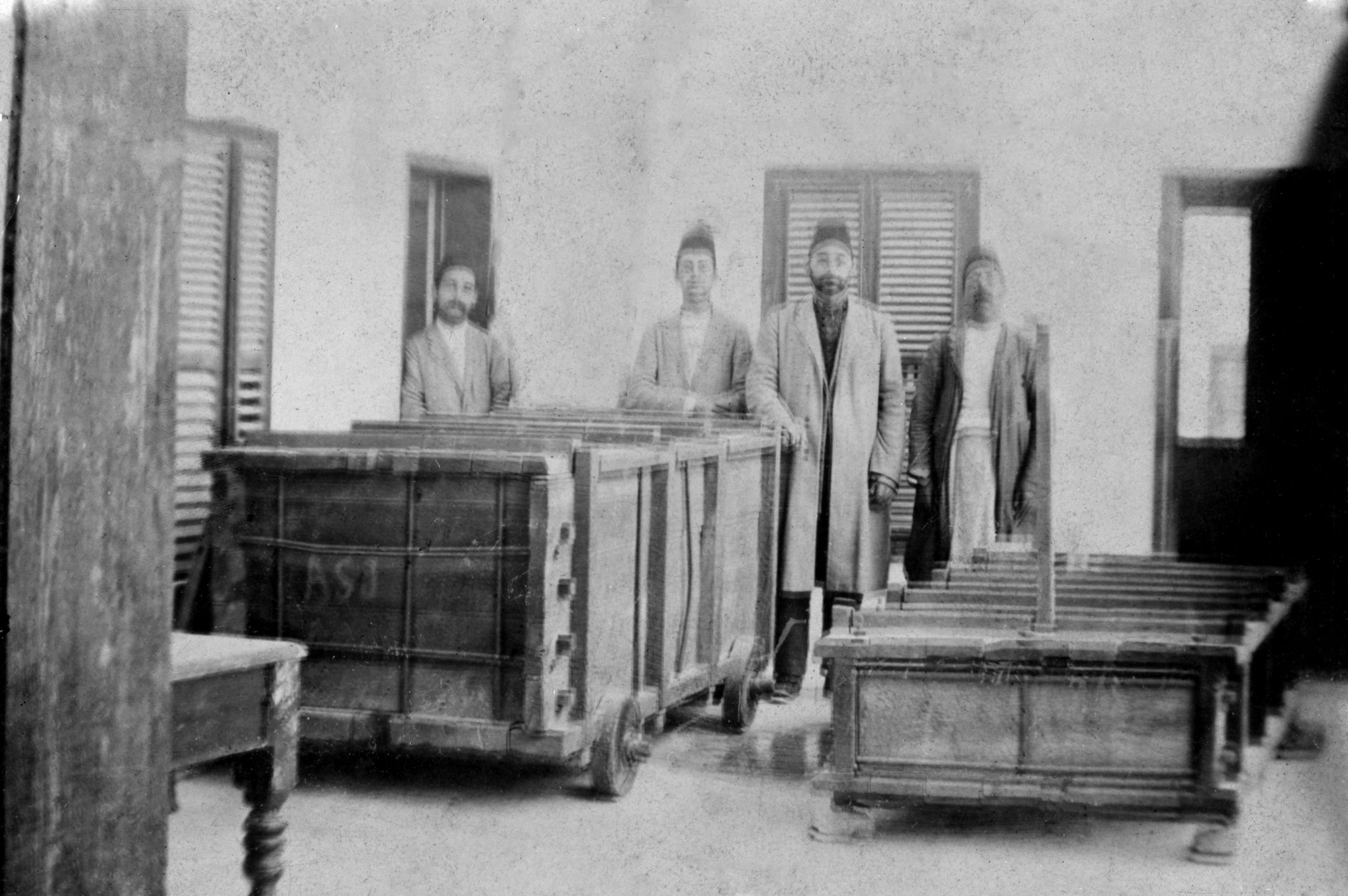
The large wooden crate containing the sarcophagus for the casket of the Báb in a house in Haifa some time before 1909. The identity of the Bahá’ís are unknown. Bahá'í Media Bank.
Sometime in 1899, the sarcophagus arrives in Haifa.
The first Bahá'í Local Spiritual Assembly is elected in Ṭihrán. The Bahá'í Administrative Order is officially born. ‘Abdu’l-Bahá has long helped the shattered Bábí community in Iran and fostered its recognition of Bahá’u’lláh.
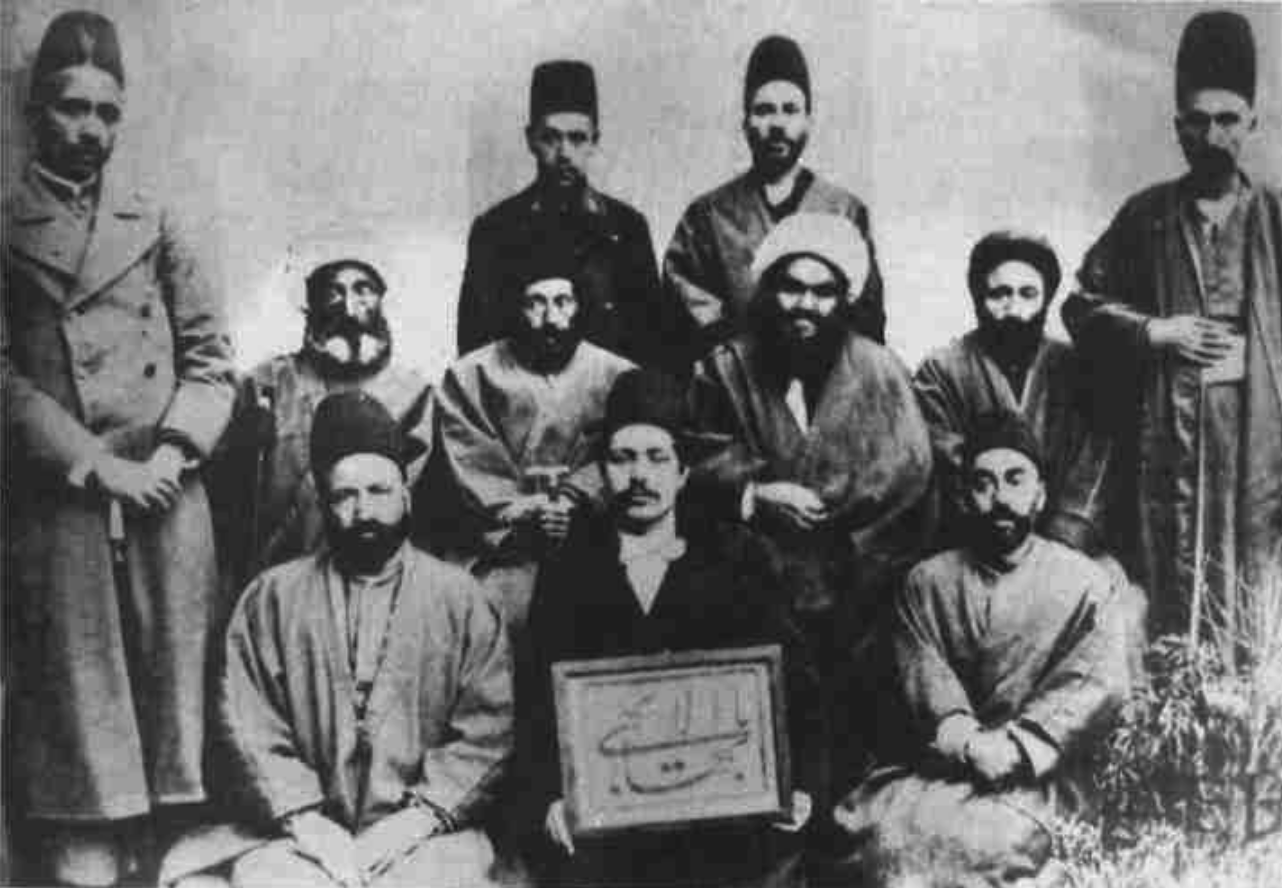
The first Local Spiritual Assembly of Ṭihrán in 1899. Adib Taherzadeh, The Revelation of Bahá'u'lláh, Volume 4, page 292.
Seated, front row, from left:
Ḥájí Mírzá ‘Abdu'lláh-Ṣaḥíḥ-Furúsh
Mírzá 'Azízu'lláh Varqá
Áqá Dhakaríyyá Javáhirí (Jewish background)
Seated middle row, from left: Three Hands of the Cause
Mírzá Ḥasan-i-Adíb
Mírzá 'Alí-Muḥammad Ibn-i-Aṣdaq
Ḥájí Mullá ‘Alí-Akbar (known as Ḥájí Ákhund)
Ḥájí Mírzá Muḥammad-i-Vakílu'd-Dawlih (an Afnán, from the family of the Báb)
Standing from left:
'Alí-Muḥammad Khán-i-Ásifu'l-Ḥukamá
Muḥammad Khán-i-Jadhbih
Mírzá Muḥammad-Ḥusayn-i-Muhtadí
Mírzá Síyávash-i-Sifídvash (Zoroastrian background)
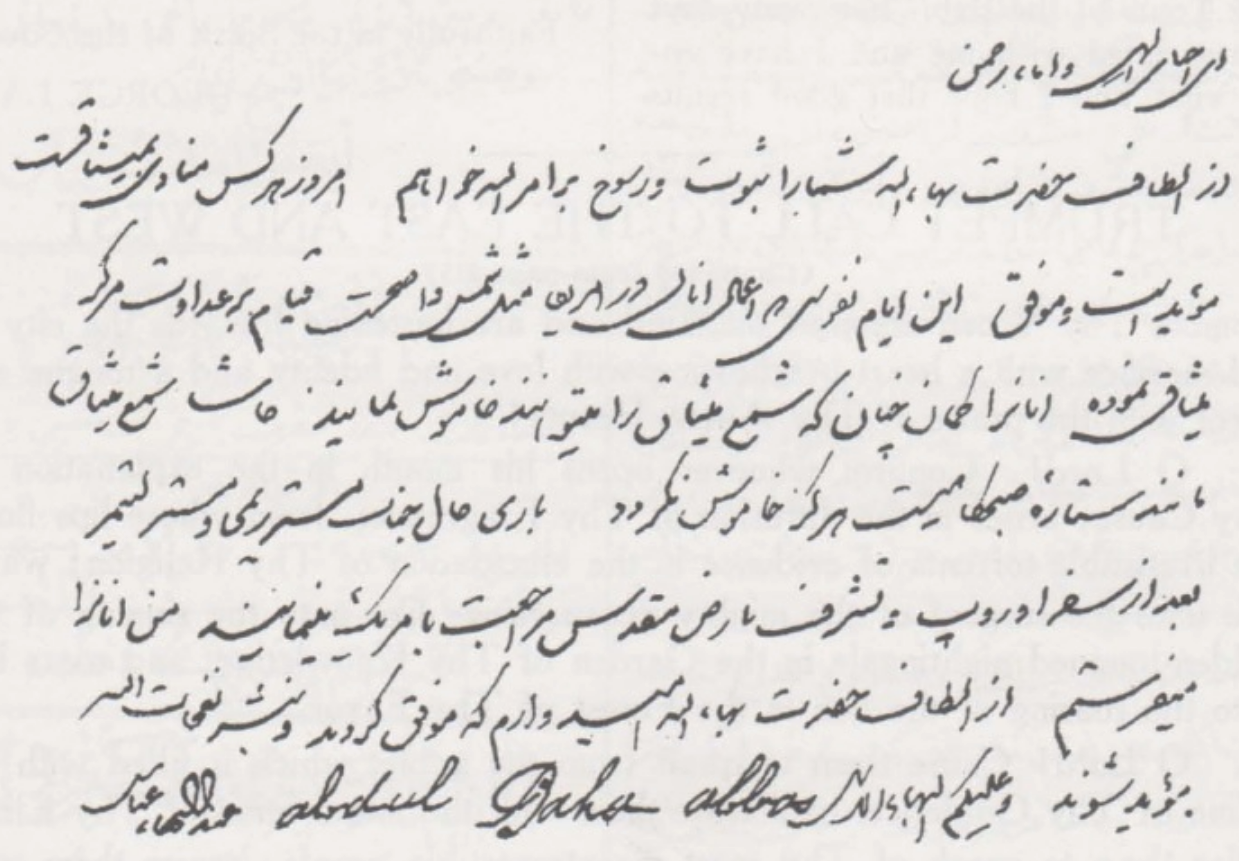
Tablet in the handwriting of 'Abdu'l-Bahá, published in Star of the West in 1914. There are facsimiles of Tablets from 1910, but the quality was too poor. Baha'i Media.
The first Tablets of ‘Abdu’l-Bahá arrive in America.
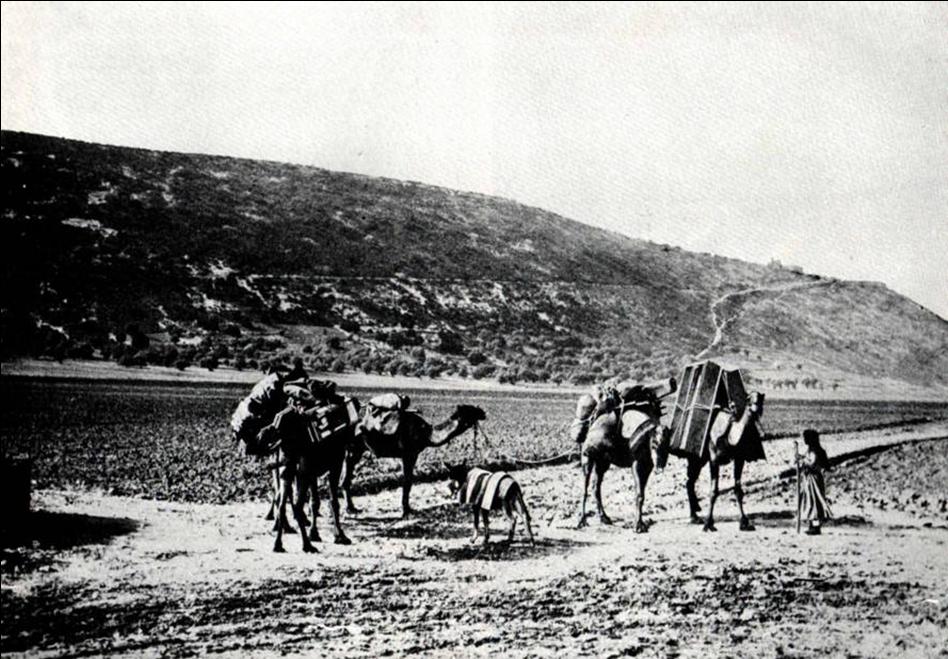
The road to Haifa in 1900: A caravan in Kiryat Eli'ezer of today. Source: Wikimedia Commons.
'Abdu'l-Bahá secretly transfers the casket containing the remains of the Báb to Haifa.
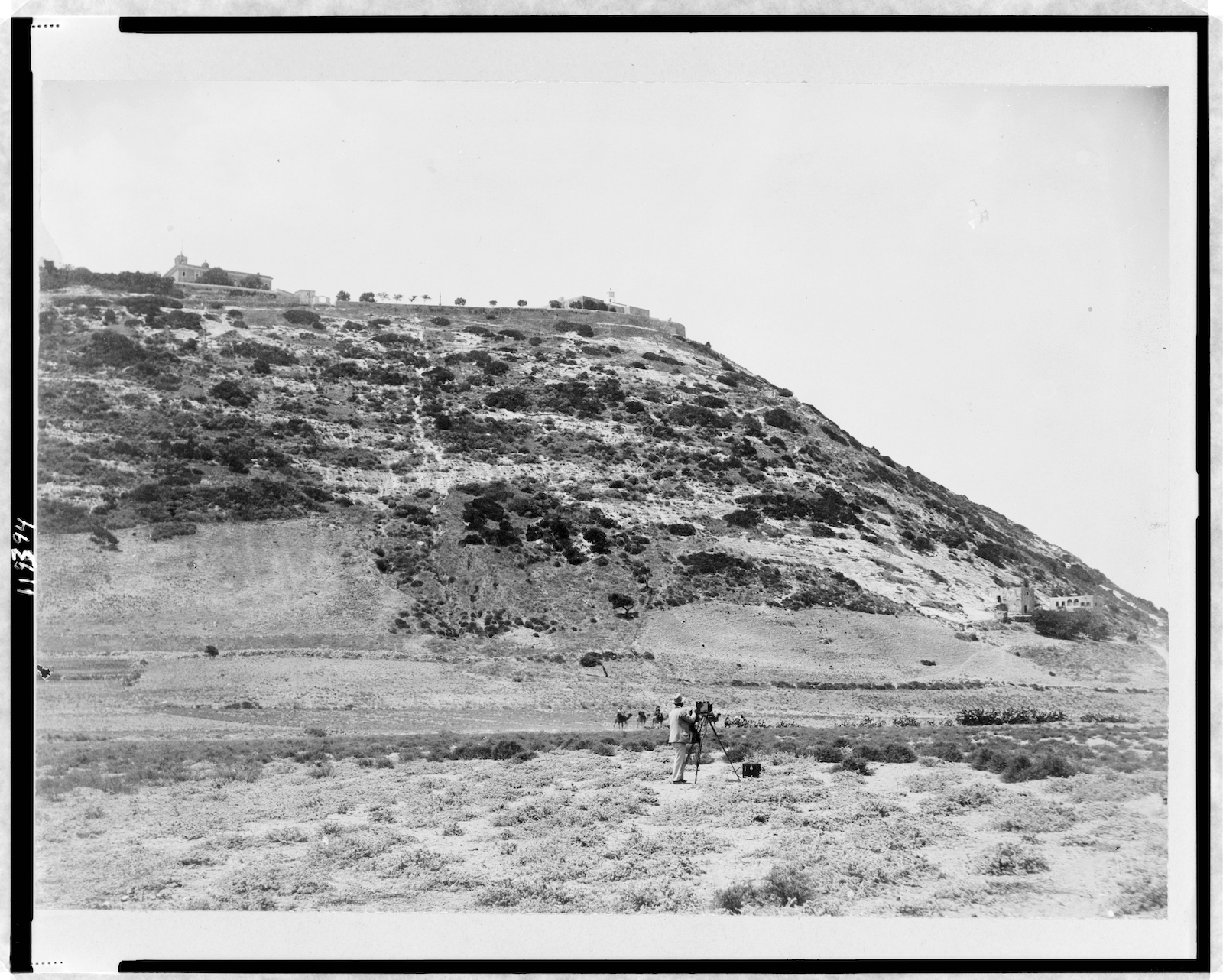
Mount Carmel in Palestine between 1880 and 1920. This wonderful photo from the Library of Congress also shows the site of the Haifa Bahá’í Cemetery – the area just behind and slightly uphill from the camel train, at the level of the man standing in the foreground. The photo was taken before 1909, when the first burial took place. Detailed caption provided by Andrew Blake. Library of Congress
'Abdu'l-Bahá sets in motion His plan to purchase the land on Mount Carmel which Bahá'u'lláh had indicated to Him in June 1891. The owner of the future building site for the Shrine is shrewd and calculating, and corrupted by the Covenant-breakers. Negotiations with him are long and drawn out as he first refuses to sell. He then demands an outrageous price for the opening of an access road vital to the construction work. Officials in Haifa raise endless objections and 'Abdu'l-Bahá has to repeatedly give them explanations and reassurances, as their suspicions are easily aroused, thanks to Mírzá Muḥammad-‘Alí's absolutely monstrous allegations regarding the purposes of the Shrine. 'Abdu'l-Bahá Himself concludes this dramatic episode:
One night, I was so hemmed in by My anxieties that I had no other recourse than to recite and repeat over and over again a prayer of the Báb which I had in My possession, the recital of which greatly calmed Me. The next morning the owner of the plot himself came to Me, apologized and begged Me to purchase his property.
'Abdu'l-Bahá quoted by Shoghi Effendi in God Passes By
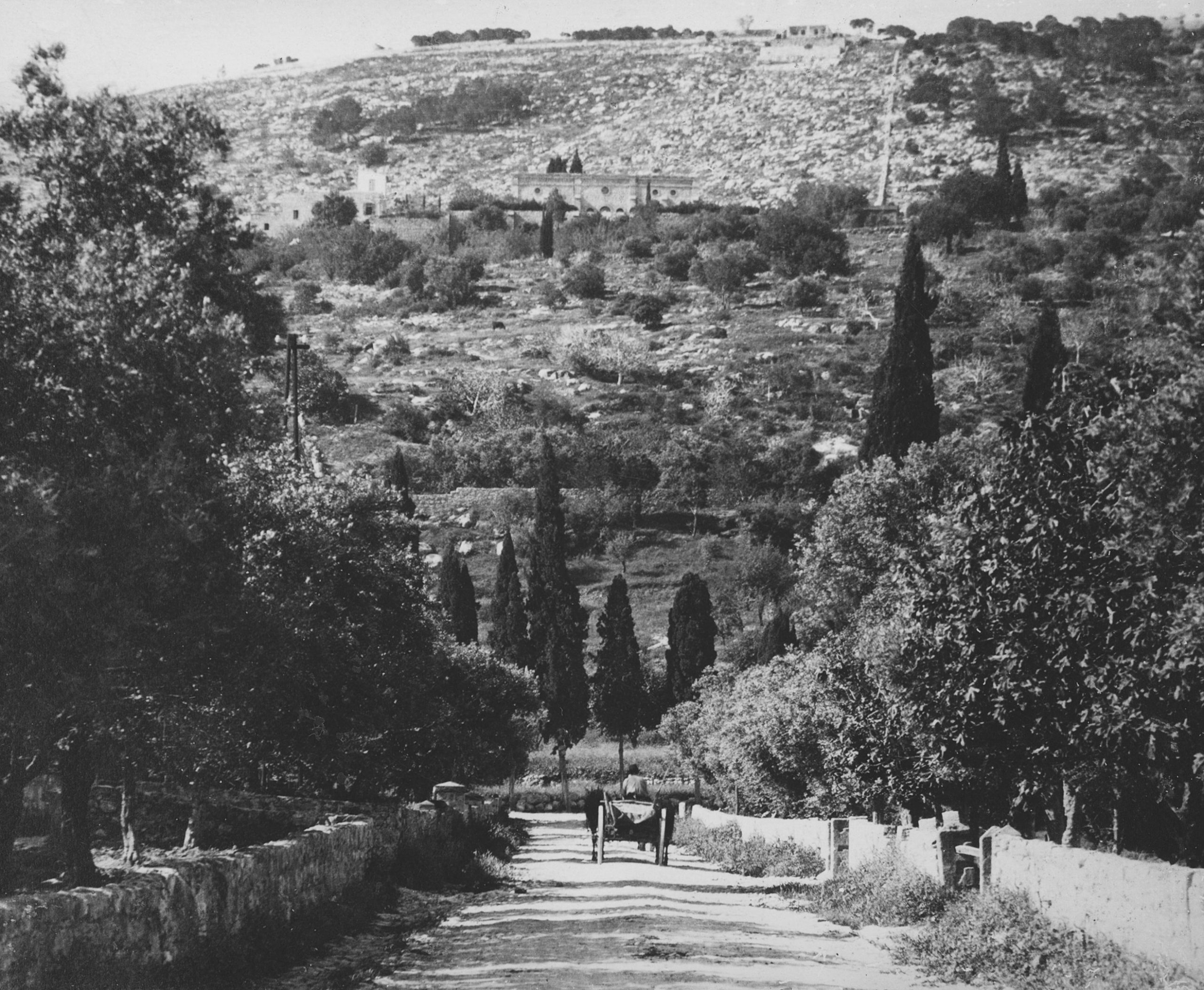
View of the Shrine of the Báb from the road which later became Ben Gurion Avenue. This photo was taken around 1926, when municipal electricity was first installed. You can clearly see an electricity pole showing between the trees (on the left side of the picture, in the middle) in the German Colony. Detailed caption provided by Andrew Blake. Bahá'í Media Bank.
'Abdu'l-Bahá begins the construction of the Shrine.
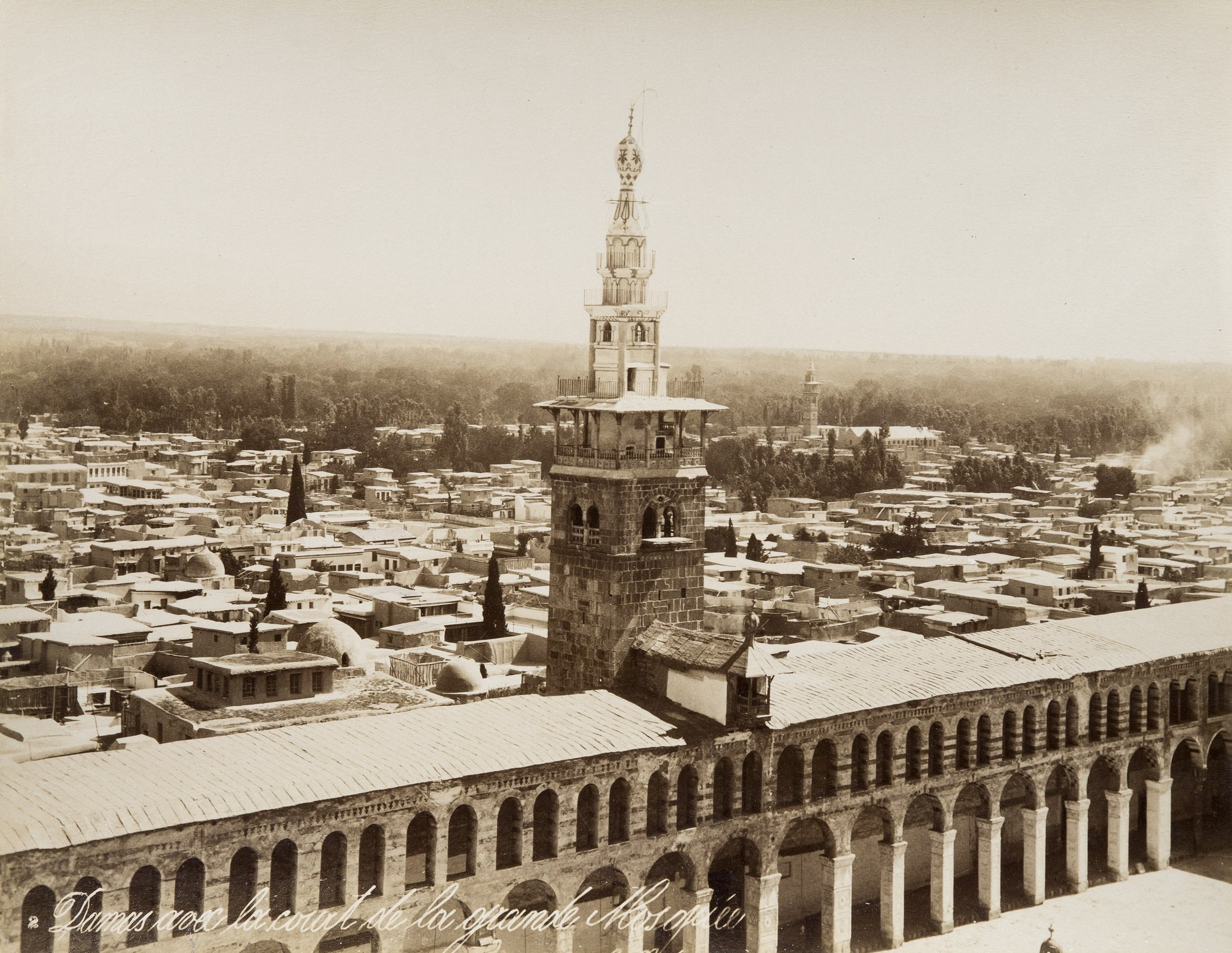
Damascus, date unknown. Wikimedia Commons.
'Mírzá Majid’Dín the devious son of Mírzá Músá, egged on by 'Mírzá Muḥammad-‘Alí, mortgages the Mansion of Bahjí and travels to Damascus with the money as bribes for Ottoman officials. In Damascus, he feeds lies to the Governor and authorities, misrepresents the Shrine 'Abdu'l-Bahá is building as a fortress and the flow of pilgrims as an army of foreign spies and military advisors. 'Abdu'l-Bahá does not suspend work on the Shrine, but takes precautionary measures. The Master does, however, suspend all pilgrimage by Eastern and Western believers during this very delicate time. Their presence and the associated festivities would raise Ottoman suspicions even further.
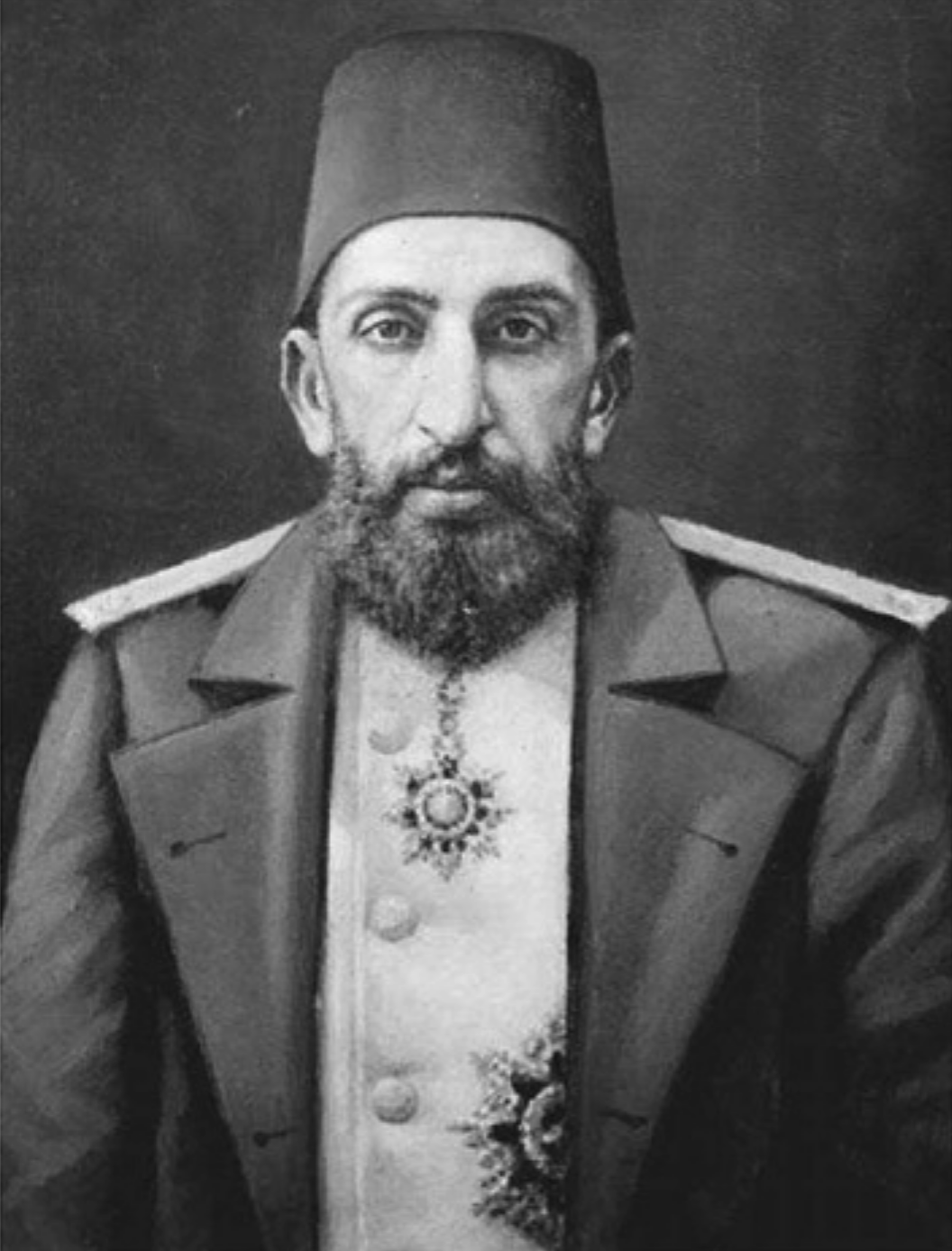
Sulṭán ‘Abdu’l-Hamíd II in January 1899. Wikimedia Commons.
The second crisis in the Ministry of 'Abdu'l-Bahá is precipitated by the actions of the Covenant-breakers in Damascus. ‘Abdu’l‑Bahá, returning from Bahjí after a Holy Day celebration is informed by the Governor of ‘Akká that Sulṭán ‘Abdu’l-Hamíd has ordered the restrictions on His freedom should be reimposed.
For several consecutive days after August 20, 1901, ‘Abdu’l‑Bahá is subjected, alone and unaided, to a prolonged interrogation by judges and officials, at government headquarters in 'Akká. One of the first things 'Abdu'l-Bahá does is try and defend His brothers, also summoned for investigation, but this act does not soften His brother's hearts. 'Abdu'l-Bahá does succeed, however, in relaxing the restrictions imposed on the Bahá'ís in 'Akká who can therefore continue to earn a living. It is interesting to note how the actions of the Covenant-breakers, meant to harm 'Abdu'l-Bahá, backfire as they are also brought back from their comfortable residences in the Mansion of Bahjí and Tiberias and confined to the prison-city.
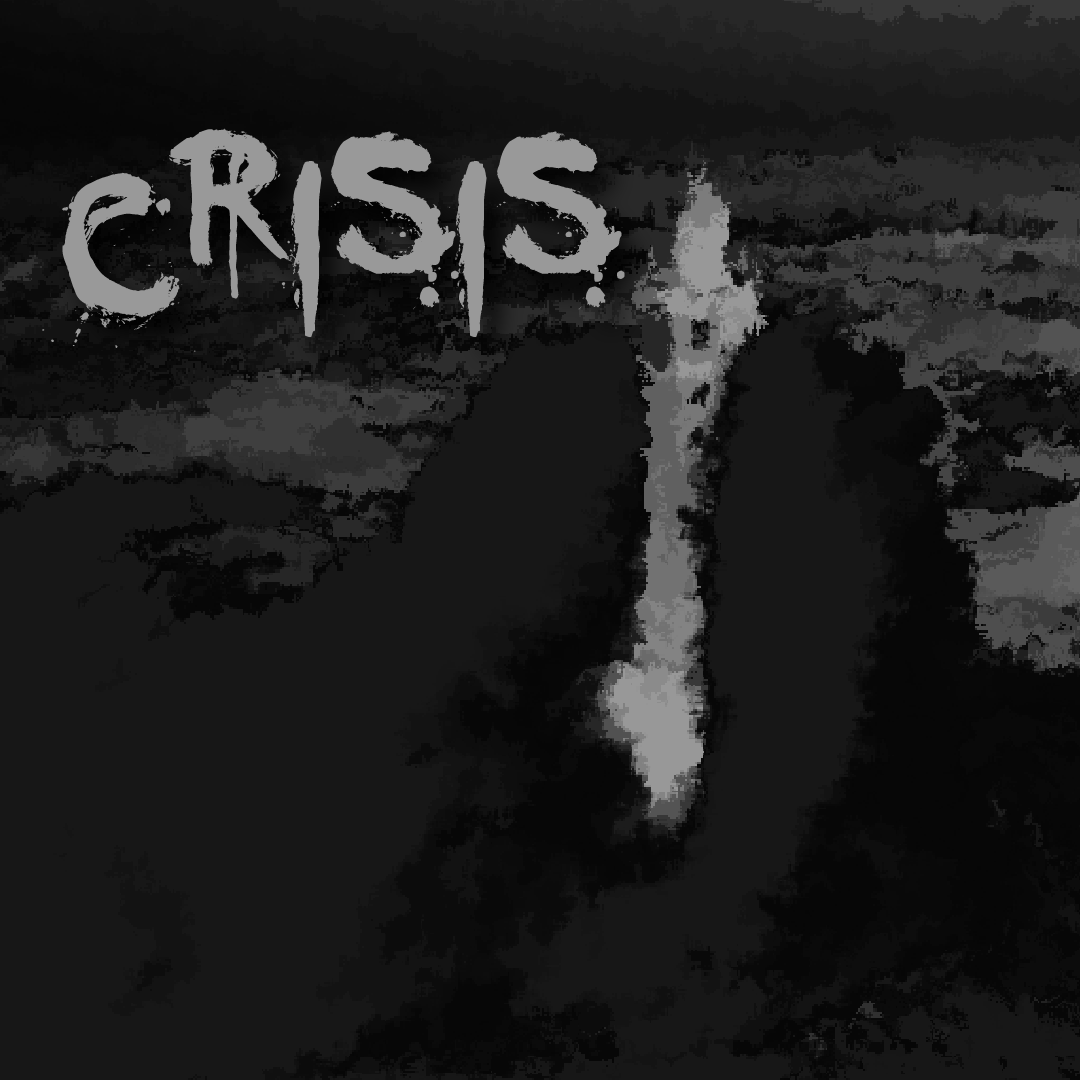
© 2023 Violetta Zein.
The years 1901-1902 are dark days for 'Abdu'l-Bahá. Rumors in 'Akká predict a terrible outcome, echoed in newspapers in Egypt and Syria. The attitude of the enemies of 'Abdu'l-Bahá becomes more aggressive. residents of 'Akká and Haifa develop a provocative attitude, steeled by the plottings of the Covenant-breakers. 'Abdu'l-Bahá suspends all pilgrimage by Eastern and Western pilgrims during this very delicate time.
The Master also reroutes His mail through Egypt, rather than Haifa and directs the believers to gather and safekeep all the Bahá'í Holy Writings in their possession, going so far as to ask them to leave 'Akká and move to Egypt and forbidding Bahá'í gatherings in the house of 'Abdu'lláh Pashá. 'Abdu'l-Bahá's friends and admirers stay away, afraid of being implicated, and 'Abdu'l-Bahá's home, for many years the focus of so much activity, is completely deserted. Spies keep constant watch on His home and restrict His family's freedom.

Photo by corina ardeleanu on Unsplash, graphic © 2023 Violetta Zein.
During the darkest hours of these eight years, as we will see in more detail below, 'Abdu'l-Bahá wins some of the greatest victories of His Ministry. He begins work on the House of worship in ‘Ishqábád, writes His Will and Testament, rears the beginnings of the administrative, spiritual and educational institutions of the Faith, oversees the spread of the Faith in Canada, France, England, Germany, Egypt, ‘Iráq, Russia, India, Burma, Japan, and remote Pacific Islands. '
Abdu'l-Bahá also spurs the translation, publication and dissemination of Bahá’í literature and He, Himself, pens up to 90 tablets in a single day during this dark period. The Master gathers Christian, Muslim, Jewish, Zoroastrian, Hindu and Buddhist pilgrims, friends, and inquirers from numerous countries. Every single Friday morning, no matter what danger He is in, 'Abdu'l-Bahá, who earns the title of "Father of the Poor," distributes alms to the needy who fill His courtyard. Nothing, no matter how dangerous, severe or worrisome to others, can shake His confidence. Nothing stops 'Abdu'l-Bahá from ministering to the poor, the orphan, the downtrodden, the sick, from calling in person on those who are too unwell or too ashamed to come to Him.
'Abdu'l-Bahá follows the illustrious examples of the Báb and Bahá'u'lláh and refuses, like them, to flee, even when the Spanish Consul uses his family relationships in a steamship company to place at 'Abdu'l-Bahá's disposal an Italian freighter ready to take Him to any port He wishes. Instead, 'Abdu'l-Bahá, to the amazement of His friends and the amusement of His enemies, plants trees and vines in the garden of 'Abdu'lláh Páshá.
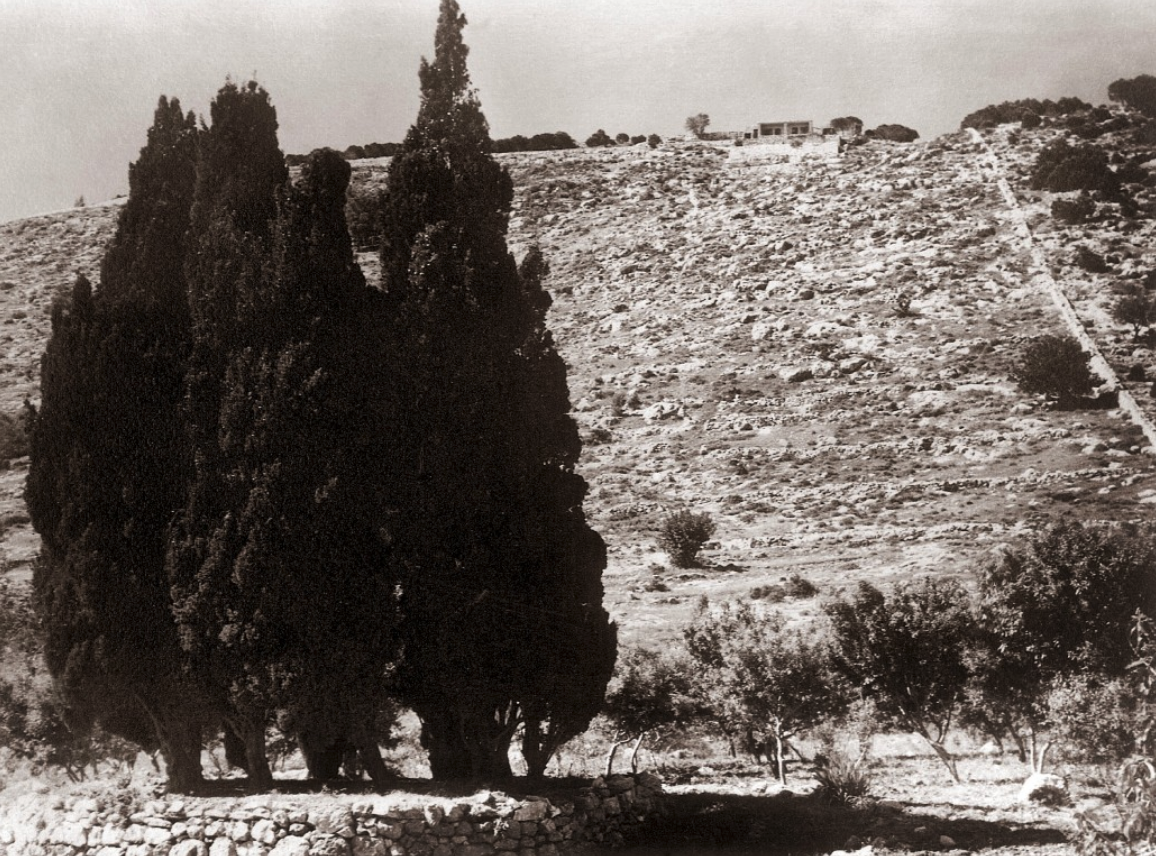
This photo of Mount Carmel, showing the Circle of Cypress was taken sometime between 1910 and 1917 – based on the age of the fruit trees seen here in ‘Abdu’l-Bahá’s orchard, and compared against another photo taken in 1917. Detailed caption provided by Andrew Blake. Beyond Foreignness.
During these eight years, 'Abdu'l-Bahá is unable to leave 'Akká and supervises the construction of the Shrine in Haifa from confinement. His reincarceration notwithstanding, the construction of the Shrine never halts even while the Covenant-breakers continue to plot.
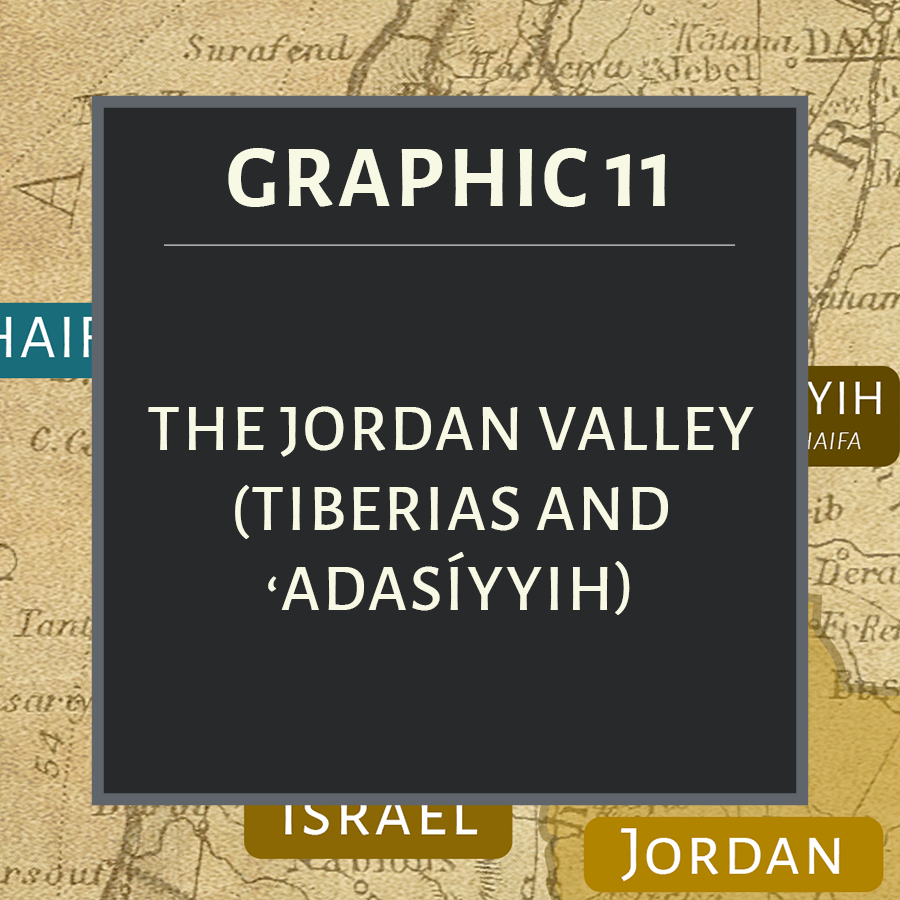
Map of locations in the Jordan Valley and around the Sea of Galilee associated with ‘Abdu’l-Bahá in this part of the chronology. Original graphic by Violetta Zein. Base map: 1910 United States Bureau of Plant Industry map of Agricultural and botanical explorations in Palestine by Aaron Aaronsohn. Wikimedia Commons.
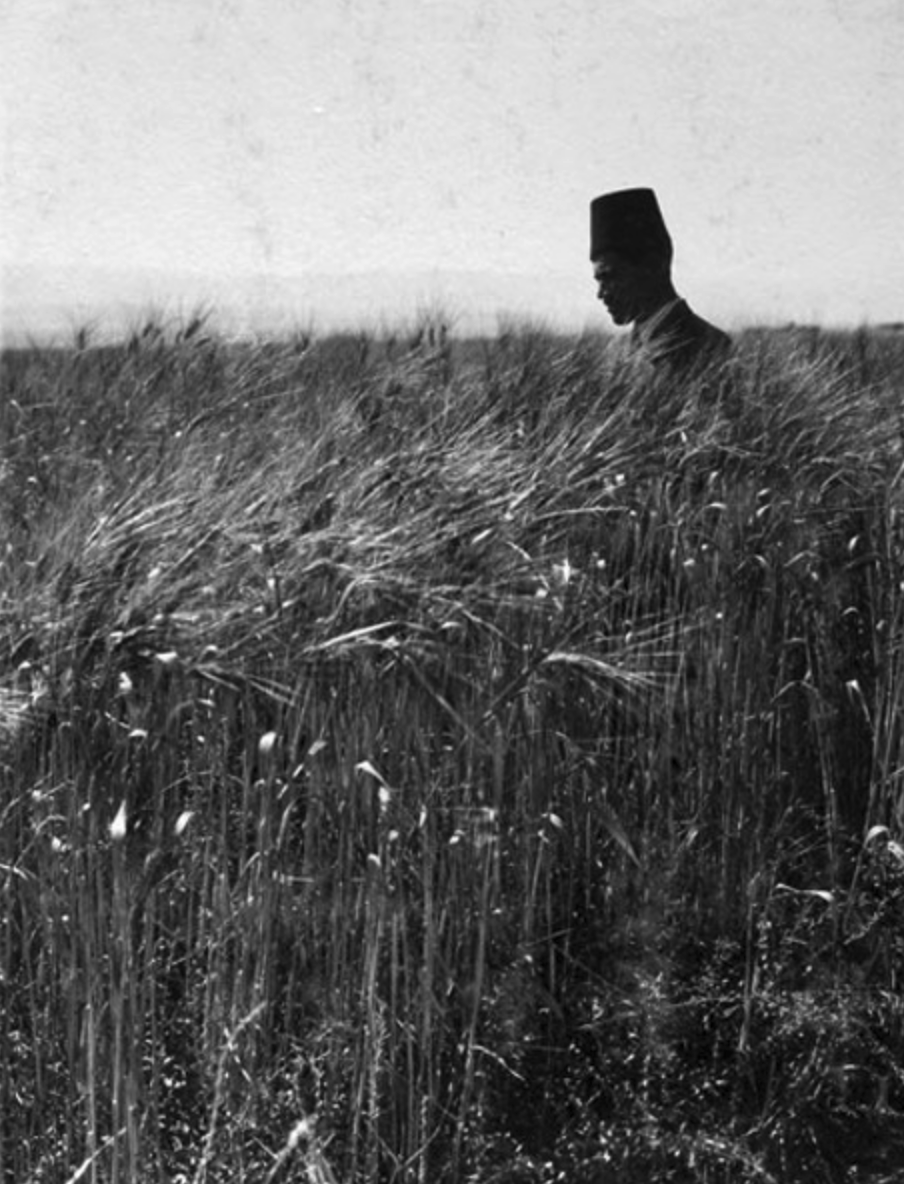
A wheat field in the Jordan valley in 1900. Wikimedia Commons.
ʻAdasíyyih is a village situated at the confluence of the Jordan and Yarmuk rivers and has a long history of settlements and farming stretching over two thousand years. The three owners of the lands of ʻAdasíyyih, upon hearing that ‘Abdu’l-Bahá in Haifa is a prospective buyer, decide to go and visit Him. ‘Abdu’l-Bahá agrees to the purchase and pays them 400 Turkish gold lira for the 2,272 acres of ‘Adasíyyih. Once the purchase is complete, ‘Abdu’l-Bahá returns a portion of the land back to the original owners, donates a portion of land to the Mufti of ‘Akká and gives His brother Mírzá Muḥammad-‘Alí 284 acres, which leaves ‘Abdu’l-Bahá with 1,704 acres of land.
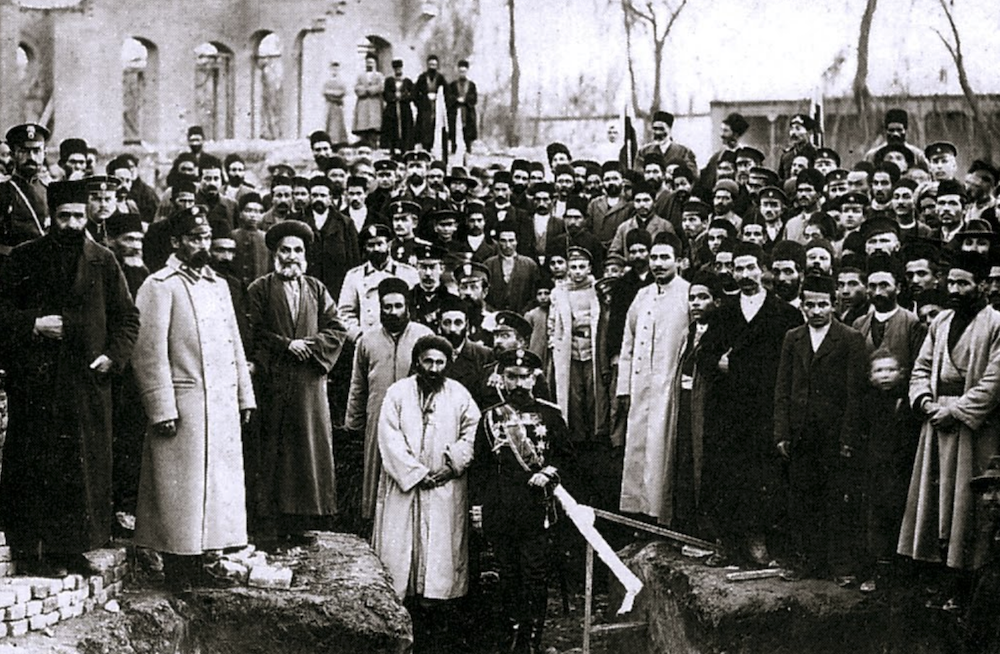
Laying the foundation stone of the Baha'i House of Worship in 'Ishqábád, Russia Ḥájí Mírzá Muḥammad-Taqí, a cousin of the Báb, is standing next to General Aleksey Nikolayevich Kuropatkin in the first row. Worldwide Community of Baha'u'llah.
Undaunted by these terrible times in 'Akká, 'Abdu'l-Bahá presses on with the second of the three aims of His Ministry. The foundation stone of the first Bahá'í House of Worship in history is laid in a moving ceremony attended by General Kupatkin, the Governor-General of Turkistán and the representative of the Czar. A Russian architect plans and executes the details of the construction laid out by 'Abdu'l-Bahá during Ustád 'Alí-Akbar's pilgrimage in 1893-1894.
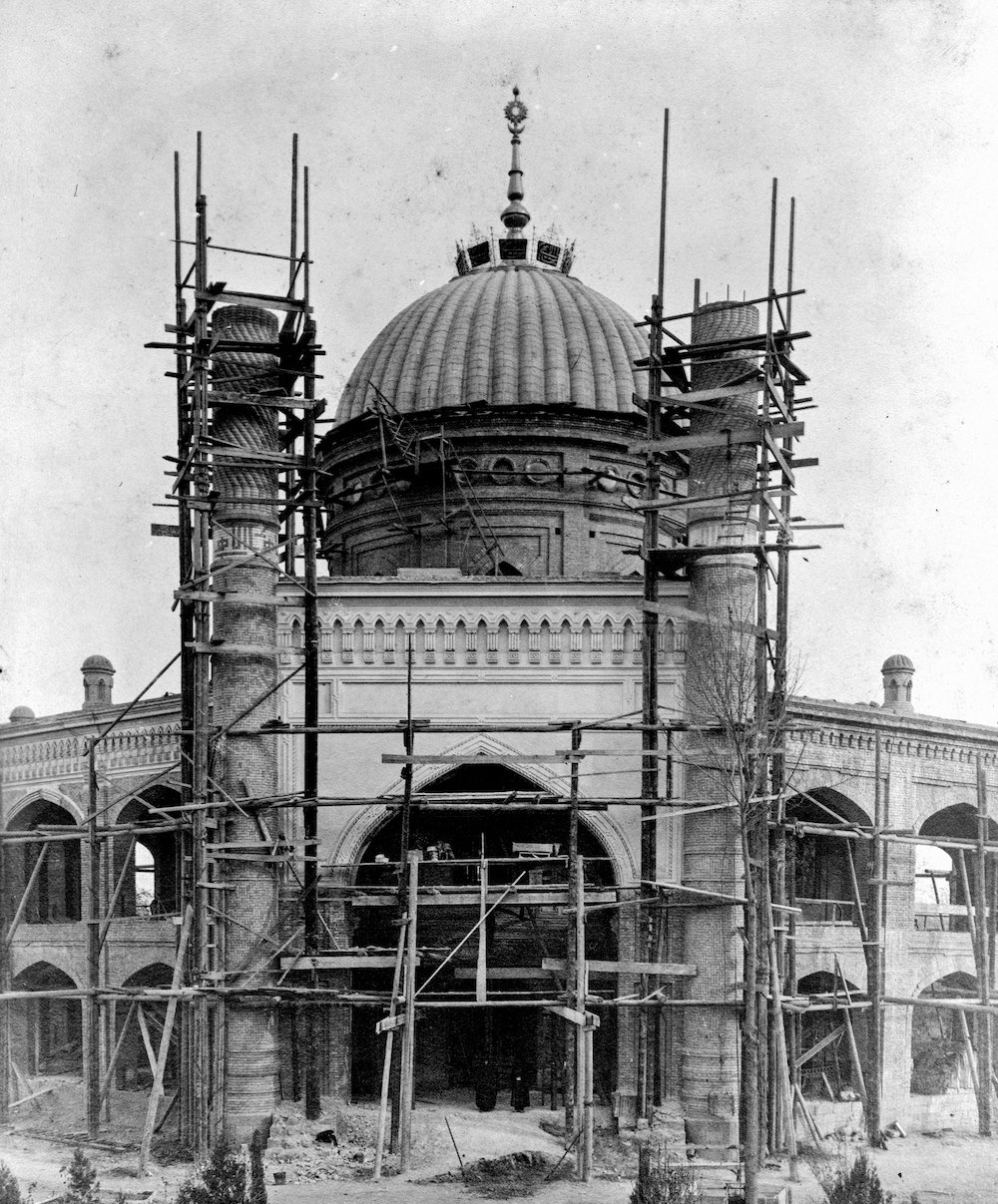
Construction of the Continental Bahá’í House of Worship of Central Asia (Ashkhabad, Turkmenistan), 1900s
After the laying of the foundation stone in 1902, the construction of the House of Worship is supervised by Ustad 'Ali Akbar Yazdi and Volkov, a Russian engineer.
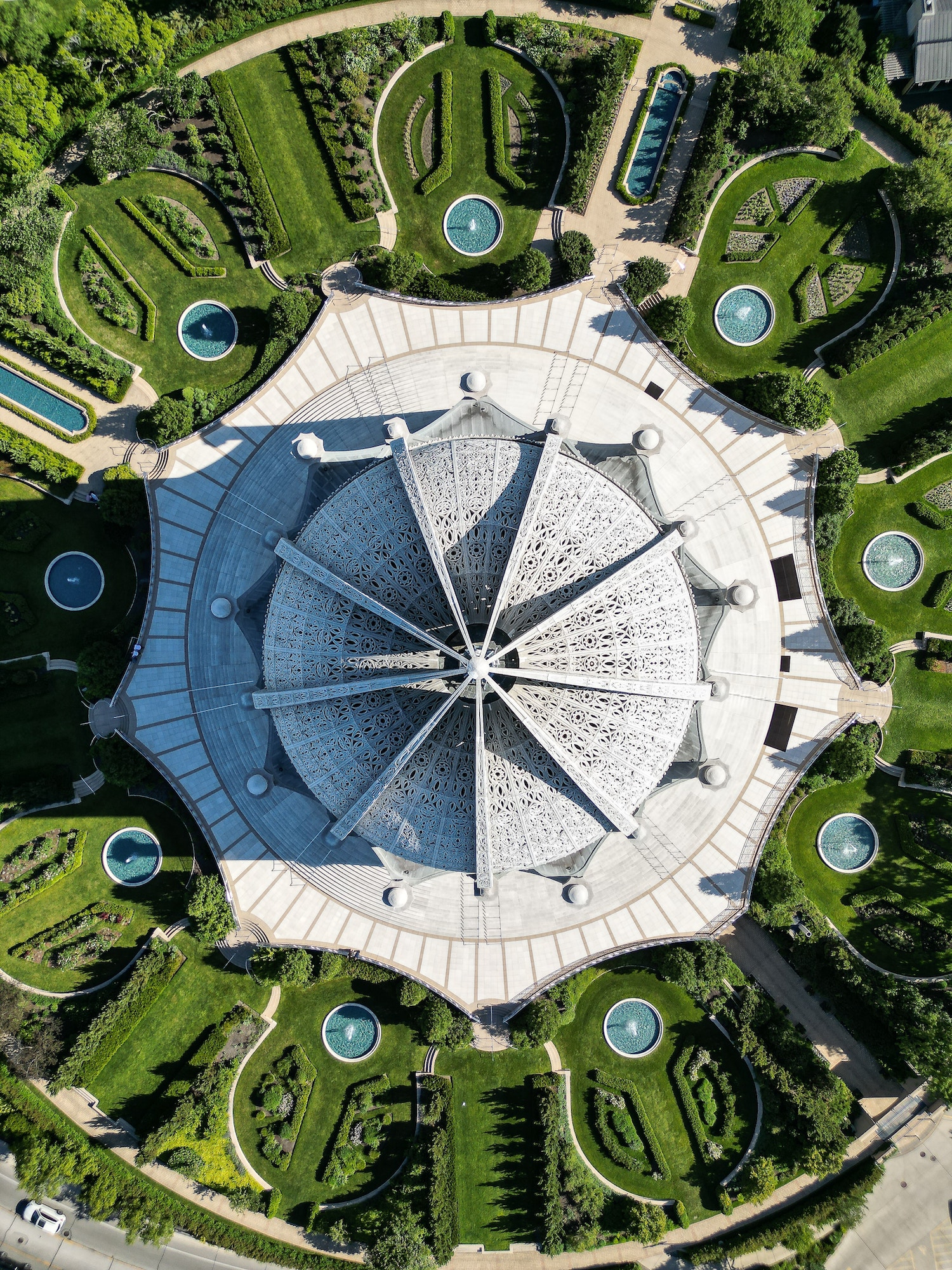
Photo by Vasilis Karkalas on Unsplash
Inspired by their eastern counterparts in ‘Ishqábád, who have started building the first Bahá'í House of Worship, the Bahá’ís of Chicago, petition ‘Abdu’l‑Bahá for permission to build a House of Worship in North America. In June 1903, 'Abdu'l-Bahá gives them His enthusiastic approval, despite the small size of the community and their limited resources. On November 26, 1907, they appoint a committee of nine to find a suitable site for the Temple. On April 9, 1908, they purchase two plots of land on the shores of Lake Michigan for $2,000. By 1910, two years before 'Abdu'l-Bahá's arrival, they raise $20,000, which is more than half a million dollars in today's currency.
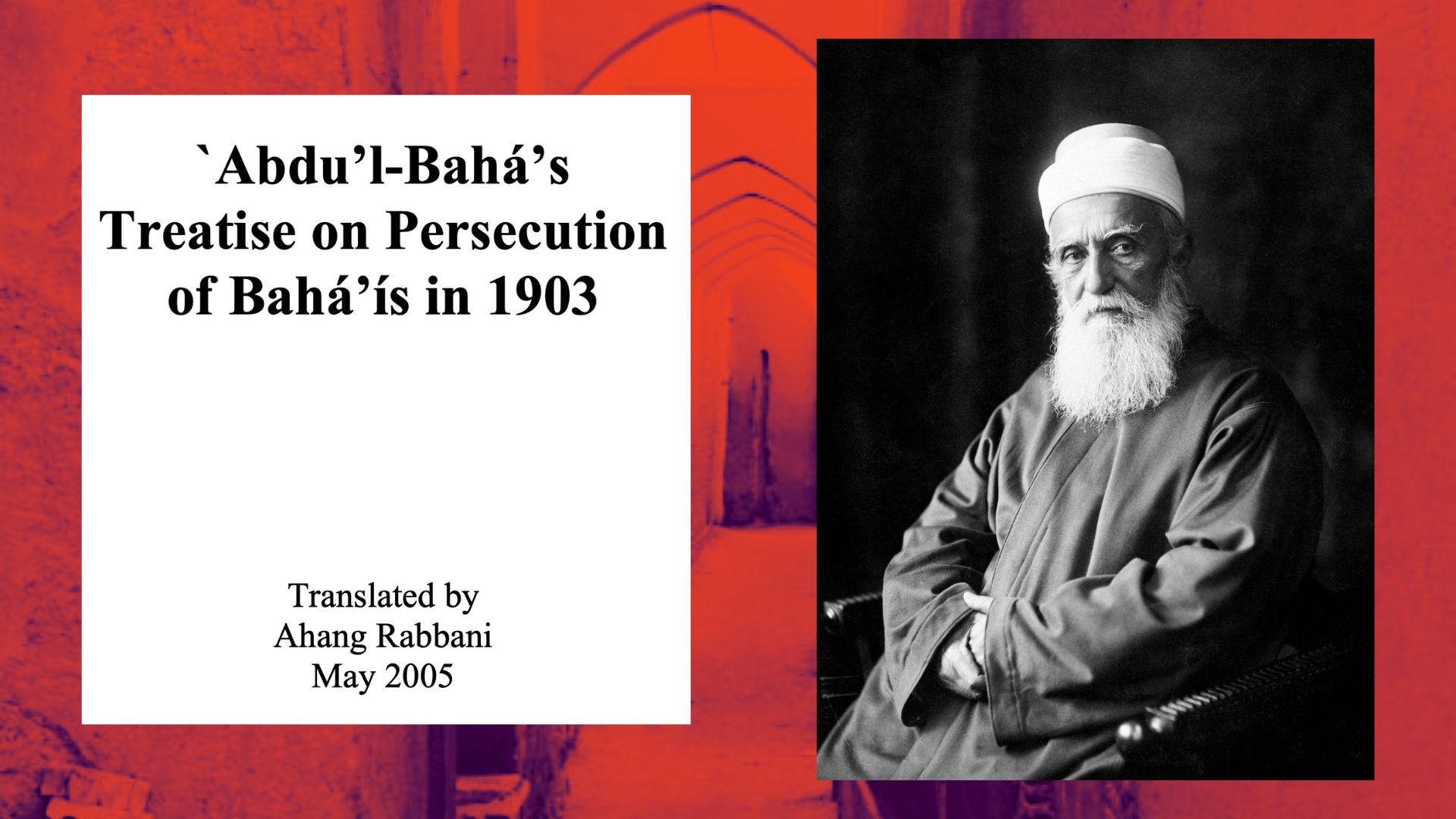
'Abdu'l-Bahá experiences agony at the sufferings of the Bahá'ís in Iran when a vicious outbreak of persecutions spreads across Persia. Bahá'ís are made the scapegoat for political pressures within and without the Persian government and they are butchered in the most barbaric ways in Yazd and surrounding towns and villages. When the attempted genocide reaches its peak in the middle of the summer of 1903, ‘Abdu’l-Baha writes a proclamatory treatise outlining the events that have led to this pogrom.
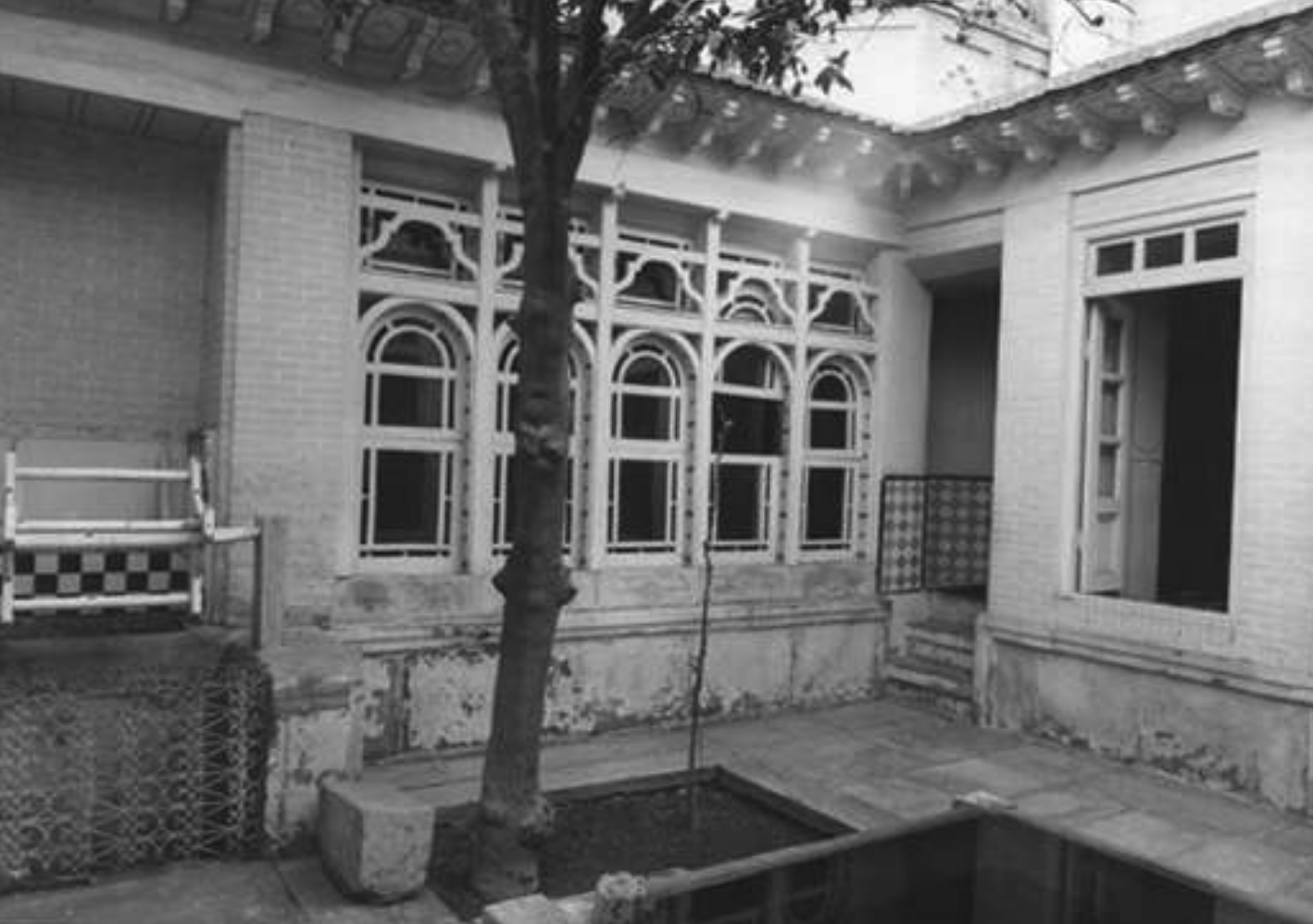
Courtyard of the House of the Báb in Shíráz. Bahaipedia.
'Abdu'l-Bahá instructs 'Áqá Mírzá Áqá, an outstanding member of the family of the Báb, and nephew of Munírih Khánum to immediately begin work on the restoration of the House of the Báb in Shíráz. The original house where the Báb had declared His mission on 23 May 1844 has been altered with the passage of time, and under 'Abdu'l-Bahá's direction, 'Áqá Mírzá Áqá prepares a plan which restores the House, down to its very details, to how it stood in the time of the Báb.
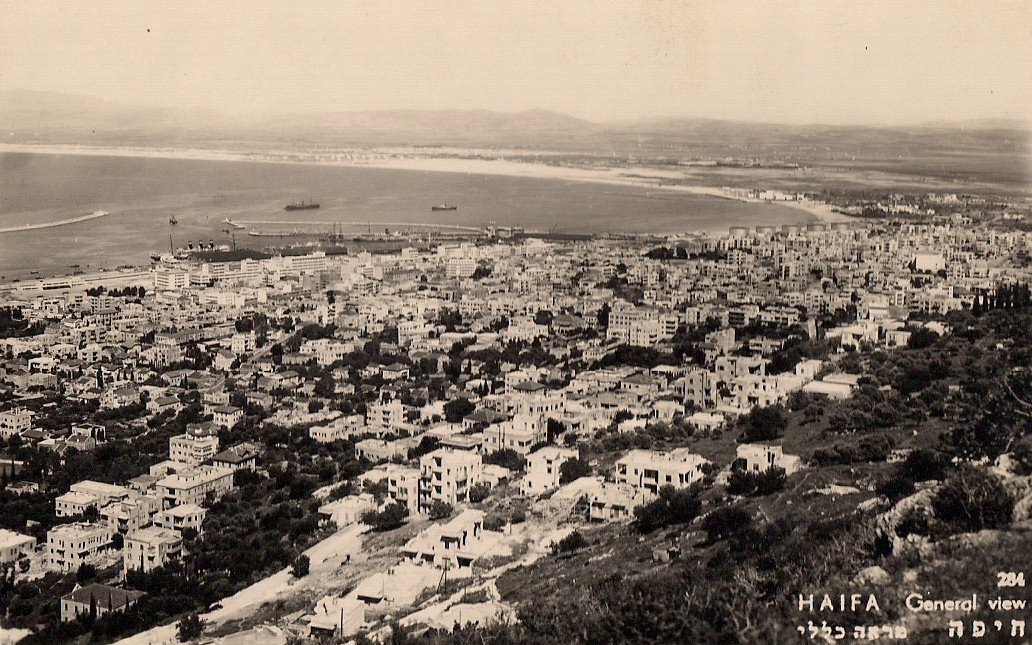
The bay of Haifa with 'Akká in the distance in 1930. Wikimedia Commons.
A new Governor is appointed in 'Akká, hostile to 'Abdu'l-Bahá. The Covenant-breakers circulate a petition in 'Akká and send it to Constantinople, along with preposterous allegations that 'Abdu'l-Bahá has raised an army of 30,000 men and is building a fortress and ammunitions depot on Mount Carmel.
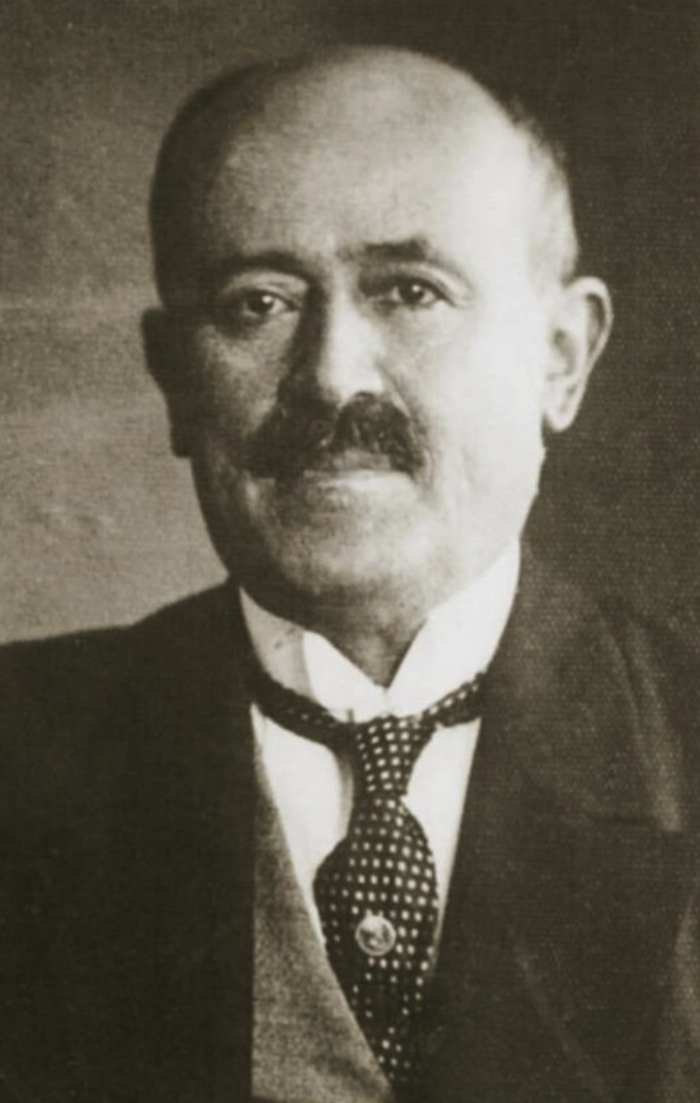
Dr. Yúnis Khán, who lived for nine years with 'Abdu'l-Bahá in 'Akká between 1900-1909 and offered his medical services. Bijan Masumian.
At the end of 1904, 'Abdu'l-Bahá's situation gradually returns to normal, and pilgrimages resume. During this period, 'Abdu'l-Bahá recounts His sufferings at the hands of the Covenant-breakers to Dr. Yúnis Khán and some pilgrims. The stories are so heartbreaking that everyone is very distressed. Dr. Yúnis Khán asks 'Abdu'l-Bahá how long these Covenant-breakers will oppose Him. 'Abdu'l-Bahá responds that in four years time, (the exact date at which He is released for ever from His imprisonment at the hands of the Ottoman regime), they will be powerless to act against Him, and that, in the future, there would be no trace of these Covenant-breakers left in the world.
An official Ottoman report decrees 'Abdu'l-Bahá is to be exiled to Fízán, a dreaded area of southern Libya, controlled by the Ottoman Empire since the 17th century. 'Abdu'l-Bahá, unperturbed, continues His repairs on 'Abdu'lláh Pashá, plants trees and stores fuel for the winter.

Fízán, in the Fezzan desert of Libya is more than 2,000 kilometers away from 'Akká. Original graphic by Violetta Zein. Base map: 1905 Mohammedan Countries map. Wikimedia Commons.
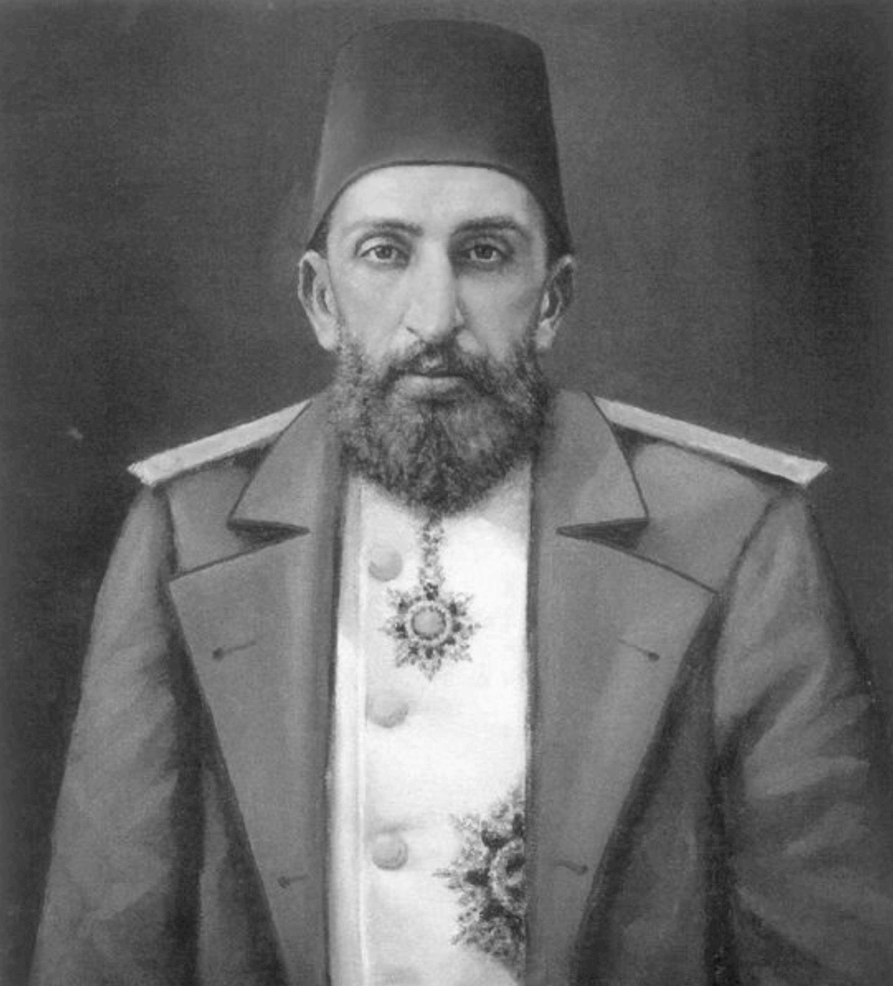
Sulṭán ‘Abdu’l-Hamid II of the Ottoman Empire, an enemy of 'Abdu'l-Bahá who sent two commissions of inquiry to investigate Him in 1904 and 1905. Source: Wikimedia Commons.
Sulṭán ‘Abdu'l-Ḥamíd II starts to be alarmed as a result of both Mírzá Muḥammad-‘Alí’s constant fabrications against ‘Abdu’l-Bahá and documents he sends to Ottoman officials. At one time Mírzá Muḥammad-‘Alí spreads the rumor ‘Abdu’l-Bahá is buying expanses of land destined for the Shrine of the Báb on Mount Carmel to establish His own kingdom. As a result, a Commission of enquiry is sent from Constantinople to 'Akká to investigate.
The Commission is headed by Ârif Bey, so infuriated with ‘Abdu’l-Bahá, he initially wants to hang Him at the gate of ‘Akká, then settles on exiling Him to Fizán or throwing Him into the sea. 'Abdu'l-Bahá halts all pilgrimage and instructs the Bahá'ís in 'Akká to leave the city. 'Abdu'l-Bahá is interrogated by the Commission alone for several consecutive days to answer all their questions, including questions regarding the American pilgrims.
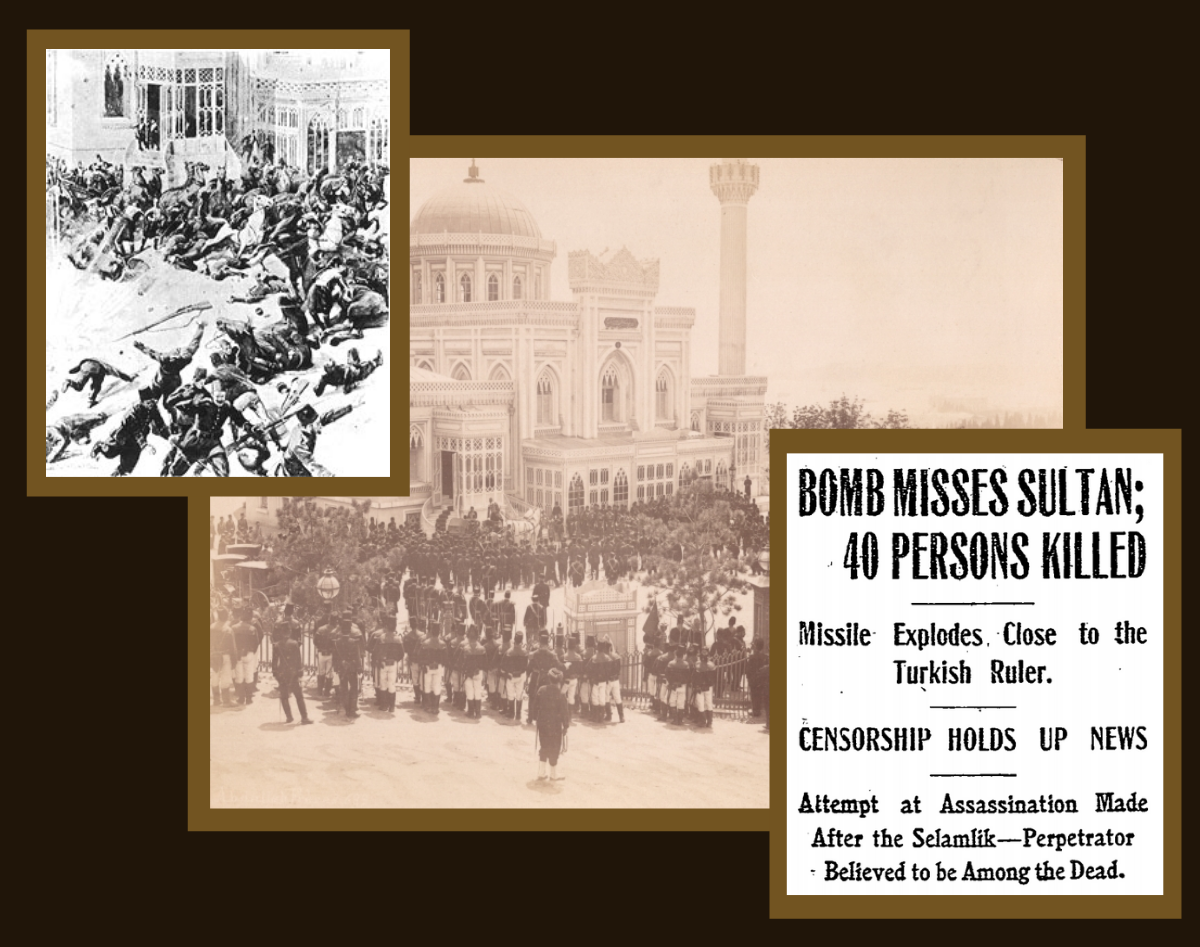
Photo montage illustrating the events around Sulṭán ‘Abdu'l-Ḥamíd II's attempted assassination on July 21, 1905. The large central image depicts the type of event (not the exact event) the Sulṭán was attending, at Yıldız Hamidiye mosque during an Ottoman state ceremony in the late 19th century; The image in the top left is picture dramatizing the Yildiz attempt, not an actual photograph; and the newspaper clipping in the bottom right is the New York Times headline for July 22, 1905. All images from Wikimedia Commons.
On a Friday in July 1905, members of the Commission inspect the Shrine of the Báb’s sepulcher and impressed by its size and solidity, ask one of the attendants how many vaults exist under the massive structure.
Shortly after the inspection, one day at sunset, the boat of the Commission, which had been anchored off the coast of Haifa, weighs anchor and heads towards ‘Akká. The news spreads rapidly and everyone assumes the boat will stop long enough in 'Akká to take ‘Abdu’l‑Bahá on board, then head to Constantinople. The Holy Family is anguished at the news, and the few believers left in 'Akká weep with grief at the idea of the separation from the Master. At this most tragic of all hours, 'Abdu’l‑Bahá paces the courtyard of 'Abdu'lláh Páshá, alone and silent.
Dusk falls and it appears that the Commission's ship's lights have swung around and the boat is changing her course. They are sailing towards Constantinople, not 'Akká. The members of the Commission have been urgently summoned back to Constantinople by cable in order to investigate the conspiracy behind the attempted assassination of Sulṭán ‘Abdu'l-Ḥamíd II on July 21, 1905.
'Abdu’l‑Bahá, still pacing His courtyard as night approaches, is immediately informed. Believers who had posted themselves at various places to watch the progress of the ship also confirm the joyful news. One of the gravest dangers that has ever threatened ‘Abdu’l‑Bahá’s precious life has just been suddenly, providentially and definitely averted.
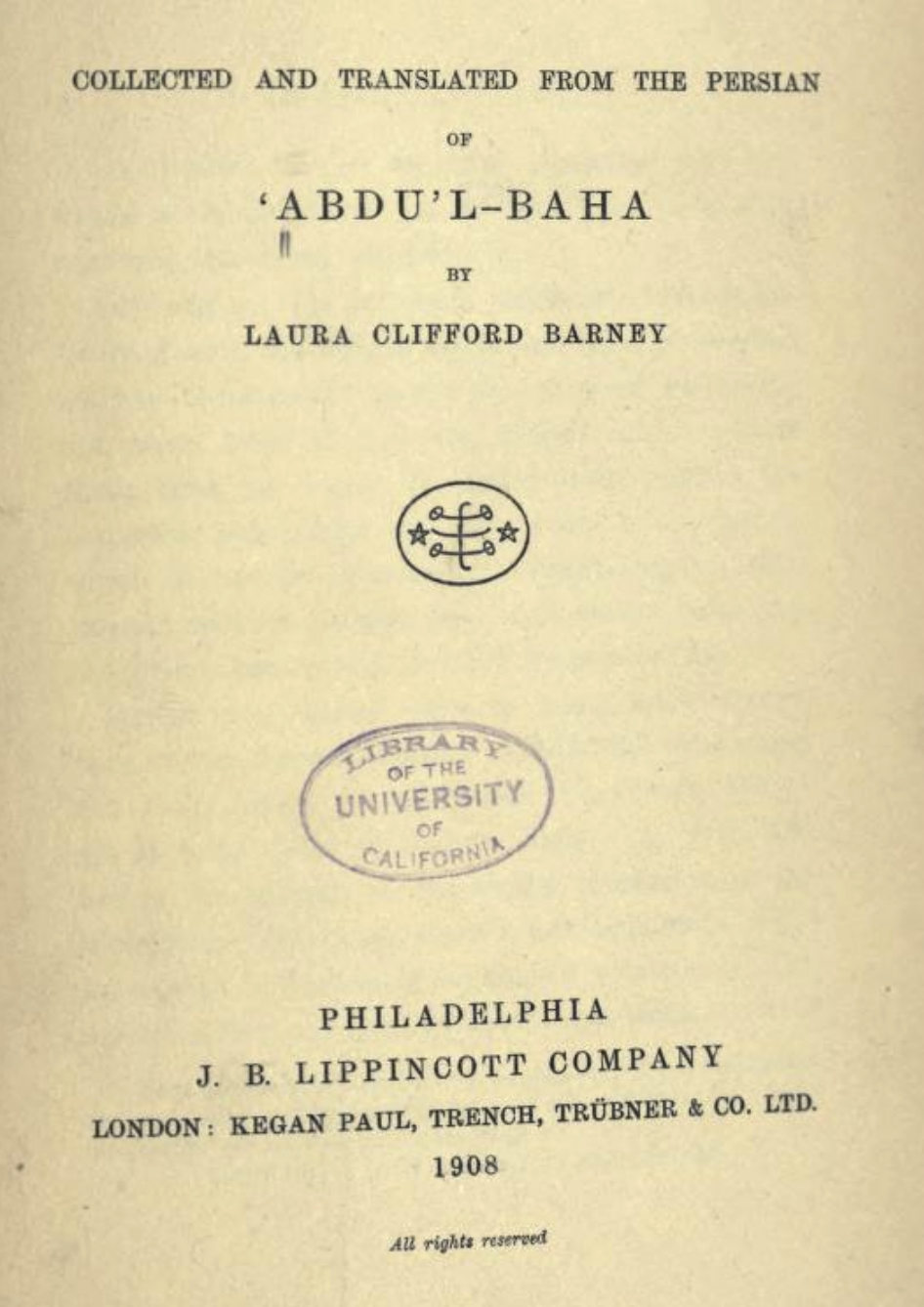
First edition of Some Answered Questions, 1908. Internet Archive.
Between 1904 and 1906 Laura Dreyfus-Barney compiles a collection of transcriptions of table talks given by ‘Abdu’l-Bahá in ‘Akká in response to her questions. ‘Abdu’l-Bahá’s answers her questions during His “tired moments,” most often at mealtimes, over the course of several visits to the Holy Land. In her introduction, Laura Dreyfus-Barney explains that 'Abdu'l-Bahá's answers were written down in Persian for her own personal study but that she believes others will find use in what has been so valuable to her "since all men, notwithstanding their differences, are united in their search for reality." She therefore asks 'Abdu'l-Bahá permission to publish the talks, which He grants in 1906. We know these tablet talks as "Some Answered Questions." The Persian text is a subtitled 'Talks During Luncheon'.
One delightful moment in the writing of "Some Answered Questions" is when 'Abdu'l-Bahá is answering Laura Dreyfus-Barney's questions on the subject of Evil. The Master turns to Dr. Youness Khan and tells him "Next she will ask, how is it then that God has created the scorpion," which she does.
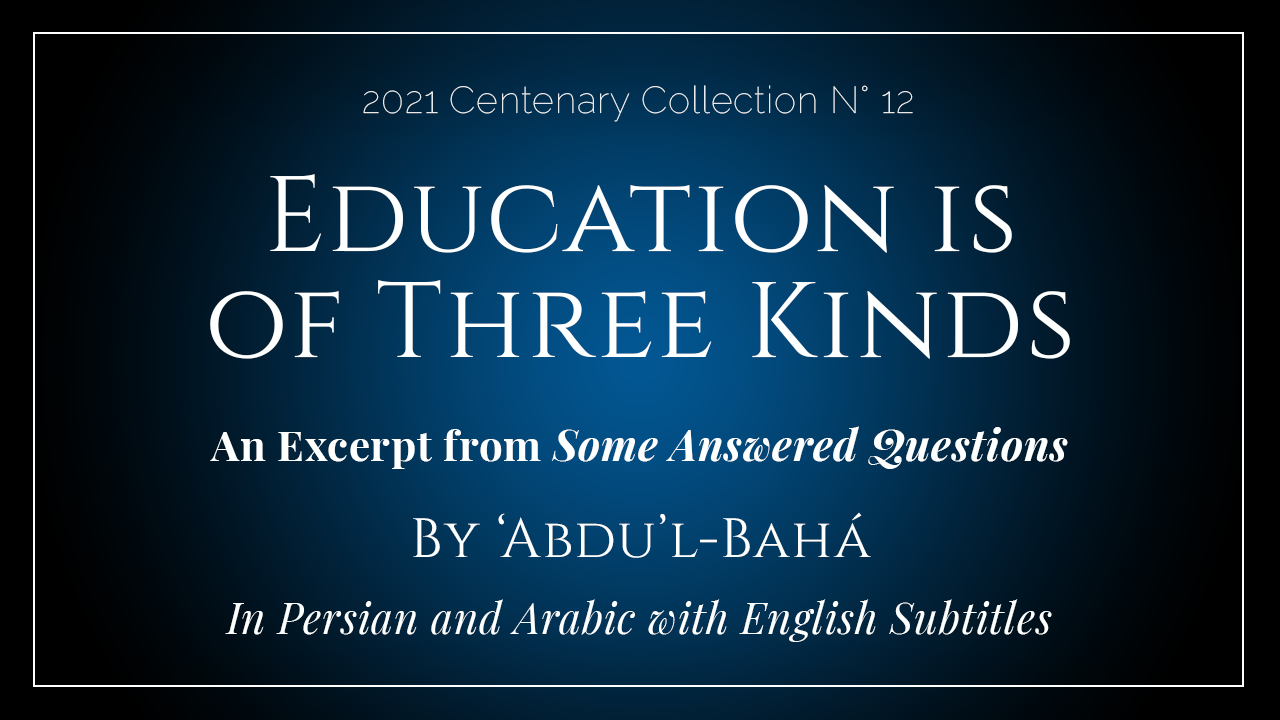
Listen to a short excerpt on the three kinds of education, from "Some Answered Questions" recited in Persian and Arabic with English subtitles and transliteration
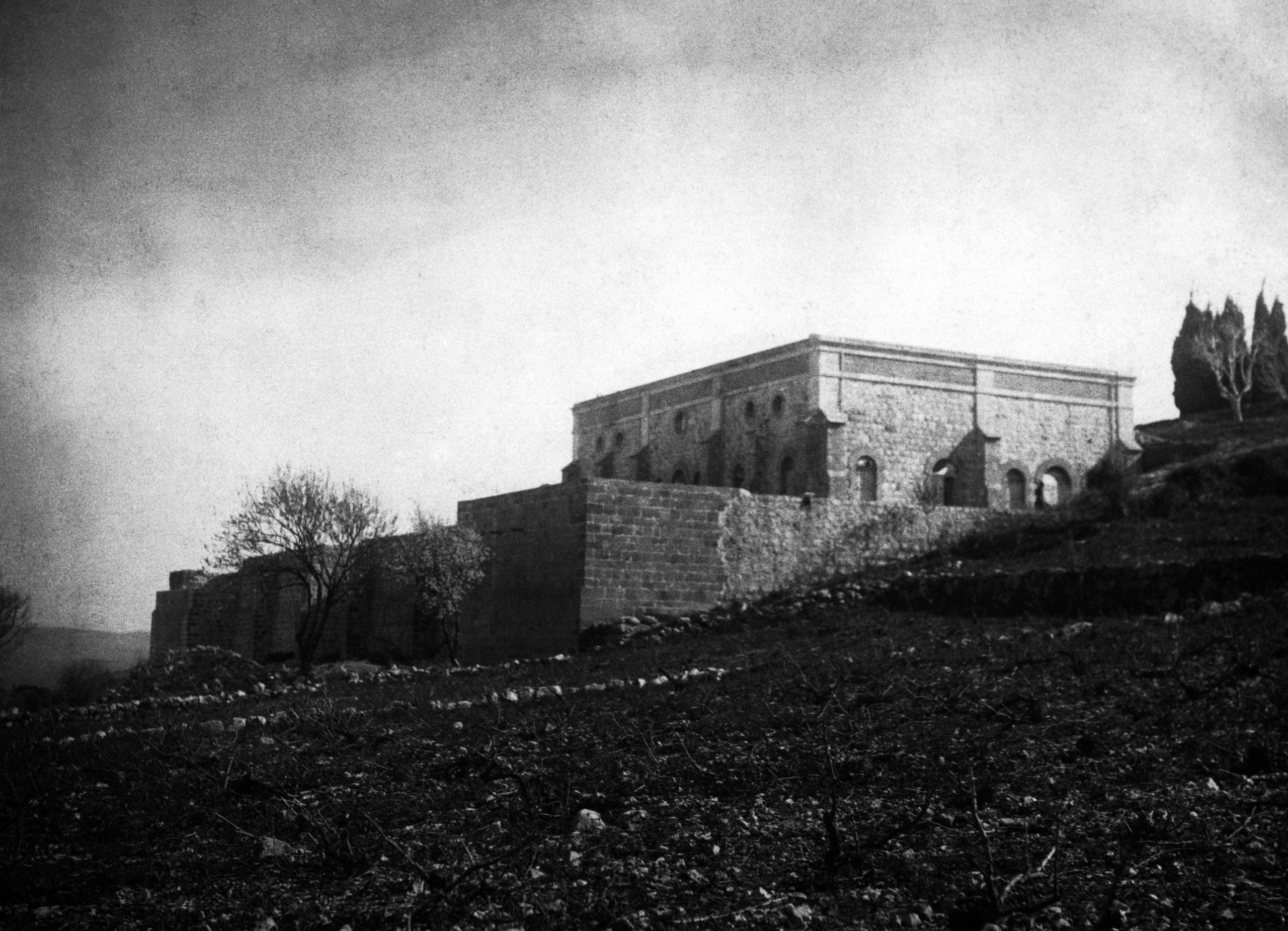
Shrine of the Báb, completed by 'Abdu'l-Bahá in the early 1900s. Bahá'í Media Bank.
The six rooms that form the basis of the Shrine of the Báb are completed. 'Abdu'l-Bahá will often remark:
Every stone of that building, every stone of the road leading to it, I have with infinite tears and at tremendous cost, raised and placed in position.
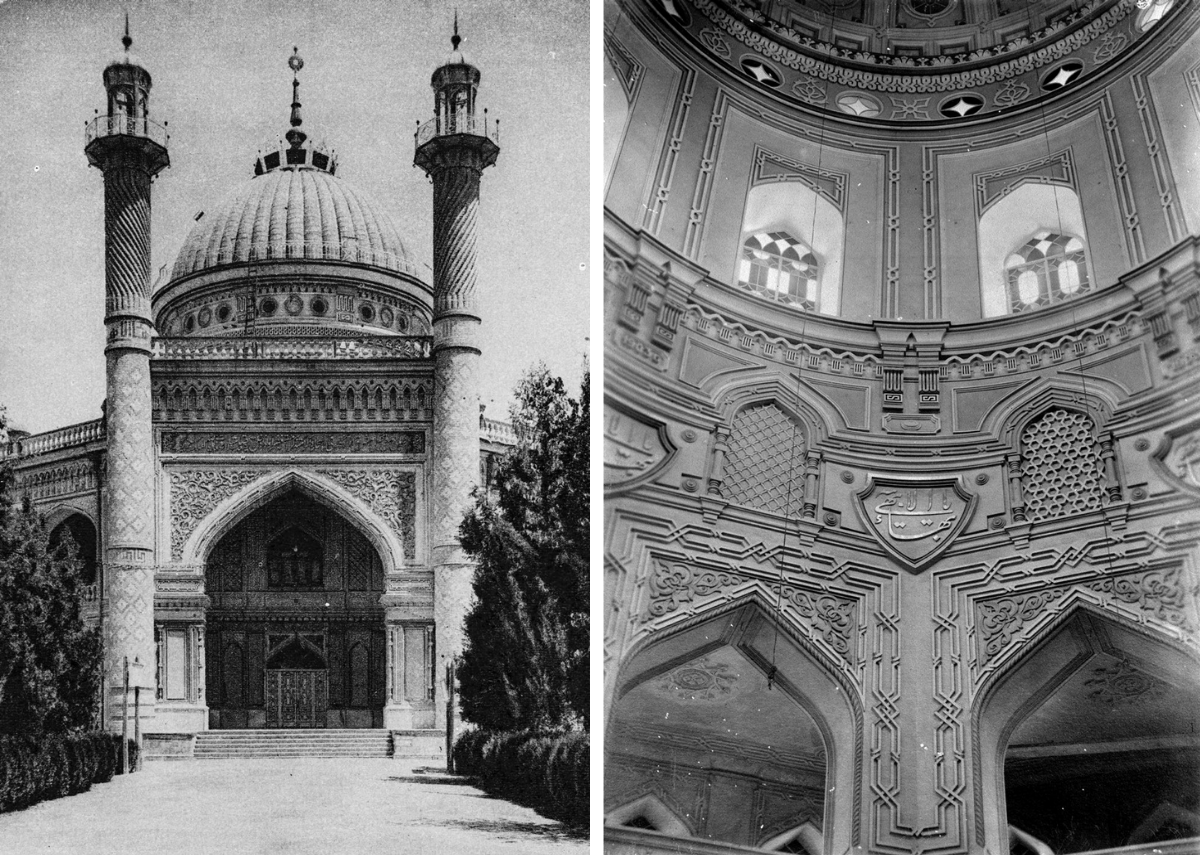
Exterior and interior of the House of Worship in 'Ishqábád in the 1900s. A Báhá'i Glossary.
By 1907 the structure of the building is substantially complete and the Mashriqu'l-‘Adhkár stands as the most imposing building in the middle of ‘Ishqábád, larger than any church or mosque in the city, bordered by four streets and surrounded by a large garden. Its dome is visible for miles. This same year a girl's school is founded on the grounds. The building, however is not yet complete, and its story will continue in Part VI. Undaunted by these terrible times in 'Akká, 'Abdu'l-Bahá presses on with the second of the three aims of His Ministry.
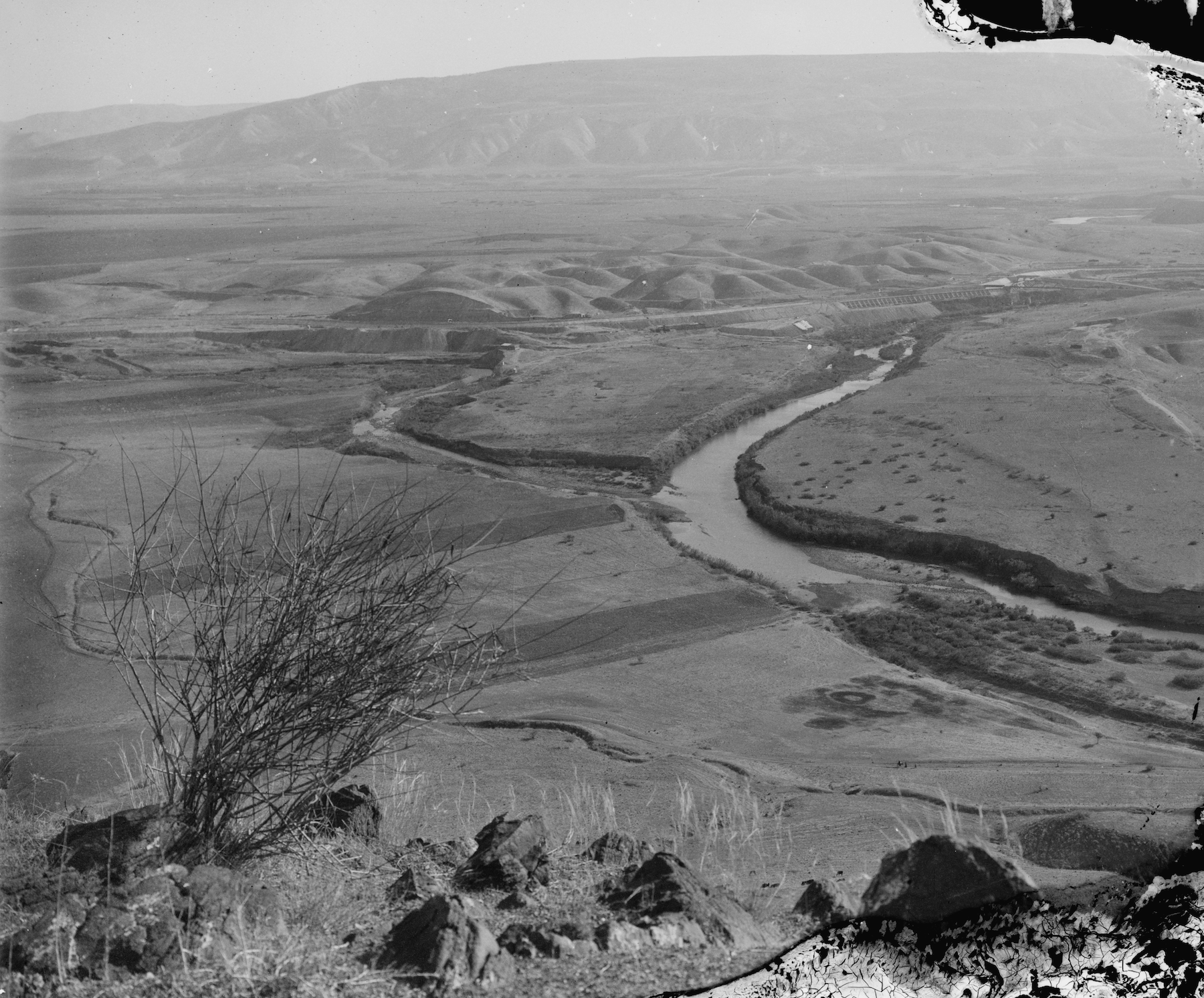
The Yarmuk and Jordan rivers canal near the south end of the Sea of Galilee, which is the general area where the village of 'Adasíyyih is located. Library of Congress.
In 1907, ‘Abdu’l-Bahá writes to the Spiritual Assembly of Ṭihrán and asks them to send a number of farmers to the Holy Land. Bahá’ís of Yazd, mainly of Zoroastrian background, are selected as most suitable for this request, as they are predominantly farmers. ʻAdasíyyih is a village situated at the confluence of the Jordan and Yarmuk rivers and has a long history of settlements and farming stretching over two thousand years.
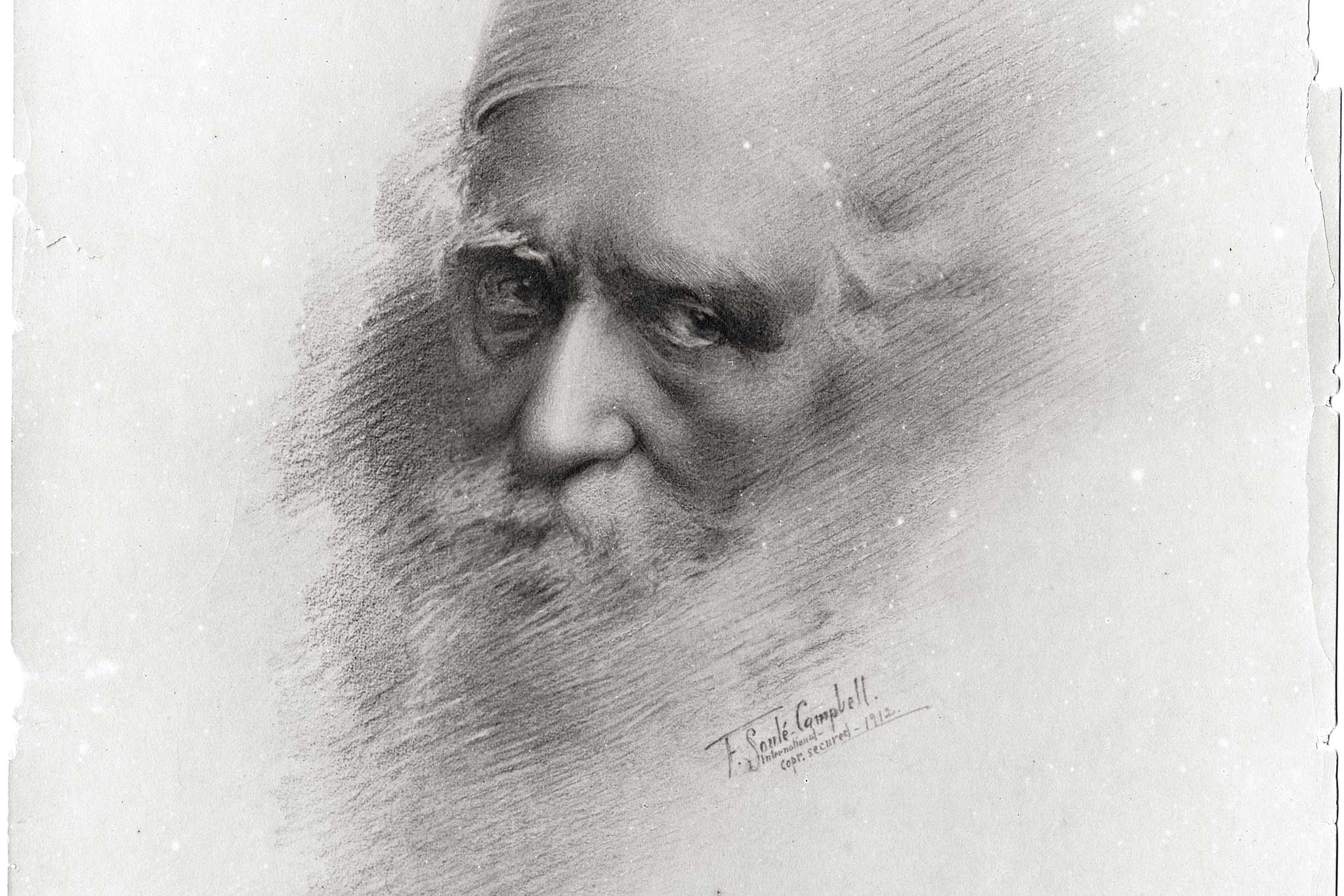
Portrait of 'Abdu'l-Bahá by F. Soulé-Campbell. The origin and attribution for this portrait is unknown. It is not held by the United States National Bahá'í Archives.
‘Abdu’l-Bahá’s increasing contact with Western pilgrims and their devotion to Him starts to cause confusion in the minds of some believers. The paradox of the “Mystery of God” becomes a problematic reality, as they are unable to reconcile that such a saintly character, “the stainless Mirror” of Bahá’u’lláh’s light, can be a mere human being. The New York Bahá’ís—in particular Howard McNutt and Arthur P. Dodge, both Disciples of ‘Abdu’l-Bahá—have grave disputes over the station of ‘Abdu’l-Bahá, some asserting He is the return of Jesus Christ, but others not fully understanding that His station is not attainable by mere humans, no matter the perfections any of us may acquire. ‘Abdu’l-Bahá, as early as 1900, consistently strives to educate the friends and correct their misunderstanding as to His rank. On January 1, 1907, ‘Abdu’l-Bahá clarifies His station in the eloquent “Tablet of ʻAbdu’l-Bahá” addressed to the New York City Board of Counsel where He dispels the notion that He Himself occupies the same station as the Báb and Bahá’u’lláh:
You have written that there is a difference among the believers concerning the ‘Second Coming of Christ.’ Gracious God! Time and again this question hath arisen, and its answer hath emanated in a clear and irrefutable statement from the pen of ‘Abdu’l‑Bahá, that what is meant in the prophecies by the ‘Lord of Hosts’ and the ‘Promised Christ’ is the Blessed Perfection (Bahá’u’lláh) and His holiness the Exalted One (the Báb). My name is ‘Abdu’l‑Bahá. My qualification is ‘Abdu’l‑Bahá. My reality is ‘Abdu’l‑Bahá. My praise is ‘Abdu’l‑Bahá. Thraldom to the Blessed Perfection is my glorious and refulgent diadem, and servitude to all the human race my perpetual religion… No name, no title, no mention, no commendation have I, nor will ever have, except ‘Abdu’l‑Bahá. This is my longing. This is my greatest yearning. This is my eternal life. This is my everlasting glory.
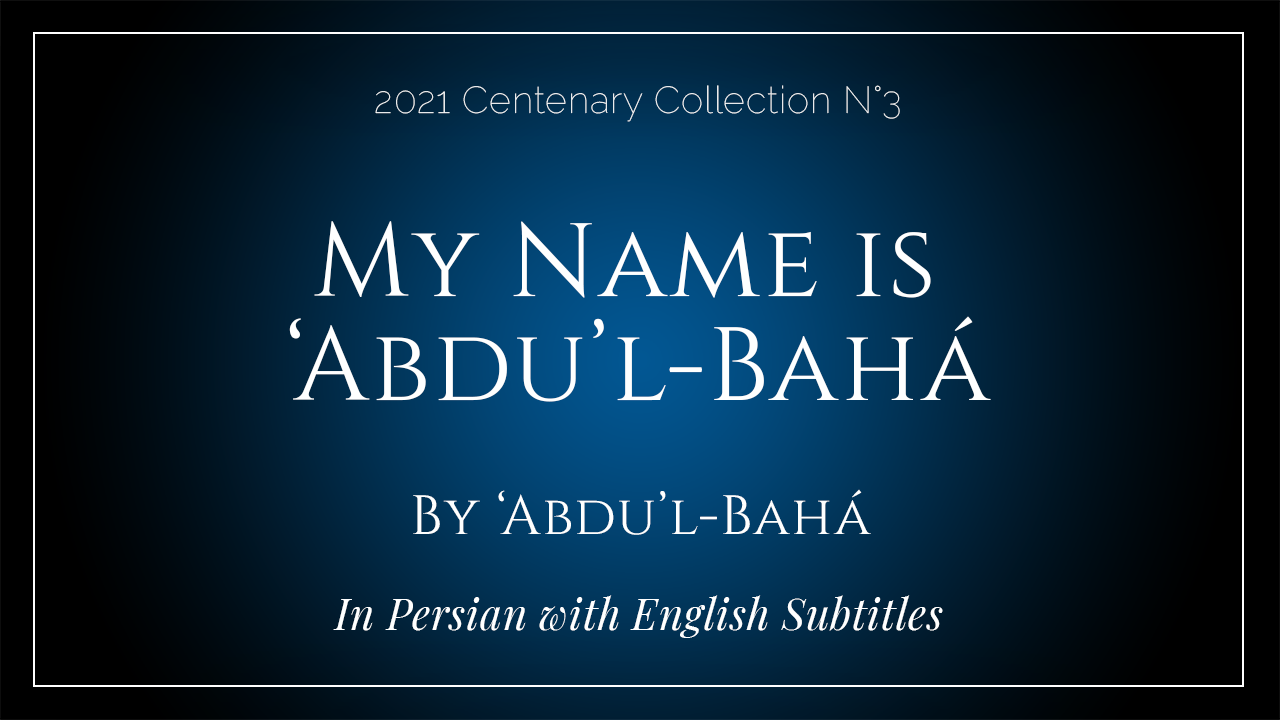
Click on the image agove to listen to "My Name is 'Abdu'l-Bahá" recited in Persian with English subtitles and transliteration.
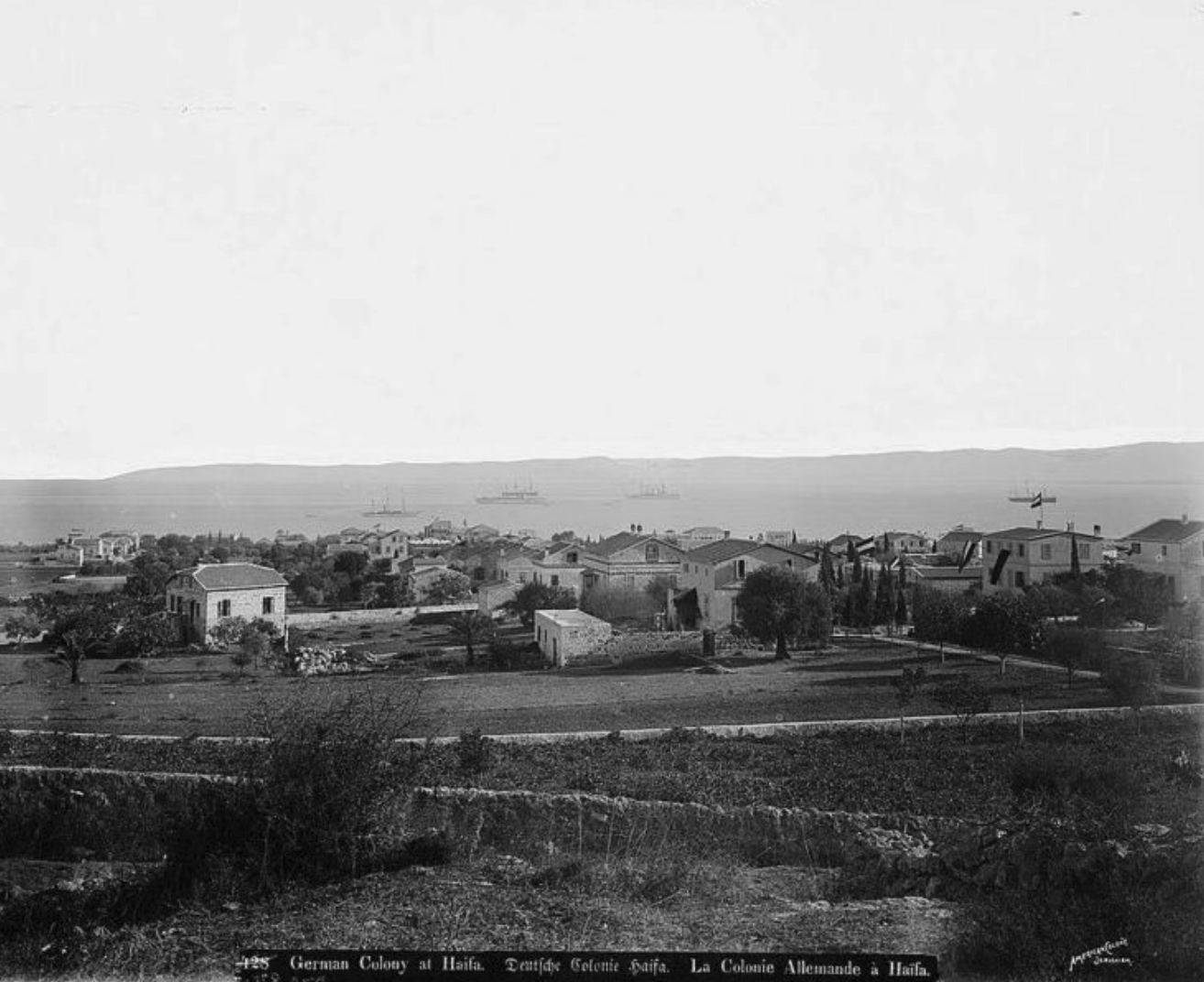
The German Templar Colony in Haifa, undated. Wikimedia Commons.
Members of 'Abdu'l-Bahá's family start to live at 7, Persian Street (later Haparsim) in Haifa, which 'Abdu'l-Bahá designed and has been building for a few years with the financial help of Laura Clifford Barney, who also assisted with the purchase of the land. The House is located on the eastern edge of the German Templar Colony.
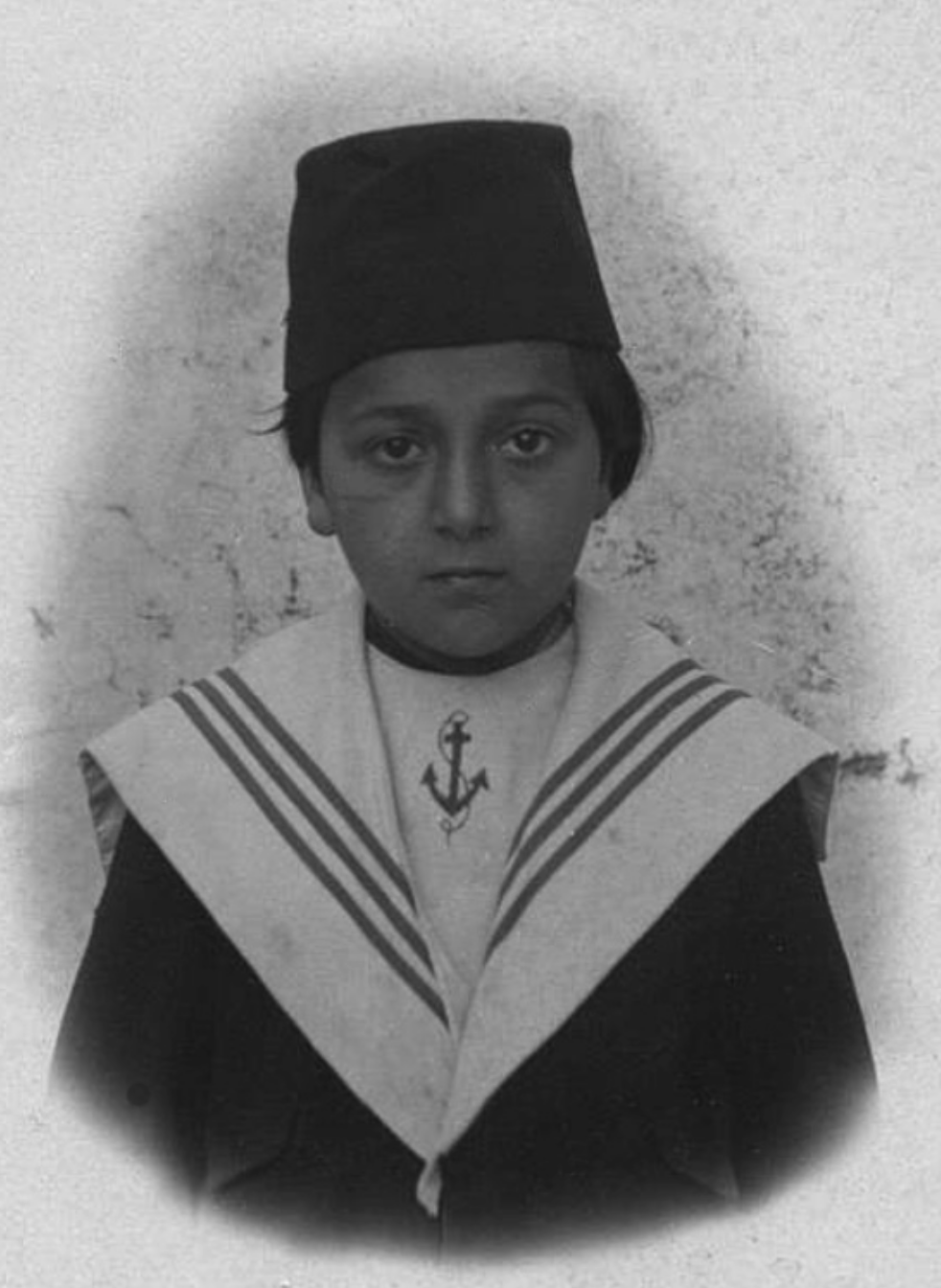
Shoghi Effendi as a young child. Baha'i Media.
Another edict by Sulṭán ‘Abdu'l-Ḥamíd II is sent to the authorities in Haifa to control ‘Abdu’l- Bahá, who is labelled an 'agitator' of a ‘subversive group,’ but the Young Turk Revolution breaks out in July 1908 and compels the despot to reinstate the 1876 Constitution and free all religious and political prisoners held under his regime.
Marion Jack arrives in January 1908 and teaches English to the Holy Family, including Shoghi Effendi, then a child of 11 years old. It is during this time that 'Abdu'l-Bahá calls her "General Jack."
'Abdu'l-Bahá is under constant surveillance because of the incessant rumor-mongering of the jealous Covenant-breakers, and He once again suspends visits by Western pilgrims. The situation becomes so dire that 'Abdu'l-Bahá sends His favored grandson Shoghi Effendi to live in Haifa.
He further instructs Shoghi Effendi not to drink coffee in other people's homes because it might contain poison.
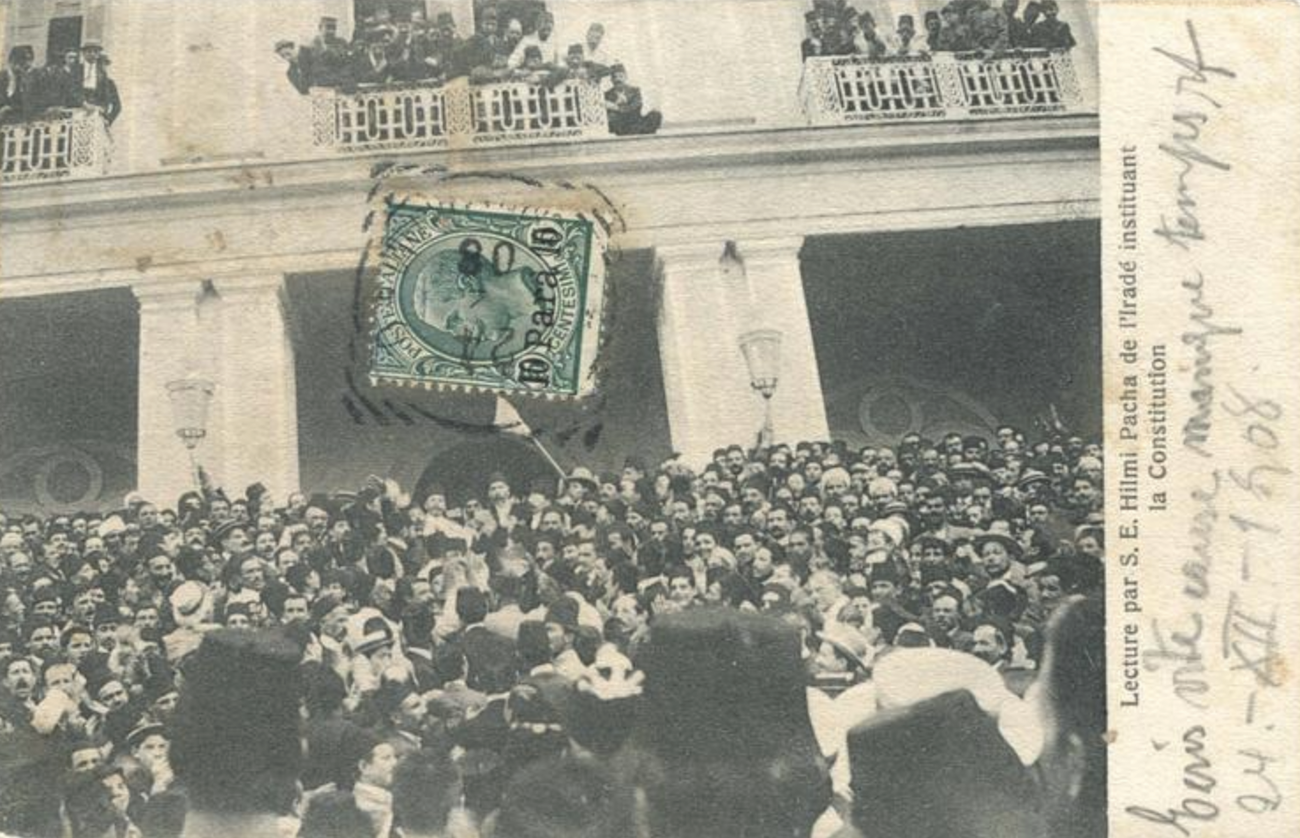
Sulṭán ‘Abdu'l-Ḥamíd II's announcement of a constitutional government in 1908. Wikimedia Commons.
The Young Turk Revolution forces Sulṭán ‘Abdu'l-Ḥamíd II to establish a constitutional government and release all political prisoners. In August 1908, ‘Abdu’l-Bahá is released from imprisonment under the amnesty. After 55 years of imprisonment and exile, ‘Abdu’l-Bahá is a free man, at the age of 64, for the first time since He was a child. The first thing ‘Abdu’l-Bahá does with His newly-gained freedom is to visit the Shrine of Bahá'u’lláh in Bahjí. During the years of his renewed imprisonment, the hardest sacrifice for 'Abdu'l-Bahá had been to not visit the Shrine of Bahá'u'lláh. He would often say to pilgrims that He desired nothing more than the freedom to visit the Shrine and would ask them to visit on His behalf. As soon as He is free, 'Abdu'l-Bahá resumes His joyful task of beautifying the area around the Shrine, week after week, fetching as many as sixty jars of water on Fridays and Sundays, even when officials would visit Him.
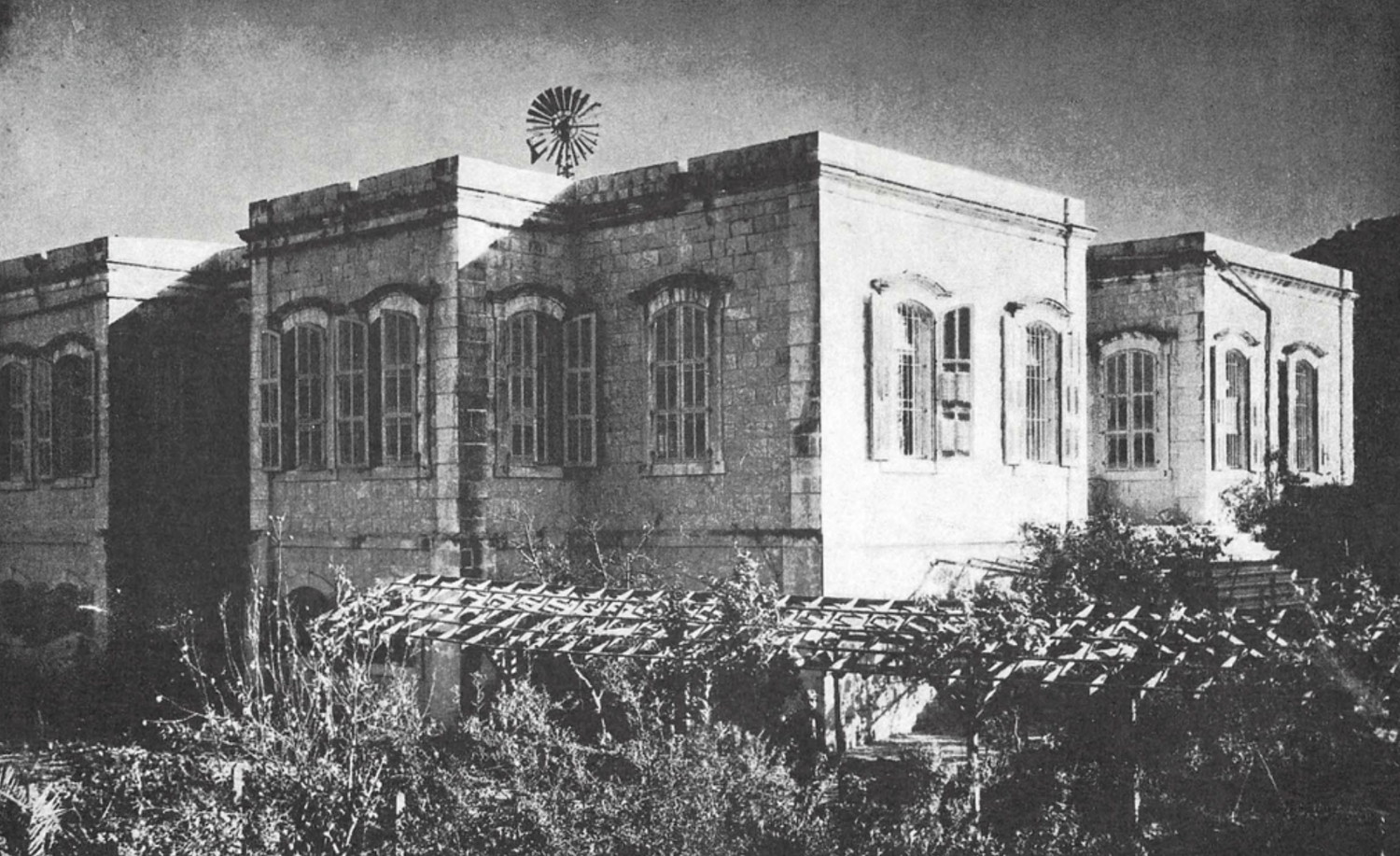
The House of the Master as it was during His lifetime. The Bahá'í World, volume 13 (April 1954-1963) page 69.
'Abdu'l-Bahá completes the construction of His new home in Haifa which is located on a street that will be called "Haparsim," meaning "Persians" in Hebrew, in later years.
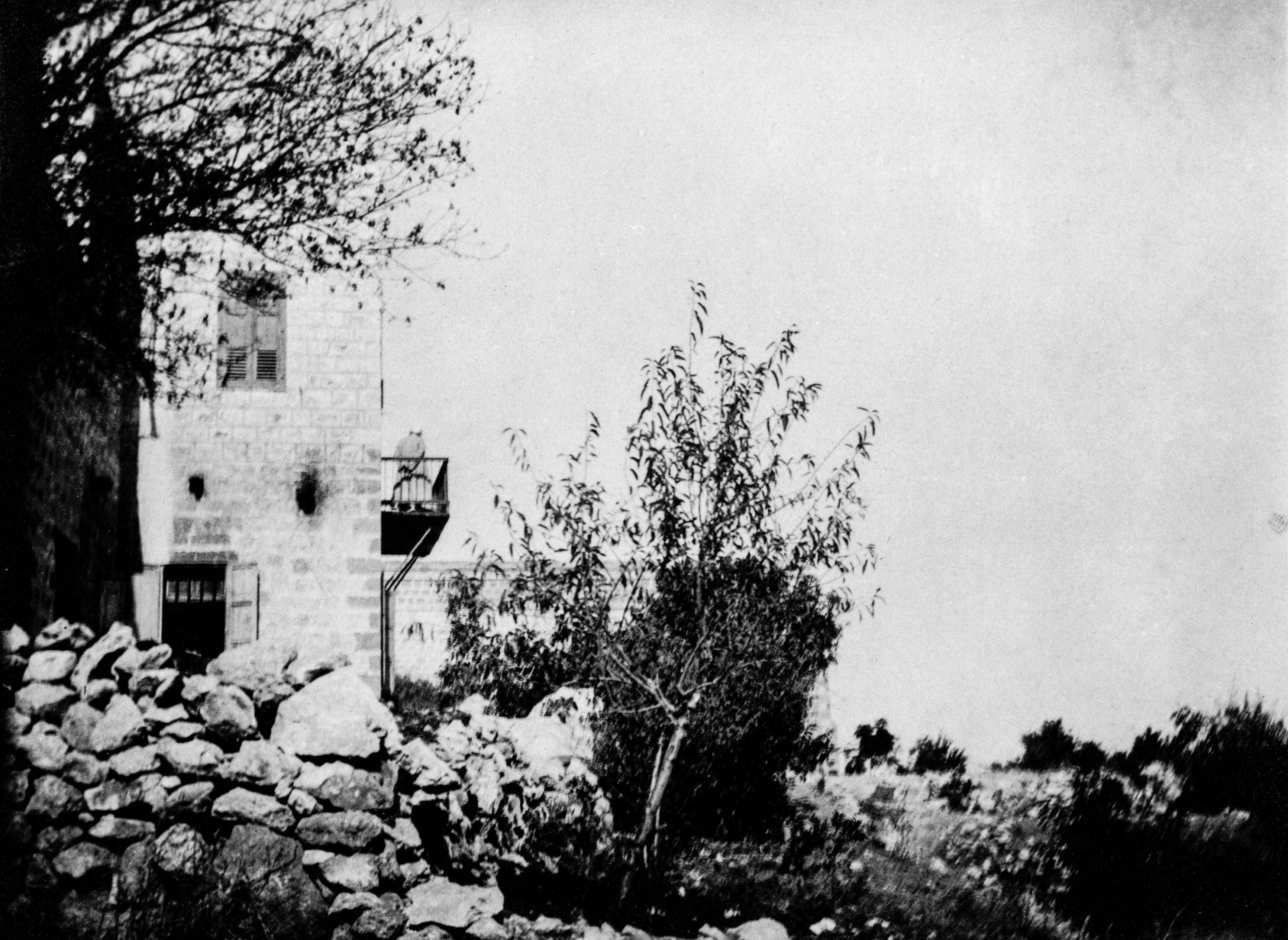
‘Abdu’l-Bahá standing on the balcony of the house of ‘Abbás-Qulí of Qom, c. 1920.Bahá'í Media Bank.
After His release, ‘Abdu’l-Bahá enjoys spending time at the home of ‘Abbás-Qulí of Qom, very close to the Shrine of the Báb. A small white room is built on the roof for Him and ‘Abdu’l-Bahá also enjoys gazing at the Shrine from the balcony of the house.
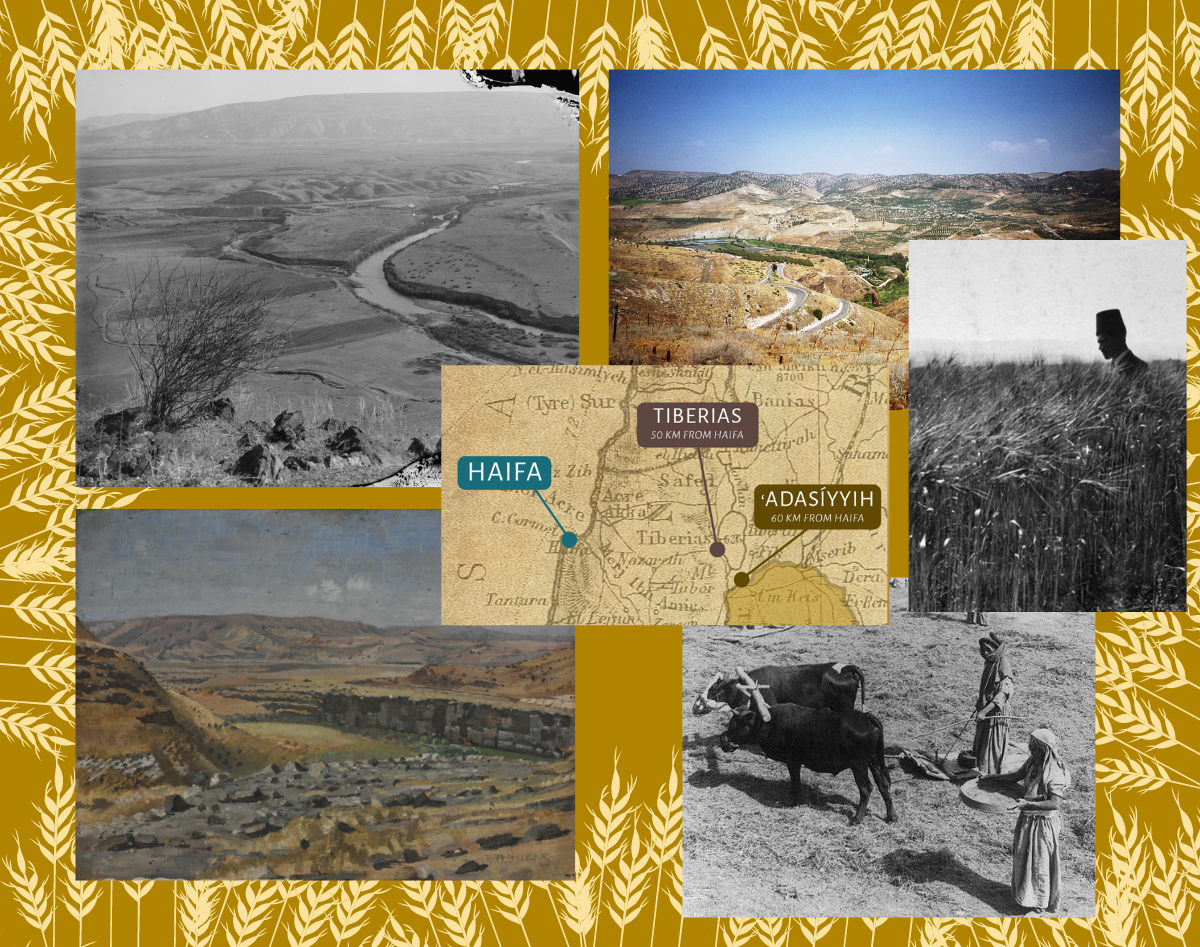
Photomontage of all photos illustrating Adasiyyíh in Part IV and Part VIII. Please see each part for photo and graphic captions.
These Bahá’í farmers arrive in groups between 1908 and 1916 and start to settle in 'Adasíyyih, about 60 kilometers away from Haifa near the Jordan river and the southern edge of the Sea of Galilee. When they have a difficult time adapting to the unbearable climate, rampant malaria and attacks of the highwaymen. ‘Abdu’l-Bahá once tells them: “I have brought you to the most inhospitable place on earth.”
To comfort the Bahá’ís and their families suffering from the unbearable climate, rampant malaria, mosquito infestation and attacks of the highwaymen, ‘Abdu’l-Bahá reveals a special prayer for them, who have traversed mountains, deserts, plains and prairies, to ask for God's favor and guidance. But ‘Abdu’l-Bahá also gives them concrete advice which solves their malaria and mosquito problem: He instructs the farmers to plant a type of eucalyptus that produces the drug quinine in its bark (Cinchona Quinquina). Each farmer plants these trees, which can still be seen standing today.
‘Abdu’l-Bahá tells the farmers that by working this land they are contributing to the Shrines of the Báb and Bahá’u’lláh. He takes a great interest in the agricultural development of the community and visits the village as often as He is able to. ‘Abdu’l-Bahá stays with families in the village, gives to the poor and needy, advises on the social development of the community and how to establish bonds of friendship with their Arab Christian and Muslim neighbors.
‘Abdu'l-Bahá envisions an orphanage in ʻAdasíyyih and advises the Bahá’ís to engage in crafts and small rural industries. During His visits to ʻAdasíyyih, ‘Abdu’l-Bahá always a fine horseman, rides on a horse and trots through the alleys and lanes of the village, towards the dam, after the village of Baqura, on the river.
The rest of the very exciting story of 'Adasíyyih will continue in Part VIII, when 'Abdu'l-Bahá averts a famine with wheat and corn from the Jordan Valley during World War I.
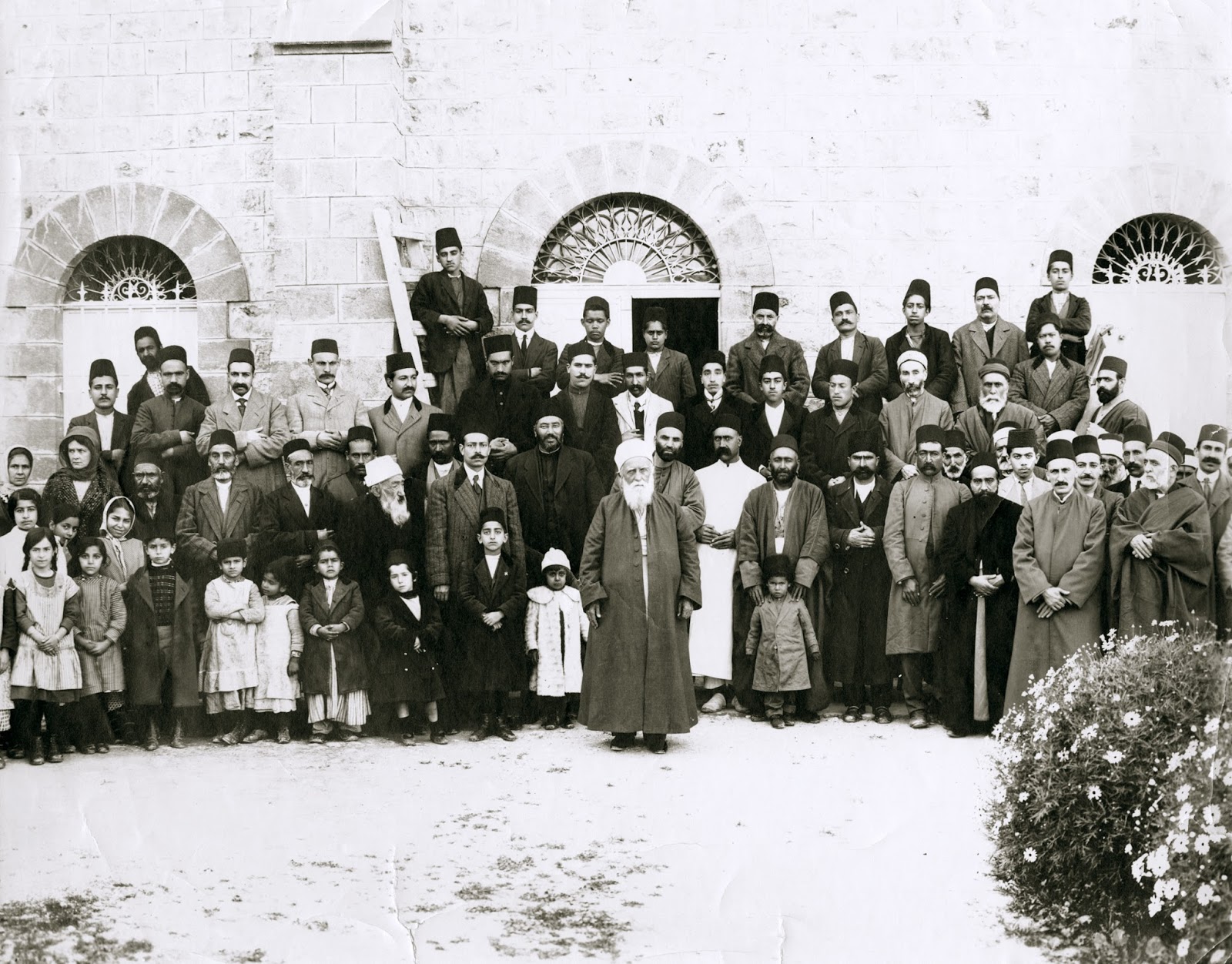
'Abdu'l-Bahá and friends in front of the Shrine of the Báb. Shoghi Effendi is behind 'Abdu'l-Bahá to His right, in a dark suit and a dark fez (very much his clothing style when he is an adult), with arms crossed in front of him. 'Abdu'l-Baha in the Holy Land.
Before He is to leave 'Akká for Haifa, 'Abdu'l-Bahá gives instructions for the removal of the heavy marble sarcophagus to the Shrine of the Báb on Mount Carmel.
By the light of a single lamp, 'Abdu'l-Bahá removes His turban. His shoes and his dark outer cloak. Bareheaded and barefoot, in simple white garments, Abdu’l-Bahá descends into the vault, and places the wooden casket containing the sacred remains of the Báb and His companion into the marble sarcophagus, then bends low over the casket and weeps with such a weeping that everyone present cries with Him. The ebony lid of the coffin is secured, and the marble lid of the sarcophagus closes forever. 'Abdu'l-Bahá chants the prayer for the dead. Overcome with emotion, 'Abdu'l-Bahá cannot sleep that night.
Soon after, ‘Abdu’l-Bahá writes the Bahá’ís of the world:
The most joyful tidings is this, that the holy, the luminous body of the Báb ... after having for sixty years been transferred from place to place, by reason of the ascendancy of the enemy, and from fear of the malevolent, and having known neither rest nor tranquillity has, through the mercy of the Abhá Beauty, been ceremoniously deposited, on the day of Naw-Rúz, within the sacred casket, in the exalted Shrine on Mt. Carmel...
With the interment of the remains of the Báb to their permanent resting-place on Mount Carmel, 'Abdu'l-Bahá achieves one of the three principal objectives of His Ministry. Shoghi Effendi states that this act ‘deserves to rank as one of the outstanding events in the first Bahá’í century’, The interment of the remains of the Báb is spiritually significant. The Báb, whose advent marks the return of the Prophet Elijah is now interred on Mount Carmel, a holy mountain, in close proximity to Elijah's Cave. Bahá'í pilgrims around the world now have two Shrines to prostrate to for both Manifestations of the Bahá'í Dispensation: Bahá'u'lláh's Shrine in Bahjí and the Báb's Shrine in Haifa.
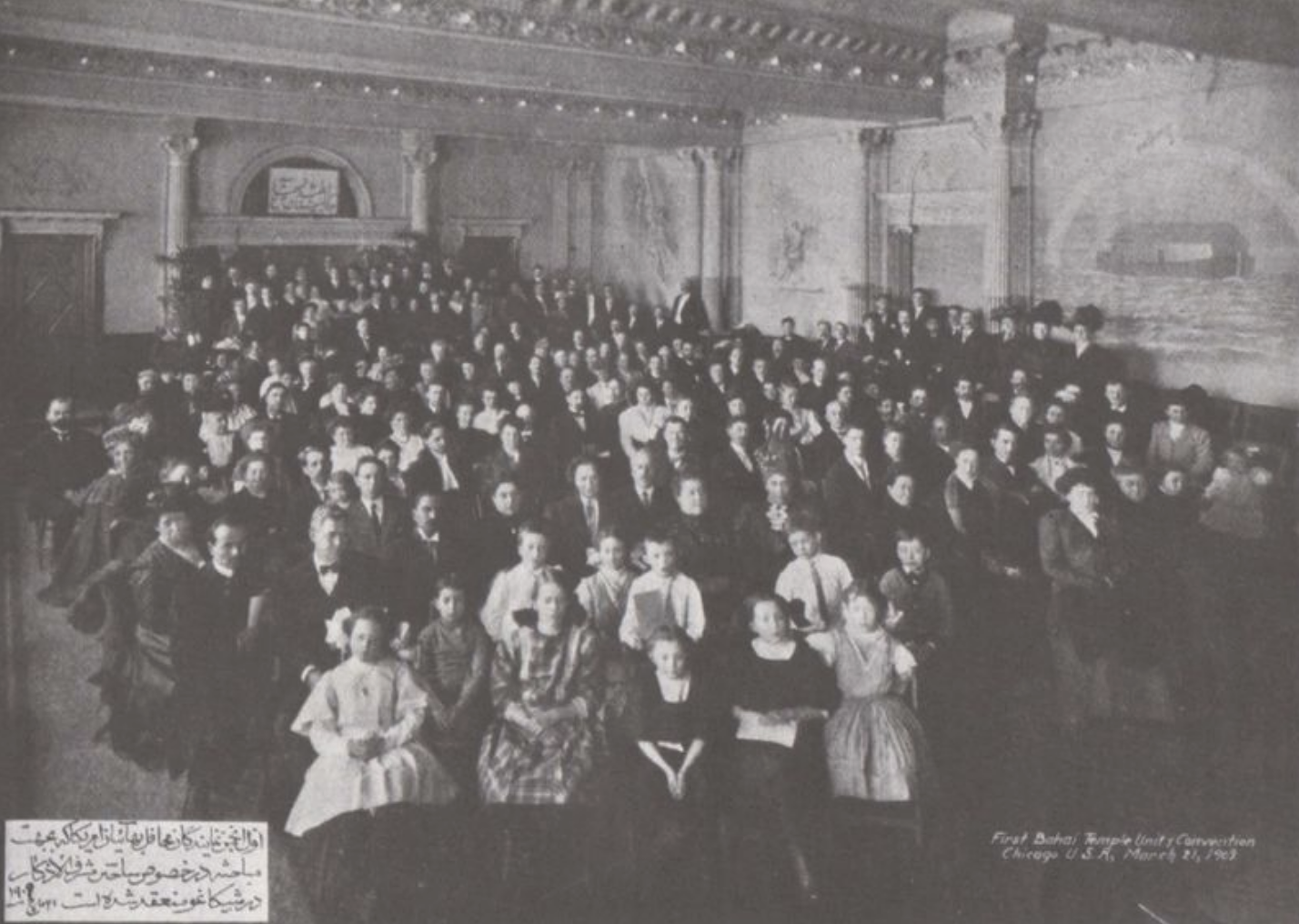
The Temple Unity Conference in Chicago on March 21, 1909, on the same day as the interment of the remains of the Báb. This is the United States' very first National Convention. Bahaipedia.
March 21, 1909, 17 years after the passing of Bahá'u'lláh, and 17 years into 'Abdu'l-Bahá's Ministry, He accomplishes two of the three goals He has set for Himself: the building of the Shrine of the Báb and the establishment of the Bahá'í Faith in the West. On this very same day of March 21, 1909, 39 delegates from 36 cities in the United States assemble in Chicago for what is the first National Convention of the United States. They incorporate a permanent national organization known as the Bahá’í Temple Unity, bound by the laws of the State of Illinois, and empowered to hold the title to the House of Worship property and provide means for its building.
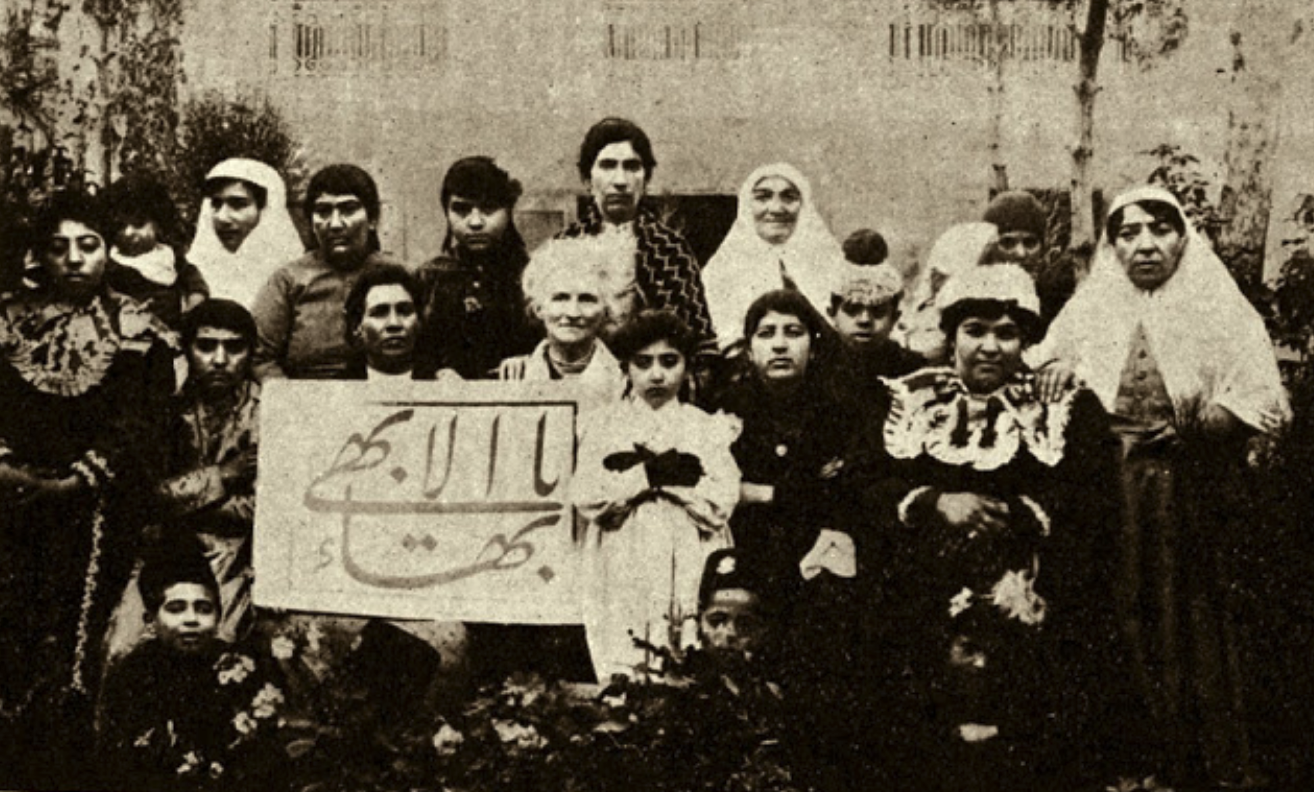
Dr. Moody with Baha’i women in Tehran, 1910. These women were some of the first to appear in public without veils. (Photo courtesy of the Baha’is of the U.S.). Bahá'í Blog.
Around 1908, a group of American Bahá’ís return to ‘Akká from Persia and tell 'Abdu'l-Bahá that there is a great need for a woman doctor there, as Persian women will not unveil themselves in front of male doctors and are therefore deprived of good medical care. When 'Abdu'l-Bahá enquires about a female Bahá’í doctor, Dr. Susan Moody’s name comes up. At the age of 52, in 1903, Susan Moody had suddenly returned to medical school and earned her degree. When 'Abdu'l-Bahá sends her a message telling her she has been chosen for this mission, Dr. Moody will say later that she understood why she had felt such a strong urge to study medicine.
Dr. Susan Moody leaves immediately for Persia upon receiving 'Abdu'l-Bahá’s message, but stops in the Holy Land to see ‘Abdu’l-Bahá between 8 and 12 October 1908. On October 12, Susan receives instructions from 'Abdu'l-Bahá to leave the next day for Constantinople, before the weather becomes too cold and the journey too difficult. ‘Abdu’l-Bahá sends for Susan and seats her next to Him, telling her:
You are to go to Persia. At first you will find things difficult, – the conveniences are not the same. Many of the people are poor and sleep on the floor, as they have no beds. You must not look at their circumstances, but at their hearts. They will love you very much and I want you to be happy there. You must have much patience and try very hard to be faithful; lose sight of yourself entirely; work only for the love of God and you will succeed. You will find much love there – all will love you.
Dr. Susan Moody will minister to the medical needs of Persian women for 15 years, then will return to her post until her death at the age of 77, opening a hospital, and helping start a girl’s school during her time in Persia.
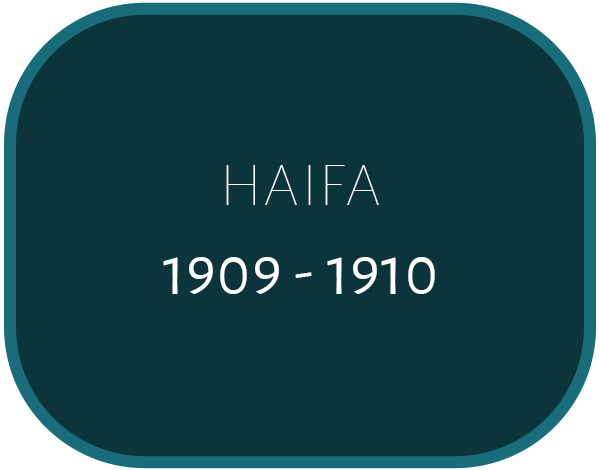
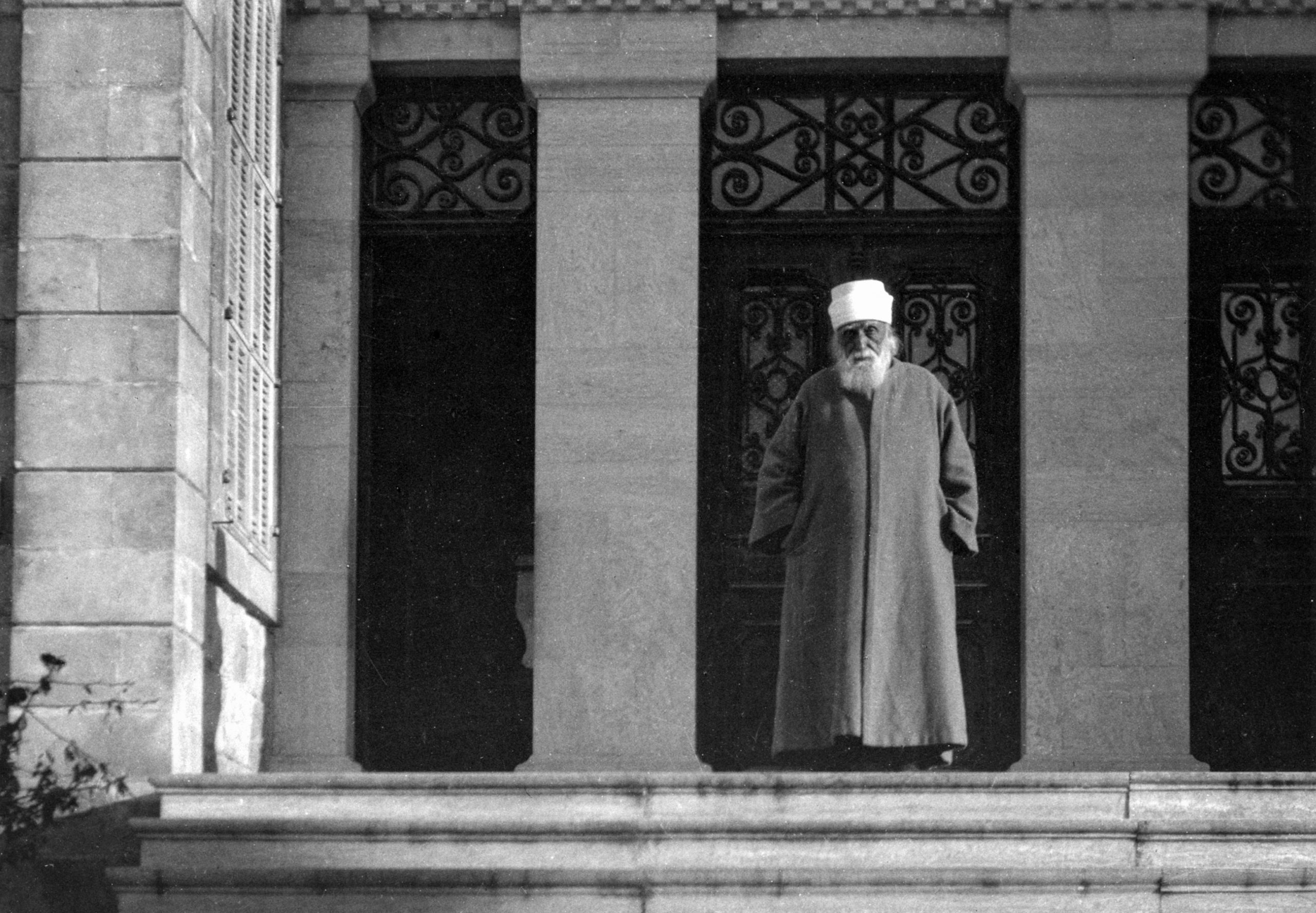
'Abdu'l-Bahá on the front steps of His home at 7 Persian Street, in May 1921. Bahá'í Media Bank.
During the period immediately following the change in the Ottoman regime, 'Abdu'l-Bahá continues to reside in ‘Akká, but five months after the entombment of the remains of the Báb on Mount Carmel, and one month before leaving on His journeys to the West, 'Abdu'l-Bahá joins His family and moves to Haifa.
Soon, at the age of 65, 'Abdu'l-Bahá ceases to set foot within the city gates of ‘Akká, where He has been a prisoner for nearly forty years since He was 24. When 'Abdu'l-Bahá moves in, the house is already filled with family, who have been here since at least 1907. Two of His daughters will reside close by with their families, and 7 Haparsim is always crowded with relatives, children, servants, pilgrims and guests.
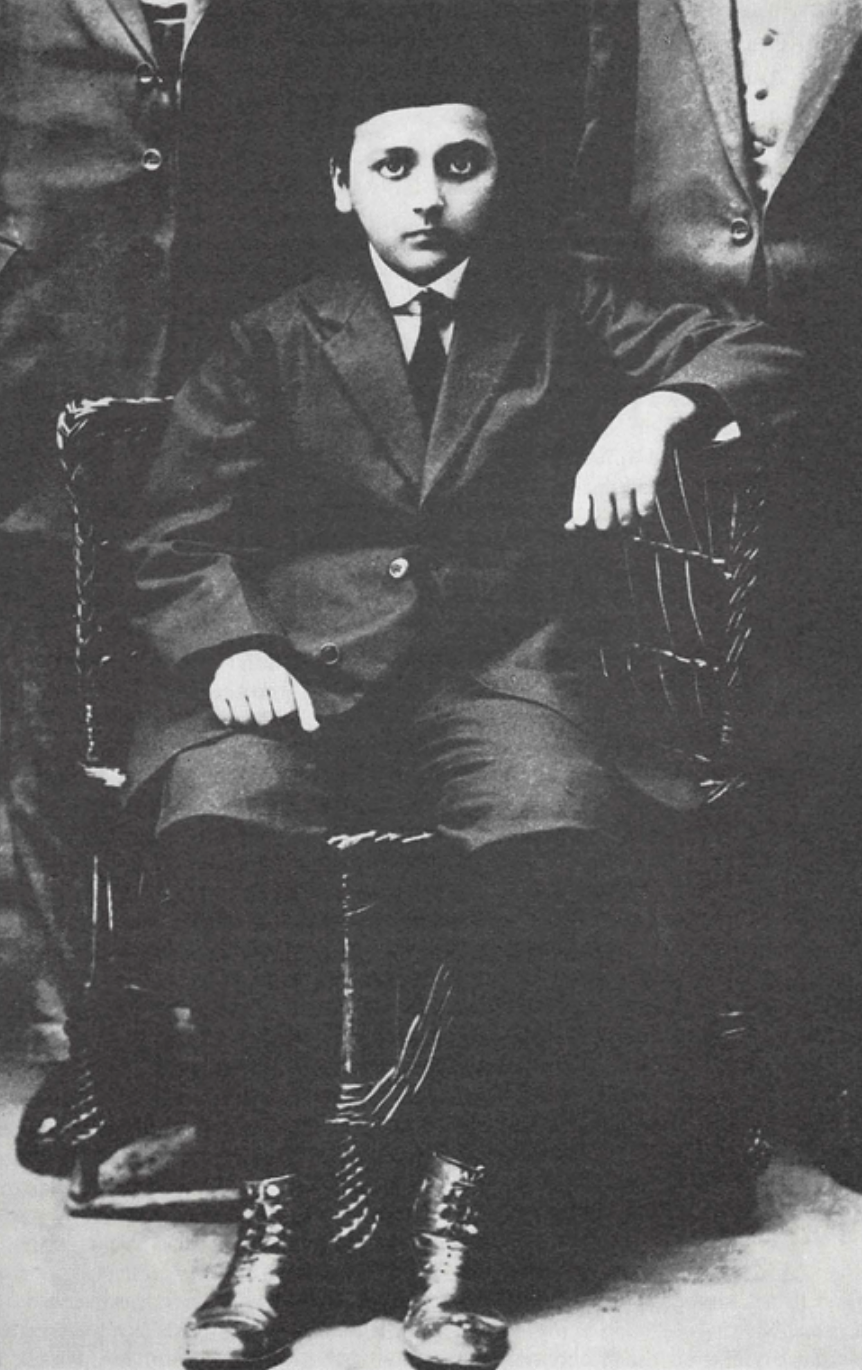
Shoghi Effendi, approximately a year after Dr. Falscheer would have seen him at 7 Haparsim. Bahá'í Media.
There are very few records of how people who aren't Bahá'í would have seen 'Abdu'l-Bahá and His grandson. Dr J. Fallscheer, a German woman physician notes her impressions when she is called this day to attend to the cut finger of a maid at 7 Haparsim. Once she has attended to her patient, Dr. Fallscheer is sipping coffee with the ladies of the Holy Family when she is summoned by 'Abdu'l-Bahá to the drawing room. 'Abdu'l-Bahá enquires about the maid, and Dr. Falscheer reassures Him. Shoghi Effendi, then 13 years old, enters the room, behind his father and greets his beloved Grandfather with a kiss on the hand, then remains motionless near the door, respectful and humble. People come and go, speaking in Persian, for fifteen minutes, but Dr. Falscheer doesn't take her eyes off the boy.
Shoghi Effendi is dressed in European summer clothes, a short jacket, shorts, and socks above his knees. The perceptive physician is struck by Shoghi Effendi's dark, already mature and melancholy eyes set in a childish face. Before leaving the room, his father whispers something to Shoghi Effendi who then approaches 'Abdu'l-Bahá, waits to be spoken to and answers in Persian. 'Abdu'l-Bahá laughs, dismisses him, and Shoghi Effendi kisses His grandfather's hand again and walks backwards out of the room, his dark, loyal eyes never leaving 'Abdu'l-Bahá's.
A short moment of silence follows and 'Abdu'l-Bahá asks Dr. Fallscheer:
Now my daughter, how do you like my future Elisha?
Dr. Fallscheer responds:
Master, if I may speak openly, I must say that in his boy's face are the dark eyes of a sufferer, one who will suffer a great deal!
'Abdu'l-Bahá looks away, then after a long time, turns back to Dr. Fallscheer and says:
My grandson does not have the eyes of a trailblazer, a fighter or a victor, but in his eyes one sees deep loyalty, perseverance and conscientiousness. And do you know why, my daughter, he will fall heir to the heavy inheritance of being my Vazir (Minister, occupant of a high post)? Bahá'u'lláh, the Great Perfection - blessed be His words - in the past, the present and forever - chose this insignificant one to be His successor, not because I was the first born, but because His inner eye had already discerned on my brow the seal of God. Before His ascension into eternal Light the blessed Manifestation reminded me that I too - irrespective of primogeniture or age - must observe among my sons and grandsons whom God would indicate for His office. My sons passed to eternity in their tenderest years, in my line, among my relatives, only little Shoghi has the shadow of a great calling in the depths of his eyes.
'Abdu'l-Bahá pauses for a long time before continuing.
At the present time the British Empire is the greatest and is still expanding and its language is a world language. My future Vazir shall receive the preparation for his weighty office in England itself, after he has obtained here in Palestine a fundamental knowledge of the oriental languages and the wisdom of the East.
Dr. Fallscheer interjects:
Will not the western education, the English training, remould his nature, confine his versatile mind in the rigid bonds of intellectualism, stifle through dogma and convention his oriental irrationality and intuition so that he will no longer be a servant of the Almighty but rather a slave to the rationality of western opportunism and the shallowness of everyday life?
'Abdu'l-Bahá marks another long pause, then rises and speaks in a strong and solemn voice:
I am not giving my Elisha to the British to educate. I dedicate and give him to the Almighty. God's eyes watch over my child in Oxford as well - Inshallah!
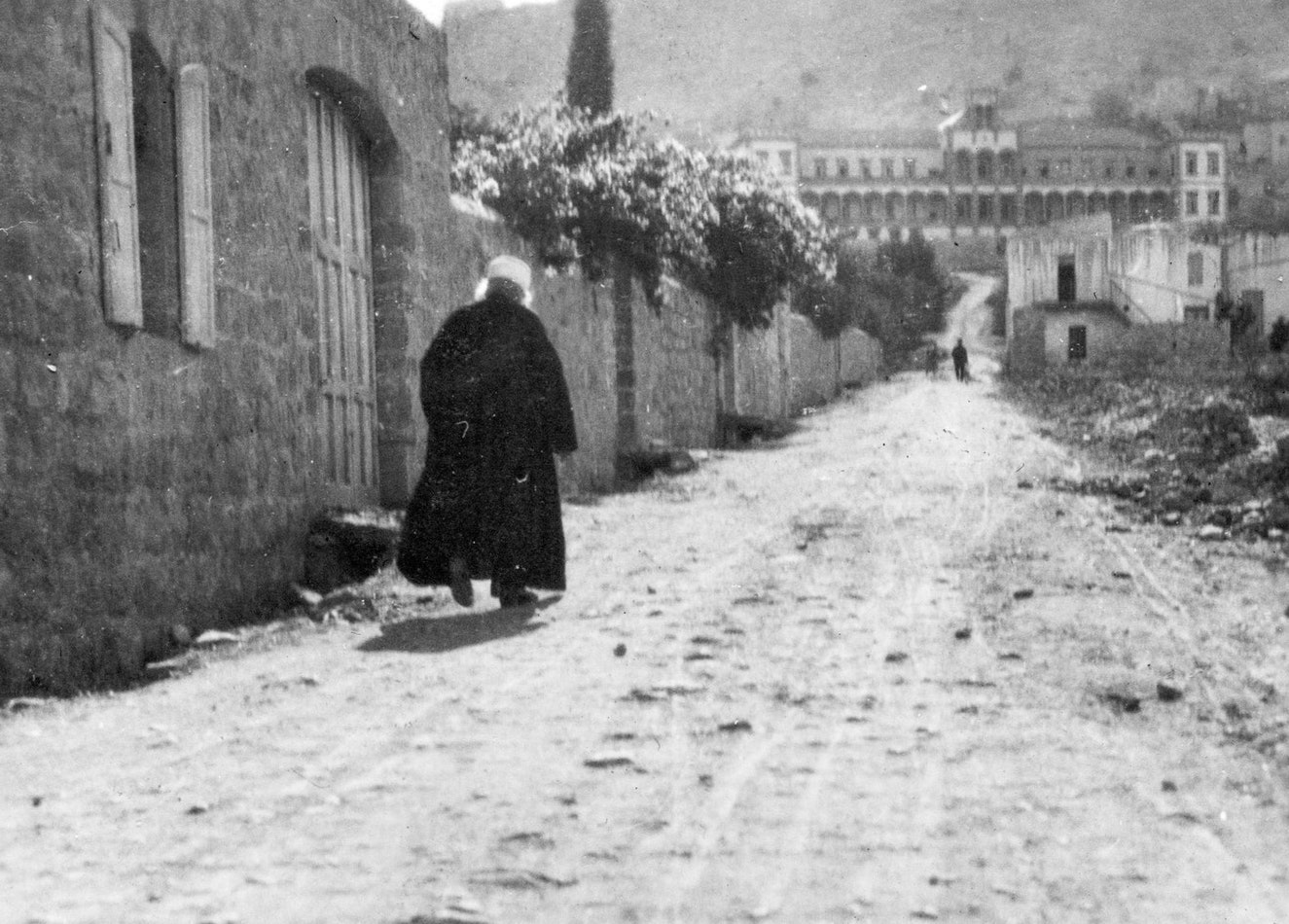
'Abdu'l-Bahá leaving 7 Haparsim in 1920. Bahá'í Media Bank.
'Abdu’l-Bahá leaves the Holy Land as a free man after forty years of imprisonment without informing His family and the body of believers, and therefore without a public farewell, which would have attracted a lot of unwanted attention, especially from the jealous Covenant-breakers.
‘Abdu'l-Bahá could not, however, have left Haifa without assistance, so ‘Abdu'l-Bahá did tell someone. This person is Mírzá Jalál is the husband of Rúḥá Khánum, the third daughter of ‘Abdu'l-Bahá and he is the son of Mírzá Muḥammad-Hasan, the King of Martyrs. Three years and three months later, Mírzá Jalál recounts the entire, incredible story to Ahmad Sohrab in Ramleh, on November 30, 1913.
On the day before ‘Abdu'l-Bahá leaves, Sunday, August 28, 1910, all of the Holy Family is in 'Akká, with the exception of Mírzá Jalál's wife, Rúḥá Khánum. One thing that is crucial to this story is that Mírzá Jalál's house is connected to the Master's house. Both facts, that the houses are connected and that the Master's house is relatively empty, are to greatly facilitated Mírzá Jalál's second task.
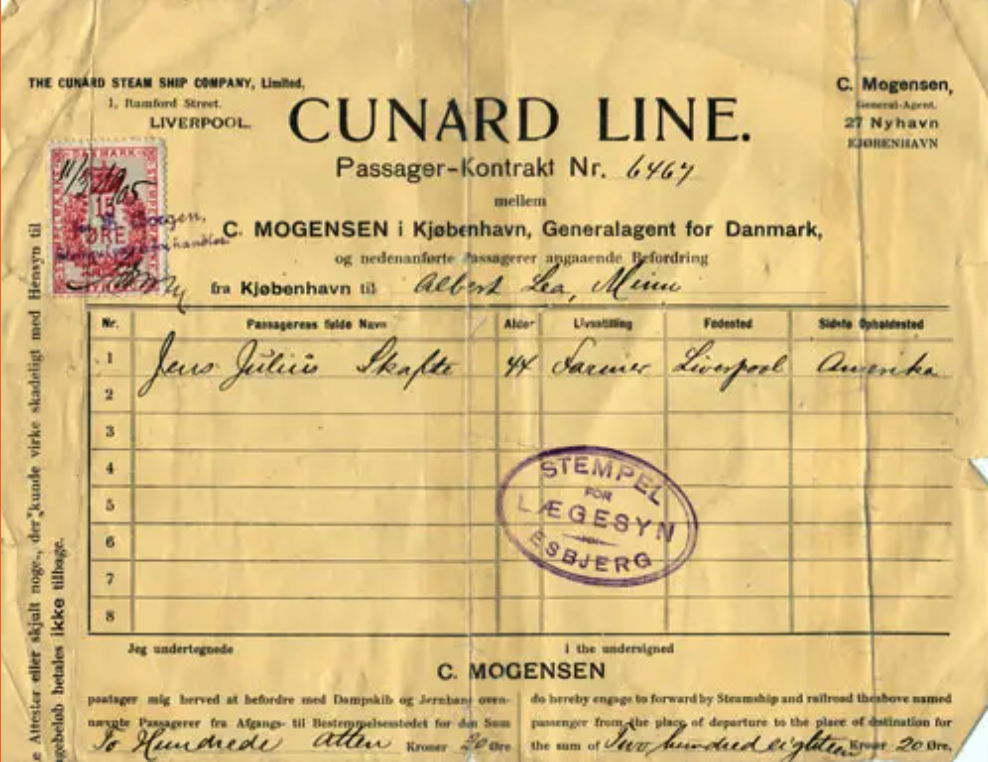
Example of a steamer ticket, for a contract for Passage on the Cunard Line from Copenhagen to America 1905. Source: Gjenvick-Gjønvik Archives, used for personal, non-profit use according to Terms of Use.
On this Sunday, August 28, ‘Abdu'l-Bahá summons Mírzá Jalál and asks him if he can perform an important and confidential mission. ‘Abdu'l-Bahá tells him: "You go now to the steamship agency and get for me one first-class ticket without giving my name." Mírzá Jalál immediately heads to the agent's office when he realizes he has no money. When he arrives, the agent asks him for a name under which to book the first class ticket to Port Said. Mírzá Jalál gives him a random name, tells the agent he will stop by to pay him for the ticket tomorrow, then immediately returns to ‘Abdu'l-Bahá and hands the Master the ticket.
‘Abdu'l-Bahá next instructions to Mírzá Jalál is: "You must now transfer my satchels from my room to your home without a single soul seeing them." The fact everyone is in 'Akká and that both houses touch each other greatly facilitate Mírzá Jalál's discreet accomplishment of this delicate task. ‘Abdu'l-Bahá's luggage is not moved again until nightfall.
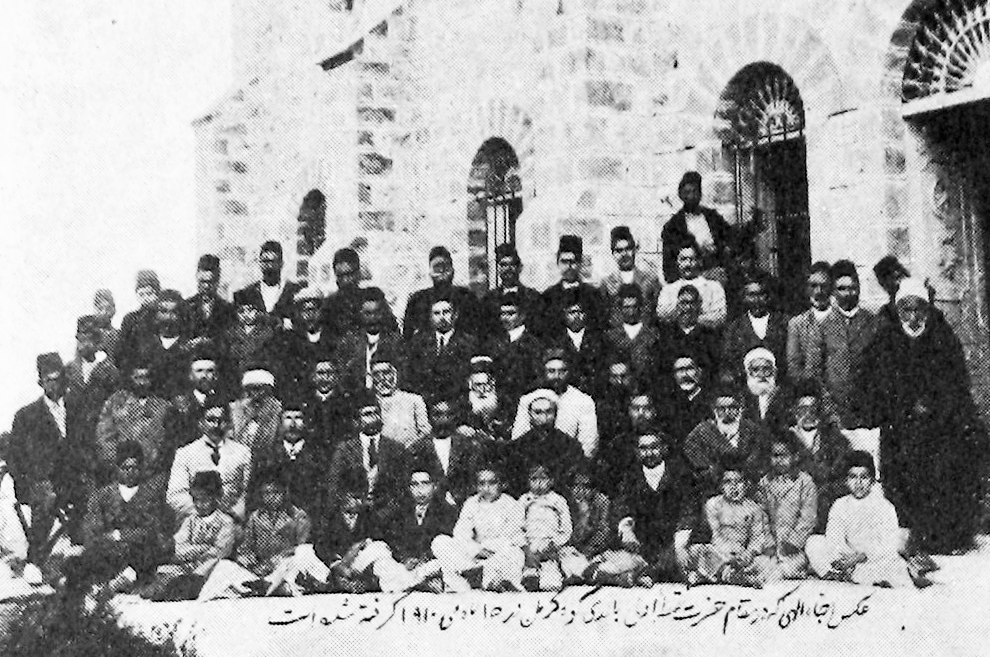
Bahá'í visitors at the Shrine of the Báb in Haifa in 1910. Source: Bahai Media.
Next, ‘Abdu'l-Bahá tells Mírzá Jalál:
"Tell the driver to make ready my carriage. I will go to the Tomb of the Báb to meet the friends. From there I will go direct to the steamer. You also by some roundabout way bring my baggages. Send word to Mirza Nureddin to be ready to accompany me and send us Áqá Khusraw with the next steamer."
‘Abdu'l-Bahá visits the Shrine that afternoon, then, as He leaves, shakes the hands of every believer present and bids them farewell, something they will understand only the next day. Then, ‘Abdu'l-Bahá walks down Mount Carmel from the Shrine of the Báb, and steps directly onto the Kosseir, about to depart for Egypt, and the start of the Master's Journeys to the West.
When night falls, Mírzá Jalál hires a carriage to bring the Master's luggage and takes three believers with him, for precaution, including Mírzá Munír Zayn, all under instructions not to ask any questions.
When they arrive at the Kosseir, the steamer is full, and ‘Abdu'l-Bahá chooses two of the believers to accompany Him to Egypt: ʻAbdu’l-Ḥusayn and Mírzá Munír Zayn who is one of the sons of the Apostle of Baháʼuʼlláh and preeminent transcriber of His Tablets, Zaynu’l-Muqarrabín.
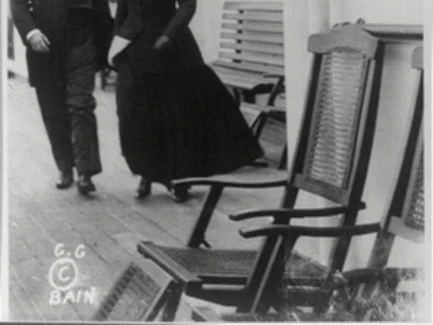
A set of steamer chairs from the 19th century. Source.
‘Abdu'l-Bahá asks for a steamer chair, but there are none available. One of the rowers (who row people aboard and back ashore), goes to find one. Later, as the man is rowing them ashore, Mírzá Jalál asks him how he was able to procure a chair for the Master when there were none.
The rower explains that finding no free chairs, he went down the third class and spotted to Arabs sitting on steamer chairs.
He started a fight between the two men, and when the fight escalated and they rose to their feet, he simply grabbed one of their chairs and ran to bring it to ‘Abdu'l-Bahá!
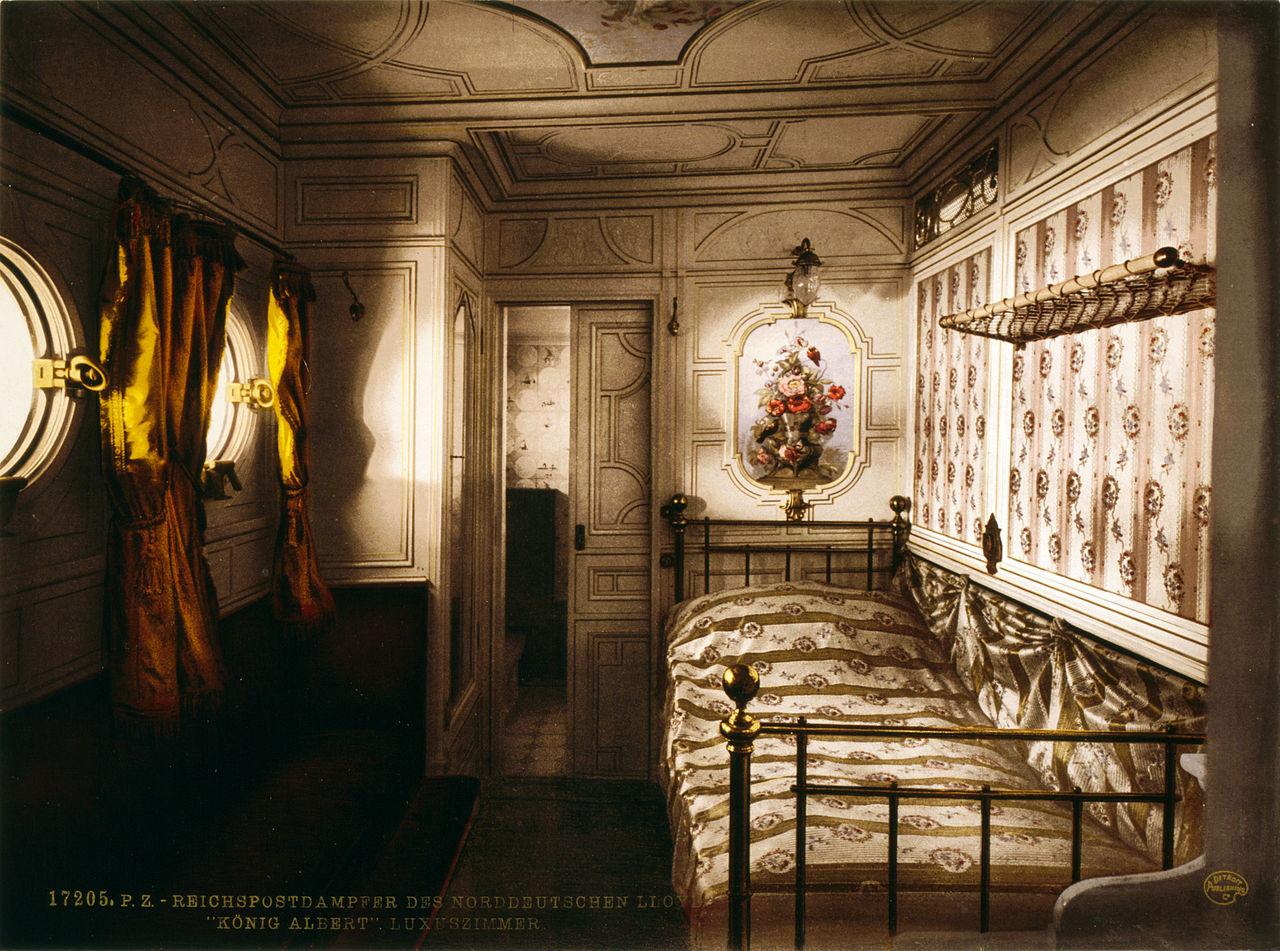
The luxury cabin in the steamer SS König Albert. Source: Wikimedia Commons.
As the Kosseir is full, Mírzá Jalál is not able to find a private cabin for ‘Abdu'l-Bahá who is to share His with an Englishman until they dock in Port Said in two days' time and ‘Abdu'l-Bahá jokes about the situation saying: "Never mind we can very well get along with an English man." ‘Abdu'l-Bahá is still giving Mírzá Jalál and other friends instructions when the steamer whistle blows and the friends hastily leave the ship.
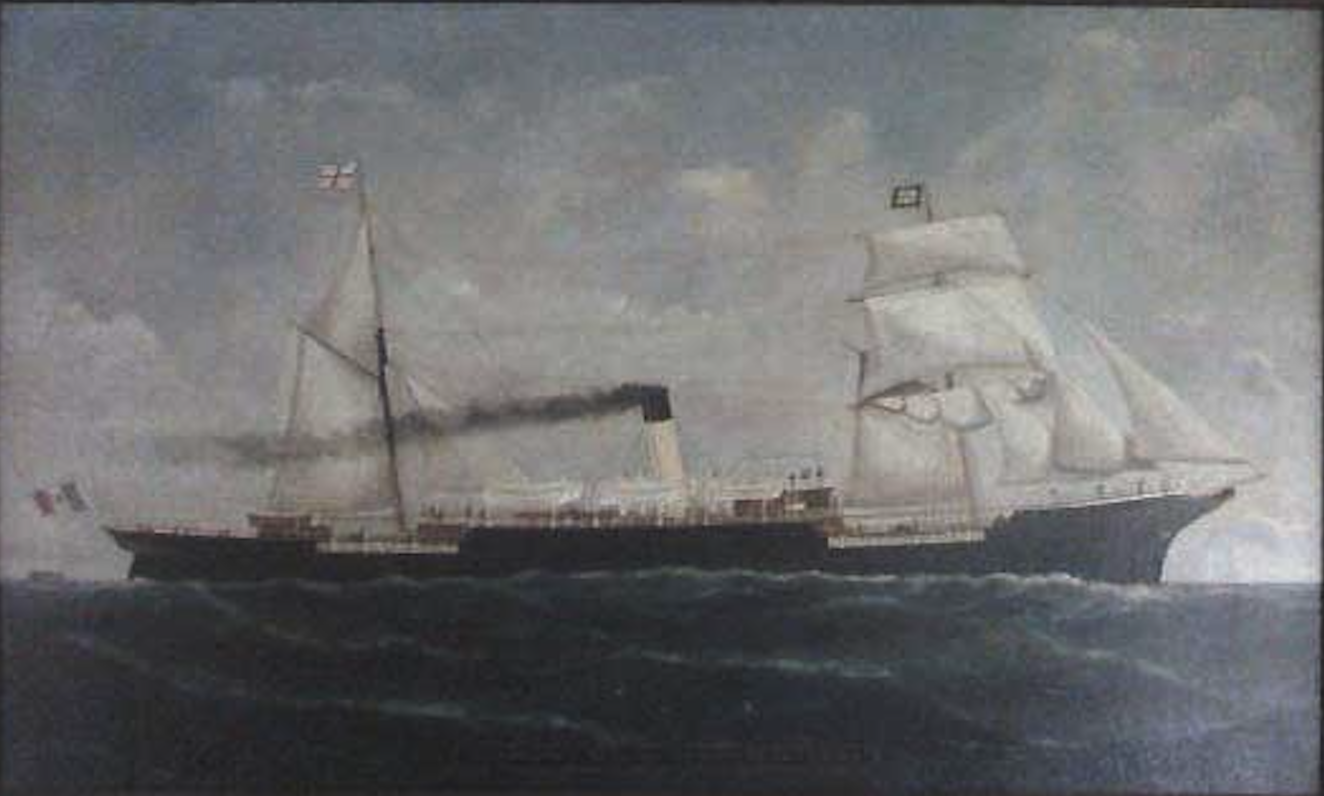
The Khedivial Mail Steamship Company's Kosseir, the ship on which 'Abdu'l-Bahá sailed to Egypt on 29 August 1910. Pictured here when she was the Mexican-owned Esteban de Antunano in 1884-1886.
In the darkness of the night Mírzá Jalál and his companions can see the outline of the Kosseir making for the Mediterranean sea carrying away ‘Abdu'l-Bahá, free and out into the world after forty years of imprisonment. ‘Abdu'l-Bahá will not return to the Holy Land and His beloved Shrines for three full years. The "most outstanding achievement that will forever be associated with ‘Abdu’l‑Bahá’s ministry" is about to begin.
References for Part IV
The Ascension of Bahá’u’lláh
Bahá’u’lláh contracts a fever: Taherzadeh, Adib. The Revelation of Bahá’u’lláh, Volume 4 (Mazra‘ih & Bahjí, 1877–1892) pages 413-421 and Lady Blomfield The Chosen Highway.
‘Abdu’l-Bahá delivers a message from Bahá’u’lláh: “I Shall Always Be With Them”: Taherzadeh, Adib. The Revelation of Bahá’u’lláh, Volume 4 (Mazra‘ih & Bahjí, 1877–1892) pages 413-421.
The Day of Joy – Bahá’u’lláh’s condition improves: Taherzadeh, Adib. The Revelation of Bahá’u’lláh, Volume 4 (Mazra‘ih & Bahjí, 1877–1892) pages 413-421.
Bahá’u’lláh’s last audience with the believers: Taherzadeh, Adib. The Revelation of Bahá’u’lláh, Volume 4 (Mazra‘ih & Bahjí, 1877–1892) pages 413-421 and Lady Blomfield The Chosen Highway.
Bahá’u’lláh’s final farewell to the women of the Holy Family: Taherzadeh, Adib. The Revelation of Bahá’u’lláh, Volume 4 (Mazra‘ih & Bahjí, 1877–1892) pages 413-421 and Lady Blomfield The Chosen Highway.
Bahá’u’lláh instructs ‘Abdu’l-Bahá to gather His papers: Taherzadeh, Adib. The Covenant of Bahá’u’lláh page 148.
“The Day which shall not be followed by night”: The Ascension of Bahá’u’lláh: The quote in the title is from Shoghi Effendi. God Passes By. Taherzadeh, Adib. The Revelation of Bahá’u’lláh, Volume 4 (Mazra‘ih & Bahjí, 1877–1892) pages 413-421 and Lady Blomfield The Chosen Highway.
The Cable to the Sultan: The Sun of Bahá Has Set: Taherzadeh, Adib. The Revelation of Bahá’u’lláh, Volume 4 (Mazra‘ih & Bahjí, 1877–1892) pages 413-421.
‘Abdu’l-Bahá chooses Nabíl to compile the Tablet of Visitation for Bahá’u’lláh: Taherzadeh, Adib. The Revelation of Bahá’u’lláh, Volume 4 (Mazra‘ih & Bahjí, 1877–1892) pages 413-421.
The Interment of Bahá’u’lláh: Taherzadeh, Adib. The Revelation of Bahá’u’lláh, Volume 4 (Mazra‘ih & Bahjí, 1877–1892) pages 413-421.
A Week of Mourning for the People of ‘Akká: Taherzadeh, Adib. The Revelation of Bahá’u’lláh, Volume 4 (Mazra‘ih & Bahjí, 1877–1892) pages 413-421 and Lady Blomfield The Chosen Highway.
‘Abdu’l-Bahá receives glowing written tributes about Bahá’u’lláh’s greatness: Shoghi Effendi, God Passes By
The end of Bahá’u’lláh’s Ministry and the close of the Second Epoch of the Heroic Age: Shoghi Effendi, God Passes By
The Center of the Covenant
The betrayal of Mírzá Muḥammad-‘Alí: ‘Abdu’l-Bahá: The Centre of the Covenant of Bahá’u’lláh page 52-54 and Taherzadeh, Adib. The Covenant of Bahá’u’lláh and page 148-149.
Bahá’u’lláh’s cases are violated: Taherzadeh, Adib. The Covenant of Bahá’u’lláh and page 149.
The unsealing and reading of the Kitáb-i-‘Ahd: Shoghi Effendi, God Passes By, Taherzadeh, Adib. The Revelation of Bahá’u’lláh, Volume 4 (Mazra‘ih & Bahjí, 1877–1892) pages 413-421, Lady Blomfield The Chosen Highway and Balyuzi, H.M. ‘Abdu’l-Bahá: The Centre of the Covenant of Bahá’u’lláh pages 51-52.
The Kitáb-i-Ahd: Shoghi Effendi. God Passes By.
The Breaking of Bahá’u’lláh’s Covenant
Mírzá Muḥammad ‘Alí and Mírzá Mají’d Dín: Taherzadeh, Adib. The Covenant of Bahá’u’lláh page 148-150 and Shoghi Effendi, God Passes By.
The “Center of Hate”: Mírzá Muḥammad ‘Alí’s soul-devouring jealousy: Taherzadeh, Adib. The Covenant of Bahá’u’lláh page 148-150 and page 240 for the reference to “Center of Hate”
The devastating spiritual consequences of Covenant-breaking: Taherzadeh, Adib. The Covenant of Bahá’u’lláh page 148-150
A plan to assassinate ‘Abdu’l-Bahá: Taherzadeh, Adib. The Covenant of Bahá’u’lláh pages 240-241
‘Abdu’l-Bahá is in such great danger for His Life that He makes plans for the election of the Universal House of Justice: Taherzadeh, Adib. The Covenant of Bahá’u’lláh page 241
God assisted the Covenant-breakers so that ‘Abdu’l-Bahá might stop them all: Taherzadeh, Adib. The Covenant of Bahá’u’lláh page 233.
‘Akká
Sometime in 1892 – Shoghi Effendi’s father asks ‘Abdu’l-Bahá for His daughter’s hand in marriage: Ruhe, David. Door of Hope: The Bahá’í Faith in the Holy Land, page 55
Summer 1892 – ‘Abdu’l-Bahá retreats to the Cave of Elijah in Haifa: Ruhe, David. Door of Hope: The Bahá’í Faith in the Holy Land, page 55
Immediately after ‘Abdu’l-Bahá’s retreat in Haifa – Back in the house of ‘Abbúd: Ruhe, David. Door of Hope: The Bahá’í Faith in the Holy Land, page 55
Pilgrimage to the Shrine of Bahá’u’lláh in the time of ‘Abdu’l-Bahá: Afroukhteh, Youness. Memories of Nine Years in ‘Akká, pages 24-25.
1893 – Abdu’l-Bahá foreshadows the victory of the Faith in the West: Shoghi Effendi, God Passes By.
23 September 1893 – The name of Bahá’u’lláh is publicly spoken in Chicago: Shoghi Effendi, God Passes By.
1893 – ‘Abdu’l-Bahá writes the first important treatise of His Ministry on leadership: Yazdani, Mina. “‘Abdu’l-Bahá and the Iranian Constitutional Revolution: Embracing Principles while Disapproving Methodologies.” Published in Journal of Bahá’í Studies, vol. 24, nos. 1–2 (June 2014), pp. 47–82.
1893 – 1894 – ‘Abdu’l-Bahá approves the design of the First Bahá’í House of Worship in ‘Ishqábád: Taherzadeh, Adib. The Revelation of Bahá’u’lláh, Volume 4, pages 122-123.
1894 – ‘Abdu’l-Bahá approves the transfer of the remains of the Báb to a new location: Day, Michael V.. Journey To A Mountain (The Story of the Shrine of the Bab) . Kindle Edition.
February 1894 – Khayru’lláh begins systematically teaching the Bahá’í Faith in America: Shoghi Effendi. God Passes By and Redman, Earl. Visiting ‘Abdu’l-Baha: Volume 1: The West Discovers the Master, 1897-1911, p. 22, Kindle Edition.
After 5 June 1894 – Thornton Chase becomes the first American Bahá’í: Shoghi Effendi. God Passes By
1894 – 1896 – The Faith gows rapidly in America: Shoghi Effendi. God Passes By
“A considerable amount of time” and after late 1895 – 1896 – ‘Abdu’l-Bahá retreats to Tiberias: Maani, Baharieh Rouhani. Leaves of the Twin Divine Trees: an in-depth study of the lives of women closely related to the Báb and Bahá’u’lláh pages 329-331
Late 1895 – Early 1896 – Shoghi Effendi’s parents wed in a simple ceremony: Ruhe, David. Door of Hope: The Bahá’í Faith in the Holy Land page 56 and Maani, Baharieh Rouhani. Leaves of the Twin Divine Trees: an in-depth study of the lives of women closely related to the Báb and Bahá’u’lláh pages 329-331
October 1896 – ‘Abdu’l-Bahá rents the house of ‘Abdu’lláh Pashá: Ruhe, David. Door of Hope: The Bahá’í Faith in the Holy Land page 56
November 1896 – Mírzá Muḥammad-‘Alí widely publicizes his Covenant-breaking: Rabbani, Ahang. Memories of My Life: Translation of Mírzá Habíbu’lláh Afnán’s Khátirát-i-Hayát page 336.
November 1896 – January 1897 – ‘Abdu’l-Bahá returns to the Cave of Elijah on Mount Carmel: Rabbani, Ahang. Memories of My Life: Translation of Mírzá Habíbu’lláh Afnán’s Khátirát-i-Hayát page 331
1 March 1897 – Shoghi Effendi is born: Rabbání, Rúḥíyyih. The Priceless Pearl and Ruhe, David. Door of Hope: The Bahá’í Faith in the Holy Land page 56-58
Around 1897 – ‘Abdu’l-Bahá orders the construction of a sarcophagus and a coffin for the Remains of the Báb: Day, Michael V.. Journey To A Mountain (The Story of the Shrine of the Bab) . Kindle Edition.
Sometime after 1 March 1897 – A child will lead them: Rabbání, Rúḥíyyih. The Priceless Pearl, page 2
August 1897 and sometime between 1897 – 1898 – Shoghi Effendi as an infant: Rabbání, Rúḥíyyih. The Priceless Pearl. page 10
1898 – Phoebe Hearst organizes the first Western Bahá’i pilgrim group: Shoghi Effendi. God Passes By; photo caption about Robert Turner composed from information in Redman, Earl. Visiting ‘Abdu’l-Baha: Volume 1: The West Discovers the Master, 1897-1911 (p. 31). George Ronald. Kindle Edition
15 December 1898 – The first Western Pilgrims: Earl. Visiting ‘Abdu’l-Baha: Volume 1: The West Discovers the Master, 1897-1911 (p. 31). George Ronald. Kindle Edition
Winter 1898 – 1899 – Thornton Chase watches ‘Abdu’l-Bahá minister to the people of ‘Akká: Ruhe, David. Door of Hope: The Bahá’í Faith in the Holy Land pages 59-60
The profound spiritual impact of ‘Abdu’l-Bahá on the Western pilgrims: Shoghi Effendi. God Passes By.
The return to the West of these “God-intoxicated pilgrims”: Shoghi Effendi. God Passes By.
31 January 1899 – At long last, the Remains of the Báb arrive in the Holy Land: Shoghi Effendi. God Passes By.
From 31 January 1899 for approximately one year – The remains of the Báb are stored in the room of the Greatest Holy Leaf: Day, Michael V.. Journey To A Mountain (The Story of the Shrine of the Bab) . Kindle Edition.
Early 1899 – ‘Abdu’l-Bahá lays the foundation stone for the Shrine of the Báb: Shoghi Effendi. God Passes By.
1899 – The sarcophagus arrives in Haifa: Shoghi Effendi. God Passes By.
1900 – ‘Abdu’l-Bahá transfers the remains of the Báb to Haifa: Day, Michael V.. Journey To A Mountain (The Story of the Shrine of the Bab) . Kindle Edition.
The purchase of the land for the Shrine of the Báb and the access road to the Shrine: Shoghi Effendi. God Passes By.
Mid-1900 – The beginning of the construction of the Shrine: Day, Michael V.. Journey To A Mountain (The Story of the Shrine of the Bab) . Kindle Edition.
Sometime in 1901 – Covenant-breakers misrepresent the Shrine of the Báb: Balyuzi, H.M. ‘Abdu’l-Bahá: The Centre of the Covenant, page 92 and Afroukhteh, Youness Khan. Memories of Nine Years in ‘Akká, pages 116-122
20 August 1901 – ‘Abdu’l-Bahá is interrogated for several days: Shoghi Effendi. God Passes By.
1901 – 1902 – Crisis: Shoghi Effendi. God Passes By.
1901 – 1908 – Victory: Shoghi Effendi. God Passes By and Taherzadeh, Adib. The Covenant of Bahá’u’lláh page 232 for the 90 tablets a day
1901 – 1908 – From ‘Akká ‘Abdu’l-Bahá directs the construction of the Shrine of the Báb in Haifa: Day, Michael V.. Journey To A Mountain (The Story of the Shrine of the Bab) . Kindle Edition.
Sometime in 1901 – ‘Abdu’l-Bahá purchases 2,000 acres of agricultural land: Poostchi, Iraj. 2010. ‘Adasiyyah: A Study in Agriculture and Rural Development
1901 – 1908 – ‘Abdu’l-Bahá’s Will and Testament: Balyuzi, H.M. ‘Abdu’l-Bahá: The Centre of the Covenant, pages 124-125
August 1901 – 1902 – The Spiritual Connection between ‘Abdu’l-Bahá and Thomas Breakwell: Balyuzi, H.M. ‘Abdu’l-Bahá: The Centre of the Covenant, pages 74-80
1902 – Shoghi Effendi’s first Tablet from ‘Abdu’l-Bahá: Rabbání, Rúḥíyyih. The Priceless Pearl, page 8
Sometime in Shoghi Effendi’s childhood – “I need him”: Rabbání, Rúḥíyyih. The Priceless Pearl, page 9
December 1902 – The lawyer in ‘Akká: Balyuzi, H.M. ‘Abdu’l-Bahá: The Centre of the Covenant, page 97.
‘Abdu’l-Bahá’s Tablets: Taherzadeh, Adib. The Covenant of Bahá’u’lláh pages 205-207
December 1902 – The foundation stone is laid for the first Bahá’í House of Worship: Taherzadeh, Adib. The Revelation of Bahá’u’lláh, Volume 4, pages 122-123 and Balyuzi, H.M. ‘Abdu’l-Bahá: The Centre of the Covenant, page 110.
June 1903 – A second House of Worship: Shoghi Effendi. God Passes By.
1903 – Genocidal persecutions in Iran: Balyuzi, H.M. ‘Abdu’l-Bahá: The Centre of the Covenant, pages 102-107 and Iran Press Watch: Abdu’l-Baha on Baha’i Persecutions in 1903 (part 1)
1904 – Restoration of the House of the Báb in Shíráz: Balyuzi, H.M. ‘Abdu’l-Bahá: The Centre of the Covenant, page 108.
1904 – A hostile new Governor and Covenant-breaker allegations: Shoghi Effendi, God Passes By.
End of 1904 – ‘Abdu’l-Bahá accurately predicts the end of the crisis: Taherzadeh, Adib. The Covenant of Bahá’u’lláh page 233
10 June 1905 – ‘Abdu’l-Bahá is to be exiled to Fizán: Shoghi Effendi, God Passes By.
21 June 1905 – The Commission of Enquiry: Balyuzi, H.M. ‘Abdu’l-Bahá: The Centre of the Covenant, pages 118-122 and Shoghi Effendi, God Passes By
July 1905 – The Commission of Enquiry is providentially recalled: Shoghi Effendi, God Passes By.
1906 – ‘Abdu’l-Bahá grants permission for Some Answered Questions to be published: Balyuzi, H.M. ‘Abdu’l-Bahá: The Centre of the Covenant, pages 82-83.
1907 – Six rooms that form the basis of the Shrine of the Báb are completed: Day, Michael V.. Journey To A Mountain (The Story of the Shrine of the Bab) . Kindle Edition.
1907 – The House of Worship in Ishqabád is complete: Momen, Moojan. The Baha’I Community of Akhabad: Its social basis and importance in Baha’i History. Article presented at the conference of “Cultural Change and Continuity in Central Asia” and the School of Oriental and African Studies, London, in April 1987.
1907 – ‘Abdu’l-Bahá asks the Spiritual Assembly of Ṭihrán to send Him farmers: Poostchi, Iraj. 2010. ‘Adasiyyah: A Study in Agriculture and Rural Development
1 January 1907 – “My Name is ‘Abdu’l-Bahá”: Shoghi Effendi, God Passes By and for the dates see and for the date, see Star of the West, Volume VIII, number 15 (December 2, 1917) page 211.
February 1907 or earlier – ‘Abdu’l-Bahá starts to move His family to Haifa: Rabbání, Rúḥíyyih. The Priceless Pearl, page 13 and Ruhe, David. Door of Hope: The Bahá’í Faith in the Holy Land, page 141
June 1908 – Another edict by the Sultan: Balyuzi, H.M. ‘Abdu’l-Bahá: The Centre of the Covenant, page 131.
Before July 1908 – ‘Abdu’l-Bahá sends Shoghi Effendi to Haifa when ‘Akká becomes too dangerous: Taherzadeh, Adib. The Covenant of Bahá’u’lláh page 257
August 1908 – ‘Abdu’l-Bahá is free at last: Balyuzi, H.M. ‘Abdu’l-Bahá: The Centre of the Covenant, page 131.
1908 – ‘Abdu’l-Bahá completes the construction of His new home in Haifa: Ruhe, David. Door of Hope: The Bahá’í Faith in the Holy Land, page 141
After August 1908 – ‘Abdu’l-Bahá’s little white room: Day, Michael V.. Journey To A Mountain (The Story of the Shrine of the Bab) . Kindle Edition.
1908 – 1916 – ‘Abdu’l-Bahá and the Bahá’í farmers: Poostchi, Iraj. 2010. ‘Adasiyyah: A Study in Agriculture and Rural Development
Shortly before 21 March 1909 – ‘Abdu’l-Bahá gives instructions to move the sarcophagus: Day, Michael V.. Journey To A Mountain (The Story of the Shrine of the Bab) . Kindle Edition.
21 March 1909 – The interment of the remains of the Báb: Shoghi Effendi. God Passes By.
21 March 1909 – The First National Convention in America: Shoghi Effendi. God Passes By.
October 1909 – Dr. Susan Moody and ‘Abdu’l-Bahá: Redman, Earl. Visiting ‘Abdu’l-Baha: Volume 1: The West Discovers the Master, 1897-1911 pages 246-251.
Haifa
August 1910 – ‘Abdu’l-Bahá moves into His final home at 7 Haparsim in Haifa: Rabbání, Rúḥíyyih. The Priceless Pearl, page 13.
6 August 1910 – Only little Shoghi has the shadow of a great calling in the depths of his eyes: Rabbání, Rúḥíyyih. The Priceless Pearl, pages 10-13.
September 1910 – ‘Abdu’l-Bahá leaves the Holy Land for His Journeys to the West: Balyuzi, H.M. ‘Abdu’l-Bahá: The Centre of the Covenant, page 135; Long story of Mírzá Jalál’s recollections helping ‘Abdu’l-Bahá leave the Holy Land on August 29, 1910 from The Diary of Ahmad Sohrab, 30 November 1913; the name of the steamer from Smucker Hartzler. Jonas. Among Missions in the Orient and Observations by the Way pages 248-249.
![]()
